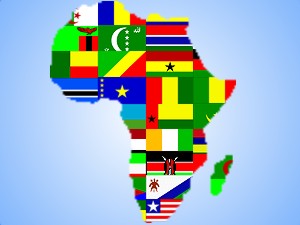
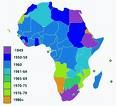
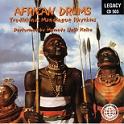
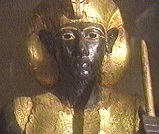
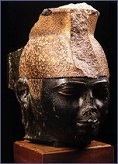
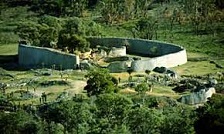






























TLW's Africa Historyscope |
By T.L. Winslow (TLW), the Historyscoper™ |
© Copyright by T.L. Winslow. All Rights Reserved. |
Original Pub. Date: Sept. 16, 2015. Last Update: June 5, 2024. |







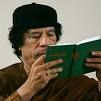




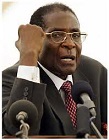



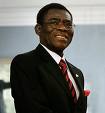

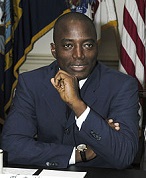
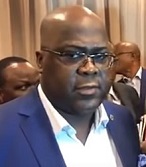
Westerners are not only known as history ignoramuses, but double dumbass history ignoramuses when it comes to Africa and African history. Since I'm the one-and-only Historyscoper (tm), let me quickly bring you up to speed before you dive into my Master Historyscope.


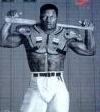
11.7M sq. mi. (30.2M sq. km) Africa is the world's 2nd largest and 2nd most populous continent, covering 6% of the Earth's surface area and 20.4% of its land area, the only continent to stretch from the N temperate zone to the S temperate zone; the modern-day pop. is 1.1B, 15% of the world total; too bad, it's long been the most backward and poor continent, leading non-Africans, mainly white and yellows to construct racial superiority theories that place blacks at the bottom when it comes to brainpower but at the top when it comes to musclepower. Until modern times wild animals probably outnumbered humans, and they didn't leave history books anymore than the mainly illiterate Africans did, but it's pretty hard to become an Einstein while running and hiding from them all the time, not to mention that the heat around the equator doesn't go with books and such, or with pale skin, because black skin is best for hiding from animals and the sun both, and to risk stepping on it the wild animal environment is ideal for breeding athletes like Muhammad Ali, Michael Jordan, and Bo Jackson even if slavery isn't, we'll leave the nature vs. nurture debate to others.

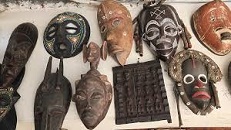
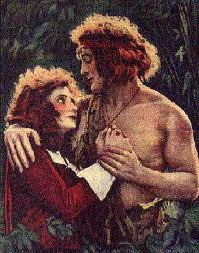
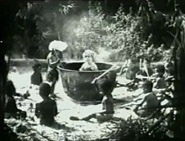
Either way, Africa is the most savage and primitive continent, long filled with naked savages who practiced cannibalism and animistic religions incl. voodoo, me Tarzan you Jane, which continued long after white Euros got civilized and first met them face to face, trying everything to civilize them only to have their Christian missionaries thrown into the stew pots; only the Arab Muslims seem to have made a big dent here, although they enslaved those who wouldn't convert to Islam, whereas the Christians enslaved them first then made them convert to Christianity second. In contrast to Euros, who went out from Europe and conquered the rest of the backward world, imposing their concept of racial and cultural superiority as a moral justification for exploiting their abundant natural resources, Africans were enslaved and hauled out into Europe and America and forced to struggle to be accepted as equals. Good news, it worked so good that in modern times huge waves of Africans Tweeting on smart phones are being welcomed as refugees into Europe and America, even the Muslim ones, my how times change.
We'll limit this historyscope to the black indigenous peoples of Africa and skip the Egyptians, Romans, Arabs, and Europeans except where the interaction is important.
The name Africa is Latin, coming from the Afri (Phoenician "afar" = dust) (Berber "ifri" = cave) people of modern-day Tunisia around Carthage, giving its name to the Roman province of Africa on the Mediterranean coast incl. Tunisia, Algeria, and Libya; too bad, the giant Sahara Desert formed a barrier to exploration, and they assumed that it was bounded on the S by the Great Ocean.
The most salient fact about Africans is all their ethnic groups, organized into tribes; a lesser known fact about Africa is all the African empires that rose and fell over the centuries; today Africa is composed of 54 sovereign states and 10 non-sovereign territories; before the 2011 Arab Spring that caused massive emigration, the African Diaspora incl. 56M in Brazil, 42M in the U.S., 9M in Haiti, 8M in Dominican Repub., 5M in Colombia, 3.8M in France, 2.7M in Jamaica, 2M in U.K., 1.1K in Cuba, 1.1M in Italy, 980K in Puerto Rico, 900K in Peru, 800k in Germany, 800K in Canada, 700K in Spain, 700K in Ecuador, and 600K in Trinidad and Tobago.
We'll skip over most of the pre-history of Africa, which allegedly incl. the emergence of Homo sapiens in East Africa, if not the Garden of Eden.
About 200K B.C.E. the most recent common ancestor of modern humans is a woman who lived about this time in Africa, according to the Mitochondrial Eve Hypothesis; Modern Homo sapiens appear in sub-Saharan E Africa about this time, and all modern humans derive from their migrations, with little or no interbreeding with archaic human groups (e.g. Homo erectus), based on the rate of mitochondrial DNA mutations; this contradicts the theory that independent Homo erectus pops. around the world evolve independently into Homo sapiens beginning around -1M; there is little genetic difference between the three main genome groups, African, Eurasian, and East Asian; humans originally had spines in their penises to remove competitors' sperm?
-76,000 The oldest known human burial in Africa is in Kenya, a child in Panga ya Saidi Cave.

The original roman a clef, "The Naked Ape Wears Prada"? About 50K B.C.E. the ancestral "naked ape" (what color skin?) homo sapiens sapiens pop. begins to migrate from NE Africa about this time (over the, ahem, Red Sea?), according to the Human Genome Project, evolving into five major races in five continents, with skin color genes varying dramatically then becoming fixed and stable, and finally a defining attribute, evolving into a big social rivalry, status and control thing after they come back into contact (which is just about at the beginning of recorded history), the lighter-skinned invariably wanting to avoid mating with the darker-skinned, preferring inbreeding, even virtual incest to whiten the descendants as much as possible, with social (white flight?), economic, and criminal forces all arrayed to weed out any darker-skinned misfits who stumble through the gauntlet and don't end up as slaves, creating an illusion of evolution by systematic inbreeding?; let's not even mention the kinky hair, thick lips, wide nose, funky armpit odor, receding forehead, small cranium, thin male hips (fast-twitch muscle) (slow-twitch white boys can't jump but can lift weights and play quarterback and linemen) and huge female hips (steatopygia) of the banana-eating monkeys, er, apes pretending to be humans and acting like men so they can go after "our white wimmen" (of course, it's okay for a white man to "whiten up" a black woman's pups?); meanwhile the stockier Neanderthals own the territory the we-got-our-own-problems humans are moving into, and die out in about 5K years (competition, new germs, climate?); they don't die because of poor diet - that's all, just one bitch slap a week? Art and advanced tools become widespread, as heavy brows are replaced with rounder heads, indicating lower testosterone levels and/or fewer hormone receptors. "It is somewhat disquieting to speculate on the fact that even 50,000 years ago, in the early Stone Age, the human family contained individuals with innate capacities for reasoning and self-expression approaching those of a Shakespeare, a Beethoven or an Einstein" - Frederick Seitz (1911-2008) (pres. of Rockefeller U. in 1968-78).
About 20K B.C.E. the Khoisan people of the Kalahari Desert in S Africa (largest pop. on Earth) begin a drastic pop. decline.
About 4000 B.C.E. the Kushites (Cushites) enter the interior of E Africa, raising cattle and grain.
About 4000-3000 B.C.E. the tall, long-necked Tutsi set up a monarchy in Rwanda, intermixing with Bantu peoples.
About 3000 B.C.E. the Bouar Megaliths, about 70 groups of megaliths are built in W Central African Repub. (CAR).
About 3,000 B.C.E. irrigation is developed in Nubia (modern-day Sudan), using the flood waters of the Nile River with a waterwheel-like device called the sakia.

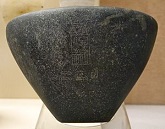
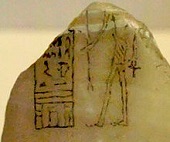
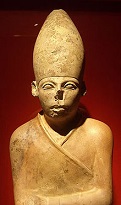
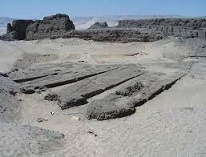
In 2,802 B.C.E. Senedj (Sened) (Sethenes) becomes king #4 of the Egyptian Second Dynsty, ruling unknown years, after which king #5 Seth-Peribsen (Perabsen) (Ash-Peribsen) and king #6 Sekhemib-Perenmaat (Sekhemib) rule for unknown years while the War between Seth and Horus (worshippers) rocks the nation, and Seth wins, after which in -2690 Khasekhemy (Kasekhemui) ("the two powerful ones appear") becomes king #7 (last) of the Egyptian Second Dynasty, ruling for 18 years (until -2672), leaving the 14 brick-enclosed plank-and-rope Abydos Boats (discovered in 2000 C.E.) along with the mud brick Shunet ez-Zebib funeral structure, marking the start of the Egyptian belief in the afterlife being a place to take their stuff and live forever?
About 2400 B.C.E. the Egyptians begin sending ships to the Land of Punt (Pwene) (Pwenet) on the African coast of modern-day Eritrea and Somalia (which gets as close as 15 mi. to the coast of Arabia), collecting myrrh to go with the frankincense (olibanum) from the Dhofar (modern-day Oman) region of S Arabia (obtained from the resin of trees of the genus Boswellia) - oh man, that incense is frank?
About 2100 B.C.E. the Kingdom of Kush of dark-skinned negroids is established in S Egypt, centered around Kerma above the Third Cataract (of seven) on the Nile, flourishing during Egypt's Second Intermediate Period (-1750 to -1570), giving the Egyptians up north somebody to invade and kick around? (ends -1524); a brick palace and large burial mounds (tumuli) are constructed in Kerma.
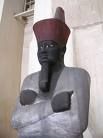
About 2010 B.C.E. Egyptian 11th Dynasty pharaoh (since -2061) Montuhotep (Mentuhope) II (Nebheptre) (d. -2009) founds the Middle Kingdom of Egypt (ends -1650), campaigning against the Nubian region of Kush, becoming the earliest Egyptian reference to them.
About 2000 B.C. Bantu farms spread throughout Africa, causing the Khoisan and other groups to go into a pop. decline.
In 1,991 B.C.E. the Nubian Twelfth Dynasty is founded (ends -1786), based in the Aswan region, banning Nubians from crossing the S end of the 2nd Nile Cataract into Egypt; meanwhile the Egyptians expand into N Nubia, erecting a chain of forts below the 2nd Cataract, dominating Nubia to about -1000, building Egyptian-style temples and making the aristocracy adopt Egyptian religions and hieroglyphics while taking gold, ebony, and ivory; meanwhile Nubians intermarry with Egyptians, so within a millennium they are almost indistinguishable.
In 1768 B.C.E. after being pushed out by the Hittites, the Hyksos (Egyptian "rulers of the foreign countries") from W Asia, AKA the shepherd kings, a Syrian group which incl. Semites from Palestine invade the NE Nile Delta and set themselves up in a city called Avaris, where they introduce the horse and chariot; the Middle Kingdom of Egypt ends along with the 13th Egyptian Dynasty, and the Second Intermediate Period begins, incl. the 13th-17th Dynasties (ends -1570).
About 1600 B.C.E. a revolt against the foreign-invader Hyksos (which incl. the original Jews?) spreads throughout Egypt, which begins its growth into a world power.
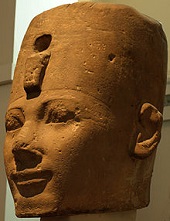
In 1524 B.C.E. Amenhotep I dies, and his military cmdr. (a commoner) Thutmose I (Thutmosis) (Akheperkare) (d. -1518) ("Thut is born") ("son of Thut"), becomes king #3 of the 18th Egyptian Dynasty, going on to conquer Nubia past the Fourth Cataract, ending the autonomous Kingdom of Kush (Cush) (Nubia), located at the confluence of the Blue Nile, White Nile, and Atbara Rivers in modern-day Sudan.

In 1504 B.C.E. Thutmose II dies, and his son Thutmosis (Thutmoses) (Thutmose) III (d. -1450), the Napoleon of Egypt is appointed heir and king #5 of the Egyptian 18th Dynasty, with his stepmother Hatshepsut (Maatkare) (d. -1483) as regent; her chief vizier is User; Thutmose III builds the city of Napata on the W bank of the Nile River past the Fourth Cataract near modern-day Karima, Sudan (250 mi. N of Khartoum), becoming the seat of the "King's Son of Kush" (Egyptian viceroy), with a pop. of 100K.
About 1100 B.C.E. people from the Near spread into East Africa.
In 1070 B.C.E. after the New Kingdom disintegrates, the Kingdom of Kush gains its independence, with capital at Napata.
About 1000 B.C.E. whites from S Europe migrate to S Africa, becoming the Khoisan tribes.
About 1000 B.C.E. the Bantu peoples in NW Africa begin a mass migration S and E (ends 4th cent. C.E.); their funky Bantu language has 20 genders.
About 1000 B.C.E. the Kalimba thumb piano is invented in W Africa, tined with bamboo; metal-tined ones appear in the Zambezi River Valley about 700 C.E.
About 1000 B.C.E. the Nok Culture in N Nigeria, known for its life-sized terracotta figures arises, going on to engage in iron smelting by 550 B.C.E. then mysteriously disappear about 300 C.E., giving rise to the Birom, Gwari, Hausi, Jukun, Kanuri, and Nupe peoples.
In the 9th cent. B.C.E. the Phoenicians sail W through Gibraltar, founding new colonies in Gades ("wall") (modern-day Cadiz) (SW coast of Spain near Gibraltar), Utica (Tunisia, N Africa), and Lixis (W coast of Africa).
In 814 B.C.E. the Phoenician settlement at Kition (Latarkia) moves out and founds the new independent town of Qart Hadasht (New City), later called Carchedon by the Greeks, and Carthage (Carthago) by the Latins; it eventually has a 20-mi.-circumference wall built around it; according to myth it was founded (in -814?) by Queen Dido (Elissa), daughter of King Belus of Tyre, whose brother Pygmalion murdered her hubby Sychaeus (Acerbas), causing her to flee there; after being offered as much land by native chief Iarbas as a bull's hide can cover, she cuts one into thin strips and pastes them together to maximize the area; after committing suicide to avoid marrying him, a nig, er, African prince, and/or hooking up with lily-white Troy survivor Aeneas and doing it because he jilted her, she is visited by Aeneas in the underworld, who sees her reunited with Sychaeus, and won't look at him; they engaged in child sacrifice?
About 800 B.C.E. the Napata Kingdom on the W bank of the Nile River in Nubia (modern-day Karima, N Sudan) is founded (until 350 C.E.), with capital at Meroe (Meroë) (Medewi or Bedewi) (modern-day Shendi, Sudan) 120 mi. NE of Khartoum, taking its culture from the Egyptian 25th Dynasty based in Kush; about 280 B.C.E. the royal burial ground is transferred to Meroe from Napata.
In 780 B.C.E. Alara of Nubia (d. -760) founds the Kingdom of Napata in Kush (ends -656), becoming the first prince of Nubia, which goes on to conquer and rule Egypt.

In 760 B.C.E. Alara the Nubian dies, and (his brother?) Kashta the Kushite (d. -752) becomes prince #2 of Nubia, going on to conquer Egypt, becoming king #1 of the Egyptian Twenty-Fifth (25th) Dynasty (ends -656), ruling from Napata (250 mi. N of Khartoum) in Nubia (modern-day Sudan), installing his daughter Amenirdis I as the successor of Orsonkon III's daughter Shepenupet I, divine wife of Amun in Thebes.

In 747 B.C.E. Kashta of Kush (Nubia) dies, and his Amun-worshipping black African son Pi'ankhy (Piankhy) (Piye) (Peye) (d. -715) becomes ruler of Kush, going on to save Egypt from itself by invading it. In 730 B.C.E. Nubian king Pi'ankhy captures Thebes, becoming king #2 of the Egyptian 25th (Kushite) Dynasty, "Lord of the Two Lands", the first black pharaoh; too bad, after taking up an offer from delta warlord Tefnahkt, he takes their best bling and horses and returns to Nubia permanently, after which he is buried in an Egyptian-style pyramid in Napata in modern-day Sudan, becoming the first entombed pharaoh in 500+ years.
In the 7th cent. B.C.E. the Phoenicians found the city of Tripoli in N Africa, consisting of Oea, Lepcis Magna, and Hadrumetum; they also found Motya in Sicily, Sulcis, Caralis, Nora, and Tharros in Sardinia, and Mogador on an island on the W African coast 450 mi. S of Gibraltar; the Phoenician cities of Tyre, Sidon, and Byblos also found the port of Tripolis in Phoenicia 70 km. N of Beirut, each city controlling a walled sector. In the 7th cent. B.C.E. the Greeks found the kingdom of Cyrenaica in E Libya (ends 4th cent. B.C.E.), dominated by the city of Cyrene (founded 630 B.C.E.).

In 671 B.C.E. Assyrian king (-681 to -669) Esarhaddon (Ashur-Aha-Iddin) ("Ashur has given a brother") (-713 to -669) sieges Tyre, but it holds out; he then defeats the Egyptian army, forcing it to retreat to Memphis, then sieges Memphis, and "conquered it in half a day by means of mines, breaches, and assault ladders; I destroyed it, tore down its walls and burnt it down" (his own words), and establishes Assyrian rule in Egypt (the last major territorial expansion of Assyria); Ramses XI is killed?; Pharaoh Taharka flees back to Kush (Nubia) (Ethiopia), after which the capital of Kush (Nubia) moves to Meroe (Meroë) on the E bank of the Nile River near modern-day Shendi, Sudan 120 mi. NE of Khartoum; Kush becomes known as Ethiopia.
By 650 B.C.E. iron working spreads to North Africa - to make cooking pots for missionaries?

In 610 B.C.E. Psamtik I dies, and his son (by Mehtenweskhet) Necho (Nekau) (Neku) (Nechoh) (Nikuu) II Wahem-Ib-Re ("Carrying out the heart of Ra") (-658 to -595) becomes king #2 of the Egyptian 26th Dynasty (until -595). The Median-Babylonian army marches on Harran, and Ashur-Uballit II splits SW to Syria after an Egyptian force sent by Necho II proves too small and retreats. The 54-year siege of Azotus (Ashdod) by Egypt (begun -664) ends, becoming the longest siege so far in history.
About 600 B.C.E. the first recorded circumnavigation of Africa by ships of Egyptian pharaoh Necho II takes place, taking three years, rounding the Cape of Good Hope heading W, noting that the Sun is to their right, then N to the Mediterranean, pausing each year to sow and harvest grain; Herodotus is later skeptical of this voyage, not knowing that the Earth is spherical.

In 595 B.C.E. Necho II dies, and his son Psamtik (Psammetichus) (Psammeticus) II Neb-Ib-Re ("Beautiful is the heart of Ra") (d. -589) becomes king #3 of the Egyptian 26th Dynasty, going on to lead an expedition into Nubia in year 3 of his reign, reaching the 3rd or 4th Cataract and inflicting a heavy defeat on the kingdom of Kush, which loses its power to threaten Egypt, capturing Napata and forcing King Aspelta to move the capital S to Meroe (Meroë) near the 6th Cataract, founding the Kingdom of Meroë (Meroe) (ends 350 C.E.), with a pop. of 500K which worships the god Amun in the form of lion god Apedemak ("Lord of Royal Power"), and develops a unique building style; the rulers continue to be buried at Napata; too bad, Psamtik II fails to pursue them and retreats back to the First Cataract, leaving Elephantine as the S border of Egypt, contenting himself with defacing the monuments left by the Egyptian 25th Dynasty Kushite kings.
About 520 B.C.E. Carthaginian seaman Hanno of Carthage explores the W coast of Africa with a fleet of 60 ships, sailing through the Straits of Gibraltar and founding seven colonies in Morocco, visiting modern-day Sierra Leone, and finding the natives hirsute and savage, capturing three females who are so ferocious that they have to be killed, their skins preserved and kept in the Temple of Tannit, surviving until the Romans destroy Carthage in 146 B.C.E.; they call the people "Gorillae", causing 19th cent. Euro explorers to name man-sized apes after them.
In the 5th cent. B.C.E. Lake Chad in Africa becomes inhabited.
About 400 B.C.E. Garamantian Kingdom in Fezzan (C Libya W of Cyrenaica and S of Tripolitania) is founded by the Berbers (Amazigh), going on to build an underground network to gather fossil water from underneath the limestone layer, and harass Roman coastal settlements until Roman Emperor Septimius Severus captures their capital city of Garama in 202 C.E.; they become kaput by 600 C.E.
In 341 B.C.E. the Persians complete the conquest of Egypt.

In 331 B.C.E. blonde-blue Macedonian king (since -336) Alexander III the Great (-356 to -323) conquers Egypt from Persia, becoming its pharaoh, ending the 31st Egyptian Dynasty (begun -343); after visiting the Egyptian coast and ordering the Temple of Luxor restored to its ancient glory, then having an overwhelming desire to found a new city (according to Roman author Arrian), in the spring he leaves Egypt and marches for Mesopotamia, quelling a rebellion by the Jews in Samaria, then expelling the pop. and inviting Macedonians to move in.

In the 3rd cent. B.C.E. the tribal Berber kingdom of Mauretania (Mauritania) on the coast of modern-day Morocco is founded, becoming a client state of the Roman Empire in 33 B.C.E., and a full Roman province in 40 C.E. after the death of last king (23-40) Ptolemy of Mauretania (-13 to 40).


In 204 B.C.E. Roman gen. Publius Cornelius Scipio the Elder (-236 to -183) invades Africa with an army of 30K men, landing on the coast near Utica; Fabius tries to backstab him in order to cover his own incompetence, and succeeds in restricting him to only the legions that are in Sicily, with 300 of his Spanish army. In 203 B.C.E. the Romans under Scipio the Elder invade Numidia, the back door of Carthage, with the help of E Numidian ally Masinissa, burning two Numidian camps full of men, armor and horses, causing the Carthaginians to send urgent orders to Hannibal to quit Italy and race back by sea to defend them; the Romans sweep down on the 30K-man army (built on a core of 4K Celtibarians) of Numidian king Syphax in the Battle of Utica near modern-day Suq al-Khamis on the Medjerda River in Tunisia; Hasdrubal and Syphax escape; Masinissa falls in love with Syphax's wife (Hasdrubal's daughter) Sophonisba (Sophoniba) (Saphan Baal) and marries her, but Scipio refuses to acknowledge it, insisting that she be surrendered to be used in a triumph in Rome, causing Masinissa to talk her into drinking poison to save herself from the humiliaton; the alliance with Masinissa gives the Romans their first superiority in cavalry over the Carthaginians, which proves a big surprise later. On Oct. 19, 202 B.C.E. after an abortive attempt at negotiations by the Romans, Scipio the Elder decisively defeats Carthage and Numidia under Hannibal (-247 to -182) during an eclipse at the Battle of Zama on the Plains of Zama SW of Carthage; Hannibal, having to rely on raw troops, many of whom desert to the Romans, leaving his veterans to be slaughtered, experiences his first defeat, sending word to Carthage: "We have lost not only a battle but a war"; Scipio the Elder gains the surname Africanus.

About 200 B.C.E. Egyptian-born Greek big brain Eratosthenes of Cyrene (-276 to -194) (head librarian of the Library of Alexandria) determines the circumference of the Earth by measuring noon Sun angles in wells at Syene (Aswan) and Alexandria, coming within 50 mi. of the correct value (approx. 25K mi.), suggesting that the Sun moves around the Earth; he also measures the obliquity of the ecliptic with an error of 7 min. of arc, and maps the course of the Nile River; the southernmost point of Africa is considered the Horn of Africa, taking until the 1st cent. C.E. to discover SE Africa; it takes until 1670 C.E. for Christian Europe to catch back up?
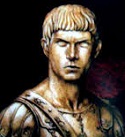
In 146 B.C.E. starving Carthage resists Scipio the Younger (Publius Cornelius Scipio Aemilianus Africanus Numantinus) (-185 to -129) and his Roman army almost to the last man, the final street fighting lasting six days, but finally capitulates when they are down to 50K out of 500K; the survivors are sold into slavery, the city is sacked and burned to the ground and taken apart stone by stone, the fields plowed and sown with salt, and a curse solemnly invoked upon anyone who dares attempt to rebuild it; the region becomes the Roman Province of Africa, the richest in the Western empire, which lasts until the Vandal invasion of the 5th cent. C.E.

In 60 B.C.E. Juba I (-85 to -46) becomes king of Numidia in North Africa (until -46).

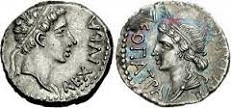
On Apr. 6, 46 B.C.E. Julius Caesar defeats a larger army of 40K under Metellus Scipio and Cato the Younger (with 30 elephants and 16K troops supplied by Juba I of Numidia) at the Battle of Thapsus (near modern-day Ras Dimas, Tunisia), and after getting the elephants to panic and trample their own men, causing Juba I's men to flee, the remaining 10K try to surrender to Caesar, but he has them all slaughtered because he just had an epileptic seizure and wasn't quite right?; Scipio escapes, and after Caesar sieges Utica, Cato the Younger commits suicide, stabbing himself with his sword and botching it, causing a physician to stitch him up, after which he tears off his stitches and pulls out his intenstines in order to croak; the news causes Caesar to issue the soundbyte "Cato, I must grudge you your death, as you grudged me the honor of saving your life"; Juba I camps away from Scipio's main army, and after he sees him defeated he flees with his army along with Roman Gen. Marcus Petreius (-110 to -46), until their retreat is cut off, after which they fight each other to meet an honorable death, and Petreius kills Juba then commits suicide with the help of a slave; Juba I's son Juba II (-52 to 23) is brought to Rome by Julius Caesar, and becomes Romanized, becoming known as "the scholar king".
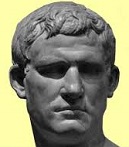

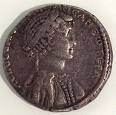

16 big game days, 2 superheroes, one very special family room? In summer 30 B.C.E. Octavian marches his armies around the Aegean, through Asia Minor and into Egypt; in July Marc Antony (b. -83) defends Alexandria from Octavian's Gen. Marcus Agrippa (-63 to -12), but his men desert, he is told that Cleopatra is dead, and falls on his own sword; on Aug. 1 Octavian captures Alexandria, and annexes Egypt as the Roman Province of Egypt (ends 641 C.E.); the Roman V gives them direct access to the Malabar Coast in India, allowing them to begin importing precious black pepper; on Aug. 12 aging 39-y.-o. Cleopatra VII (b. -69), after trying unsuccessfully to pussy-whip Octavian and negotiate to keep her Ptolemaic kingdom intact and keep her kids, only to learn that she is to be brought to Rome in chains as a common POW commits suicide at age 39 in Alexandria with an asp (Egyptian cobra) in a fig basket, becoming Egypt's last pharaoh; Shakespeare never calls it an asp, preferring the word "worm"; "Poor venomous fool, be angry, and dispatch" (William Shakespeare, Antony and Cleopatra, Act 5 Scene 2); "And Agrippa asked, 'Was this well done of your lady?', and the servant answered 'Extremely well, as befitting the last of so many noble rulers'" (1963 film Cleopatra) - don't have to live like a refugee? no one is predictable, not even a huckster?

In 26 B.C.E. to reward him for campaigning with him in Spain, Augustus marries Juba II of Numidia (-50 to 23) to Cleopatra Selene II (-40 to -6), daughter of Cleopatra VII of Egypt and Mark Antony of Rome, giving her a large dowry and making her queen of Mauretania (modern-day Morocco, W Algeria, and Ceuta and Melilla in Spain) in her own right; they name their new capital Caesaria (modern-day Cherchell, Algeria), and ramp up Mauretanian trade in the Mediterranean, incl. purple dye for stripes on senatorial robes after sending a party to Iles Purpuraires to learn the process; Tingis (modern-day Tangier) becomes a major trade center; Augustus appoints Juba II gov. of Gades (modern-day Cadiz) and Carthago Nova (modern-day Cartagena).
In 25 B.C.E. Roman emperor Augustus brags about planning a campaign against Nubia and Rabia, sending two armies into Ethiopia and Arabia Felix. In 23 B.C.E. the Kingdom of Kush in Meroe (Meroë) in Nubia under Queen Amanirenas (Amanirena) (Imanarenat) (Candace) (Kandake) attacks Roman Egypt with border raids in the Thebaid near the First Cataract, sieging Syene and its Roman garrison and enslaving the pop. then looting Egyptian statues and artifacts before 10K Romans under Gaius (Publius) Petroius (-75 to -19) chase them back to Nubia and raze the capital city of Napata next year, enslaving the pop. and sending 1K back to Augustus for the games, then signing a peace treaty that gets most of them back.
In 24 B.C.E. Tripoli in N Africa is conquered by the Garamantes of S Libya.
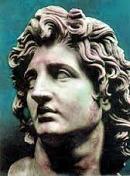
In 21 B.C.E. Greek historian Diodorus Siculus (-90 to -21) dies, leaving Bibliotheke Historike (Historical Library), a 40-vol. history of the world in 3 parts written in -60 to -30, covering 1,138 years from Creation to the Trojan War, from the Trojan War to the death of Alexander the Great, and from thence to the start of Caesar's Gallic Wars; books 1-5, 11-20, and parts of 21-40 survive; gives an account of slave labor gold mining in Nubia, and the pesky Celts, which he claims live in S France and are separate from the Gauls, who live to the N of them.
So divideth the B.C.E., the Don't-Say-B.C.-Before-Christ Butt Crack of Eternity (Before Common Era) from the C.E., the Don't-Say-A.D.-Anno-Domini-Year-of-the-Lord-Christ Scratch-and-Dent-Sale Common Era?
In 17 C.E. tormer Roman auxiliary soldier Tacfarinas begins a revolt in Africa against Juba II of Mauretania and his co-king son Ptolemy, supported by the Berber Numidian and Mauretanian tribes (ends 24).
In fall 61 C.E. Roman Emperor Nero sends a force of Praetorian soldiers under the command of a tribune and two centurions into Nubia, reaching the city-state of Meroe (Meroë), who give them an escort up the White Nile to the swamps of the Sudd ("barrier") in S Sudan, marking the limit of Roman penetration into Africa.
About 100 C.E. the Kingdom of Axum (Aksum) (Aksumite Empire) in N Ethiopia and Eritrea is founded (ends 940), with a wealthy economy based on trade in the Red Sea and Mediterranean, establishing hegemony over the Kingdom of Kush and eventually conquering the Himyarite Kingdom in Yemen after crossing the Bab-el-Mandeb (Mandab Strait) (Arab. "Gateway of Tears") between Yemen and modern-day Eritrea-Djibouti, becoming one of the four great kingdoms along with Persia, Rome, and China. About 100 C.E. Nilotic peoples incl. Luo and Ateker enter Uganda from the N, settling in the N and E. In the 2nd cent. C.E. the Nobades (Nobatae) (Nobadae) invade from the W and occupy the W bank of the Nile River in N Kush (Lower Nubia), going on to intermarry with the people of Meriotic Kush and help them fight the N expansion of Axum.
In the 2nd cent. C.E. the port city of Sarapion (Serapion) on the Indian Ocean coast in modern-day S Somalia is first mentioned, later becoming Mogadishu (Xamar) (Harmar) ("tamarind") (modern-day pop. 2.4M).

In 168 C.E. Egyptian-born Greek astronomer Claudius Ptolemy (b. 90) dies in Alexandria, leaving Almagest (Arab. "Great Compilation) (original title "Astronomical System"), a 13-vol. system of mathematical astronomy placing the Earth at the center of a static Universe, which is accepted by both the Christian and Muslim worlds until the Christian Renaissance; Geography, incl. a map of the known world with coordinates given, which makes the earliest mention of the Saxons as living in modern-day Schleswig, and mentions Eblana on the site of modern-day Dublin, Ireland; also mentions the unidentified African country of Agisymba (N of Lake Chad)?; The Tetrabiblos, a comprehensive work on astrology.
About 300 C.E. after the introduction camel to Western Sahara in the 3rd cent. C.E., the Ghana Empire in modern-day SW Mauritania and W Mali is founded (ends 1200), with its economy based on the trans-Saharan trade in gold and salt; it ends up becoming a vassal of the Mali Empire in the 13th cent.
In the 4th cent. C.E. Bantu-speaking tribes begin moving into S and E Africa, displacing the ancient Khoisan click-language-speaking San (Basarwa) (Bushmen); after the Euros begin arriving in the 17th cent., they end up squeezed into the Kalahari Desert.

In 316 C.E. Meropius, a Christian from Tyre explores the E coast of Africa along with Syro-Greek Christians St. Frumentius (-383) and his brother Aedesius (-355) (his nephews); after stopping the Red Sea coast, the natives kill all but the two brothers, who are given positions in the Ethiopian royal court, soon converting the queen and other members of the royal family, eventually turning Ethiopia (Axum) Christian after baptizing king Ezana of Axum in Ethiopia in 356, who becomes the first to use the title "king of kings", spreading Christianity and building churches; Axum eventually expands into Sudan, Somalia, and Kush (Meroe), launching trade through the Indian Ocean (until c. 700); meanwhile half-Christian half-who-knows-what Coptic missionaries from Egypt and Syria move in, causing Coptic Christianity (based on the teachings of St. Mark, with the other gospels chucked) to become the state religion - that's me, little O?
In 356 C.E. Tyre, Lebanon-born St. Frumentius (-383) converts king Ezana of Axum to orthodox Christianity, becoming its first bishop; soon afterward Axum invades Nubia, destroying the Kingdom of Meroe and converting it to Christianity; it eventually turns into the Christian kingdoms of Nobatia (Nobadia) (350-650) (between the 1st and 2nd cataract of the Nile River), with capital at Pachoras (modern-day Faras), converted to Christianity in 545, Makuria (340-1276, 1286-1317), with capital at Old Dongola, converted in 569, and Alodia (Alwaa) (600-1504) (southernmost) (great bend in the Nile River S into the Gezira), with capital at Soba near Khartoum, converted to Monophysite Christianity by missionaries sent by Byzantine emperor Justinian and his wife Theodora in 569; in 719 the Church of Nubia transfers its allegiance from the Greek Orthodox Church to the Coptic Orthodox Church; in the 8th cent. Makuria becomes the dominant power, enjoying its goloden age in 750-1150, halting the S expansion of Islam with a peace treaty (baqt) that lasts until Arab traders gradually convert most of the pop., who convert the cathedral of Dongola into a mosque in 1317; in 1504 the last Nubian kingdom collapses, and the Arab identity takes over.
In 429 C.E. after receiving an appeal from Roman gov. of North Africa Gen. Count Bonifacius (Bonifatius) (Boniface) (-432), who is in revolt against Empress Galla Placidia and wants to set himself up as an independent ruler of Africa, Genseric builds a fleet of small boats and leads his 80K Vandals (plus some Alans) from S Spain into North Africa, the surprise invasion drawing little resistance - never invite a vandal into your home? In 430 C.E. the Vandals doublecross Gen. Bonifacius and begin sacking N Africa and sieging Hippo in May (until 431), causing him to accept the regency of Galla Placidia and defend Hippo with Gothic mercenaries; on Aug. 28 St. Augustine of Hippo dies (from starvation?) while worrying about being forced to convert to Arianism; meanwhile the downtrodden indigenous pop. welcomes the Vandals as liberators from the Roman slavemaster landowners. In 431 C.E. the Vandals defeat Gen. Bonifacius and force him to flee to Italy, then capture Hippo Regius (Hippone) near moden-day Annaba, Algeria after a 2-year siege, and create an empire in N Africa, exterminating the great landowners, wiping out all debts to Roman moneylenders, and eliminating military service, causing the indigenous pop. of nomadic tribes to welcome them; rival Roman Gen. Aetius seeks refuge with the Huns, and at the head of 60K Huns forces Empress Galla Placidia to pardon him and promote him to master of the cavalry and infantry (Duke of the West), while forcing Boniface's son-in-law Sebastian to flee.
By the 6th cent. C.E. Nubia is predominantly Christian, and remains so until the Muslims come to power in the 14th cent. About the 6th cent. C.E. Austronesian seafarers engaged in the Indian Ocean trade network settle Madagascar.
By the 6th cent. C.E. South Africa is settled by Iron Age farmers.
In June 533 C.E. the Vandalic War of Justinian (ends Mar. 534) begins when Gen. Belisarius sails to Africa and lands near the city of Lepcis Magna, 10 mi. from Carthage; Vandal usurper Gelimer executes Hilderic, then meets Gen. Belisarius on Sept. 13 in the Battle of Ad Decimium (Tenth Milestone), which is a V for the Byzantines, followed by a 2nd V on Dec. 15 at the Battle of Tricamarum (Tricameron), ending the power of the Vandals permanently and completing the Byzantine reconquest of North Africa.
In Mar. 534 Gelimer surrenders at Mt. Papua, and the lost Roman provinces (the whole of) of North Africa (in Vandal hands since 439) are restored to the Byzantines, ending the Vandalic War (begun June 533); a triumph is held in Rome for Gen. Belisarius, who brings Gelimer as his POW to Constantinople, where he is allowed to retire to an estate in Galatia (founded cents. earlier by his kin the Gauls); the Berbers, who had been revolting against the hated Arian Vandals continue to revolt against the Byzantines.

In 632 C.E. Islam's founder Muhammad (570-632) dies after ethnically cleansing Arabia, after which his followers begin leaving Arabia and conquering the world, controlling Mesopotamia, Egypt, and Syria by 642; in 647 the Muslim Conquest of the Maghreb (North Africa) begins with 0K Arabs marching into Byzantine-held Africa, taking Tripolitania in modern-day Libya, and sweeping W, which is interrupted in 656 by an Arab civil war, and resumed in 665 with 40K Muslims taking Barca and defeating a 20K-man Byzantine army, after which in 670 10K Arabs take Kairouan (80 mi. S of Tunis), becoming the capital of the new Islamic province of Ifriqiya, which incl. Tunisia, Libya, and E Algeria, sweeping W toward the Atlantic until they are stopped at Tangier by Count Julian; in 698 they capture Carthage, and keep coming, and by 709 the Arabs control all of North Africa except Ceuta near the Pillars of Hercules, which doesn't stop them from invading Spain in 711.
In the 650s C.E. the Arab Slave Trade begins, taking 11M-18M black Africans across the Red Sea, Indian Ocean, and Sahara Desert by 1900, compared to 9M-14M brought to the Americas in the 15th-19th cents.
In 651 after 10 years of trying to take Nubia, only to be stopped by super-accurate "eyesmiter" archers, a nonaggression treaty (bakt) was concluded by the Arab Muslims, agreeing on Aswan as the S limit of Arab expansion, giving Nubia five cents. of peace in return for the annual quota of slaves, switch to Nubian Liberty Mutual and save 35% on your policy.
About 700 C.E. the Kanem Empire (ends 1376) is founded in Chad, with capital at N'jimi ("south"), expanding into S Libya (Fezzan), E Niger, NE Nigeria, and N Cameroon, getting converted to Islam by Arab and Berber traders.
About 700 C.E. the early Iron Age Zhizo people on the E side of the Kalahari Desert in W Zimbabwe and the Limpopo Valley begin practicing Bantu cattle culture.
In 757 C.E. the Midrarid Dynasty in Morocco (later centered in Sijilmasa) is founded by Midrar (Sam'un ibn Yazlan), a Khariji Muslim and Zanata Berber from Meknes after revolting from the Umayyid gov. of Qayrawan and his Arab elitism (ends 960) - why don't you check your donkey door? In 790 C.E. Abu Mansur al-Yasa (d. 823) becomes ruler of the Khariji Midrarid dynasty in Morocco, founding his capital at the oasis town of Sijilmasa SE of Fez on the Ziz River; he marries a son to the neighboring Rustamid Dynasty, and makes Sijilmasa a major stop in the gold trade route with Sudan. Idrid captures Tlemcen from the Khariji Zanaba Berbers.
About 800 C.E. the Kingdom of Takrur (Tekrur) (Tekrour) on the lower Senegal River in W Africa (ends 1285) is founded by Fulani (Fula) (Fulbe) and Serer (Serere) (Sereer) (Seex) (Sine-Sine) people, trading gold, salt, and grain and becoming the rival of the Ghana Empire; about 1030 king War Jabi (Jaabi) converts to Islam, introducing Sharia in 1035 and forcing his subjects to convert, expanding his kingdom to the S, and eventually gaining independence from the Ghana Empire.
In 800 C.E. Ibrahim I ibn al-Aghlab (756-812), Abbasid gov. of the province of Ifriqiya (modern-day Tunisia, W Libya, and NE Algeria) (member of the Arab Bani Tamim tribe) founds the Sunni Aghlabid Dynasty (ends 909), which breaks off from the Abbasids while claiming to recognize their overlordship, and becomes known for ungodly luxurious living and discrimination against Muslim Berbers.
In the 9th cent. C.E. the Bantu peoples begin to arrive in South Africa.
In the 9th cent. C.E. the Muslim Arabs launch the African slave trade, which goes on to transport 4M slaves via the Red Sea, 4M through the Swahili ports of the Indian Ocean, 9M along the trans-Saharan caravan route, and 11M-20M across the Atlantic Ocean before petering out in the 19th cent.
The year 900 C.E. is the traditional date for the founding of the S Kenyan coastal city of Mombasa (modern-day pop. 1.2M/2M) on Mombasa Island by pagan queen Mwana Mkisi; Arab geographer Al Idrisi mentions it in 1151; the first stone mosque is built about 1300 by Shehe Mvita.
In the 10th cent. C.E. the city of Timbuktu (Tombouctou) (Tuareg "Tin Abutut" = lady with the big navel) on the S edge of the Sahara Desert 10 mi. N of the main channel of the Niger River (modern-day pop. 54K) is founded by Tuareg leader Imashagan, along with the Sankore Madrasah Islamic univ. in 989, which becomes a major center of learning during the reign of Mansa Musa in 1307-32, reaching 10K pop. in the 13th cent. and 50K in the 16th cent.; in 1468 it is absorbed by the Songhai Empire; in 1591 it is occupied by a Moroccan army, who move their capital there from Gao; in 1612 the new ruling class called the Army establishes independence from Morocco; the French take over in 1893; in 1960 it becomes part of the Repub. of Mali.
In 948 C.E. the Kingdom of Nri in W Africa is founded by the Nri-Igbo, becoming the oldest kingdom in Nigeria (ends 1911); the priest-king has no military power over his subjects, and limits himself to religious matters, trade, and diplomacy.
In 990 C.E. Moorish merchants from the Barbary coast reach the cities of Nigritia (Arab. "Bilad Al Sudan" = Negroland or Land of the Blacks") in W Sudan and begin a slave trade with Europe.
In the 10th cent. C.E. Muslim Arabs set up the Sultanate of Mogadishu (Arab "Maqad Shah" = seat of the Shah) in the Horn of Africa in modern-day Somalia on the site of the ancient port city of Sarapion, becoming a trading powerhouse, esp. in gold, with its own currency.
In 1000 a third of world Christians still live in Asia, and a tenth in Africa; by the end of the 14th cent. they are virtually wiped out by Islamic persecution.
In 1075 the Kingdom of Mapungubwe ("place of jackals") in S Africa at the confluence of the Shashe and Limpopo Rivers S of Great Zimbabwe is founded, becoming the first class-based social system in S Africa, lasting until 1220 and helping give rise to the Kingdom of Zimbabwe.
In 1076 the Almoravid rulers of the Maghreb defeat the gold-rich kingdom of Ghana ("warrior king") in W Africa, but are later forced to withdraw by the Soninkes.
In the 11th cent. C.E. the Bonoman (Bono) State in Ghana and E Ivory Coast is founded by Akan animists from the Ghana Empire fleeing Islam.
In the 11th cent. C.E. the Mossi Kingdoms (Empire) (ends 1896) in modern-day Burkina Faso (Upper Volta) are founded by Dagomba warriors from modern-day Ghana.

In the 11th cent. C.E. Bantu-speaking peoples evolve the Zimbabwe culture at the Great Zimbabwe royal palace in Africa near Lake Mutirikwe (ends 15th cent.).
In the 11th cent. C.E. the tall warrior-dominated Bantu-speaking Hutu arrive in modern-day Rwanda and Burundi, soon outnumbering the native Twa and Tutsi.
In the 11th cent. C.E. nomadic Berber (Zenaga) tribes from Mauretania begin moving S into the valleys of the Gambia and Casamance Rivers on the W bulge of Africa, meeting African tribes from the S and forming the country of Senegal.
In the 12th cent. C.E. the Malinke Empire begins ruling Mali.
In 1148 the Zayrids (Zirids) lose control of Tunisia, which they ruled since 972.
In 1180 the Benin Empire in S Nigeria is founded by the Edo people (ends 1897), with capital at Edo (modern-day Benin City); in 1440 Ewuare becomes king (until 1473), expanding it from a city-state to an empire.
In the 13th cent. C.E. the Ajuran (Ajuuraan) Sultanate in S Somalia is founded, working to make converts to Islam while engaging in tyrannical rule, spurring many rebellions that cause it to disintegrate by the end of the 17th cent. after fighting off an invasion by the Portuguese in the early 16th cent. and the Oromo people from S Ethiopia in the mid-17th cent.
In the 13th cent. C.E. the Kingdom of Sine (Siin) on the N bank of the Saloum River Delver in modern-day Senegal is founded by a group of animists from the Senegal River Valley fleeing Islam who meet up with the Gelwar Mandinka group coming from the SE; in the late 14th cent. more Mandinka immigrants arrive; the king (maad a sinig) rules from the capital of Mbissel; Mahecor Joof becomes the last king in 1924-69, after which the kingdom is incorporated into Senegal.
In 1220 C.E. the Kingdom of Zimbabwe ("great stone houses") is founded by settlers from the Kingdom of Mapungubwe, with capital at Great Zimbabwe; the Kingdom of Mutapa eclipses it by 1450.
In 1229 C.E. the the Hafsid Dynasty splits from the Almohads under Abu Zakariya Yahya (1203-49), ruling Ifriqiya (Tunisia) until 1534.
About 1230 C.E. the Mali Empire (Manden Kurufaba) in W Africa is founded (ends 1600), becoming known for the wealth of its rulers, spreading its culture along the Niger River area.

Walk like an Egyptian, way-oh-way-oh? Early in 1249 William II of Achaea captures the fortress of Monemvasia (Malvasia) in the Peloponnesus with the help of his Euboean vassals, then hooks up his 400 knights and 28 ships with Louis IX of France and his poorly organized Seventh Crusaders in Cyprus; in early June they land in Egypt, capture Damietta on June 4-6 (without a blow?), then wait for the Nile to subside before heading for Cairo; on Nov. 23 Sultan (since 1240) Al-Salih Ayub, last Ayyubid ruler of Egypt dies in battle in Mansourah fighting the Crusaders, and his widow (a former Turkish Mamluk slave) Shajar (Shagrat) al-Durr (-1257) ("Tree of Pearls") conceals his death to rule in his name, becoming the first female ruler of Egypt since Cleopatra next May 2 (until Apr. 28, 1257); to save face, the Muslim leaders of Cairo make her marry former slave Aybak (-1257) and pretend that he's the ruler; the Kipchak Turkic Mamluks (Mamelukes) (Arab. "possessed", "owned") (white slave Turks and Mongols who earned the right to own weapons and are used as guards by the kaput Ayyubid sultans) go on to rule Egypt until 1517.
On Aug. 10, 1270 Yekuno (Yikunno) Amlak (Tasfa Iyasus) (1270-85) deposes the last Zagwe king and becomes king of Ethiopia (until June 18, 1285), founding the modern Christian Solomonic Dynasty, claiming descent from King Solomon and the Queen of Sheba, and continuing the old Kingdom of Axum; he petitions the Egyptian sultan for a metropolitan for the Ethiopian Orthodox Church, but is snubbed, causing him to invite priests from Syria.
In 1277 the Kilwa Sultanate off modern-day Tanzani passes into the hands of the Arab Abu Maheb family (until 1505).
On June 18, 1285 Yekuno Amlak dies, and Yagbe'u Seyon (Yagbea-Sion) (-1294) becomes Solomonic emperor of Ethiopia (until 1294), continuing his father's attempts to convince the Muslim Egyptians to appoint a metropolitan for the Ethiopian Orthodox Church, in vain. In 1288 Ethiopian emperor (since 1285) Yagbe'u Seyon sends a bishop on pilgrimage to Jerusalem, and on his return he is captured by the sultan of Adal in Somalid (or Aden in Arabia), who tries to convert him to Islam and then circumcises him when he fails, pissing-off the emperor, who marches on Aden, kicks his butt, and captures his capital of Zeila; the story was related by Marco Polo.
About 1300 the European slave trade of mainly Slavs temporarily ends.
About 1300 the Kingdom of Buganda in modern-day C Uganda incl. Kampala is founded by Kato Kintu Kakulukuku, who becomes the first king (kabaka); according to them, Kintu was the first person on Earth; his son Chwa I Nabakka succeeds as kabaka #2.
In 1308 the Bornu Empire in NE Nigeria (ends 1893) is founded as a continuation of the Kanem Empire, expanding into Niger, Chad, and Cameroon, becoming active in the trans-Saharan slave trade.
In 1314 Wedem Arad dies, and Amda Seyon (Amde Tsiyon) ("Pillar of Zion") I (-1344), AKA Gebre Mesqel ("Slave of the Cross") becomes Solomonic emperor of Ethiopia (until 1344), going on to expand Ethiopian terrority by conquering Muslim borderlands, and spreading the Christian cross in the Horn of Africa - the crescent horn?

In 1324 Sunni Muslim Mali king (mansa) #10 (1312-37)Musa Keita I (1280-1337) begins a pilgrimage to Mecca (ends 1326); his imperial household consists of 60K men incl. 12K slaves who each carry 4 lbs. of gold bars, and heralds dressed in silks bearing gold staffs, along with 80 camels carrying 50-300 lb. of gold dust each; in July he visits Egyptian maluk sultan AlNasir Muhammad; his total wealth is $400B, making him the richest human in history; his caravan is so opulently equipped with gold that it wows the world and causes the market for gold to plummet for a decade despite his attmpt to borrow it back at high interest; he builds a mosque every Fri.; on his return journey he makes the rich city of Timbuktu (Tombouctou) ("Africa's city of gold") on the Niger River (pop. 100K) ("where camel meets canoe") part of his empire, hiring architects from Andalusia to build a grand palace along with the Djinguereber Mosque (1327).
In 1350 the Jolof (Wolof) (Wollof) Empire in Senegal is founded; in 1549 its vassal states break free, turning it into the rump Jolof Kingdom, which is conquered in 1875 by the Muslim Imamate of Futa Jallon in modern-day Guinea (1725-1896) before being incorporated into French West Africa in 1890.

In 1377 Arab brain man Ibn Khaldun (1332-1406) writes The Muqaddimah (Intro. or Prolegomena to History), about the necessary preconditions of a just govt.; an introduction to his planned magnus opus on world history "Kitab al-Ibar", becoming the first book on the philosophy of history, discussing historiography as a science and pioneering cultural history, warning against systematic bias, becoming the earliest known work to critically examine military history, pioneering several concepts incl. the labor theory of value and the division of labor (asabiyya), supply-side economics and the Laffer Curve, claiming that humans developed from "the world of the monkeys" after Creation "started out from the minerals and progressed in an ingenious, gradual manner to plants and animals", exposing alchemy as a fraud, pioneering climate theory; calls Aristotle the "First Teacher"; too bad, he accepts slavery as okay with Islam, with the soundbyte: "The Negro nations are, as a rule, submissive to slavery, because (they) have little that is (essentially) human and possess attributes that are quite similar to those of dumb animals."
About 1380 the Bornu Empire (ends 1893) is founded in modern-day NE Nigeria on the ruins of the Kanem Empire, growing to incl. parts of Chad, Cameroon, and Niger.
About 1390 the Kingdom of Kongo in WC Africa is founded, growing to incl. the territory from the Atlantic Ocean E to the Kwango River, and from the Congo River S to the Kwanza River; the kings of Kongo are called the Manikongo; in 1891 it becomes a vassal state of Portugal, and in 1914 it is abolished and incorporated into the Portuguese colony of Angola.
About 1400 the Nilotic Maasai people migrate S from the lower Nile River valley N of Lake Turkanasa to a long trunk of land stretching from modern-day N Kenya to C Tanzania by the 17th-18th centuries, covering almost the entire Great Rift Valley from Nount Marsabit S to Dodoma, becoming the southernmost Nilotic speakers, living by cattle-raising and becoming known for their throwing clubs (orinka), accurate 100m (70 paces).
About 1400 the Nguni people (Ndebele, Swazi, Xhosa, Zulu tribes) known for their large herds of Nguni cattle, male-dominated clans, and click languages picked up from San hunters migrate S from Sotho-Tswana and Tsonga to the Great Lakes region of C/SE Africa.
About 1400 the Oyo Empire in Nigeria is founded by the Yoruba, becoming known for its wealthy trade and its cavalry; it becomes kaput in 1896.
In 1400 Henry III of Castile sends a fleet that destroys the pirate base of Tetouan (Tétouan) in North Africa (modern-day Morocco).
In 1402 French adventurers Jean de Bethencourt (Béthencourt) (1362-1425) and Gadifer de la Salle (1340-1415) in the name of Henry III of Castile and Leon begin conquering the Canary Islands, which were awarded to them by papal bull by 1344 but claimed and held by Portugal, starting with Lanzarote, followed by Fuerteventura Island in 1405 and El Hierro, with Bethencourt taking the title of king while recognizing Henry III as his overlord; the pissed-off Portuguese will be back in 1425.
On Nov. 17, 1405 the Sunni Muslim Sultanate of Sulu is founded in the Sulu Archipelago of Malaysia by Johore-born Sharif ul-Hashim; in 1578 it gains independence from Brunei, going on to expand from W Mindanao to Palawan and the NE side of Borneo to Tepian Durian (modern-day Kalimantari); in 1851 it becomes a protectorate of Spain; in 1903 it becomes a protectorate of the U.S.; in 1915 the sultanate is officially abolished in a treaty with the U.S.; in 1974 Mohammad Mahakuttah Kiram (-1986) becomes the last officially recognized (by Ferdinand Marcosw) sultan of Sulu.

On Mar. 19, 1406 Tunis-born Muslim Arab historian Abd al-Rahman (Abdul-Rahman) Ibn Khaldun (Khaldoun) (b. 1332) dies in Cairo, leaving The Muqaddimah (1377) (Intro. or Prolegomena to History), about the necessary preconditions of a just govt., an introduction to his planned magnus opus on world history "Kitab al-Ibar", becoming the first book on the philosophy of history, discussing historiography as a science and pioneering cultural history, warning against systematic bias, becoming the earliest known work to critically examine military history, pioneering several concepts incl. the labor theory of value and the division of labor (asabiyya), supply-side economics and the Laffer Curve, claiming that humans developed from "the world of the monkeys" after Creation "started out from the minerals and progressed in an ingenious, gradual manner to plants and animals", exposing alchemy as a fraud, pioneering climate theory; calls Aristotle the "First Teacher"; too bad, he accepts slavery as okay with Islam, with the soundbyte: "The Negro nations are, as a rule, submissive to slavery, because (they) have little that is (essentially) human and possess attributes that are quite similar to those of dumb animals."

On July 19, 1415 (July 9 Old Style) Queen Philippa of Lancaster (b. 1360) dies of plague after making her children promise her on her deathbed to gain access to the Indies), and on July 25 (July 19 Old Style) a fleet of 200 Portuguese vessels sails for Africa, led by her son Infant Henrique, AKA Prince Henry the Navigator (1394-1460), which on Sept. 1 after only two days of fighting captures the African port of Ceuta (Sabtah) (Seba) off the N coast of Morocco (the Maghrib) from the Moors, becvoming the first European foothold in Africa, giving John I the new title of Lord of Ceuta while spurring a rising of Sufi sheiks in reaction to lead the defense against the *!?*! infidels; Moorish POWs soon reveal that they trade salt for gold from Saharan traders, whetting their appetites to become a player - and they owe it all to a woman?
About 1415 the Muslim Adal Sultanate (Kingdom of Adal) E of Aksum in the N Horn of Africa (Somalia) is founded by descendants of Abdal of Yemen, with capital moved to in Dakkar in 1433 and Harar in 1520, going on to control large parts of modern-day Somalia, Ethiopia, Djibouti, and Eritrea while giving Christian Ethiopia hell; in 1529 Gen. and imam Ahmad ibn Ibraham al-Ghazi Gragn ("left-handed") (the Conqueror) (1507-43) launches the bloody Ethiopian-Adal War (Futuh al Habash) (Conquest of Abyssinia) (ends 1543) for the Muslim sultanate of Adal in the N Horn of Africa, using Ottoman-supplied canons and a largely Somali army to defeat several Christian Ethiopian emperors and wreak havoc, occupying two-thirds (three-fourths?) of Ethiopia before dying on Feb. 21, 1543, after which his forces withdraw; in 1577 Muhammad Jasa transfers the Ada capital from Harar to Aussa, after which the sultanate (founded 1415) in 1559 amid infighting with Afar tribes; after the Ethiopians are supplied with cannons by the Portuguese, the war becomes easier to fight.
In 1425 Prince Henry the Navigator wrests the Canary Islands (W limit of the known world) from Castile in order to cut off their trade with W Africa.
On June 20, 1434 Zara (Zar'a) (Zera) Yaqob (Ya'qob) (Yacob) (Seed of Jacob) (1399-1468) becomes Solomonic emperor of Ethiopia (until 1468), becoming their greatest ruler until Menelik II (1889).

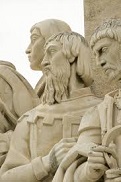
In 1434 after sailing from Lagos, Portuguese explorer Gil Eannes (Eanes) (1395-) rounds Cape Bojador (Bulging Cape) S of the Canary Islands on the W coast of Africa (modern-day Mauritania) in a modified fishing barquentine, and discovers the Rio de Ouro (Oro) to the S, bringing back wild roses to Sagres to prove their success, after 10 years of trying and 14th attempts, delighting Prince Henry the Navigator and opening the Portuguese Age of Discovery in Africa; next year he and and Afonso Goncalves Baldaia (1415-81) sail two ships 150 mi. S of the cape, reaching the African coast; the year after that Baldaia sails farther S along the coast of Western Sahara and collects thousands of monk seal skins before becoming the first Euro to cross the Tropic of Cancer and reach Pedra da Gale (Galha Point), becoming the first commercial cargo brought to Europe from West Africa; too bad, failure to find any natives to kidnap causes Prince Henry to not authorize another expedition until 1441 - more big strong Mandingos to kidnap?
In 1435 Abu Amr Uthman (-1488) becomes Hafsid ruler of Morocco in Ifriqiya in N Africa (until 1488), making vassals of the Zayyanids in W Algeria and the Wattasids in Morocco.

In 1441 Portuguese explorer Nuno Tristao (Tristão) (Tristam) sails to Cabo Blanco (Cape Blanc) S of Cape Bojador in West Africa, and finds the first loose African negroes running around without pink slips and dog tags, prompting plans to restart the slave trade; he brings back some Moors, who when they get to Portugal are allowed to return after trading themselves for "black Moors" with kinky hair; Portuguese Order of Christ member Antao Goncalves makes the first European landing on the W coast of Africa at Rio de Oro (Ouro) (Gold River) S of Cape Bojador, then brings the first black African slaves to Europe via the Atlantic Ocean (12 black Muslim Azanaghis) (before this they had all been brought via the Mediterranean, but weren't as good as the ones from the W coast?), which Goncalves gives as a gift to his boss Prince Henry the Navigator - I did what I did before love came to town?
In 1441 the city of Ougadougou (originally Kumbee-Tenga = head war chief's village) on the upper Volta River (modern-day pop. 2.2M/2.5m) becomes capital of the Mossi Kingdoms (Empire) (ends 1896).
In 1445 Antao Goncalves of Portugal visits the Bay of Arguin and contracts with Muslim merchant Ahude Meymam to purchase 10 black slaves, along with some gold dust and ostrich eggs, becoming the first recorded purchase of West Africans by Europeans in West Africa?
In 1445 Venetian explorer Ca'da Mosto discovers the Gambia River in West Africa, going approximately 150 mi. into the interior.
In 1445 Portuguese explorer Dinis Dias (Diniz Diaz), who was of retirement age but decided "he was unwilling to let himself grow soft in the well-being of repose" discovers and rounds Cape Verde (800km S of Cap Blanc) the westernmost point of Africa, and increases the Portuguese trade with West Africa; he misses the Cape Verdes Islands.
In 1446 Guinea-Bissau on the W coast of Africa is discovered by Portuguese explorer Nuno Tristao.
By 1448 approx. 1K black Africans have been carried to Portugal or its newly-acquired Atlantic islands Azores and Madeira.
In 1448 Danish nobleman Vallarte, who had joined the court of Portugal's Prince Henry the Navigator becomes the first N European on record to sail to West Africa; he is captured and killed off Goree.
About 1450 the Hausa Empire in C Africa in modern-day NW Nigeria flourishes; the Hausa language becomes the lingua franca of W and C Africa; "Sannu" = hello.


In 1453 C.E. European invasion of Africa really started when the Ottoman Muslims after hundreds of yearly attempts finally captured the eastern Christian outpost stronghold of Constantinople, freaking the entire Christian world and leading to perversions and flukes like Vlad Dracula the Impaler, causing the Portuguese under Prince Henry the Navigator (1394-1460) to accelerate their search for escape routes to the south, having already discovered the Azores (1432) and West Africa (1433) after they broke down and stooped to use the infidel Muslim astrolabe then made their own technological leap of a 3-masted vessel that allowed them to finally navigate in open waters around 1420. In 1441 the lucky Portuguese discovered cocoa puff African blacks, which they immediately recognized as two-legged animals that would be useful as slaves, setting up Elmina Castle (originally Castelo de Sao Jorge da Mina) (St. George of the Mine Castle) in Ghana in 1482, which became the world's #1 slave-trading post, it's as big as a horse, ask me about it sometime, gag. In 1486 they finally rounded the Cape of Good Hope, allowing them to go east and reach India and China. Meanwhile on June 18, 1452 after requests by Portuguese king (1438-81) Afonso V the African (1431-81), Pope Nicholas V issued the bull Dum Diversas, authorizing him to conquer and subdue diverse dumb African Saracens and pagans, and consign them to indefinite slavery, launching the West African slave trade. Too bad, on Jan. 8, 1455, after getting over the shock of the 1453 Ottoman Muslim capture and rape of Constantinople, and wanting to bless the adventurous but devout Portuguese and Spanish with global holy mojo, Nicholas V finally decided to take off the gloves and issued the bigger bull Romanus Pontifex, creating the Roman Catholic Doctrine of Discovery, with the soundbyte "We bestow suitable favors and special graces on those Catholic kings and princes... athletes and intrepid champions of the Christian faith... to invade, search out, capture, vanquish, and subdue all Saracens and pagans whatsoever, and other enemies of Christ wheresoever placed, and ... to reduce their persons to perpetual slavery, and to apply and appropriate ... possessions and goods, and to convert them to ... their use and profit." Not that I mind it when it comes to horrible Muslims, but when it ends up being used to enslave people just for not having white skin, it stinks.
In 1455 the uninhabited Cape Verde Islands 400 mi. W of Cape Vert, Senegal are discovered by Alvise Cadamosto (Alvide da Ca'da Mosto) (1432-83), a Venetian in the service of Portuguese Prince Henry, who goes on to explore most of Cape Vert (home of modern-day Dakar), the Senegal and Gambia Rivers (until 1457) - if only they had kept going west?
In 1462 Portuguese settlers found a settlement in the Cape Verde Islands off the W coast of Africa 400 mi. W of Dakar, Senegal, which they call Ribeira Grande, becoming the first permanent Euro settlement in the African tropics; Portuguese explorer Pedro de Sintra explores inland from Freetown Habor, naming the surrounding hill formation Serra de Leao (Sierra Leone) (Lion Mts.), AKA Sierra Leone, then goes on to explore the Benin Empire; in 1495 a fort and trading post are built in Freetown Harbor by Portuguese traders, which becomes a trading center for African slaves.

In 1464 Sonni (Sunni) Ali Ber (-1492) becomes king #1 of the Songhai (Songhay) Empire in W Sudan incl. the Timbuktu-Gao region, with Gao as the capital, which grows too big to manage before being conquered by the Askiya Dynasty in 1493, and by Morocco in 1591.
On Dec. 21, 1471 Portuguese explorers Joao de Santarem (Santarém) and Pedro (Pero) Escolar discover Mina (Elmina) (S coast of South Ghana 7.5 mi. W of Cape Coast) on the Gold Coast in West Africa, stretching from Cape Three Points to the Volta (Port. for bending or turning) River, and set up a trading station, becoming the first Euro settlement in West Africa; they go on to discover Annobon next Jan. 1 and Principe on Jan. 17, 1472.
In 1472 the Portuguese discover Cameroon, naming it after the giant shrimp (Port. camaroes) they find there.
In 1472 the Portuguese push past the equator, and Fernando Po (Póo) (Fernao do Po) discovers Fernando Po Island in the Bight of Biafra on the W coast of Africa, becoming strategically important as an entry port to the diseased "White Man's Grave" of the African equatorial zone.

In summer 1482 Portuguese navigator Diogo Cao (Diego Cam) (1452-86) becomes the first European to sight and enter the Congo River, discovering Angola (1482-4). On July 6, 1484 Diego Cam discovers and explores the mouth of the Congo River; later Nzinga Myemba, king of Congo (who later takes the name Dom Alfonso) invites the Portuguese to Christianize and Europeanize his kingdom.

Sounds like a hot night with a high class hooker? On Feb. 4, 1488 after reaching Walvis Bay in Dec., discovering the Westerlies and exploring Table Bay at the N end of the Cape Peninsula, then rounding the Horn, reaching a record S latitude for a European, becoming the first European to reach the Indian Ocean from the Atlantic Ocean, then turning NE and sailing for 30 days, Portuguese explorer Bartholomeu (Bartolomeo) Dias (Diaz) (1450-1500) discovers Mossel Bay, then turns back after reaching the mouth of Bushman's River on Mar. 12; in May on his return he discovers the Cape of Good Hope, which he calls the Cabo Tormentoso (Cape of Storms) before returning to Lisbon in Dec.; King John II later renames it in the spirit of Erik the Red to keep his sailors from bolting; he discovers Robben Island in Table Bay in South Africa, then returns to Lisbon in Dec.
In 1490 civil war begins in Monomotapa (Monomutapa) (AKA Mokaranga) in E Africa (modern-day Zimbabwe), stretching from the Zambesi River to the mouth of the Fish River; in early 1561 Jesuit priest Goncalo da Silveira Christianizes the king and many of his people, but some Muslim refugees from Mozambique cause kingy to flop and strangle him on Mar. 16.
In 1490 the Shilluk Kingdom (ends 1865) on the banks of the White Nile River in modern-day S Soudan is founded as a sacred monarchy by Nyikango, in which the king (reth) is also the chief priest, worshipping Juok; the kingdom reaches its zenith under king Dhokoth in 1670-90, after which King Tugo establishes Fashoda (modern-day Kodok or Kothok) as the capital, living on a homestead mound in four huts.
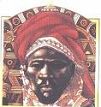
In 1493 Askia Mohammed Toure (1443-1538) becomes king of the Songhay (Songhai) Empire in W Sudan, growing it to the largest country in West African history (until ?), expanding trade with Europe and Asia, and establishing Islam as the official religion, spurring a cultural revival.
In 1494 the Kingdom of Saloum (ends 1969) in modern-day Senegal is founded as a sister kingdom to the Kingdom of Sine, with capital at Kahone.
On Dec. 25, 1497 (Christmas day) Vasco da Gama sights and names the South African country of Natal (Birthday).
In 1497 the Castilians invade N Africa (until 1510), and take the port of Melilla in NE Morocco - this one's for 711?

Just what the Indians need? On May 20, 1498 Portuguese explorer Vasco da Gama (1469-1524) becomes the first European to sail around Africa to reach India as he arrives in Kappakadavu near Calcutta on the Malabar coast, finding that Arab merchants already live there; on Aug. 29 he departs for Portugal, sailing against the monsoon winds, taking 132 days to reach the Arab-run coastal town of Malindi (pop. 6K) next Jan. 7 (vs. 23 days the other way to India), during which time half of his crew dies, and the rest get scurvy; Game Vasco meets with the sheik of Malindi to sign a trade agreement, and hires a guide for his voyage to India, erecting a coral pillar, which survives to modern times; next year the Portuguese establish a trading post in Malinda, followed in 1509 by a custom house, which is abandoned in 1512, although Malindi remains the center of Portuguese activity in E Africa until 1593.
In the 16th cent. Muslim Dyula-speaking Africans begin migrating from the declining Mali Empire into NE Ivory Coast, founding the city of Bego, later the city of Kong, displacing the animist native pop.
In the 16th cent. the Lake Chad area of Africa is split among the rival kingdom of Kanem-Bornu (ends 1900) and the sultanate of Bagirmi (Baghermi) (1522-1897).
On Aug. 10, 1500 (St. Lawrence's Day) Portuguese explorer Diogo Dias becomes the first Euro to sight Madagascar, naming it Sao Lourenco, connecting it with the Arabic Island of the Moon reported in 1490 by Portuguese explorer Pero da Covilha (Pêro da Covilhã) (1460-1527).

In 1501 the Spanish (Castilian) crown authorizes the horrible African slave trade under its monopoly, giving permission to Flemish, German, Dutch, Genoan and Portuguese merchants to engage in it, and in 1502 the first African slaves in America arrive in the Spanish colony of Santo Domingo (modern-day Dominican Republic) (guess who ran the Inquisition, the Dominicans), ordered by newly-appointed (1502-9) Hispaniola gov. Nicolas de Ovando y Caceres (Nicolás de Ovando y Cáceres) (1460-1518), who in 1503 begins distributing enslaved aborigines to encomiendas (Spanish-run fiefdoms of Indian slaves) to work the gold mines in Santo Domingo, which beoame the model for all them pesky New World savages, his own hyper-cruelty reducing the pop. of the West Indies aborigines from 500K in 1492 to 60K in 1507, pardon me while I vomit. No wonder the haughty Spanish (who prefer to just be called proud) love to dance that Flamenco dance - they are practicing grinding some helpless Indio or African face into the floor while the crowd claps and cheers and swigs Sangria, you had to be there, but we all had a face fiesta.
In 1501 Portuguese explorer Joao de Nova (1460-1509) discovers Ascension Island off the W coast of Africa; too bad, he fails to report it, causing fellow Portugese explorer Alphonse d'Albuquerque to rediscover it in 1503 on Ascension Day and name it; otherwise barren, it is a good place to hunt egg-laying green turtles. In 1502 he discovers uninhabited Saint Helena Island. in the S Atlantic Ocean 1.2K mi. W of Africa on the same latitude as the Angolan-Namibian border. In 1502 Portuguese traders take the first peanuts from Brazil and Peru to Africa; they reach China by 1573.

In 1502 the remaining Moors in Granada resist the Spanish army, and are crushed; Isabella I of Castile (1451-1504) forces the remaining Muslims in Spain to choose between conversion and exile so she can distribute Muslim land and people to Christian Castilians, causing the pissed-off Moors to flee to the N coast of Africa, found citadels and states, and turn into pirates known as Corsairs, going on to prey on Mediterranean and Atlantic shipping as far N as Britain and Iceland, and recruiting Christian converts to Islam; they are not stopped until 1816; meanwhile, copycat French corsairs begin attacking the Spanish fleet off the coast of Europe, the Azores, and Canaries, following them into the Caribbean; the English then say "let's get some" and follow their lead, and by 1650 the Golden Age of Piracy begins (ends 1726); meanwhile the Roman Catholic Spanish attempt to wipe out all traces of the Moors in Spain, burning 1M Arabic mss. and churning out tons of coverup lit. and art.
In 1503 Portuguese merchant-explorer Antonio de Saldanha discovers Table Bay at the N end of the Cape Peninsula at the base of Table Mountain in South Africa (later home of Robben Island of Nelson Mandela fame).
In 1504 the Funj Sultanate of Sennar (Sinnar) (Blue Sultanate) in E of Darfur in N Sudan with capital at Sennar is founded as a confederation of Islamic sultanates and dependent mainly animist tribal cheftaincies by Amara Dungas (-1534), who during the Ottoman conquest of Egypt in 1517 successfully uses diplomacy to stop the Ottoman armies from advancing into his realm, and officially converts it to Islam in 1523, reaching its peak in the 16th cent.; it becomes kaput on June 14, 1821 when Mehmet Ali's son Ismail leads an army into Sennar without resistance and deposes last king (since 1805) Badi VII, then annexes it to Egypt on Feb. 13, 1841, later becoming part of Anglo-Egyptian Sudan and the Repub. of Sudan.
In 1505 Kilwa Sultanate off modern-day Tanzania, ruled since 1277 by the Abu Moaheb family is overthrown by the Portuguese, and begins fragmenting, with some being absorbed by Oman.
In 1505 Sri Lanka (Ceylon) is discovered by Portuguese explorer Lourenco de Almeida (1480-1508) (son of Francisco de Almeida), who founds a settlement.

In 1506 after having to pass up a job as viceroy of India due to temporary blindness, Portuguese explorer Tristao da Cunha (1460-1540) (cousin of Afonso de Albuqueraue) sails to the E coast of Africa in a fleet of 15 ships to conquer Socotra Island, discovering the five volcanic Tristan da Cunha Islands 1.2K mi. from Saint Helena Island, the most remote archipelago on Earth, which remains uninhabited until 1810, visiting Madagascar and Mozambique before conquering Socotra - you don't even have a rear window wiper?

On Aug. 13, 1507 Dawit II (Wanag Segad = "to whom lions bow") (Lebna Dengel) (1501-40) becomes Solomonic emperor of Ethiopia (until Sept. 2, 1540), with Empress Mother Eleni as regent (until 1516), sending Armenian emissary Mateus (Matthew) the Armenian (-1520) to Portugal in 1514 to seek aid in fighting off the neighboring Muslim countries.
In 1507 after discovering Socotra Island in 1503, Portuguese navigator Diogo Fernandes Pereira discovers volcanic mountainous reefed Mauritius Island 500 mi. E of Madagascar, naming it Ilha do Dirne, but doesn't settle it; he also discovers the rest of the Mascarenhas Archipelago incl. Mauritius, Reunion, and Rodrigues, becoming the first Euro to sail E of Madagascar.
In 1509 Portuguese-speaking aborigine Nzinga Mbemba (Mvemba a Nzinga) (1456-1543) becomes king Alfonso I of the Kingdom of Kongo in Congo, Cabinda, and N Angola, with capital at M'banza-Kongo, and sets about trying to Christianize the kingdom; too bad, in the long run his efforts fail - other than to sweeten the pot?
In 1509 the Spanish under Francisco Jimenez de Cisneros capture Oran in North Africa.

On Mar. 1, 1510 after getting caught stealing cattle, a Portuguese exploration party led by Portuguese viceroy Dom Francisco de Almeida (b. 1450) (first Portuguese viceroy of India) is massacred at Table Bay by the native Khoikhoi (Hottentots), who kill 64 soldiers and 11 captains along with Almeida, causing the Portuguese to decide to stick to the E coast of Africa.
In 1510 Tripoli in N Africa is taken by the Spanish under Don Pedro Navarro, Count of Oliveto; in 1523 it is assigned to the Knights of St. John.
On Dec. 27, 1512 the Spanish Laws of Burgos are passed, forbidding enslavement of Native Ams. and advocating Christian (Roman Catholic) conversion; conveniently, prior enslavement has killed most of them, and the Spanish colonists in Hispaniola begin to import African slaves from Guinea, who last longer under slavery conditions than aborigines, and allegedly can do 4x as much work - as Jimmy the Greek says?
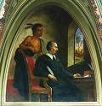
On Dec. 24, 1515 after arriving in Seville in Nov., slave-owning Spanish Dominican friar Bartolome de las Casas (1484-1566), who witnessed the extermination of the Arawaks (Tainos) of Cuba in 1513, causing him to flop on the issue of Indian slavery, complaining that "everything done to the Indians thus far was unjust" pleads to Charles V of Spain to replace Indian slaves with more "hearty" African slaves, and a license is given to Lorens de Gominot to import 4K African slaves (four for each Spanish emigrant) to Spanish Am. sugar plantations in the West Indies, causing de las Casas to later be blamed for launching African slavery in the Americas; in 1518 an 8-year monopoly is given by Charles V to La Bresa, who sells it to the Genoese, who buy their W African slaves from the Portuguese.
In 1516 after the Spanish establish themselves on a small island in front of Algiers, an force local ruler Salim al-Tumi to sign a peace treaty, pay tribute, and take an oath of obedience to Ferdinand II of Aragon, Algiers is captured and al-Tumi assassinated by Ottoman brothers Oruc Barbarossa and Haydreddin Barbarossa, who are sent by Sultan Selim I.

On Jan. 20, 1517 the Ottomans under sultan (since May 26, 1512) Selim I Khan "the Grim" (1465-1520) conquer and sack Cairo, and finish conquering Egypt from the Mamluks, occupying Cairo on Apr. 13, after which they conquer Mecca and the other holy places of Arabia, even (gasp) Nazareth; the Mamluk Empire (founded 1250) is kaput, but the Mamluks are retained as an Egyptian ruling class as vassals; Yemen is annexed to the Ottoman Empire; Grim I becomes the first caliph of the entire grim Islamic world.
In July 1517 after he has been raiding E Abyssinia for 25 years, always choosing Lent so that the Christian Ethiopians will be weak from fasting, the Ethiopians under emperor (since Aug. 13, 1507) Dawit II skip the observance of Lent and ambush and kill Emir Mahfuz of Adal, causing Dawit II to adopt the style "Wanag Segad", meaning "to whom lions bow"; meanwhile a Portuguese fleet burns the former Adal capital of Zeila in Somalia.
In 1518 after capturing Tenes, Ottoman adm. Oruc Barbarossa captures Tlemcen in NW Algeria, whose sultan flees to Morocco, giving Oruc control of the country behind the Spanish base of Oran 70 mi. away, threatening their supply routes; too bad, the Spanish counterattack, killing Oruc and regaining the Tlemcen region, only to see the red-bearded king Arouj of Morocco lead an army that expels them; too bad, Arouj is KIA in a battle with the Spanish, causing his brother Khair-ed-Din to appeal to the Turkish sultan for help, and after they drive the Spanish out of N Africa, he is appointed rep. of the Barbary States of Algiers and Tunis (modern Algiers and Tunisia), with HQ in Algiers, which with Tripoli (Libya) and Tangier (Morocco) (AKA the Barbary or Berber Coast) send pirate corsairs into the Mediterranean until the 19th cent., intercepting ships and holding hostages for ransom (Muslim jizya) - ending up as a Las Vegas casino?
On Apr. 9, 1520 a Portuguese embassy led by Dom Rodrigo de Lima arrives in Massawa, Ethiopia, meeting with emperor Dawit II on Oct. 19, who tells him that the Muslim threat to Ethiopia is kaput, and he finally leaves in 1526.
On Mar. 7-9, 1529 imam Ahmad ibn Ibraham al-Ghazi Gragn ("left-handed") (the Conqueror) (1507-43) of Adal in N Somalia launches the bloody Ethiopian-Adal War (Futuh al Habash) (Conquest of Abyssinia) (ends 1543) for the Muslim sultanate of Adal in the N Horn of Africa, using Ottoman-supplied cannons and a largely Somali army equipped with matchlocks to win the Battle of Shimbra Kure against emperor (since Aug. 13, 1507) Dawit II (Lebna Dengel), suffering such heavy losses that he withdraws for two years before returning and occupying two-thirds (three-fourths?) of Ethiopia before dying on Feb. 21, 1543, after which his forces withdraw; in 1577 Muhammad Jasa transfers the Ada capital from Harar to Aussa, after which the sultanate (founded 1415) ends in 1559 amid infighting with Afar tribes; after the Ethiopians are supplied with cannons by the Portuguese, the war becomes easier to fight.
In 1530 Juan de la Barrera of Seville, Spain begins transporting African slaves directly from Africa to the New World, bypassing Europe, starting a stampede; a significant percentage are Muslim, but they have to convert to Christianity or face death; the African slave trade will eventually bring 10M slaves to America.
On Feb. 17, 1536 the Dynasty of Phantoms ruling the Bandari Jungle in Africa begins as the first Phantom, "the Ghost Who Walks", son of Sir Christopher Standish swears his oath - The Phantom comic strip by Lee Falk and Ray Moore (debuts Feb. 17, 1936).
In 1537 the Mandinka Kaabu (Gabu) (N'Gabu) (Ngabou) Empire of Senegambia in modern NE Guinea-Bissau and Senegal splinters from the Mali Empire (ends 1867).
On Sept. 3, 1540 Gelawdewos (Claudius) (1521-59) is crowned Solomonic emperor Asnaf Sagad I of Ethiopia (until Mar. 23, 1559).
On Aug. 28, 1542 the Battle of Wofla near Lake Ashenge in Tigray, Ethiopia sees an army of 600-900 Ottoman musketeers and 20 Ottoman cavalry along with several thousand soldiers led by imam Ahmad ibn Ibrihim al-Ghazi (b. 1507), of the Muslim Sultanate of Adal crush a Portuguese expeditionary force of 290 musketeers and 23 Ethiopians, killing leader Cristovao da Gama (b. 1516) along with 160 Portuguese and eight Ethiopians, and capturing most of their muskets.
On Feb. 21, 1543 the Battle of Wayna Daga (Amharic for "grape-cultivating altitude") E of Lake Tana in Ethiopia sees 8.5K Ethiopian Christians led by Solomonic emperor (since 1540) Gelawdewos and aided by 70 Portuguese musketeers and 60 cavalry fight 14K infantry and 1.2K cavalry from the Muslim Sultanate of Adal led by imam Ahmad ibn Ibrihim al-Ghazi (b. 1507), who is KIA by a Portuguese musketeer, ending the Ethiopian-Adal War (begun 1529).
In 1545 the Ottomans return, conquer Massawa and occupy the rest of Ethiopia.
In 1545 Moroccan Wattassid sultan (1526-49) Ahmad el Outassi (Abu al-Abbas Ahmad ibn Muhammad) (-1549) is taken POW by the Sharifian Saadians, and Ali Abu Hassun, regent for Ahmad's young son Nasir al-Qasiri pleges allegiance to the Ottomans to obtain their support.

The original polymath with feet in two worlds? In 1546 Leo Africanus (Al-Hasan al-Wazzan) (Yuhanna al-Asa), AKA John/Johannes/Giovanni and/or Leo/Leone the Lion (1488-1554) pub. History and Description (Cosmography and Geography) of Africa; Granada-born Fez-raised traveler-diplomat meets Sultan Selim, is seized by Christian pirates in the Mediterranean, held as a prisoner in Rome with access to the papal library, meets with Pope Leo X, is baptized a Christian to get freed, and is given the surname "de Medici" by the pope, becoming a big dude in Rome, writing five books and meeting with Francois Rabelais before returning to Tunis and reverting to Islam; he describes Timbuktu as a city of gold where the emperor eats off half-ton golden platters, causing Euro explorers to becom
In 1549 the Kingdom of Cayor in NC Senegal splits off from the Jolof Empire, ruled by kings (damels) from the capital at Mboul; it is conquered by the French in 1868, regains its independence in 1871, and is defeated again in 1879, becoming kaput on Oct. 6, 1886.

In 1551 after getting pissed-off at Hospitaller attacks on Turkish ships, 12K Ottoman Janissaries on 112 galleys and two galleasses under adm. Dragut (Turgut) Reis (1485-1565) (successor of Khaireddin) and adm. Sinan (Sinanuddin Yusuf) Pasha (-1553) attack Venice, followed by Augusta, Sicily, followed by Port Marsa Muscietto, Malta, sieging the citadels of Birgu, Senglea, and Mdina, but fail to capture it, instead capturing the sister island of Gozo and taking 5K POWs as slaves; in Aug. they capture Tripoli from the Knights of St. John under cmdr. Gaspare de Villers, who is taken POW along with several knights, who are later released after intervention by French ambassador Gabriel d'Aramon (-1553); dragut becomes Ottoman gov. of Tripoli (ends 1711) - the idea of a Masonic-run empire in America with its own Marines who can storm the shores of Tripoli takes shape now?
In 1555 Henry II of France begins sending ships to Morocco.
In 1555 the Kingdom of Baol (Bawol) in C Senegal N of the Kingdom of Sine and S of the Kingdom of Cayor splits off from the Jolof Empire, with capital at Diourbel; the French conquer it in 1859-95.
In 1557 the Ottomans capture the ports of Suakin and Massawa (Mitsiwa, Batsi) on the African shores of the Red Sea, allowing them to resume trade through Egypt; they found the province of Habesh (Abyssinia), governed from Massawa.

In 1562 English profiteer Sir John Hawkins (Hawkyns) (1532-95) (2nd cousin of Sir Francis Drake, who starts out as his apprentice) sails to the New World along with three ships, kidnapping 301 African slaves from a Portuguese slave ship in Sierre Leone before reaching Borbuta, Venezuela, then Rio Hacha in Colombia, selling the slaves for sugar, ginger, and pearls in Santo Domingo after flaunting the Spanish, who try to impose taxes, which he laughs off with a threat of burning them down, causing them to ban all English ships from trading in the West Indies; he then returns to England via the French colony in Fla., arriving next Sept., giving his backers a tidy 60% profit, becoming the first to run the Triangular Trade to the Spanish colonies in the Americas and make a profit, interesting Queen Elizabeth I, who takes shares in his expeditions in 1564 and 1567, during which he makes improvements to English ships that help them win against the Spanish Armada in 1588, for which he is promoted to rear adm., while he introduces tobacco smoking to English sailors, along with sweet potatoes; thanks to Hawkins late in this cent. the Transatlantic Triangular Slave Trade is developed between W Africa, the Caribbean, and Europe (ends early 19th cent.).
In Apr.-June, 1563 the Sieges of Oran and Mers El Kebi in N Africa by 100K Ottoman troops in 30 galleys led by Adm. Hasan Pasha, son of Hayreddin Barbarossa is ended by the arrival of a Spanish fleet under Francisco de Mendoza.
In 1575-1600 192K slaves are transported from West Africa by the Portuguese.
In 1575 the Portuguese occupy and rebuild the destroyed town of Anfa (Casablanca) on the Moroccan coast, and name it Casa Branca (Casablanca); the surrounding Muslim tribes keep it under constant attack until they abandon it after an earthquake in 1755.
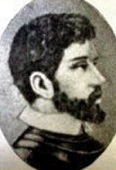
On Jan. 25, 1576 attracted by the silver mines of Cambambe, the Portuguese colonize Angola in Africa, and found the port city of Luanda (São Paulo da Assunção de Loanda) (modern-day pop. 2.8M) with 400 settlers (100 families) and 400 soldiers under Paulo Dias de Novais (1510-89) - luanda take a little boat trip?

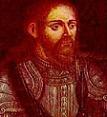
Rocking the suburbs, just like Michael did? Pushy Portugual goes too far, tries to reverse 7/11, and ends up zonking itself, letting Spain take it over? On Aug. 4, 1578 after ambitious Sebastian I of Portugal (b. 1554) leads an expedition to Morocco to Christianize the Muslim Moors in alliance with deposed sultan al-Mutawakkil, his 20K-man army is drowned and he is KIA along with al-Mutawakkil at the Battle of the Three Kings (Alcacer Quibir) in Alcazar; his regent and great-uncle Cardinal Henrique, the penultimate male prince of the legitimate line of the House of Braganza (Braganca) (founded 1442) becomes Henry (Henrique) I (1512-80), king #17 of zonked Portugal, which on his watch falls under Spanish control for 60 years; Abd al-Malik dies, and his brother Ahmad I al-Mansur the Victorious (El-Mansour Eddahbi) (1549-1603) becomes emir of Morocco (until Aug. 25, 1603), building the El Badi ("Marvelous") Grand Palace in Marrakesh and claiming the caliphate; Philip II of Spain orders the aged Duke of Alva on his last mission for the House of Hapsburg to conquer Portugal.
In 1581 Morocco under sultan (1578-1603) Ahmad I al-Mansur begins expanding across the Sahara Desert, targeting the gold-rich Songhai Empire of W Africa.
In 1585 the Kingdom of Luba in modern-day Katanga, S Dem. Repub. of Congo (DRC) is founded by King Kongolo Maniema, whose nephew-successor Kalala Ilunga expands the empire to the upper left bank of the Lualaba River, with a pop. of 1M, and an economy based on fishing, farming, and metal-working, with the kings considered sacred like in ancient Egypt; in 1889 after white Euro (mainly Belgian) colonists raid the empire for slaves, the kingdom is split in two by a succession dispute, and is later absorbed into Belgium's Congo Free State.
On Mar. 13, 1591 the Battle of Tondibi is a V for 1.5K Moroccan cavalry and 2.5K arquebusiers under Islamicized Spaniard Judar Pasha (-1606) over 40K bow-arrow-lance soldiers of the Sonhai Empire (begun 1464) under ruler (since 1588) Askia Ishaq II, becoming the first use of muskets in war in sub-Saharan Africa; after the capital of Gao is looted along with the trading centers of Timbuktu and Djenne, the Songhai Empire, the last great Sudanese empire becomes kaput.
In 1592 the Portuguese settle at Mombasa, Kenya on the E coast of Africa, and recognize the sultan of the coastal town of Malindi, who just captured it and moved there, moving their main base to Mombasa, after which Malindi goes feral.
In 1593 Ft. Jesus on Mombasa Island is founded by Philip I of Portugal to guard the port of Mombasa, Kenya; from the air it has the shape of a man.
On Apr. 26, 1599 Mansa Mahmud IV (Mansa Mamadou III), last great emperor of the Mali Empire attacks Jenne (Jenné) in C Mali, but is repulsed by Moroccan forces from Timbuktu, ending Mali's influence in the middle Niger region and beginning its disintegration - go team?
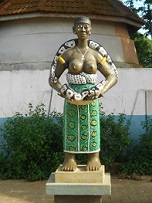
About 1600 (Do-Aklin) (Dogbari) Gagnihessou (Ganye Hessou) leaves the Moro River in Togo and founds the cool keyhold-shaped black-is-beautiful yes-we-have-no-slaves-today tell-it-to-the-witch-doctor Fon kingdom of Dahomey in W Africa is founded on the Abomey Plateau in modern-day Benin with Aja settlers from Allada; too bad, about 1640 his brother Dakodonou (-1645) becomes king #2 of Dahomey in W Africa (until 1645) after overthrowing him while he is out bar-hopping around his kingdom, going on to become a brutal mutha who murders indigo planter Donou and has fun rolling his corpse around in an indigo jar, appending his name to his own; Dahomey goes on to have Twelve Kings, fudge a little here and there, and become a tributary to the Oyo Empire before breaking free in 1823, building its economy on conquest and slave labor along with trade with Europeans, with an organized military that features female Amazon warriors; it becomes kaput in 1904; meanwhile early in this cent. Kpasse (Kpassè), ruler of the kingdom of Houeda (Houéda) in Dahomey (known for his Python Temple) begins selling his people as slaves to the French, English, and Dutch in exchange for trinkets from the port of Ouidah; too bad, these slaves bring the native superstition of voodoo with them to Haiti, the Netherlands Antilles, and North Am.
In 1610 a Portuguese settlement is founded at Cape Coast (Cabo Corso) 100 mi. W of Accra on the Gulf of Guinea, home of the Fante (Fanti) people.
In 1617 the Dutch buy Goree Island (off Cape Verde) from the natives.
On Oct. 6, 1620 a group of anti-Roman Catholic rebels in Ethiopia are crushed by Emperor Susenyos' half-brother Sela Kristos at Mount Amendamit in Gojjan.
About 1625 the Kuba (KuBa) (Bakuba) (Bushongo) Kingdom is founded by Shyaam a-Mbul a Ngoong in SE modern-day Dem. Repub. of Congo (DRC) by uniting all local chiefdoms under his rule, worshiping the Sky Father Bumba and the original human Woot, becoming known for tukula (twool) cosmetic powder made of ground cam wood, raffia embroidered textiles, wooden ndop figures representing royalty, and carved palm wine drinking cups; after white Euros reach the area in 1884, and the Nsapo people invade it, it fractures back into chiefdoms; in 1969 Kot-a-Mbweeky III becomes king of Kuba (until ?).

In 1632 Fasilides (Basilides) (1603-67) becomes Solomonid emperor of Ethiopia (until Oct. 18, 1667), going on to isolate Ethiopia from foreign influences, expel the Jesuits in 1633, restore the Ethiopian Orthodox Church, and found a new capital at Gondar (Gonder) N of Lake Tana in 1636, complete with cool Gondar Castle (Fasil Ghebbi) to counter invasions by Galla peoples to the S; in 1665 he orders the "books of the Franks" (Roman Catholics) burnt.
In 1635 Abd al-Karim leads an army of Maba and other small groups E from Lake Chad to conquer the Tunjurs, becoming the first kolak (sultan) of the Muslim Wadai (Ouaddai) Empire, with capital at Abeche (Abéché), an offshoot of the Sultanate of Darfur NE of the Kingdom of Baguirmi, going on to resist the French until 1912, when it is incorporated into the Repub. of Chad.
In 1635 Spanish slave ships from Nigeria sink off the coast of St. Vincent; the survivors intermarry with the native Caribs, creating the Black Caribs.
In 1635 Roman Catholic missionaries arrive in Senegal.
In 1641 civil war brings the collapse of the govt. in the African Congo.
In 1645 Dahomey king (since 1620) Dakodonou dies, and his nephew Aho Houegbadja (-1685) becomes king #3 of Dahomey in W Africa (until 1685), founding the capital city of Abomey (Agbome) ("middle of the ramparts") near Guedevi (modern-day pop. 90K).
In 1648 a Dutch East India Co. ship is stranded in Table Bay, South Africa, and after rescue the crew gives glowing reports of the natural resources, causing a colonization expedition to be sent in 1652.
In 1650 the first French settlement on the Senegal River in W Africa is made at Saint-Louis.

On Apr. 6, 1652 three ships of strict Calvinist Dutch settlers led by Johan Anthoniszoon "Jan" van Riebeeck (1619-77) of the Dutch East India Co. arrive in Table Bay (beneath Table Mountain) at the N end of the Cape of Good Hope in SW South Africa, and found Cape Colony and Cape Town (Kapstaad) as a Dutch East India Co. supply station; their descendants become known as Boers ("farmers"); the Dutch dialect in this isolated area begins to absorb words from French, German, Scandinavian, and Malay-Portuguese, evolving into the Afrikaans language.
In 1661 the Swedes establish a fortress colony in Christiansborg on the Gold Coast near modern-day Accra ("soldier ants") (modern-day pop. 1.6M/2.0M) in Ghana, which ships slaves, ivory, and gold to Europe in exchange for liquor and cowrie shells to buy them with, and weapons and gunpowder to enforce the deals.
In 1665 the French East India Co., head by Francois Caron (1600-73) unsuccessfully attempts to set up a colony on wild Madagascar, but succeeds on the nearby islands of Bourbon (Mauritius) and Ile-de-France (Reunion).
About 1665 the Kingdom of Lunda in modern-day Dem. Repub. of Congo (DRC), NE Angola, and NW Zambia, centered in Katana is founded by Luba king Ilunga Tshibinda, who becomes king (mwanta yamvo) #1 of a confederacy of chieftains, with capital in Asokwele, growing from 150K sq. km in 1680 to 300 sq. km in the mid-19th cent., with a pop. of 175K; too bad in the 19th cent. the Western-armed Chokwe invade, ending the kingdom and establishing their own until 1884, when the territory is divided between Portuguese Angola, the Congo Free State of Belgian king Leopold II, and the British, becoming Angola, Dem. Repub. of Congo (DRC), and Zambia.
In 1672 Yohannes (John) I (1640-82), AKA A'ilaf Sagad ("him to whom tens of thousands bow"), 4th son of Fasilides becomes emperor of Ethiopia (until 1682), ordering all Roman Catholics who won't embrace the Ethiopian Church expelled, and executing six Franciscan missionaries sent by Pope Alexander VII, while welcoming Armenian Orthodox Church missionaries, who share his Miaphysitist beliefs, that in the person of Jesus Christ, divinity and humanity are united in one nature without separation, confusion, or alteration, although he deviates from them with the Qebat (Unction) formula: "Through unction Christ was consubstantial with the Father".
In 1672 the French Senegal Co. (Compagnie du Sénégal) is founded, gaining control of some of the territories of the French West India Co.; in 1696 it is refounded as the Royal Co. of Senegal, and refounded again in 1709 as the Senegal Co.; meanwhile after being chartered in 1660 and going bankrupt in 1667, the me-too British Royal African Co. is chartered with a monopoly on the slave trade, soon supplying West Indies sugar plantations with 3K slaves a year.
In 1677 France takes the island of Goree (Gorée) (Dutch "Goedereede" = good roadstead) off the coast of Cape Verde Peninsula from the Potuguese, becoming the start of the city of Dakar, Senegal (modern-day pop. 1.1M/2.4M), westermost city on the African mainland and the Old World.
In 1688-9 300 French Huguenot refugees arrive in South Africa, causing a culture war which the Dutch win with a 1701 law that only Dutch should be taught in schools, causing them to be assimilated by the mid-18th cent., when the total number of white colonists numbers 8K-10K.
In 1689 Natal in Africa becomes a Dutch colony.
In 1690 the Aro Confederacy (Omu Aro) is founded by the Aro people (Igbo subgroup) in modern-day SE Nigeria, centered in Arochukwu, becoming known for exports of palm oil and slaves (ends 1902).
In 1698 Saif bin Sultan, imam of Oman takes Ft. Jesus in Mombasa, Kenya from the Portuguese after a 2-year siege, after which they eject them from Zanzibar and other coastal regions N of Mozambique, giving them control of the main slave market on the E African coast in Zanzibar.
In the 18th cent. the Muslim Arab Slave Trade in E Africa sees 500-1K slaves taken at a time from villages in E Africa, held in Zanzibar in the Shimoni Caves for up to three weeks, then shipped to Yemen and America; it continues until the 19th cent.; the port city of Bordeaux, France becomes a major player in the Trianglular Trade of slave ships trading weapons, cloth, and trinkets for African slaves, who are then shipped to the Indies and traded for sugar, coffee, chocolate, and cotton, creating wealthy families who plow their money into wine estates, making Bordeaux wine #1, with names like Mouton, Lafite and Margaux; in 1700-1800 500+ slave ships sail from Bordeaux; meanwhile in the still lily-white Va. Colony racial attitudes harden to the point that all blacks are considered slaves, and manumission requires them to leave so they don't have to deal with a mixed society; meanwhile the white elite fosters racism to keep the downtrodden white lower classes from uniting with the blacks against them and instead prefer racial solidarity, leading to the tragic Pickett's Charge for Ole Virginny in 1863? In 1700-1850 more than 70% of the 12M total slave exports across the Atlantic occur, with a mortality rate of 35% (9.5M surviving). In 1700-1810 ships bring nearly 1M African slaves to work in sugar planations in Jamaica and Barbados; British sugar consumption grows from 4 lbs. per capita in 1700, 18 in 1800, 36 in 1850, to 100+ by 1900.
In 1701 the Ashanti (Assante) Empire in Ghana (ends 1957) is founded by king (since 1675) Osei Kofi Tutu I (1660-1717), who sits on the Golden Stool, becoming known for early adoption of firearms and going on to expand to modern-day Ivory Coast, becoming a favorite with historians for its military prowess, wealth, culture, architecture et al.
In 1702 the Asiento Guinea Co. is founded for the America-Africa slave trade.
In 1710 the Muslim Kong (Wattara) (Ouattara) Empire in NE Ivory Coast (ends 1898) is founded by Dyula immigrants from the decling Mali Empire, becoming a commercial center and center of Islamic studies.
In 1711 Turkish Janissary Ahmed Karamanli (1686-1745) kills the Ottoman gov. of Tripoli in Libya, and establishes himself as pasha, ending Ottoman control (since 1551) and establishing the Karamanli Dynasty (ends 1835), which pays tribute to the Ottoman sultan while engaging in piracy.
In 1718 Houessou Akaba (ruled since 1685) dies of smallpox, and his brother Dossou Agadja (Agaja) (-1740) usurps the throne from Akaba's 10-y.-o. son Agbo Sassa, and becomes king #5 of Dahomey in W Africa (until 1740), going on to get his butt kicked by the Yorubas and end up with his kingdom paying the king of Oyo an annual tribute of human slaves for the next cent., but making up for it by conquering the Savi city of Ouidah in 1724 using his Dahomey Amazon nude bodyguards as warriors, giving Dahomey direct access to the sea and the lucrative slave trade; starting next year the majority of African slaves brought to La. (until 1731) come from Benin, bringing La. Voodoo with them.
In Apr. 1725 after mapping the W African Kingdom of Whydah, French explorer Reynaud des Marchais, Chevalier des Marchais witnesses the coronation of king Haffon (1695-1727); Whydah is conquered by Dahomey in 1727; he also discovers the Miracle Fruit (Synsepalum Dulcificum), whose berries cause sour foods (lemons, limes etc.) to taste sweet; it takes until 1968 to isolate the active ingredient miraculin.
In 1729 Portugal loses Mombasa on the coast of Kenya to the Arabs.
On Apr. 2, 1732 warriors from Dahomey attack a Dutch West Indies Co. trading station in the port of Jakin, and capture three employees, causing the Dutch to send negotiators led by Jacob Elet next year to king Dossou Agadja to negotiate their release.
In 1740 Dossou Agadja (ruled since 1708) dies, and his son Tegbessou (Tegbesu) (Bossa Ahadee) (-1774) becomes king #6 of Dahomey (until 1774), going on to equip his army with blunderbuses and make £250K a year selling his fellow Africans into slavery by 1750.
In 1745 Ngwane III (-1780) becomes the first king of modern Swaziland (until 1780), which is called Kangwane.
In 1750 in early spring Kunta Kinte (1750-1822) is born in the village of Juffure, four days upriver from the coast of The Gambia; he is bushwhacked by slavers and shipped to North Am. in 1767 :) (Alex Haley's Roots).
In 1751 Karamoko Alifa (Ibrahim Musa) Muslim leader (alamami) of the jihad in the Futa Jallon region of West Africa (modern-day Guinea) dies; in 1776 Ibrahim Sori succeeds him, creating an Islamist state, with the movement spreading to Futa Toro in modern-day Senegal in 1776, led by Abd al-Qadir (-1806); the movement ends with French occupation.
In 1760 Afrikaner elephant hunter Jakobus Coetsee becomes the first white man to cross the Orange (Groot) River to the N bank.
In 1765 the Portuguese found the town of Bissau at the mouth of the Geba River in W Africa as a fort.
In 1774 King (since 1740) Tegbessou dies, and his son Kpengla (1735-89) becomes king #7 of Dahomey in W Africa (until 1789), going on to extend Dahomey territory into Togo and kick Nigerian butt for interfering with his slade trade using his new trade flintlocks.
In 1775 Phalo ka Tshiwo (b. ?), ruler (since 1736) of the Xhosa, southernmost of the Bantu peoples dies, beginning a series of succession disputes until 1782.
In 1778 the islands of Fernando Po (modern Bioko) and Annobon (Pagalu) in the Gulf of Guinea in W Africa come under Spanish control (until 1968).
On Jan. 30, 1779 Senegal is restored to France; the British attack, capturing Goree.
In 1780 Ngwane III dies, and his son Ndvungunye (Mavuso II) (Zikodze) (-1815) becomes king of Swaziland (until 1815).


In Jan. 1785 U.S. ships Dauphin and Maria are captured by Muslim Algerian pirates, who parade the 21 crewman to their leader the dey, who spits on them and says "Now I have you, you Christian dogs - you shall eat stones"; this action become one of the driving reasons for adopting the U.S. Constitution on Mar. 4, 1789, according to Thomas Bailey - let's say the war began and ask Pres. Obama why he's so clueless? In Mar. 1785 Thomas Jefferson and John Adams visit Tripoli's ambassador to London Sidi Haji Abdrahaman, and ask him by what right the Barbary states preyed upon American shipping, enslaving both crews and passengers, and he replies: "It was written in the Koran, that all Nations who should not have acknowledged their authority were sinners, that it was their right and duty to make war upon whoever they could find and to make Slaves of all they could take as prisoners, and that every Mussulman who should be slain in battle was sure to go to Paradise." On July 11, 1786 Morocco agreed to stop attacking U.S. ships in the Mediterranean for a jizya payment of $10K. On Aug. 18 after a debate about whether the U.S. should have a permanent navy to fight Muslim piracy, Thomas Jefferson wrote to James Monroe: "The states must see the rod; perhaps it must be felt by some one of them... Every national citizen must wish to see an effective instrument of coercion, and should fear to see it on any other element than the water. A naval force can never endanger our liberties, nor occasion bloodshed; a land force would do both"; on Dec. 26 Jefferson wrote to Ezra Stiles: "It will be more easy to raise ships and men to fight these pirates into reason, than money to bribe them." Too bad, despite fair warning, due to their pioneering effort in separating church and state, big brains like Thomas Jefferson and James Madison were leery to show intolerance to any religion, however nuts, and contented themselves with calling Muslim nations in North Africa who were doing what the Quran commanded them to do since Day One "barbaric", and leaving it at that, although don't get them wrong, they worked 24/7 to make the U.S. the last best hope of mankind with an unbreakable Wall of Separation of Church and State, which includes Mosque, Temple, etc. Actually, that wall only applied at the federal level, because every state had an established church, and it was only in the 20th cent. that the U.S. Supreme Court began legislating from the bench and transmuting it into what it is now, if anybody can figure it out. In 1797 after suffering for years and sending negotiators with money on his advice based on his Yankee belief that having to pay the jizya should just considered a cost of doing business in the Mediterrean, despite the problemo of sailors being captured and forced into slavery, Pres. John Adams signed the Treaty of Tripoli with the pesky Muslim Barbary pirates of Morocco, Algeria, Tripoli, and Tunis, and the freethinking U.S. emissary Obama, er, Joel Barlow (1754-1812) got cute and imaginatively translated the Arabic version into English, adding the famous Article 11: "As the Government of the United States of America is not, in any sense, founded on the Christian religion; as it has in itself no character of enmity against the laws, religion, or tranquility, of Mussulmen; and, as the said States never entered into any war, or act of hostility against any Mahometan nation, it is declared by the parties, that no pretext arising from religious opinions, shall ever produce an interruption of the harmony existing between the two countries." There actually wasn't an Article 11, but Barlow had been dipping into his Gibbon and thought he'd score one against the Christian Bible-thumpers for his personal friend Tom Paine and set the bar low, but it was the version read to and ratified by the U.S. Senate, setting it back 1200 years and undoing all the work of all Western freethinkers, I hope not, some language in a Senate treaty isn't the same thing as a constitutional amendment. This was actually the first example of Islam history ignoramus Americans bowing to Islamic Sharia, disavowing knowledge of their own Christian foundations to appease madass Muslims. You guessed, it, within months of his inauguration, U.S. Pres. Barack Obama in his June 4, 2009 Cairo Speech cited it to justify calling the U.S. a nation of Muslims, not realizing that the Barbary pirates demanded and got a giant jizya bribe to stop, their emissary quoting the Quran that all nations not acknowledging Sharia were sinners and that it was their right and duty to make war upon them and make slaves of all Yankee prisoners they took, and of course if they are slain in battle they get saved, thank you Jizzus, and go straight to Pair a Dice, roll them dice for my soul I'll take the chances, pass the booty. Obama's predecessor George Washington actually uttered the soundbytes "Would to Heaven we have a navy to reform those enemies to mankind or crush them into nonexistence", and "I plead with you to maintain your stance against the evil empire of darkness. I pray God to give you strength, courage, and knowledge in spreading the truth. Islamic followers are a formidable and dangerous enemy." After they demanded more bribes (Allah told them to make it a permanent thing, right?) and were refused, they declared war on the U.S. on May 14, 1801 (you guessed it, Thursday), starting the First Barbary War (1801-5), after which the U.S. under pres. Thomas Jefferson sent the USS Constitution AKA Old Ironsides to land U.S. Marines on the shores of Tripoli and kick their dern Muslim butts in the Battle of Derna (Derne) on Apr. 27-May 13, 1805, as forever enshrined in the Marine Corps Hymn, see the Best of the Dean Martin Variety Show. Oh if we had Washington or Jefferson in the White House now, I'm sure they're both rolling over in their monuments, no wonder Adams wasn't given one, tell us about the Hollywood Triple Play. You guessed it again, in the Cairo speech Obama referred to the fact that big brain Jefferson had a copy of an English translation of the Quran in his giant library to justify his pro-Muslim pep talk (the library Jefferson donated to Congress to start their library), but actually he obtained it only so that as cmdr. in chief he could study the enemy intel to help him win the Barbary War and kill hated Muslims better, not because he was a fan or devotee of it and two steps from converting. He actually figured out from it how Muslims want infidels to pay jizya, and decided to never bow to them and to fight them militarily instead. In 1804 freethinker Jefferson worked over the Christian gospels, which he thought worth salvaging, not the Quran, producing the Jefferson Bible by taking scissors and cutting out all the passages portraying Jesus as divine or having supernatural powers, plus any perceived contradictions, absurdities or misinterpretations by the writers, so it's too bad he must have dropped the Quran after the war or else we'd have the Jefferson Quran too, either that or when he got done it was down to a few sentences. Speaking of John Adams, he backed the Christian religion as a pillar of govt., with the Oct. 11, 1798 quote: "Our Constitution was made only for a moral and religious people. It is wholly inadequate to the government of any other." In a letter to Jefferson, Adams wrote the soundbyte: "The general principles on which the fathers achieved independence, were the only principles in which that beautiful assembly of young men could unite, and these principles only could be intended by them in their address, or by me in my answer. And what were these general principles? I answer, the general principles of Christianity, in which all those sects were united, and the general principles of English and American liberty, in which all those young men united, and which had united all parties in America, in majorities sufficient to assert and maintain her independence. Now I will avow, that I then believed and now believe that those general principles of Christianity are as eternal and immutable as the existence and attributes of God; and that those principles of liberty are as unalterable as human nature and our terrestrial, mundane system." Adams also had an English trans. of the Quran, where he wrote the following preface: "This book is a long conference of God, the angels, and Mahomet, which that false prophet very grossly invented; sometimes he introduceth God, who speaketh to him, and teacheth him his law, then an angel, among the prophets, and frequently maketh God to speak in the plural... Thou wilt wonder that such absurdities have infected the best part of the world, and wilt avouch, that the knowledge of what is contained in this book, will render that law contemptible." In a letter to his friend Thomas Jefferson dated July 16, 1814, Adams calls Muhammad "a military fanatic" who "denies that laws were made for him; he arrogates everything to himself by force of arms." In a Letter to Dr. Benjamin Waterhouse dated June 26, 1822, Jefferson wrote: "Verily I say these are the false shepherds foretold as to enter not by the door into the sheepfold, but to climb up some other way. They are mere usurpers of the Christian name, teaching a counter-religion made up of the deliria of crazy imaginations, as foreign from Christianity as is that of Mahomet."

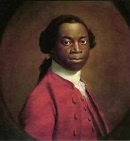
On May 15, 1787 a group of "Black Poor" from London (incl. some African-Am. slaves freed by the British for fighting for their side in the Am. Rev.) accompanied by some English tradesmen financed by the St. George's Bay Co. arrive off the coast of Sierra Leone ("Lion Mountains") in Africa, and in Aug. found Freetown on the coast after British Anti-Slavery Society leader Granville Sharp (1735-1813) leases some land from a local tribal chief; too bad, disease and hostile natives virtually wipe the group out, causing Nigerian-born former African-Am. N.C. slave Thomas Peters (Potters) (1738-92) to found the Sierre Leone Co. to recruit another group to try it again in 1792, after which the 1807 abolition of the slave trade by Britain causes British ships to start delivering thousands of African "recaptives" to Freetown after liberating them from illegal slave ships.
In 1789 the Xhosa cross the Fish River in the Eastern Cape, coming into conflict with Afrikaner trekboers and starting a 20+-year war that pushes them E - we planned that vacation for months and wouldn't you know it, a migraine hit?
In 1789 king (since 1774) Kpengla dies, and his eldest son Agonglo (1766-97) becomes king #8 of Dahomey in W Africa (until 1797), becoming the first king of Dahomey to marry a white woman, a Dutch babe named Sophie.
In 1790 after living for generations in Morocco and building the cities of Meknes and Fez, a change in rulers causes the Jews to be expelled, and 60 jump to their deaths by fire rather than convert to Islam on the orders of Moulay Yazid.
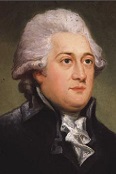
On Mar. 9, 1792 British evangelical Christian abolitionist naval officer Lt. John Clarkson (1764-1828) arrives in Sierra Leone with 1.2K unwelcome freed Am. black slaves from the Am. Rev. War from Nova Scotia in 15 ships led by Thomas Peters (Potter) (1738-92), who found the utopian settlement of Freetown, with Clarkson as gov. #1 (until Dec. 1792); Big Peter gets into a political struggle with Clarkson then dies of malaria in Freetown during the rainy season, leaving descendants who become the Krio (Creole) people of Sierra Leone; too bad, these whitened-up Africans end up creating a race-based class society that keeps the indigenous African pop. down, causing resentment and hostility.
On Sept. 16, 1795 British forces capture Capetown, South Africa.

On July 21, 1796 after leaving Portsmouth, England last May 22 on the Endeavor, and reaching the Gambia River on June 21, disembarking on Dec. 2 to explore the interior with two native guides, getting captured and imprisoned by a Moorish chief for 4 mo. and escaping on July 1 with only a horse and pocket compass, Scottish surgeon-explorer Mungo Park (1771-1806) becomes the first European to discover the Niger River near Segou in modern-day Mali, following the river 300 mi. to Bamako and returning to Scotland via Antigua on Dec. 22, causing a sensation with the big news. In 1799 he pub. Travels in the Interior Districts of Africa: Performed under the Direction and Patronage of the African Association in the Years 1795, 1796, and 1797,. announcing his big discovery of the Niger River, becoming a big hit and increasing interest in Africa, inspiring other explorers; "Whatever difference there is between the negro and European, in the conformation of the nose, and the colour of the skin, there is none in the genuine sympathies and characteristic feelings of our common nature"; "They [Mandinkas] were all very inquisitive, but they viewed me at first with looks of horror, and repeatedly asked if my countrymen were cannibals. They were very desirous to know what became of the slaves after they had crossed the salt water. I told them that they were employed in cultivating the land; but they would not believe me... A deeply-rooted idea that the whites purchase negroes for the purpose of devouring them, or of selling them to others that they may be devoured hereafter, naturally makes the slaves contemplate a journey towards the coast with great terror, insomuch that the slatees are forced to keep them constantly in irons, and watch them very closely, to prevent their escape."
In 1797 king (since 1789) Agonglo dies, and his son Adandozan (-1818) becomes king of Dahomey in W Africa (until 1818), with a regent ruling until 1804, going power-mad and throwing subjects to pet hyenas and slitting women's wombs and other nasty jazz.
In 1799 the 14K Xhosa (Khoi) soldiers in British service on the frontier of the South African Eastern Cape, assigned to control the Bantu farmers rebel, and that great idea goes down the tubes, beginning the nine Xhosa Wars (ends 1879).
On May 10, 1801 after a $225K bribe is refused by the Jefferson admin., the pasha (eyalet) of Tripoli declares war on the U.S., starting the First Barbary (Barbary Coast) (Tripolitan) War (ends June 10, 1805) (2nd in 1815) between the U.S. and Sweden vs. Tripolitania and Morocco; on July 17 the U.S. fleet arrives in Tripoli with the schooners USS Enterprise and USS Constitution (AKA Old Ironsides) to do battle with the Quran-thumping Muslim Barbary pirates, who claim the Quran gives them the right to make war on any nation not submitting to Sharia and take prisoners and booty - an early episode of Star Trek, and it's between the Stars and Strips and Islam?

On Feb. 16, 1804 U.S. Navy Lt. Stephen Decatur Jr. (1779-1820) leads a successful raid into Tripoli Harbor to burn the captured anchored U.S. Navy frigate USS Philadelphia, earning him the praise of British adm. Horatio Nelson, who calls it "the most bold and daring act of the age", along with a promotion to capt.; Pope Pius VII credits the U.S. with doing "more for the cause of Christianity than the most powerful nations of Christendom have done for ages", causing James Madison and Thomas Jefferson to rebuff him, claiming that they exhibit "universal toleration in matters of religion" and it was only about national interest - the fatal blindness of the fledgling U.S., Osama bin Laden would laugh?
On Feb. 21, 1804 the Fulani War (Jihad) in modern-day Nigeria and Cameroon begins when Suni Maliki Muslim teacher Usman dan Fodio (Usuman bii Foduye) (1754-1817) (Qadiri Sufi) is exiled from Gobir by his former student King (since 1801) Yunfa, pissing him off and causing him to assemble a Fulani army to wage jihad against the Hausa kingdoms of N Nigeria, losing the Battle of Tsuntua in Dec., losing 2K KIA incl. 200 hafiz, then capturing Kebbi and Gwandu in 1805, making Gwandu into their base, then capturing the Gobir capital of Aikalawa in Oct. 1808 and executing Yunfa, establishing the Sokoto Caliphate in 1809 (ends 1903), which becomes one of the largest states in Africa this cent., inspiring other jihads in W Africa.
On Nov. 30, 1805 after the USS Constitution captured Tunisian vessels attempting to run the American blockade of Tripoli, causing the bey of Tunis to threaten war and send Tunisian envoy Sidi Soliman Mellimelli to negotiate full restitution and barter for tribute, he and his 11 attendants were greeted at the Washington Navy Yard with full military honors, becoming the first Muslim envoy to the U.S.; Mellimelli requested that concubines be supplied as part of his accomodations at a Washington hotel; after seeing a delegation of Native Ams. and finding that they didn't follow Moses, Christ, or Muhammad, he called them "vile heretics", guess what Islam would have done to the entire continent if it had discovered it first; on Dec. 9 Pres. Jefferson invited him to the White House for a Ramadan iftar dinner at sunset instead of the usual 3:30 p.m. to accomodate him; after Jefferson refused to pay tribute, Mellimelli claimed that he will be beheaded for failure, after which the Yanks agreed to send gifts with him of equivalent value to the four horses and other gifts he brought; on Aug. 13, 2010 Pres. Obama referred to the event as the first iftar celebration in the White House, as if it were a custom, when they were barely able to tolerate the hideous barbaric extortionist at all, and Jefferson's study of the Quran made him reject any idea of paying jizya in favor of military attack on the Muslim pirates.

On Feb. 4, 1807 (Wed.) after a month-long fight, the English House of Lords passes the Abolition of the Slave Trade Act of 1807 of William Wilberforce (1759-1833), followed by the Commons on Feb. 22 by 283-16 (as Wilberforce sits in his chair weeping?), which is given royal assent on Mar. 25, but the law has no teeth, and the light fines and nonexistent jail prospects make scofflaws out of ship captains, who often chuck slaves overboard to avoid paying; Wilberforce spends the next 18 years of his career in the House of Commons fighting for the total emancipation of existing slaves; meanwhile the U.S. Congress bans the importation of slaves beginning Jan. 1, 1808; the U.S. now supplies 60% of Britain's cotton - you can't flag the king, or, illegal use of a hand truck?
In 1807 the Twi-speaking Ashanti (Asante) (Ashantee) people N of Ghana federate into a kingdom, and begin attempting to conquer the Fanti tribes of the coast, tangling with the British (until 1826).
In 1807 Sierra Leone and Gambia become British crown colonies.

On Nov. 24, 1810 after being enticed into signing an agreement, South African-born 4'10" Sara(h) "Sartje" Baartman (1789-1815) is exhibited in London as the "Hottentot Venus", with white men and women closely ogling her gigantic buttocks while pretending to scientifically study her; in Sept. 14 she is sold to animal trainer S. Reaux in Paris, France, who exhibits her for 15 mo. at the Palais Royal; on Dec. 29, 1815 she dies, and her body cast and skeleton are put on display until 1974-6, after which a movement gets her remains repatriated to her homeland on May 6, 2002.
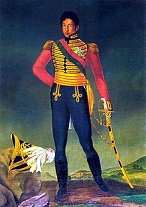
In 1810 King (since 1787) Andrianampoinimerina of Imerina (b. 1745) dies, and his son Radama I (the Great) (1793-1828) becomes king #1 of Malagasy-run Madagascar (until July 27, 1828) (capital Antananarivo) (the C plateau of the island) (known for introducing the spade in rice fields, then declaring "the sea is the boundary of my rice field), then playing the new big boy British and old beaten dog French off against each other, signing a treaty with the Brits in 1817 which gives him support in exchange for ending the slave trade, then going on to conquer the island, modernize it, devise a written form of the Malagasy language, invite British Protestant missionaries in, and marry 12 Great Wives, one of whom, bad news Ranavalona he adopts as his sister.



In 1811 Egypt under Albanian import Pasha Mehmet (Muhammad) Ali (1769-1849) throws off the Mamluks, establishing a dynasty that rules until 1952. He did it by inviting the Mamluk leaders to a banquet in Cairo, then having them murdered and sending his army to rout their forces, after which he tried to establish his own empire on the decaying remains of the Ottoman one, modernizing and Westernizing Egypt and nationalizing and confiscating as much land as he could from farmers while building armaments factories and a navy. In 1812 he captures the Hejaz, turning the Saudis against him, which he takes care of by capturing family head Abdullah ibn Saud and executing him. In 1820 he begins taking over Sudan, using it as a base to capture Nubian slaves and expand towards Ethiopia and Uganda, founding the city of Khartoum (Arabic for elephant's trunk) in 1823 at the junction of the Blue and White Nile Rivers. Too bad, he gets too big for his britches and agrees to help the sultan crush the Greek revolt in return for a gift of Crete, and after his son Ibrahim Pasha (1789-1848) stinks himself up in the Peloponnese since 1825 with horrible Allah-pleasing atrocities, his navy, commanded by an Ottoman admiral is sunk by the Europeans (British, French and Russians) on Oct. 20, 1827 at the naval Battle of Navarino Bay in Pylos, Greece, causing him to build another and try to take Syria and the Levant from the Ottomans in 1831 (they owed him, right?), and in 1838 he declares complete independence, but Britain, Austria-Hungary, Prussia, and Russia intervene to force him to give up Syria and Crete in 1840 in return for recognizing his right to hereditary rule over Egypt and Sudan while remaining an Ottoman vassal.
The U.S. makes short work of its first war against Muslim terrorists? On Mar. 3, 1815 the U.S. declares the Second Barbary (Algerian) (Algerine) War (first in 1801-5) on Algiers, Tripoli, and Tunis and their Muslim Barbary pirates, who plunder U.S. ships to make up for what they claim is not enough tribute as promised by the Quran, and scoff at the nation of shopkeeping Jonathans and Quakers; on May 10 Commodore Stephen Decatur Jr. sails from New York with a flotilla of 10 ships, seizes two Algerian ships in the Mediterranean, then sails into Algiers Harbor, and on June 30 the bey of Algiers capitulates; in July-Aug. Decatur ends the piracy of Tunis and Tripoli, inducing similar treaties; the pirates cease collecting tribute from the U.S. and instead pay indemnities; when hero Decatur returns to the U.S. he attends a banquet where he utters the famous soundbyte "Our country! In her intercourse with foreign nations may she always be in the right, but our country, right or wrong!"; meanwhile Pres. Madison sees the light and "federalizes", suddenly wanting a peacetime army and navy as well as a nat. bank, and even increased tariffs and internal improvements; the Federalists and Republicans reverse roles as the former now take up states rights and strict construction, leaving the latter to go abolitionist and win the U.S. Civil War of 1861-5 that ended the U.S. eyesore of Muslim-like slavery, although ironically a lot of Africans taken as slaves were Muslim at the time and were purchased from other African Muslims.
In 1815 Ndvungunye dies, and his son Sobhuza I (Ngwane IV) (Somhlolo = "the Wonder") (1780-1836) becomes king of Swaziland (until 1836).

In 1816 Senzangakona dies, and after overthrowing and killing his younger half-brother Singujana (-1816) while bathing in a river, Shaka Zulu (1785-1828) becomes king of the Zulus (until 1828), with a total of 1.5K tribesmen, revolutionizing warfare in S Africa with the Cow's Horns crescent formation, and a short stabbing spear for hand-to-hand combat, going on to conquer most of KwaZulu-Natal; by 1820 he rules most of SW Africa and Natal - he has a cute assegai? In 1827 Shaka Zulu's mother Nandi dies, and he goes bonkers, ordering strict mourning practices incl. prohibiting the drinking of milk in his kingdom, turning many supporters against him. On Sept. 22, 1828 Zulu chief (since 1816) Shaka Zulu (b. 1785) is assassinated in modern-day Stranger by his half-brother Dingane (Dingaan) (1795-1840), another half-brother, and a servant; Dingane becomes the new Zulu chief (until 1840).
In 1816 the first Europeans reach Venda, an isolated area in NE South Africa dominated by 27 tribes.

In 1820 Egyptian pasha (since May 17, 1805) Mehmet (Muhammad) Ali (1769-1849) begins an expedition (ends 1821) to conquer N Sudan, Nubia, Sanar, and Kordofan to gain water, land, gold, and Nubian slaves, and open the way to Ethiopia and Uganda.
In 1820 to offset the Dutch, 10K British settlers settle on small farms in Zuurveld on the Eastern Cape Frontier, ending up migrating to the towns.
In 1821 Sierra Leone is merged with Gambia and Gold Coast (Ghana) to form British West Africa, which in the next half-cent. is used by the British Navy to dump 70K former black slaves.


The original Indiana Jones and Beloc? In 1822 Edinburgh-born Scottish explorer Maj. Alexander Gordon Laing (1793-1826) sails from Falmouth, Scotland to Sierra Leone to join the Royal African Corps, visiting Mandingo country and attempting to find the source of the Niger River; in 1825 he begins a 2K-mi. 400-day across the hot Sahara, braving Tuaregs, who wound him in 24 places, and on Aug. 18, 1826 he becomes the first Euro to visit the lost city of Timbuktu near the Niger River in Mali, getting past the Muslims by posing as the "Christian envoy of the king of England", finding a squalid mud settlement stinking of human waste and garbage, spending 35 days touring it and dispatching a letter on Sept. 21 before the Muslim Fulla chieftain Bello expels him as an infidel, after which he is murdered as he heads for the coast on Sept. 26, his fate remaining unknown for two years, during which time French explorer Auguste Rene Caillie (René Caillié) (1799-1838) returns and claims that he found it first, becoming the first Euro to return alive from it.
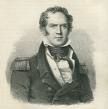
On Feb. 17, 1823 Scottish explorer-botanist Bain Hugh Clapperton (1788-1827) and British naval surgeon Walter Oudney (1790-1824) discover Lake Chad in C Africa while on an expedition from Tripoli to explore the Niver River, becoming the first Euros to accomplish a N-S crossing of the Sahara Desert; Oudney dies next Jan. 12 in Murmur (near Katagum) on the road to Kano, and Clapperton continues to Sokoto, capital of the Fula Empire, and returns to Tripoli on Jan. 26, 1825; too bad, after becoming a big hero and publishing an account of his journeys, he decides to return to Sokoto, where Sultan Bello detains him, and he ends up dying of dysentery on Apr. 13, 1827.
In 1823 the First British-Ashanti (Anglo-Ashanti) War in Ghana (ends 1831) begins when the Ashanti kidnap and murder an African sgt. of the Royal African Corps, then ambush and kill a small British force, killing 10 and injuring 39, after which Irish-born British gov. Sir Charles McCarthy (1764-1821) tries in vain to negotiate, then leads a force of 3K from the Cape Coast, splitting off with 500 men, which are ambushed and massacred on Jan. 21, 1824 in the Battle of Nsamankow, during which McCarthy kills himself rather than be captured, after which his heart is eaten and his head kept as a trophy. On Aug. 7, 1826 after hearing that the Ashanti are preparing to attack Accra, causing them to send a defensive force, the 11K-man British army is attacked 10 mi. N of Accra by the Ashanti, who are winning until the British fire Congreve rockets, spooking them and causing them to flee, leaving thousands of casualties. In 1831 the First British-Ashanti War (begun 1823) ends with a treaty accepting the Pra River as the border, bringing 30 years of peace.
In 1823 having secured Sudan, heavy-handed Egyptian pasha Mehmet Ali founds the city of Khartoum (Arab. "elephant's trunk") (modern pop. 300K) at the junction of the Blue and White Nile Rivers as a camp for the Egyptian army; in 1830 it becomes capital of Egyptian Sudan; eventually the White Nile junction moves several mi. to the N; meanwhile Mehmet's forces begin capturing slaves from the Nuba Mts. W and S of Sudan, forcing them into the Gihadiya foot regiment.
In 1825 Abeokuta ("under the rocks") in SW Nigeria is founded as a refuge from slave traders, becoming the capital of the independent (until 1914) state of Egba, consisting mainly of Yoruba people.
On Aug. 7, 1826 after hearing that the Ashanti are preparing to attack Accra, causing them to send a defensive force, a 11K-man British army is attacked 10 mi. N of Accra by the Ashanti, who are winning until the British fire Congreve rockets, spooking them and causing them to flee, leaving thousands of casualties.
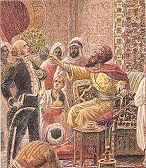
On Apr. 29, 1827 the Fly Whisk Incident sees Ottoman dey of Algiers (since Mar. 1818) Hussein (Husayn) Day (1765-1818) insult French consul (1814-27) Pierre Deval (-1829) with a fly whisk to the face when Deval refuses to repay a 14M franc debt contracted in 1799 to feed French soldiers of Napoleon, pissing-off French king Charles X, who orders a blockade of the port of Algiers, which the dey responds to by firing cannons at the ships, leading to French preparations to invade Algeria, which prove popular with the French people.


On July 27, 1828 king (since 1810) Radama I the Great (b. 1793) dies, and after eliminating her rivals his snake-eyed xenophobic wife Queen Ranavalona becomes Ranavalona (Ranavalona-Manjaka) I (1782-1861) of Madagascar (until Aug. 16, 1861), going on to reverse her hubby's modernization and Westernization efforts, reinstitute the slave trade, giving French traders a monopoly, expelling British missionaries in 1835, and becoming known as the Messalina, Bloody Mary, Wicked Queen, and Mad Queen of Magadascar with her Roman-style persecutions of Christians, incl. boiling them alive, while modernizing her army with the help of shipwrecked Frenchie Jean Laborde (1805-78), who builds a munitions plant and is given large tracts of land.
On Feb. 7, 1829 the ship Harriet sets out from the U.S. for Liberia with Muslim West African (Guinea) prince Abdul-Rahman (Abdulrahman Ibraham Ibn Sori) (b. 1762), who had been freed after being sold to slave traders in 1778 and enduring decades of slavery in the Am. South, along with 151 other passengers; too bad, he dies on the ship on July 6 - guess he forgot how hard the "from" trip had been?
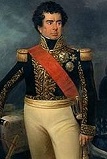
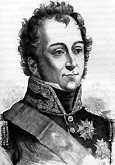
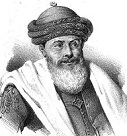
On June 14, 1830 after a French armada of 600 ships under Adm. Guy-Victor Duperre (Duperré) (1775-1846) arrives, the French Conquest of Algeria begins when a a force of 34K soldiers under Gen. Louis-Auguste-Victor, Count de Ghaisnes de Bourmont (1773-1846) begins the Invasion of Algiers, landing at Sidi Ferruch (Fredj) 17 mi. W of Algiers, which is met by 19K Ottoman troops, 7K Turkish Janissaries, and 17K Berber Kabyles, who are defeated on June 19 at the Battle of Staoueli (Staouéli); on July 5 the French conquer and occupy the N African city of Algiers, causing Ottoman dey #29 of Algiers (since Mar. 1818) Hussein (Husayn) Dey (1765-1838) to go into exile in Naples, Italy in the French ship Jeanne d'Arc with his family and his personal wealth and harem intact, and the Janissaries to flee to Turkey, ending 313 years of Ottoman rule (since 1671), ending the threat of the Barbary pirates and the perfidy of the Brits who pay them tribute and encourage them to prey on French ships?; too bad, the French loot Algiers of 50M francs of assets while arresting and killing Algerians for arbitrary reasons, turning the Algerian people against them permanently; after the July Rev. Gen. de Bourmont refuses to swear allegiance to Louis Philippe and is sacked from the army; the French Foreign Legion (Legion Etrangere) is founded to help police French colonial possessions in North Africa, esp. Algeria; a person from any nation except France can join and keep their identity secret while serving under French officers; it is disbanded in 1940-5 after they end up being stationed in Calvi, Corsica, and Marseille.
We Americans don't have the amenities at home that you Brits afford us here? On July 26, 1833 while white Americans cower in fear of freeing black slaves for fear of racial amalgamation, the Whig-dominated British House of Commons, enjoying a comfortable remoteness from its black slaves passes the Slavery Abolition Act (introduced by colonial secy. Lord Stanley and supported by Lord Brougham), giving all British slaves their freedom starting next Aug. 1 and compensating slave owners to the tune of £20M, which takes 40% of Britain's nat. budget, and the loan isn't paid off until 2014; it is given royal assent on Aug. 28; the British Anti-Slavery Society is disbanded; lifelong English abolitionist leader William Wilberforce (b. 1833) hears the good news before dying on July 29, his last words being: "Thank God that I should have lived to witness a day in which England was willing to give twenty millions sterling for the abolition of slavery"; too bad, the law is initially applied only in the West Indies, and it goes on in Sierra Leone until Jan. 1, 1928; on Dec. 4 William Lloyd Garrison, returning from a trip to England with his batteries recharged helps found the Am. Anti-Slavery Society in Philadelphia, Penn., and becomes its pres. in 1843-65.

In Feb. 1837 after publishing a Manifesto on Jan. 22 by leader Pieter Mauritz "Piet" Retief (1780-1838) listing their grievances against the stankin' British, the Star, er, Great Boer Trek in South Africa begins as 10K Star, er, Voortrekkers ("forward trekkers") leave Cape Colony and go NE over Orange River to get away from British rule, arriving on Oct. 5 at the Drakensburg Mts., then crossing over into Natal in Nov.; at first the Zulus seem friendly, but just wait? - I'm not a star I'm a brain surgeon?
In 1837 Muhammad ibn Ali as-Senussi (1787-1859) founds the Sunni Muslim Senussi (Sanussi) sect in Mecca as an offshoot of the Salafis, which becomes strong in Sudan and Libya (one-third of the pop. in modern times).
In 1837 Oman Sultan Sa'id ibn Sultan (d. 1856) makes slave market king Zanzibar his main place of residence, introducing clove, sugar, and indigo cultivation while cooperating with British attempts to end the slave trade - oh man jokes here?

On Feb. 6, 1838 the Zulus, led by chief (since 1828) Dingaan (Dingane) sandbag and massacre Voortrekker Piet Retief (b. 1780) and his party of 55 at Weenen ("weeping) in Kwa Zulu Natal, causing the Boers under newly-arrived (last Nov.) Andries Wilhelmus Jacobus Pretorius (1798-1853) to organize a revenge army, and on Dec. 16 ("Dingane' Day") ("Day of the Vow") 10K+ Zulus attack them, and are driven back after losing 3K spear-chucking men to their guns, becoming known as the Battle of Blood River, which the whites use to create a myth of their own superiority.
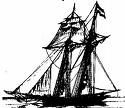
On July 1, 1839 Spanish sloop Amistad (Sp. "friendship"), carrying 50 African slaves recently sold in Havana, Cuba is taken over by the slaves, who kill the captain and one crewman, and hold two Spaniards captive to act as navigators to sail them back to Africa; a U.S. naval vessel intercepts them, releases the Spaniards and imprisons the Africans, and they are indicted for murder, causing U.S. abolitionists to take up their cause. In Mar. 1841 after eloquent arguments by former U.S. pres. J.Q. Adams, the U.S. Supreme Court sets the Amistad prisoners free, and private funds are raised to send the 35 survivors back to Africa.
On Oct. 12, 1839 after their big V at Blood River, the Boer Voortrekkers set up the independent Natalia Repub., which allies with the Zulu next Jan. before being annexed by Britain on May 12, 1843.
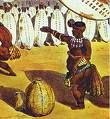
In Jan. 1840 Zulu chief (since 1828) Dingane is overthrown and killed by his half-brother Mpande (1798-1872) (also half-brother of Shaka) with the help of Andries Pretorius and 400 burghers, and he becomes Zulu chief (until 1872) (longest ruling).

In 1840 Mzilikazi (Mosilikatze) ("Great Road") (1790-1868), a former lt. of Shaka Zulu who rebelled in 1823 and fled to exile with his Khumalo tribe, first to Mozambique then to Transvaal founds Matabeleland in modern-day Zimbabwe between the Zambezi and Limpopo Rivers, with capital in the city of Bulawayo ("town of the persecuted one") (modern-day pop. 1.2M), named after Shaka Zulu's capital.
In 1840 after reaching the age of majority, Mswati II (Mavuso III) (1820-68) becomes king of Swaziland (until 1868), expanding its boundaries and giving it its name.
On Mar. 7, 1841 King (until 1858) Lobe a Bebe of the Douala region of S Cameroon signs a treaty with British Capt. William Simpson Blount of the Pluto, agreeing to end sale and transport of slaves, reverting to barter trade in palms and ivory; domestic slavery continues.
In Aug. 1841 after the Boer Voortrekkers proclaim the Natalia Repub., with capital in Durban, pissing-off the British gov. in the Cape, he sends a force of 250 to reassert control, but they end up under siege, with supplies running out; too bad, just as Andries Pretorius and his men are closing in, reinforcements under Col. Abraham Josias Cleete (1794-1886) arrive, causing the Boers to retreat N to Pietermaritzburg in Transorangia.
On May 24, 1842 English-born colonist Richard Philip "Dick" King (1813-71) and his Zulu servant boy Ndongeni are sent by a beleaguered force of 250 British soldiers bottled up in Durban Harbor in South Africa to get help from the British base at Grahamstown 300 mi. to the S; after an arduous trek on horseback he arrives on June 4, and returns 1 mo. later with relief forces, becoming a British hero.
In Oct. 1842 after the Boers in Natal across the Orange River from Cape Colony and sign a truce with the Brits, they proclaim the Orange Free State; too bad, the Brits begin sending their own immigrants in, ignoring Boer land claims.
In 1843 Natal is annexed as a British colony.
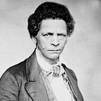
On July 26, 1847 the Free and Independent Repub. of Liberia is founded by the Am. Colonization Society to Liberia (founded 1816 with backing by Pres. James Monroe) to repatriate freed U.S. black slaves, with a constitution modeled after the U.S., complete with cities named Monrovia (capital) (modern pop. 600K) (first foreign city to be named after a U.S. pres. until ?) and Buchanan, and a constitution signed by 11 signers, hence the 11 stripes in its flag; next Jan. 3 "Father of Liberia" Joseph Jenkins Roberts (1809-76) of Va. becomes pres. #1 (until Jan. 7, 1856); James Lawrence Day (1814-54) from Morristown, N.J. becomes the colony's first physician; abundant timber and diamond wealth make it prosperous for the next cent.; the trouble starts when the Am. immigrants try to force their govt. and way of life on the other 99% and run out of free cookies?
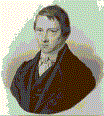
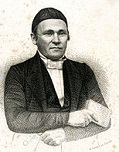
In May 1848 after becoming the first Euros to enter Africa in 1846 via the Indian Ocean along with fellow Lutheran missionary Johann Ludwig Krapf, German missionary Johannes Rebmann (1820-76) becomes the first Euro to sight Mount Kilimanjaro; too bad, he is ridiculed for the next 12 years; on Dec. 3, 1849 German missionary Johann Ludwig Krapf (1810-81) becomes the first Euro to sight Mount Kenya.

In 1851 German explorer Heinrich Barth (1821-65) crosses the Sahara Desert twice, becoming the first white Euro to visit Adamawa; in Kukawa he discovers the Arabic Girgam, the royal chronicle of the Kanem-Bornu Empire around Lake Chad (700-1376), listing 69 rulers - hello, I need to talk to the general?

In 1851 married Scottish Congregationalist missionary explorer David Livingstone (1813-73) begins exploring Africa looking for a route to the interior from the E or W coast while vainly attempting to Christianize the natives, traveling N from Cape Town to the Zambezi (Bantu "mbeze" = fish) River, then W to Loanda on the Atlantic coast, then backtracking to the Zambezi River, attempting to follow it to its mouth in the Indian Ocean.
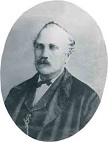
On Jan. 17, 1852 the Sand River Convention is signed by Britain, recognizing the independence of the Transvaal (South African) Repub. (Zuid-Afrikaanische Republiek) (ZAR) (until May 31, 1902) under Marthinus Wessel (Wessels) Pretorius (1819-1901), son of Boer leader Andries Pretorius, who becomes pres. #1 (until Sept. 15, 1860); the British recognize the independence of the Transvaal Boers and drop the reward on Andries Pretorius, who makes peace with warring Boer factions, visits Durban to discuss opening trade, then sends a commando force against Bechuanaland king Sechele, which loots the house of missionary David Livingstone at Kolobeng - '52 was a very unboering year?
In 1854 Rwanda (Ruanda) is first visited by European explorers, who are impressed by the tallness of the Watusi - somebody needs to invent basket what?
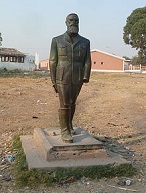
In 1854 Portuguese explorer Antonio Francisco Ferreira da Silva Porto (1817-90) crosses South Africa from W to E, going on to become the only white explorer in Portuguese West Africa.
In Nov. 1855 David Livingstone becomes the first European to see the exciting Victoria Falls ("Mossioatunya" = "smoke that thunders") on the Zambezi River; he then travels to the mouth of the Zambezi River, then NE to Quelimane on the coast next year, becoming the first European to cross Africa, and finally sails for England - to get the Victorians excited?

In 1855-9 French-born Am. zoologist Paul Du Chaillu (1831-1903) is sent to West Africa by the Academy of Natural Sciences in Philadelphia, exploring the Ogooue River Delta and the Gabon estuary, confirming the ancient reports of Hanno the Navigator of Carthage of gorillas, becoming the first white Euro to see them; in 1863-5 he makes an expedition to C Africa, discovering a race of 4'8" avg. black forest pygmies (Gr. "pygme" = distance from elbow to knuckles) (mentioned by Homer, Aristotle, and Herodotus as dwelling in Africa, fighting with cranes and attacking Hercules, who captured some of them in his lion skin and took them to King Eurystheus of Tiryns) in the Ituri Forest. In 1861 he pub. Explorations and Adventures in Equatorial Africa, which sells 300K copies (#1 bestseller of 1861). In 1867 he pub. A Journey to Ashango Land. In 1868 he pub. Stories of the Gorilla Country. In those days of white racial supremacy among scientists, the thought of giant hairy men with tiny brains, and tiny men with even tinier brains seemed to fit right in with their developing notions of survival of the, er, human evolution, confirming all black Africans as occupying the bottom rung; too bad, Chaillu's critics discover that his mother is a mulatto, making him a quadroon, and the SHTF.
In 1856 after seeing the Boer exodus caused by annexing Natal to Cape Colony in 1843, Britain establishes Natal in S Africa as a separate crown colony.
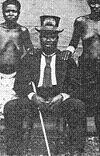
In 1858 king (since ?) Lobe a Bebe dies, and his son Ndumbe Lobe Bell (1839-97) becomes king of the Duala people of S Cameroon, watching the Germans take control of the region in 1884.
In 1858 king (since 1818) Ghezo dies, and his son Badohou becomes Glele (-1889), king #10 of Dahomey (Benin) in W Africa (until 1889), making treaties with the French but snubbing the English because of their more stringent attitude toward their little down-home institution of slavery.

In 1858 British explorer John Hanning Speke (1827-64) discovers Lake Victoria in E Africa, identifying it as the long-sought source of denial, er, the Nile.


On Apr. 25, 1859 after receiving a concession from France in 1855, French diplomat and politician Count Ferdinand de Lesseps (1805-94) begins work on the Suez Canal (finished 1869), starting with the building of an artificial Mediterranean harbor at all-new Port Said, and a canal from the Nile to the Ismuth of Suez to provide fresh water for 20K fellaheen (peasant) laborers working for three piasters (6 cents) a day; the plan is to work from N to S, ending up at Lake Timsah, then the Great and Little Bitter Lakes, which are reconnected with the Red Sea and flooded with seawater. Zeus was deified - saw Suez? In Oct. 1869 French steamer Louise-et-Marie becomes the first oceangoing vessel to sail through the 103-mi.-long, 656-ft.-wide, 30-ft.-deep Suez Canal from the Mediterranean to the Gulf of Suez (Red Sea), completed by Count Ferdinand de Lesseps (1805-94) at a cost of $105M; on Nov. 17 after an Egyptian frigate runs aground 8 mi. from Port Said, and is cleared only 5 min. before a multinat. fleet of ships sails through, it is officially opened for navigation by French empress (wife of Napoleon III) Eugenie Marie de Montijo (1826-1920) (famous for her waterfall hairstyle), with reps. of almost every European royal family in attendance; with the "Highway to India", England can now rule over her "jewel" India a lot easier and cheaper; the port of Brindisi in S Italy makes a comeback as a port of call for steamships operating to-from the Orient; the city of Aleppo, Syria at the end of the Silk Road sees its trade diverted to the sea, causing it to begin a slow decline.
In 1860 the Scramble for Africa begins (ends 1905), with European nations partitioning it into spheres of influence, protectorates, and colonies without regard to ethnic divisions, the boundaries persisting into modern times; Africa has up to 10K different states and autonomous groups before whitey goes to work; in 1870 only 15% of Africa is under Euro control, growing to 90% by 1914 (excluding Ethiopia and Libya); "We have been engaged in drawing lines upon maps where no white man's feet have ever trod; we have been giving away mountains and rivers and lakes to each other, only hindered by the small impediment that we never knew exactly where the mountains and rivers and lakes were." (British PM Lord Salisbury)
On Jan. 1, 1860 after landing its first column last Dec. 17, the Battle of Tetouan (Tétouan) (Tetuán) in Morocco sees a Spanish expeditionary force of 41 ships and 36K men led by Gen. Leopoldo O'Donnell, the 1st Conde de Reus et al. attack the Port of Guad al Gelu, stopping the Moroccan offensive on Jan. 31 and taking Tetouan on Feb. 6, causing O'Donnell to be created the 1st Duke of Tetuan.

On Mar. 10, 1861 slave trade-hating Islamic scholar El Hadj Umar Tall (1797-1864) seizes the city of Segou, destroying the animist Bambara Empire of Mali, then takes Muslim-run Hamdullahi on Mar. 16 after three battles killing 70K, and sets up an empire in Mali, Guinea, and Senegal (ends 1890).

On Aug. 15, 1861 bloody queen (since 1782) Ranavalona (b. 1782) dies peacefully in her sleep after killing off a third of the island's pop. but keeping it from French control, and her son Radama II (1829-63) becomes king of Madagascar (until May 12, 1863), signing a treaty of perpetual friendship with France and working to restore Radama II's reforms, inviting the British Protestant missionaries back in and modernizing the country; too bad, the reforms piss-off the anti-Christian aristocracy, so his days are numbered.
In 1861 Britain takes possession of Lagos Island
(Nigeria) to stop the slave trade.
<>/p>


On May 13, 1863 Radama II (b. 1829) is assassinated (strangled) (suicide?) (survives?), and his widow, queen Rasoaherina (Rabuda) (1814-68) becomes puppet ruler of Madagascar (until Apr. 1, 1868) behind PM and coup leaders Rainilaiarivony (1828-96) and his brother Rainivoninahitriniony (-1868), who rule behind puppet queens for the next 32 years (until 1895), marrying them as a, er, cover story; Rasoaherina establishes diplomatic relations with France, Britain and the U.S. and prohibits Sunday markets.
In 1863 the Second British-Ashanti (Anglo-Ashanti) War begins when an Ashanti force pursues fugitive Kwesi Gyana over the Pra River boundary, after which the British gov.'s request for troops is denied, causing it to fizzle.

In 1863 Riga, Latvia-born German explorer Georg August Schweinfurth (1836-1925) goes to Africa, exploring Ethiopia and Egypt incl. the Red Sea, the Nile River, and Khartoum (until 1866). In Jan. 1869 the Alexander von Humboldt Foundation sends him on a scientific mission from Khartoum up the White Nile to Bahr-el-Ghazal through the Congo-Nile watershed to Mangbetu (Monbuttu) cannibal country, where he discovers the Uele River on Mar. 19, 1870, which he surmises is independent of the Nile and part of the Chad system, discovering the Aka (Bayaka) (Babenzele) pygmy people before returning to Khartoum in July 1871, becoming the first white Euro to prove the existence of African pygmies.
In 1864 the Boers of the Orange Free State start the Boer-Basuto War with the Basutos over disputed land (ends 1866).

On Apr. 1, 1868 Queen Rasoherina dies, and Anglophile Queen Ranavalona II (1829-83) becomes ruler of Madagascar (until July 13, 1883), getting baptized as an Anglican next Feb. 20 and declaring Madagascar an Anglican country, while marrying you-know-who, Rasoherina's hubby, PM Rainilaiarivony, the real power.

On Sept. 9, 1869 Mzilikazi (b. 1790) dies during the rush of whites into the area after the discovery of gold the previous year, and his 6' 300-lb. loinclothed son Lobengula Kumalo (1845-94) ("prince of princes") ("thou black one") ("thou great bull elephant") becomes king #2 of the Matabele nation of former Zulus in South Africa (until Jan. 1894), going on to utter the soundbyte: "England is a chameleon and I am a fly", signing the Tati Concession, giving the British the right to search for minerals in the SW part of the kingdom between the Shashi and Ramaquiban Rivers; luckily, the whites don't move in bigtime until 1890, allowing him time to become the Macbeth or King Lear of African kings, starting with facing a civil war (ends 1872).

In Feb. 1870 Egyptian troops led by British Gen. Sir Samuel White Baker (1821-93) fight their way from Khartoum up the White Nile, capturing Gondokoro (750 mi. S of Khartoum) by next June, establishing a few military posts along the way in country dominated by Arab warlords who have turned 90% of the black pop. from Darkest Africa into money-making slaves.
In Jan. 1871 diamond seekers swarm the farm of South African farmer Adrian van Wyk in Griqualand West between the Orange and Vaal Rivers, and he ends up selling it for £2K; nearby another farm owned by the two De Beer brothers becomes the basis of De Beers Consolidated Mines, founding the city of Kimberley near the Big Hole (Kimberley Mine) (Groot Gat), the biggest hole ever dug with human hands, removing 25M tons of soil and extracting three tons of diamonds worth £47M by the time it closes in 1914; on Sept. 2, 1882 Kimberley becomes the 2nd city after Philly to install electric street lights; in Apr. Britain annexes the diamond region of Griqualand West, incl. Kimberley, and Cecil Rhodes moves there from Natal; in 1884 Basutoland (S and E of the Orange River) becomes part of Cape Colony; the white pop. of South Africa swells from 225K in 1870 to 1M in 1904.


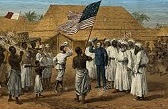
Livingstone, I presume? Stanley, I presume? On Nov. 10, 1871 Welsh-born U.S. journalist Sir Henry Morton Stanley (John Rowlands) (1841-1904) (fresh from covering Am. Indians in the SW U.S.) finds missing Scotch missionary explorer David Livingstone (1813-73) in Ujiji (Kavele) (a Robin Williams boxed game?) due W of Zanzibar on the E shore of Lake Tanganyika in Africa, where Livingston had just returned from a journey W into cannibal territory, and his lip-smacking report to the New York Herald titled How I Found Livingstone captures the imagination of the world; Stanley then becomes an explorer himself, accompanying Livingstone N of Tanganyika, then going solo, visiting the fabled Mountains of the Moon in the Ruwenzori Mts. in EC Africa (highest peak 16,762 ft. Mount Stanley), which support glaciers that are the source of the Nile River, going on to pub. Through the Dark Continent: The Sources of the Nile Around the Great Lakes of Equatorial Africa and Down the Livingstone River to the Atlantic Ocean (2 vols.) in 1878, coining the term "dark continent" for Africa; in 1874 Livingstone begins a posth. nat. hero, causing several missionary initiatives into C Africa to be founded.

On Sept. 1, 1872 Mpande (b. 1798) dies, and his son Cetshwayo (Cetewayo) (1826-84) becomes king of Zululand (until Feb. 8, 1884), creating the new capital of Ulundi ("high place"), and going on to equip his army with muskets and banish Euro missionaries.
In 1873 the Third British-Ashanti (Anglo-Ashanti) War (ends 1874) in Ghana N of the Gold Coast Colony begins after the British fail to give up a fugitive Ashanti slave until the Ashanti give up a kidnapped German missionary family and Swiss missionary, and they use the excuse to attack their traditional Fanti enemies on the coast, crossing the Pra River with 2K-60K warriors under King Kofi Karikari, causing the British to send an army of 4K men. On Jan. 31, 1874 after arriving on the Gold Coast in Dec. and making use of a newly-built road, becoming the first use of a traction engine to haul heavy loads up the beach, 2.5K British troops under Gen. (later field marshal) Sir Garnet Joseph Wolseley, 1st Viscount Wolseley (1833-1913), the Battle of Amoaful is a decisive V for the British over the Ashanti, whose chief Amanquatia is KIA, earning British praise for his courage and skill; the British lose 3 troops KIA and 164 wounded, vs. 1 KIA and 29 Ashanti wounded. On Feb. 4 the British defeat the Ashanti in the Battle of Ordashu then occupy and burn the Ashanti capital of Kumasi, and in July the Treaty of Fomena ends the Third British-Ashanti War (begun 1873), with 2K Ashanti vs. 17 British KIA, 185 wounded, and 55 dead from disease, with the Ashanti agreeing to pay 50K oz. of gold, end human sacrifice, keep the road from Kumasi to the Pra River and grant freedom of trade to the British Gold Coast forts; Kofi Karikari is deposed, and Mensa Bonsu (1840-96) becomes king of Ashanti (until Mar. 8, 1883); the defeat causes the Ashanti Empire to totter on the brink of collapse, destabilizing the whole region.

On Mar. 18, 1877 Britain annexes Walvis Bay on the SW coast of Africa, and on Apr. 12 annexes the South African Repub. under Sir Theophilus Shepstone (1817-93), which pisses-off the Afrikaners, who call it a violation of the 1852 Sand River Convention, even though the repub. is in a state of near anarchy and it is being done to prevent Germany from moving in.
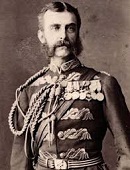



The 1936 Berlin Olympic trials are held directly in Africa, and whites win by cheating with .45s? On Jan. 11, 1879 the Anglo-Zulu War in South Africa is started by British rep. Gen. Frederic Augustus Thesiger, 2nd Baron Chelmsford (1827-1905), who rushes into war to protect the Boers against the Zulus in a territorial dispute over the Transvaal, sending 13K British troops on Jan. 12 to take on Zulu chief Cetshwayo's army of 40K; on Jan. 22 the Zulus surround 1.3K British troopers and allied Natal Kaffirs at the Battle of Isandhlwana (Isandlwana) Hill, and use the Horns of the Beast maneuver to wipe them all out in three hours, then behead the corpses and slash their stomachs to let out their spirits, as portrayed in the 1979 film Zulu Dawn; a solar eclipse at 1:02 p.m. spurs the Zulus to fight harder, since they like night fighting?; on Jan. 22-23 the epic Battle (Defense) of Rorke's Drift (Kwa Jimu) (Jim's Land") on the Buffalo River sees 3K-4K Zulus stage repeated attacks against 139-141 British rifles of B Co., 2nd Battalion, 24th (2nd Warwickshire) Regiment of Foot, South Wales Borderers, commanded by Lt. (later Maj.) Gonville Bromhead (1845-91) defending a mission station commanded by Lt. (later Col.) John Rouse Merriott Chard (1847-97) through a long day and night, losing only 17 Brits KIA and 15 wounded vs. 351 Zulus KIA and 500 wounded, as portrayed in the 1964 Cy Endfield film Zulu ("A short-chamber Boxer-Henry point forty-five caliber miracle, and a bayonet... with some guts behind it!"); 11 Victoria Crosses are awarded incl. to Bromhead and Chard; on July 4 reinforcements help the British win a V at the Battle of Ulundi, capturing Cetshwayo and destroying his army, after which a peace treaty is signed with the Zulu chiefs on Sept. 1, allowing Britian to take control of Zululand, which descends into civil wars and is finally annexed in 1887.
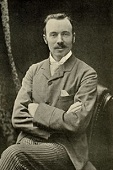
In 1879 English explorer Joseph Thompson (1858-95) explores the Great Rift Valley of Africa, trying it again in 1883 and reaching the N shore of Lake Victoria but failing to climb Mt. Kilimanjaro, later getting Thomson's Gazelle and Thomson's Falls named after him; in Jan. 1885 he pub. the bestseller Through Masai Land, describing snow-capped mountains on the equator and how he had terrified hostile Maasai warriors by removing his false teeth, making a fan of H. Rider Haggard, who uses it to write his bestselling novel King Solomon's Mines (1885).

On Dec. 20, 1880 the First Boer War begins (ends Mar. 23, 1881) when the Cape Parliament rejects Britain's scheme for South African federation, and the Boers revolt over British annexation of the Transvaal, where they had gone to live their strict white supremacist religious lifestyle without interference; the Transvaal (South African) Repub. is reestablished in Dec. under CIC of Transvaal forces (since 1864) Gen. Stephanus Johannes Paulus "Paul" Kruger (1825-1904) (Oom Paul).
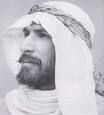
On Sept. 10, 1880 after talking Bateke king Illoh Makoko into placing his kingdom under protection of the French flag, the city of Brazzaville on the N bank of the Congo River and the Pool Malebo (Stanley Pool) (Lake Nkunda) (modern-day pop. 1.8M) is founded by French explorer Pierre Paul François Camille Savorgnan de Brazza (Pietro Paolo Savognan di Brazzà (1852-1905), becoming the capital of the Repub. of the Congo; meanwhile in 1881 the city of Leopoldville (later Kinshasa) on the S bank of the Congo River and the Pool Malebo opposite Brazzaville (modern-day pop. 11.8M), named after Leopold II of Belgium is founded by Henry Morton Stanley in the Belgian Congo (modern-day Dem. Repub. of the Congo), becoming the 3rd largest urban area in Africa after Cairo and Lagos, and 2nd largest Francophone urban area in the world after Paris; French is the official language, although Lingala (Bangala) (Bangi), Tshiluba, and Swahili are also spoken; in 1971-97 the Dem. Repub. of Congo is called Zaire.

In 1880 British entrepreneur Cecil John Rhodes (1853-1902) (an Illuminati?) forms the De Beers Mining Co., with ideas of a White Man's Africa dancin' in 'is 'ead; meanwhile rival Randlord Barney Barnato (1852-97) founds the Barnato Diamond Mining Co. - Cecil fit the battle of Barnato? In 1884 the British South African Co. of Cecil Rhodes receives a charter to develop the country of Malawi (Nyasaland) in SE Africa, and end up in a war with Arab slavers in 1887-9; Bechuanaland NW of Johannesburg is occupied by the British at Rhodes' instigation.
In 1880 British Gen. Charles George "Chinese" Gordon, gov.-gen. of Sudan since 1873 resigns in disgust after the British govt. issues the soundbyte: "Her Majesty's Government are in no way responsible for operations in the Sudan", giving the dominant Arab minority its big chance.



On Feb. 27, 1881 the Boers defeat the British again at the decisive Battle of Majuba Hill, exposing their poor equipment and training; even though the British public calls for blood, PM William Gladstone agrees to end the war on Mar. 23, and recognizes the South African Repub. on Apr. 5, and on Aug. 3 the Treaty of Pretoria is signed, ending the First Boer War (begun 1880), giving the Transvaal internal independence under British suzerainty; Gladstone's attempt to right Disraeli's wrongs is seen by the public as going too far, and Queen Victoria blames him for Majuba Hill; Boer gens. Paul Kruger (1825-1904), Petrus Jacobus "Piet" Joubert (1834-1900), and Marthinus Wessel Pretorius (1819-1901) become big heroes after negotiating the peace treaty.
In 1881 the French flag is raised on the N bank of the Congo River, founding the new colony of French Congo.
In July 1882 Egyptian khedive Tawfik puts himself under the protection of British troops, who land in Egypt in Aug., and occupy it in Sept., making it a quasi-protectorate after sending an army into the Suez Canal and routing Col. Ahmed Orabi's nationalist army at the Battle of Tel-el-Kebir, then occupying Cairo and defeating the nationalists; Orabi is exiled to Ceylon, and Tawfik is restored; Egypt maintains the legal fiction of Ottoman suzertainty until 1914; Britain controls Egypt for the next 40 years through its consul gen., although never actually declaring a protectorate, and announcing its intention of withdrawing as soon as order and good govt. have been restored, ending up occupying it for 72 years - did George Dubya learn anything from this?
On July 22, 1883 the Zulu Civil War (ends June 5, 1884) breaks out when Usibepu (Zibhebhu) (1841-1904), a son of Cetshwayo who was left in charge of his mini-kingdom after the Brits changed their minds about subdividing the Zulu kingdom 13 ways in 1879, attacks Cetshwayo's kraal in Ulundi aided by Boer mercenaries, wounding his daddy, who escapes to Eshowe then dies of poisoning next Feb. 8, leaving his son Dinuzulu to succeed him as king of Zululand if he can.

On July 30, 1883 Ranavalona II dies, and her sister queen Ranavalona III (1861-1917) becomes ruler of Madagascar (until Feb. 28, 1897), marrying PM Rainilaiarivony and getting caught up in the final takeover of the island by France, beginning with a French invasion this year known as the First Franco-Hova War, which causes them to cede Antisarana (Diego Suarez) on the N coast and pay an indemnity of 560K gold francs.


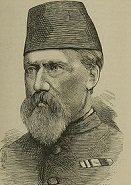
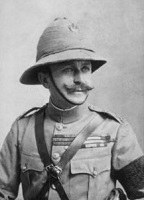

In 1883 a fundamentalist Muslim Arab rebellion begins in the Egyptian province of Sudan, led by Muslim Sufi Samaniyya Sheikh Muhammad Ahmad (1844-85), who proclaims himself El Mahdi, claiming to be chosen by Allah to lead a holy war (jihad) against infidel Brits, Egyptians, and other Sunni Muslims in order to prepare for the Second Ccoming of Christ (Isa), setting up a Mahdist regime with its own caliph (him) and its own modified Sharia (fight for him rather than go to Mecca, add him to their daily prayers, click on hook-up-my-space?) while coincidentally seeking to restore the Arab slave trade in African blacks which the British had just spent a decade eradicating; Sudanese warlord Rabih az-Zubayr ibn Fadl Allah (Fadlallah) (1842-1900) begins conquering the three kingdoms of Chad W of Lake Chad between the Nile and Ubangi River basins (until 1893); meanwhile on Nov. 5 40K spear-carrying El Mahdi followers known as the Ansar (helpers) (Dervishes) surprise an 8K-man Egyptian garrison leaving El Obeid (Al Ubayyid) and massacre them and steal their weapons, then take the town after a 4-mo. siege, then defeat and massacre an 8K-man force led by British Col. William "Pasha" Hicks (1830-83) after leading them on a wild goose chase until they is dying of thirst, allowing the Mahdi's spear-chucking army to capture 10K British Enfield rifles and several cannons, then defeat Austrian-born Maj. Gen. Sir Rudolf Anton Carl von Slatin (1857-1932) (British gov.-gen. of Dara in SW Darfur), and take over Darfur (W Sudan), followed by Jabal Qadir in S Sudan; after a the British cabinet under Gladstonian paralysis refuses to send help, in Dec. it orders the Egyptians to evacuate, sending Gen. Charles George "Chinese" Gordon (1833-85) to facilitate it, but without an army to back him up; meanwhile believing that his D proves that Christianity is weaker than Islam, Slatin converts to Islam under the name Abd al Qadir.
In 1883 Britain puts the pedal to the medal and crushes the Pedi Kingdom in the Steelport Valley of NE Transvaal, herding the pop. into a rez inside their former territory.

On Feb. 8, 1884 Zulu king (1872-9) Cetshwayo (b. 1826) dies, and on May 20 his son Dinuzulu kaCetshwayo (1868-1913) becomes king of Zululand (until Oct. 18, 1913) while in the midst of the Zulu Civil War (began July 22, 1883). On June 5 the Zulu Civil War (begun July 22, 1883) ends with the bloody Battle of Ghost Mountain (Tshaneni); the numerous skulls from the battle are later used as road markers; too bad, he had to use 800 Boer mercenaries, who turn around and demand the N half of his kingdom as payment, and after the British govt. intervenes and denies, er, reduces their claims, on Aug. 5 they declare Natal Colony, with capital at Vryheid, which is absorbed into Transvaal in 1889 - thanks, black suckahs?



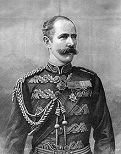
On Feb. 18, 1884 British Gen. Charles "Chinese" Gordon (later known as the Khartoum Pasha) arrives in Khartoum via Cairo, where is appointed gov.-gen. of Sudan again (1st time 1873), and pardons Sudanese slave trader ("Slaver King") Al-Zubayr (Sebehr) (Zobeir) Rahma (Rahma) Mansur AKA "the Black Pasha" in exchange for joining his forces, then astonishes Europe by offering him his job as gov.-gen. of Sudan, which is approved by Queen Victoria and William Gladstone but nixed by the British govt.; after 2.5K Egyptians are evacuated, the Madhi's army sieges Khartoum beginning Mar. 18; meanwhile another revolt against the Anglo-Egyptians begins in E Sudan, capturing the Red Sea port of Suakin after a British force under Gen. Sir Gerald Graham (1831-99) is ordered to evacuate, followed in May by Berber at the confluence of the Nile and Atbara Rivers; too bad, Gordon decides to ignore the order to evacuate Khartoum, and the British govt. doesn't back him up till Aug., sending the Nile Expedition (ends 1885) under Irish-born British gen. Garnet Joseph Wolseley, 1st Viscount Wolseley (1833-1913) to relieve him in Nov., and after his troops poke along too slowly, they send a flying column of 1.5K camel and horse troops under British gen. Sir Herbert Stewart (Stuart) (1843-85) from Wadi Halfa in N Sudan on Lake Nubia (Nasser) over the Bayyudah Desert, who reach Korti in late Dec., then use their nifty Gardner machine gun to defeat an army of 12K Mahdist Dervish Fuzzy-Wuzzies (Hadendoa Bejoa) at Abu Klema next Jan. 17, and Metemma on Jan. 19 (killing 1.1K while losing only 74 of their own), after which they are greeted by four steamer gunboats sent 4 mo. earlier by frantic Gordon, and embark on Jan. 24, a day late and a dollar, er, pound short?; on Feb. 16, 1885 Stewart dies en route back to Khartoum of a mo.-old wound, becoming a symbol of British devotion to loyalty.
In 1884 France annexes a small strip of the hinterland to Obock to found the protectorate of French Somaliland (later Djibouti) in E Africa on the Gulf of Aden at the entrance to the Red Sea, and in 1888 founds the town of Djibouti on the Gulf of Tadjoura opposite Obock on the trade route to Ethiopia, but keeps the admin. in Obock (until 1892). In 1884 Germany occupies SW Africa.
And lead us not into temptation, but deliver us from evil? In 1884 although European penetration of Africa has been limited until 1880, the Belgians and the British start a race for colonialization, resulting in the 14-nation Berlin (Congo) (West African) Conference this year and next, marking the climax of white European land-grabbing in Africa, and resulting in the Treaty of Berlin next year; no single European power is permitted to claim the whole continent, and all claims have to be based on military occupation; Germany and France compete against Britain, with Kaiser Wilhelm I uttering the soundbyte that Germany is being "squeezed in the heart of Europe by colonizing neighbors", wanting to get some in Africa to compensate; by 1900 European states claim 90% of Africa - they can claim, but can they tame?



Too much MSG in the Chinese food? On Jan. 26, 1885 after the Nile level falls, allowing the Mahdi's forces to bridge the moat they built by linking the Blue and White Nile, Khartoum in the Sudan, commanded by cut-off popular idol Gen. Charles George "Chinese" Gordon (b. 1833) falls, and Gordon is killed two days before his 52nd birthday, his head displayed on a pike; on Jan. 28 the flying column British relief force arrives, the news causing the Liberal Gladstone govt. in Britain to fall on June 9 after Queen Victoria says I told you so and again blames the nincompoop Gladstone for it, and the House of Commons comes within 14 votes of censuring the cabinet; in Mar. Sebehr Rahma, whose Arab skin is still intact is arrested and imprisoned in Gibraltar for side-switching, and returns to Sudan in 1899, where he settles down and writes the cool memoir Black Ivory; Or, The Story of El Zubeir Pasha, Slaver and Sultan, as Told by Himself; on June 22 El Mahdi dies of typhus; on June 23 Conservative Party leader (former foreign secy.) Robert Arthur Talbot Gascoyne-Cecil, 3rd Marquis of Salisbury (1830-1903) becomes British PM (until Jan. 28, 1886), with a minority cabinet, going back to the Disraeli track of protecting British interests abroad, which wins the queen's support; the British leave Sudan to go its own way, and the Mahdi Dervishes rule for the next 13 years (until 1888); "I am a poor man of the desert, but I am the Mahdi, the expected one. On my cheek, the mole; between my teeth, the space... All Islam must know who I am and believe... The Nile will taste of blood for a hundred miles") (Laurence Olivier as the Mahdi in the 1966 film Khartoum, starring Charleton Heston as Gordon) - I guess Allah didn't pick him after all, he just had an Ahnuld complex because of his gap-toothed smile?

In 1885 the Treaty of Berlin is signed, becoming the first to use the term "spheres of influence", meaning white Euro powers claiming to own black African areas (and their people?); Germany annexes Tanganyika and lets Britain have Zanzibar in exchange for Heligoland in the North Sea, and asserts rights to German East Africa, German Southwest Africa, Cameroon, and Togoland, sending explorer Gustav Nachtigal (b. 1834) as special commissioner to annex them (he dies on the return voyage on Apr. 20); Germany relinquishes its claims to Madagascar in favor of France, and Britain pledges not to interfere, dooming its independence, freaking Queen Ranavalona III out, and causing her to send trinket-style gifts (silk clothes, ivory pin, woven basket) to U.S. Pres. Grover Cleveland next year in vain hopes of help (send the Marines for more?); Britain claims a protectorate in Nigeria and Bechuanaland S of the Molopo River, also Zanzibar and British East Africa; after they draw their lines in the sand and start playing step over the line, the West African Wars begin (end 1903); Belgium declares the Congo Free State (Belgian Congo), inhabited by Negrito peoples (Pygmies) open to trade and settlement, but personally owned by Belgian king (since 1865) Leopold II (1835-1909), who benefits from treaties made with native chiefs by U.S. correspondent Henry Morton Stanley when he navigated the Congo River in 1877, and now begins to rule it with an iron hand, murdering and multilating 10M?; borders of the Portuguese colony of Angola are fixed, permitting development of the interior; Spain receives Rio Muni on the W coast of Africa, creating Spanish Guinea (modern Equatorial Guinea); the peace terms of England with the Boers are modified to delete all references to British suzerainty.
In 1885 French Capt. ? Brouet discovers the source of the 2.6K-mi. Niger River of W Africa as the Tembi River, which is joined by the Mayel-Balevel River about 300 mi. above Timbuktu.
In Sept. 1886 after gold is discovered in sedimentary rocks on Witwatersrand (Dutch "white waters range") on the Rand Ridge in the Transvaal between the Vaal and Limpopo Rivers, the boom town of Johannesburg (elev. 5740 ft.) (modern pop. 1M), named after deputy surveyor-gen. Johannes Rissik and mining commissioner Christiaan Johannes Joubert is founded 957 mi. NNE of Cape Town as a gold-mining camp, and zooms to a pop. of over 100K, with Cecil Rhodes' Consolidated Gold Fields setting up a microsoft, er, monopoly.
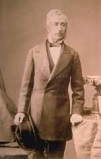
In 1886 Britain begins making Kenya a British colony, with Scottish-born British India Steam Navigation Co. owner Sir William Mackinnon, 1st Baronet (1823-93) using his agreement with the sultan of Zanzibar to expand British influence, chatering the Imperial British East Africa Co., with the administration of 150 mi. (240km) of coastline from the Jubba River in Mombasa to German East Africa, adding Uganda in 1890; on July 1, 1895 as the co. fails, the British govt. declares the East Africa Protectorate, with capital at Mombasa until 1920, followed by Nairobi; it is disestablished on July 23, 1920.

In 1886 the Royal Niger Co. of Manx-born George Dashwood Taubman Goldie (1846-1925) (founded 1879 as the United African Co., then renamed to Nat. African Co. in 1881) finally receives its royal charter to govern the British Oil Rivers Protectorate on the Niger River in N Nigeria, and he is knighted for it in 1887, working to consolidate the region with 250 ethnic and linguistic groups as a British dependency while keeping the pesky French and Germans out.

On Mar. 26, 1888 18-y.-o. Prempeh I (1870-1931) becomes king of Ashanti (Asante) (Ghana) (until 1901), facing a revolt of the N vassal states, which he quells by 1891; too bad, the British and French are vying to take over W Africa, and he gets in the middle, so he's lucky to have five years left?

On Mar. 9-10, 1889 the Battle of Metemma (Gallabat) sees 85K Sudanese forces of the Mahdi dug in at Gallabat attacked by 150K Ethopian forces under Emperor Yohannes (Johannes) IV of Ethiopia, who is about to win when he is KIA on Mar. 10, causing his army to desert, and the dead emperor to be captured and his head sent as a trophy to Omdurman; on Mar. 10 he is succeeded by his son Shewa prince Mengesha Yohannes (1868-1906), but within weeks the nobles desert him for Menelik II (Sahle Maryam) (1844-1913), who decides to stop offensive actions against the Mahdi; on May 2 King Menelik II of Ethiopia and Count Pietro Antonelli of Italy sign the Treaty of Wuchale (Ucciale), ceding parts of Ethiopia incl. Bogos, Hamasien, Akkele Guzay, Serae, and parts of Tigray in return for financial and military assistance; too bad, when Menelik learns that the Italian version of Article 17 claims a protectorate over Ethiopia backed by Britain, he gets pissed-off and denounces it; Menelik uses one of those newfangled electric chairs for a throne; meanwhile Anglo-Egyptian forces under Gen. Horatio Herbert, 1st Earl Kitchener of Khartoum (1850-1916) recapture Khartoum, although the Madhist regime hangs on until 1899.
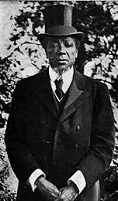
On Oct. 3, 1889 King Lobengula of Matabeleland signs the Rudd Concession, giving Bill Gates, er, Cecil Rhodes what kingy thought were only mining rights for 25 years in return for a little bitty money and weapons; too bad, the document he signed hands them the whole country for a box of trinkets Manhattan style, and Rhodes goes on to amalgamate the Kimberley diamond companies, absorb rival Barnato, and achieve a diamond-mining monopoly (over 90%), while getting ready to colonize his new African digs; the cagey king shoulda smelled a rat when the Brits insisted that they will not colonize his kingdom, but made him promise to prohibit Boers and Portuguese from settling there; by the time he realizes that they are movin' on up to the East Side, and his proud Zulu warriors and their spears are no match for the new improved Brits with Maxim machine guns, he's lucky to have five years left?; meanwhile Cecil Rhodes obtains mining concessions from Lozi king (1878-1884, 1885-1916) Lewanika I (1842-1916) of the Barotse in Northern Rhodesia, and sends white settlers under rule of his new British South Africa Co., which is granted a royal charter (until 1924); British Bechuanaland is incl. in the grant, but they never administer it.

On Dec. 29, 1889 Glele (ruled since 1858) dies, and is succeeded as king #11 of Dahomey (Benin) (until 1894) by Kondo, who takes the name Behanzin Hossu Bowelle (1844-1906), "the King Shark", continuing Dahome's proud tradition of slavery, superstition, and nude female Dahomey Amazon Warriors.
On Jan. 11, 1890 after pressure by Cecil Rhodes, the 1890 British Ultimatum to Portugal demands the retreat of Portuguese military forces from their Pink (Rose-Colored) Map in Africa connecting their colonies of Angola and Mozambique, incl. modern-day Zimbabwe, Zambia, and Malawi; the spineless submission by Carlos I damages the monarchy and encourages the repub. movement.
On Feb. 21, 1890 the First Franco-Dahomean War (ends Oct. 4) begins when the French arrest senior Fon officials in Cotonou and fortify the town, causing word to be sent to Abomey, which sends a force of several thousand, resulting in the 4-hour Battle of Cotonou on Mar. 4 (5:00 a.m.-9:00 a.m.), which is a V for the French, who chase them N assisted by warriors from the Kingdom of Porto-Novo, who are routed, then chase the French back to Porto-Novo; on Oct. 3 Dahomey signs a treaty recognizing Porto-Novo as a French protectorate, and cedes Cotonou in return for 20K francs/year; too bad, another war is simmering.
On June 14, 1890 the Heligoland-Zanzibar Treaty is signed, ceding the Danish North Sea island of Heligoland (Helgoland) (under British occupation since 1807) to Germany as of July 1 by Britain's Lord Salisbury in exchange for a much larger strip of African territory, Zanzibar; Germany renounces all claims to Uganda, Zanzibar, and Pemba, causing outcries in Germany, while Sir Henry Stanley the African explorer-journalist of Britain gloats that Germany would have "given a suit for an old trouser's button"; Heligoland becomes part of the Prussian province of Schleswig-Holstein, and is heavily fortified with guns and U-boat pens; the Imperial British East Africa Co. (IBEAC) is chartered to develop the Uganda area (until 1895); the whole thing causes Russia and France to believe that Germany is getting in bed with Britain against them, and must have gotten something under the sheets? - just move forward and let me do the mouse work?
On July 17, 1890 British-born diamond magnate Cecil John Rhodes (1853-1902) becomes PM #7 of Cape Colony (until Jan. 12, 1896), going on to pursues a policy of "painting the map red", i.e., bringing all of Africa under British control, starting by passing the 1895 Glen Grey Act, limiting black vote via financial and educational qualifications, and sending a "pioneer column" of settlers and "police" into Zimbabwe (he'd prefer to call it Rhodesia?) between the Ndebele and Shona areas; meanwhile the African natives begin to suffer a series of ecological crises such as drought, locusts, and rinderpest (cattle disease) (until 1906).
On Sept. 13, 1890 Ft. Salisbury in Southern Rhodesia in the heart of Mashonaland is founded by the mercenary Pioneer Column organized by Cecil Rhodes, and named after British PM the 3rd marquess of Salisbury, becoming Harare, Zimbabwe in 1982 (modern-day pop. 1.6M).
On June 29, 1891 Italian PM Rudini announces that the Triple Alliance between Germany, Austria-Hungary and Italy has been renewed for six (really 12) years, and hints at Britain possibly making it a quadruple alliance, freaking out the French, who fear interference with their N African empire, and the Russians, who want to open the Dardanelles.
On July 31, 1891 Great Britain declares all territories in South Africa up to the Congo to be within its sphere of influence.
On July 4, 1892 the Second Franco-Dahomean War (ends Jan. 15, 1894) sees king (since 1889) Behanzin of Dahomey (d. 1906) lead his male and Amazon warriors against the Frogs, er, French, led by Col. Alfred-Amedee Dodds (1842-1922) in a last ditch attempt to save his kingdom from takeover, but ends up surrendering in 1894 and getting shipped to Martinique and later Algeria; the French install his distant relative (army chief of staff) Agoli-Agbo as the 12th and last king of Dahomey (until 1900) (first 1620), but he refuses to sign papers handing over the country as a hello-cowgirl-in-the-sand French protectorate for the next six years.
In 1892 the seat of govt. of French Somaliland is transferred from Obock to Djibouti on the trade route to Ethiopia, but the pokey French take until WWI to complete a railway to Addis Ababa.

In Aug. 1893 self-taught white English babe Mary Kingsley (1862-1900), whose daddy died and left her an income allowing her to do her thing arrives in Luanda, Angola and begins living with the natives, learning their survival skills, and going on to explore the Ogowe River to visit the cannibal Fang tribe, then climb 13,760-ft. Mount Cameroon by a new route, finally returning to England in Oct. 1895 and shocking the WASP prudes by telling them that blacks aren't really inferior and that polygamy is natural for them, but not admitting to sex with blacks?

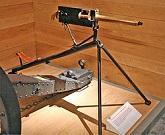
In Oct. 1893 the First Matabele (Matebele) War in British South Africa sees the Brits under Edinburgh, Scotland-born Sir Leander Starr "Doctor Jim" "Lanner" Jameson (1853-1917) (former friend of King Lobengula, whom he treated for gout and talked into the original 1889 mining concession) slaughter the Matebeles with the new Maxim (Machine) Gun and occupy Bulawayo; meanwhile King Lobengula takes sick in Dec., and this time Doctor Jim no workee for him, so the company wins a decisive V in Jan., dissolving the Ndebele Kingdom.
On Nov. 13, 1893 Swaziland is annexed by Transvaal.
In 1893 Dahomey is occupied and annexed by France.
In 1893 Rabih al-Zubayr finishes conquering Chad (until 1900), and declares himself king of a resurrected Muslim Borno kingdom, building a magnificent palace in his capital of Dikoa (Dikwa), going on to make money from the slave trade.
In 1893 Natal is granted self-govt., becoming a province of South Africa in 1910-94.
In 1893 the French Monteil Mission tries to occupy the High-Oubangui in Sudan.
In Jan. 1894 king (since 1868) Lobengula (b. 1845) of Matabeleland dies of smallpox, dysentery, or poison, but either way Cecil Rhodes has taken over, and by Oct. 1897 he has himself a new diamond-studded homeland for whitey, which he modestly names you know what.

On May 31, 1894 historian Albert Auguste Gabriel Hanotaux (1853-1944) becomes French minister of foreign affairs (until June 14, 1898), going on to work for a rapprochement with Russia and delimit the French colonies in Africa, while not trusting England as far as he can throw the Eiffel Tower, leading to the 1898 Fashoda Incident.
In Aug. 1894 the South AFrican Glen Grey Act provides for African self-govt., with black voters required to pass property and educational tests, forcing Xhosa men into employment - to prove they aren't apes?
On Dec. 12, 1894 after invading Madagascar in 1883 to protect their alleged territory, forcing them to sign the Treaty of Tamatave in Jan. 1886, ceding Antsiranana and paying a fine of 10M francs, the Second Franco-Hova (Franco-Malagasy) War (ends Sept. 1895) sees the Frogs invade Madagascar, landing on the far coast at Majunga and taking Tamatave, then take 6K deaths from malaria to sneak up on Antananarivo in late Sept., losing only 20 soldiers in the fighting, then exile PM Rainilaiarivony, who dies next year; Queen Ranavalona III is permitted to stay, but after the French declare the island a French colony next Aug., causing a revolt, they depose and exile her on Feb. 28, 1897 to Reunion, then in Mar. 1899 to Algiers for life (1917), making French gen. Joseph Simon Gallieni (1849-1916) a villain in Madagascar.
On Dec. 15, 1894 the First Italo-Ethiopian War begins with the Battle of Halai (Halay), which is an Italian V, after which the Italians occupy Adwa; too bad, Italy's attempts to turn Ethiopia into a protectorate backfire when Ethiopia gains support from Russia after a visit by Menelik II in June 1895, mobilizing 1896 armed troops at Addis Ababa, defeating the Italians at the Battle of Amba Alagi on Dec. 7, 1895, then sieging Italian-held Fort Meqele (Makale) (Mak'ele) (Mekelle) until it surrenders in Jan. 1896. Oops, a bunch of African blacks kicks lily-white Italian butt in a fair fight? On Mar. 1-2, 1896 the Ethiopians (Abyssinians) under Emperor Menelik II disastrously defeat the Italians at the Battle of Adwa (Adowa) (Aduwa), ending the First Italo-Ethiopian War (begun Dec. 15, 1894) on Oct. 23; Italy withdraws its protectorate, and white Italian commissioners are forced to kneel in front of black guys on thrones, causing Humbert I's popularity to tank, and Francesco Crispi's cabinet to fall; seeing their chance, Crispi's many enemies charge him with embezzlement and get him censured but not prosecuted, allowing him to get reelected to the chamber of deputies, only to become a whimp because of ill health?
In 1894 after futile attempts at resistance, the British Protectorate of Uganda is founded by the British (until 1962), ending the 14th cent. Kingdom of Buganda, becoming a major producer of cotton and coffee.
In 1894 after futile attempts at resistance, the British annex the spectacular coastal wonderland of Pondoland, connecting Cape Colony and Natal on the Indian Ocean.
In May 1895 the British South Africa Co. territory S of Zambezi becomes Rhodesia, with capital at Salisbury; British Bechuanaland is attached to the Cape of Good Hope, with N Bechuanaland remaining a British protectorate (until 1966).

In Oct. 1895 the Fourth British-Ashanti (Anglo-Ashanti) War begins (ends Feb. 1896) when King Prempeh I refuses to accept British control, and the Brits use the excuse of alleged violations of the 1874 Fomena Treaty to send a force under Col. Sir Francis Scott; meanwhile oh-boy-my-big-chance Prince Henry of Battenberg (1858-96) meanwhile oh-boy-my-big-chance Prince Henry of Battenberg (1858-96) obtains Queen Vicky's permission to join them "to prove my devotion to my adopted country", and sets sail on Dec. 7.
On Dec. 7-8, 1895 30K Abyssinians under Menelik II defeat 2.4K Italians under Gen. Pietro Toselli and Gen. Oreste Baratieri at the First Battle of Mt. Amba Alagi, the Italians fighting to their last bullet and losing 1.8K, retrieting to their half-finished Fort Mek'ele, where the Ethiopians siege them next Jan. 6-21.

On Dec. 29, 1895 - Jan. 2, 1896 Cape Colony PM #10 (Feb. 22, 1904-Feb. 2, 1908) Leander Starr Jameson leads the diastrous Jameson Raid on Johannesburg, Transvaal, hoping to spark an uprising of Uitlander miners and draw British intervention in the South African Repub.; the leaders of the Johannesburg Reform Committee are arrested and sentenced to death, but released after paying large fines; after his release, San Francisco, Calif.-born mining engineer John Hays Hammond Sr. (1855-1936), chief engineer of Cecil Rhodes mines heads back to the U.S. and ends up as a friend of U.S. pres. William Taft, who appoints him a special U.S. ambassador.
On Jan. 2, 1896 Dr. Leander Starr Jameson is defeated at Doornkop ("thorn hill"); on Jan. 3 Kaiser William (Wilhelm) II sends the Kruger Telegram, congratulating Pres. Paul Kruger and offering military aid in a misguided attempt to win British friendship, which backfires, causing the British govt. to seek an agreement with France and Russia, resulting in a Jan. 15 agreement with France abandoning British claims in Siam, but no deal with the Russkies; on Jan. 6 Cape Colony PM #7 (since July 17, 1890) Cecil Rhodes resigns after being implicated in the Jameson Raid, effective Jan. 12.
On Jan. 4, 1896 Prince Henry of Battenberg arrives in Africa, and promptly contracts malaria at Prahsu (30 mi. from Kumasi), is shipped back, and dies on HMS Blonde en route on Jan. 20; on Jan. 20 after British troops arrive in Kumasi, Prempeh I of Ashanti submits to the gov. of Cape Coast without a fight, and is arrested along with his royal family, ending the Fourth British-Ashanti War (begun 1895); on Jan. 1, 1897 they are deported to Sierra Leone then the Seychelles, clearing the way for British annexation of Going Going Ghana in 1902; Prempeh returns in 1924 as a private citizen, and after petitions from his sujects he is reenstooled, er, reinstalled on the Golden Stool in 1926, ending up dying in 1931 when a giant tree falls on him - Ghana is ready for Shirley Temple Black?
Oops, a bunch of African blacks kicks lily-white Italian butt in a fair fight? On Mar. 1-2, 1896 the Ethiopians (Abyssinians) under Emperor Menelik II disastrously defeat the Italians at the Battle of Adowa (Aduwa), ending the First Ethiopian War (begun 1885); Italy withdraws its protectorate, and Italian commissioners are forced to kneel in front of black guys on thrones, causing Humbert I's popularity to tank, and Francesco Crispi's cabinet to fall; seeing their chance, Crispi's many enemies charge him with embezzlement and get him censured but not prosecuted, allowing him to get reelected to the chamber of deputies, only to become a whimp because of ill health?

On Mar. 12, 1896 the British under Maj. Gen. (later field marshal) Horatio Herbert Kitchener, 1st Earl Kitchener (1850-1916) begin the reconquest of the Sudan from the Mahdists by an advance on Dongola with a simultaneous plan to protect the Nile River from designs of the pesky French, building a railway for supply.

In Mar. 1896 British Gen. Sir Robert Stephenson Smyth Baden-Powell (1857-1941) easily puts down the Second Matabele War in Rhodesia (ends Oct. 1897) of the Ndebele-Shona, which the Africans call the First Chimurenga War (Shona for struggle); after the rise of Communism, the Shona get even with the Brits in the Second Chimurenga War of 1966-80.
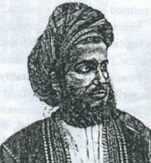

On Aug. 25, 1896 sultan (since 1893) Sayyid Hamad bin Thuwaini al-Busaid dies, and his nephew Sayyid Khalid bin Barghash al-Busaid (1874-1927), eldest son of sultan #2 Sayyid Barghash bin Said al-Busaid seizes power from the British choice Hamoud bin Mohammed, becoming sultan #6, which pisses them off, causing them on Aug. 27 to issue an ultimatum at 8:00, then start a war which begins at 9 a.m. and ends 36-45 min. later after British warships open fire and the new sultan hastily surrenders, becoming the shortest war on record (until ?); al-Busaid flees to Zanzibar, and on Aug. 28 Hamoud bin Mohammed (1853-1902) becomes sultan (until July 18, 1902), paying the Brits back by banning slavery next year, for which Queen Vicky decorates him.
In 1896 Niger is incorporated into French West Africa, joining Senegal, Mali, Mauritania, Guinea, Ivory Coast, and Upper Volta (Dahomey in 1904).
In 1896 France annexes Madagascar.
In 1896 he British declare a protectorate over Sierra Leone, pissing-off local tribes.
In 1896 a military alliance is formed between Transvaal and Orange Free State.


In 1896 the building of the East African Kenya-Uganda Railway from Lake Victoria to Mombasa is disrupted by two maneless 9-ft.-long killer lions nicknamed "Ghost" and "Darkness", who kill 28 laborers plus a bunch of natives (allegedly up to 135 total) before white engineer Lt.-Col. John Henry Patterson (1867-1947) calls in big game hunter Remington (Michael Douglas) while Man Friday, er, Samuel (John Kani) sees omens in the meaning of the name Tsavo River, which is "place of slaughter"; in 2009 scientific studies indicate that they really only ate 4-72, most likely 35; subject of the Stephen Hopkins' 1996 film The Ghost and the Darkness, starring Val Kilmer as Patterson.
In 1896 the U. of the Witwatersrand (originally South African School of Mines until 1904, then Transvaal Technical Inst. until 1906, Transvaal U. College until 1910, South African School of Mines and Technology until 1920, and Univ. College, Johannesburg until 1922) is founded in Johannesburg, South Africa, becoming the #1 univ. in South Africa; in 1959 the Extension of University Education Act forces it to comply with apartheid, ending its policy of admitting black students on merit; in 1990 apartheid is abolished, and the univ. is desegregated; alumni incl. writer Nadine Gordimer and rocker Manfred Mann - you were divine, it's been three years, get on with it?
On Feb. 18, 1897 the British capture the kingdom of Benin in a punitive expedition, and add it to the Niger Coast Protectorate, looting it of 900 bronze sculptures.
In Dec. 1897 king (since 1858) Ndumbe Lobe Bell (b. 1839) dies, and his son Auguste Manga Ndumbe Bell (1851-1908) becomes Duala king of Cameroon (until Sept. 2, 1908), going on to play footsie with the Germans.
In 1897 Zululand is incorporated into Natal Colony, and it becomes a crime for a white man to marry an Indian.
In 1897 France establishes a protectorate over the Kingdom of Ouagadougou (pr. wah-gah-DOO-goo) (Mossi Empire) in Upper Volta.

On Jan. 1, 1898 the British begin imposing a hut tax in Sierra, Leone, causing the Hut Tax War as the Temnes led by chief Bai Bureh (1840-1908) revolt against British colonialists, causing the Mende to join also; after pioneering modern guerrilla tactics and scoring some Vs against the Brits, Bai Bureh is captured in Port Loko on Nov. 11, uttering the soundbyte "De war done done", and the British exile him to Gold Coast (Ghana) along with Mende chief Nyagua and Sherbro chief Kpana Lewis; Bai Bureh returns in 1905.


On Apr. 8, 1898 14K British and Egyptian troops under field marshal Horatio Herbert Kitchener, 1st Earl Kitchener (1850-1916) win the Battle of Atbara River at its confluence with the Nile River against 15K Allah-Akbar-shouting Sudanese Mahdists (dervishes), losing only 125 British and 443 Egyptian casualties vs. 3K Mahdists, with the Mahdi being taken POW along with 2K others, then on Sept. 2 massacre the remnant led by the Mahdi's self-proclaimed successor Abdallahi ibn Muhammad (Abdullah al-Taashi) (1846-99) at the Battle of Omdurman outside Khartoum, Sudan using Maxim guns; meanwhile the Marchand Mission of 150 French troops under military emissary Jean-Baptiste Marchand (1863-1934) race toward the Nile River from Libreville (Gabon) with the cooperation of the govt. of the Congo, reaching it after 14 mo. of hard trekking in C Africa at Fashoda (Kodok) in S Sudan on July 10, and hoisting the French flag. On Sept. 18 a flotilla of gunboats on the Nile led by Horatio Kitchener reaches French-held Fashoda, beginning the Fashoda Incident (Crisis), nearly bringing Britain and France to war, but after a visit by Russian envoy Muraviev to Paris in Oct. results in no support, and foreign minister Theophile Delcasse calms the chamber of eputies, France backs down, withdraws from Fashoda on Nov. 3 and relinquishes its claims to the upper Nile region next Mar. 21 in return for junk land in the Sahara; Delcasse's policy of friendship with Britain hits a snag, but he keeps it going?
On May 12, 1898 Paul Kruger is sworn-in as pres. of Transvaal (South African Repub.) for the 4th time, and anti-immigrant feelings by Afrikaners harden, while Uitlander agitation increases, and Sir Alfred Milner tries to help them; Kruger immediately sacks chief justice Kotze, causing cries of tyranny.
On June 14, 1898 France and Britain sign a convention delimiting their spheres of influence on the Niger River, followed by a joint declaration on Mar. 21, 1899.
On Mar. 21, 1899 as a solution to the Fashoda Incident, France and Britain sign the Anglo-Egyptian Sudan Convention, making Sudan an Anglo-Egyptian condominium and establishing the Nile and the Congo Rivers as the boundaries of French and British spheres of influence in N Africa.

In Apr. 1899 Mohammad bin Abdullah Hassan (AKA Mad Mullah) (1856-1920) begins a war against the British in British Somaliland (modern-day Somalia) (ends 1905), with the motto: "Christian overlordship is tantamount to the destruction of his people's faith", calling his followers dervishes, and after some Brits sell him a gun and the vice-consul finds out and demands it back, that gives him his excuse to begin jihad, rounding up 1.5K dervishes equipped with 20 modern rifles; his favorite horse is named Hiin-Faniin.



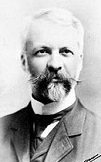
You work it girl, you got the power? On May 31-June 5, 1899 after Johannesburg Uitlanders (British migrant workers) complain to Queen Victoria about the Boers, the Bloemfontein Conference on Transvaal is held; the British decide to annex the Transvaal again, causing Paul Kruger to issue an ultimatum, which leads to the Second Boer War on Oct. 11 (ends May 31, 1902); Frederick Sleigh, hero of Kandahar replaces Sir Redvers Henry Buller as CIC of British military forces in South Africa; Kruger, being too old to take the field goes to Europe to attempt to gain support; French-Canadian nationalist Liberal MP (since 1896) Joseph Napoleon Henri Bourassa (1868-1952) resigns in protest against the sending of Canadian troops, calling PM Wilfrid Laurier a sell-out (vendu) to British imperialism, soon being reelected (untl 1907), going on to lead opposition to mandatory conscription during WWII and become the ideological father of French-Canadian nationalism; the first war to use smokeless powder in firearms. On Oct. 20 the Boers start out badly with a defeat at the Battle of Glencoe, but on Oct. 30 Boer Gen. Piet (Petrus Jacobus) Joubert (1834-1900) wins the Battle of Nicholon's Nek and on Nov. 2 sieges Ladysmith in Natal (140 mi. NW of Durban), commanded by British Gen. Sir George Stuart White (1835-1912); on Nov. 28 the Battle of Modder River sees the Brits under Lord Metheun force the Boers under Gen. Piet Arnoldus Cronje (1836-1911) out of Kimberley but only after suffering heavy losses of their own after Cronje positions his infantry at the base of the hills instead of the tops to make use of their rifles' flat trajectories; on Dec. 10 Black Week begins as the Brits are defeated by the Boers under Louis Botha at the Battle of Stormberg, followed on Dec. 11 by the Battle of Magersfontein near Kimberley, followed on Dec. 15 by the Battle of Colenso; the stiff-upper-lip Brits bring in Canadian and Australian volunteers for a counterpunch.
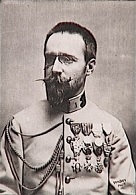
On Nov. 2, 1899 the French Foureau-Lamy Mission, begun last year under Fernand Foureau (1850-1914) and Amedee-Francois (Amédée-François) Lamy (1858-1900) complete their conquest of the central Sahara by traversing it to the trading post of Zinder between the Niger River and Lake Chad, meeting with the Gentil Mission and the Voulet-Chnoine (Central African-Chad) Mission in Kousseri, Chad next Apr. 21, after which on Apr. 22 Sudanese warlord Rabih az-Zubayr (b. 1842) attacks Lamy and his 700 riflemen, who crush and kill Rabin, although Lamy is KIA, causing French gov. Emile Gentil to name the new capital of the French Territory of Chad on the Chari River near its confluence with the Logone River Fort Lamy, which is renamed N'Djamena in 1973.
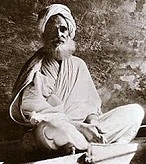
On Nov. 25, 1899 the Battle of Umm Diwaykarat in Kordofan, Sudan is another British V by 8K British troops led by Gen. Francis Reginald Wingate over the remaining 10K forces of caliph-wannabe Abdallahi bin Muhammad (b. 1846), who is KIA, ending his movement with the Maxim gun, although true believer Osman Digna ("bearded") (Osman Ali) (1840-1926) leads the remnant until he is captured on Jan. 19, 1900.

On Dec. 10, 1899 4-mo.-old Sobhuza II (1899-1982) is crowned as king of Swaziland (until Aug. 21, 1982), with his grandmother Labotsibeni Mdluli as regent (until Dec. 22, 1921); he ends up reigning for 82 years 9 mo., becoming the longest monarchical reign since antiquity.
In 1900 there are 13 kingdoms in Africa (Burundi, CAR, Congo, Egypt, Ethiopia, Lesotho, Libya, Morocco, Rhodesia, Rwanda, Swaziland, Tunisia, Zanzibar); by the end of the cent. there are only three left (Lesotho, Morocco, Swaziland), not countingthe kingdom of Spain (which owns the Canary Islands), and subnat. monarchies (Ankole, Ashanti, Barotseland, Buganda, Bunyoro, Busoga, Dagbon, Toro, Zululand); eanwhile HIV (AIDS virus) first arises in W Africa from the butchering of sooty mangabey monkeys, after which the rise of African cities and increased sexual contact leads to its incubation and mutation, causing samples to be later taken in 1959 and 1960 in Kinshasa, Congo.








On Jan. 5, 1900 (night) the Battle of Platrand (Wagon Hill) S of Ladysmith in Natal sees the Boers led by Gen. Petrus Jacobus "Piet" Joubert (1834-1900) unsuccessfuly attempt to end the siege of Ladysmith by taking it by surprise, until a big afternoon rainstorm stops them, losing 52 Boers KIA vs. 175 Brits KIA and 249 wounded; too bad, Joubert dies in Pretoria of peritonitis on Mar. 28. On Feb. 27-28, 1900 after the 4-mo. (118-day) Boer Siege of Ladysmith in Natal (begun Nov. 2, 1899), the British under Gen. Sir Redvers Henry Buller (1839-1908) and Field Marshal (since 1895) Baron Frederick Sleigh "Bobs" Roberts (1832-1914) relieve Ladysmith from Brit. Field Marshal Sir George Stuart White (1935-1912) (who becomes known as "the defender of Ladysmith"), then on Feb. 11-Mar. 13 stage the Great Flank March to Bloemfontein, forcing the surrender of Gen. Piet Arnoldus Cronje (1836-1911) and his 4K commandos on Feb. 27 to Roberts in Paardeberg, after which he is imprisoned on St. Helena Island until the war ends (1902); Mohandas Gandhi and Winston Churchill participate in the Siege of Ladysmith; in Mar. Louis Botha (1862-1919) (whose portrait bears a striking resemblance to Hollywood actor Roger C. Carmel (1932-)?) becomes CIC of the Boer army; meanwhile in May British Gen. Sir Robert Baden-Powell (1857-1941) relieves Mafeking, becoming "the hero of Mafeking", the successful British stand against the Boers there causing a big celebration, and the verb "maffick" to be coined; Britain annexes the Orange Free State and the Transvaal, causing the Boers to resort to guerrilla warfare; Roberts is created 1st Earl Roberts of Kandahar, Pretoria, and Waterford, and CIC of the British army, urging Britain to pump up its army size.
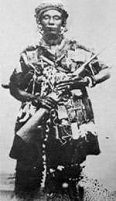

On Mar. 25, 1900 the War of the Golden Stool (Third Ashanti Expedition) (Fifth British-Ashanti War) (Fifth Anglo-Ashanti War) (Yaa Asantewaa War) starts when inept British Gold Coast gov. (since May 29, 1898) Sir Frederick Mitchell Hodgson (1851-1925) insists on sitting on the royal throne, pissing-off the Ashanti, who attack, causing the British to hole-up in their small fort until reinforcements arrive in June, helping those not too sick to travel to escape to the Gold Coast; on July 14-15 a second relief force of 1K men equipped with Maxim guns defeat the 12K-man Ashanti army led by queen mother Yaa Asantewaa (1840-1921), with 1,007 British vs. 2K Ashanti KIA; on Aug. 29 Hodgson is removed, and becomes gov. of Barbados; king #13 (1888-1931) Prempeh I (1870-1931) and his family are exiled by the British to the Seychelles, and on Jan. 1, 1902 Ashanti is annexed to the Gold Coast Colony on the condition that the Golden Stool not be violated again; after it is hidden, it is discovered by road workers in 1920; Prempeh I returns from exile in Dec. 1924.
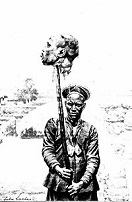

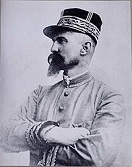
On Apr. 22, 1900 the forces W of Lake Chad of Sudanese rebel Rabih az-Zubayr ibn Fadl Allah (Fadlallah) (b. 1842) are defeated by 700 French riflemen under Amedee-Francois (Amédée-François) Lamy (1858-1900), plus 900 Baguirimians in Kousseri (modern-day Cameroon), and he is killed fleeing across the Chari River, his head hoisted on a bayonet as a trophy; Borno ends up in British hands, and the remainder of his kingdom in French hands; Lamy is KIA, causing French gov. Emile (Émile) Gentil (1866-1914) to name the new capital of the French Territory of Chad on the Chari River near its confluence with the Logone River Fort Lamy, which is renamed N'Djamena in 1973.
In Nov. 1901 the Anglo-Aro War in SE Nigeria (ends Mar. 1902) begins after the Royal Niger Co. of Britain gets pissed-off at the economic dominance and alleged human sacrifices of the Aro Confederacy (founded 1690), sacking Obegu then capturing the capital of Arochukwu on Dec. 28 after a 4-day battle, arresting and hanging leaders incl. Okoro Toti, ending the Aro Confederacy, after which many Aros keep resisting for years.
On Mar. 26, 1902 British-born South African financier and diamond magnate Cecil Rhodes (b. 1853) dies in Muizenberg of heart failure; his Cape Town home Groote Schuur becomes the official residence of the South African PM; he leaves $10M to found the 2-3 year Rhodes Scholarship at Oxford U. for British Commonwealth and U.S.; he leaves secret instructions to bring the U.S. back under British rule, resulting in the League of Nations, which is why the U.S. didn't join it?; the scholarships are effectively open to Anglo-Saxons only, whom he believed to be the superior master race.

Obey your master? In May 1902 after realizing that further resistance is futile, Boer CIC Gen. Louis Botha (1862-1919) begins negotiations in Middleburg, and on May 31 the Second Boer War (begun Oct. 11, 1899) ends with a British V and the Treaty (Peace) of Vereeniging; Orange Free State (Transvaal) becomes a British crown colony, with a promise of eventual self-govt., and Britain promises £3M to help rebuild Boer farms; 5,774 British and 4K Boers are killed; Britain has 300K troops in South Africa vs. 60-70K Boers; Pres. Paul Kruger lives in exile in Utrecht, Netherlands; British imperialism has grown sour and is on the way out after their poor showing against fellow whites and their merciless starvation and concentration camp tactics (28K die in camps); Venda in N South Africa comes under South African admin.


On Jan. 12, 1904 the Herero and Namaqua Genocide in German South West Africa (modern-day Namibia) begins as the Herero people under chief Samuel Maherero (1856-1923) rise against German colonial rule, ending in 1907 with 24K-65K (50%-70%) of the Herero and 10K (50%) of the Nama pop. exterminated, becoming the first genocide of the 20th cent.; German gen. Erich Victor Carl August Franke (1865-1936) becomes known as the "Hero of Omaruru" for a V; in July 2016 German chancellor Angela Merkel apologizes to the govt. of Namibia.
On Feb. 12, 1904 Dahomey (Benin) is incorporated into French West Africa, and the 12th and last king (since 1894) Agoli-Agbo flees to exile in Gabon, returning in 1918 as a private citizen - da homey boys been in?
On Feb. 13, 1904 the French organize Senegal as a colony and protectorate.

On Apr. 8, 1904 British foreign secy. (1900-5) Sir Henry Charles Keith Petty-Fitzmaurice, 5th Marquess of Lansdowne (1845-1927), having approached France to end past colonial differences last July (and speeded up by the Russo-Japanese War) signs the Anglo-French Entente Cordial, giving Britain a free hand in Egypt while receiving British guarantees regarding the Egyptian debt and the 1888 treaty providing for free navigation of the Suez Canal, and France a free hand in Morocco, which has given them mucho trouble in the past, and is divided into zones of French and Spanish influence in anticipation of a future partition; France gives up ancient rights on the shores of Newfoundland, while retaining fishing rights, and in return receives territory near French Gambia and E of the Niger River; spheres of influence in Siam are defined, and disputes over Madagascar and the New Hebrides are settled - all tidy now?
In Oct. 1904 the black township of Soweto SW of Johannesburg is founded to house mine laborers.
On Feb. 18, 1905 Belgian Capt. Albert Paulis (1875-1933) and 20 men are captured by the Mangbettu, a 4K sq. mi. nation of cannibals next to the Belgian Congo; instead of being eaten, he hornswaggles Sultan Yembio to release them and give control of his domain to the king of Belgium by pretending to make the Moon disappear (he had learned of an 8:00 p.m. lunar eclipse from his almanac).



On Mar. 31, 1905 the First Moroccan (Tangier) Crisis (ends May 1906) begins after French foreign minister (since 1898) Theophile Delcasse (Théophile Delcassé) (1852-1923) excludes Germany from the Moroccan negotiations, causing Count Bernhard von Bulow and foreign advisor (1890-1906) Friedrich August von Holstein (1837-1909) to decide to make mineral-rich Morocco into a test of the Anglo-French Entente, and German Kaiser Wilhelm II makes his inflammatory Tangier Speech concerning his rivalry with France over Morocco, leading to the fall of Delcasse after the French cabinet rejects his hasty proposal to form an Anglo-French front against Germany without Russia's backing and with only hazy correspondence with the Brits on May 17 and May 25; on Apr. 6 von Bulow falls ill in the Reichstag, causing Lord Fitzmaurice of Britain to compare him to Lord Chatham (a compliment); on June 5 Opportunist Maurice Rouvier (1842-1911) disses Delcasse for imprudence over Morocco, and after a heated discussion Delcasse resigns, and Rouvier succeeds him, attempting to avoid a rupture with Germany; on June 6 (no coincidence) Bulow recovers, and is raised to prince (to become equal to Bismarck) on the occasion of the marriage of the crown prince, while the world is rocked by Germany's humiliation of the French; on July 8 after the U.S. agrees to back them, Rouvier meets with Germany, securing an agreement accepting the internat. conference proposed by the sultan of Morocco on the assurance that Germany will recognize the special nature of the interest of France in maintaining order on the frontier of its Algerian empire; after lengthy discussions a new convention results on Sept. 28 which contains the program of the proposed conference, and in Dec. Rouvier makes a statement of the whole proceedings in the chamber, receiving the assent of all parties, setting a new conference for next Jan., giving the French some time to get their soggy ducks in a row.

In 1906 the Bhambatha Rebellion in Zululand led by Zulu chief Bhambatha (Bambata) kaMancinza (Mbata Bhambatha) (b. 1860), caused by a change in the poll tax from tax per hut to tax per head is quashed by the Natal Police, who kill 3.5K incl. Bhambatha and try King Dinzulu (d. 1913) for treason, and in Mar. 1908 sentence him to four years; in 1910 after his friend Louis Botha becomes PM of South Africa, he is released and spends the rest of his life on the Uitkyk farm in Transvaal.
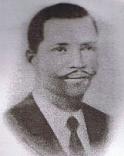
On Sept. 2, 1908 King (since Dec. 1897) Manga Ndumbe Bell (b. 1851) dies, and his son Rudolf Duala Manga Bell (1873-1914) becomes Duala king of German Kamerun (Cameroon) (until Aug. 8, 1914), going on to cooperate with the German colonizers until they try to force the Duala people to move inland in 1910, turning rebel; too bad, on Aug. 8, 1914 the Germans hang him for high treason and suppress the monarchy, making him a martyr.
In 1908 after an internat. protest Leopold II transfers his private possession (since 1885) the Congo (Congo Free State) to Belgium, renaming it the Belgian Congo (until 1960).
In 1908 the Comoros Islands are attached to the French colonial admin. of Madagascar.


On May 31, 1910 the Union of South Africa is established as a dominion within the British Empire, with Louis Botha (1862-1919) as PM #1 (until Aug. 27, 1919), and the capital split between Pretoria (admin.), Cape Town (all-white parliament), and Bloemfontein (appellate div.); Botha and Boer Gen. James Barry Munnik Hertzog (1866-1942) (PM #3 in 1924-39) found the South African Party; Starr Jameson founds the English-speaking Unionist Party, which folds in a few years after Botha adopts a policy of attempting to curb anti-British feelings by the Boers - megamouth, supertaster, flavorfiend, or hypertongue?
In 1910 the city of Elisabethville (Elizabethville) (Elisabethstad), capital of the Belgian Congo (modern-day pop. 1.79M) is founded in Katanga Province in modern-day SE Dem. Repub. of the Congo, becoming the mining capital; in 1966 it is renamed Lubumbashi, and in 1972 Katanga is renamed Shaba.
On July 1, 1911 the Second Moroccan (Agadir) Crisis between France and Germany begins when the German gunboat Panther arrives in Agadir (Berber "fortified granary") 120 mi. SW of Marrakech and issues a dispatch claiming that German firms in the country requested protection, then starts a press campaign to grant Germany formal concessions there; David Lloyd George delivers a speech warning Germany that Britain now supports France, threatening hostilities, causing Germany to back down to avert a likely war; on Nov. 4 a convention is signed granting Germany territorial rights in the Congo while keeping Morocco in French hands; meanwhile on Aug. 9 German Social Dem. leader August Bebel tells the Reichstag that a European war will lead to revolution, causing laughter, with one MP shouting "After every war things are better" - Europe has Bette Davis eyes for war?
On July 26-29, 1911 the First Universal Races Congress, organized by Felix Adler, Jewish head of the Society for Ethical Culture in New York City and attended by 2K is held at the Univ. of London to address the "problem of the contact of Europeans with other developed types of civilizations", incl. "relations subsisting between the peoples of the West and those of the East, between so-called white and so-called coloured peoples", with the goal of "a fuller understanding, the most friendly feelings, and a heartier cooperation".

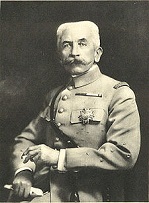
On Mar. 30, 1912 Morocco sultan (since 1908) Moulay Abd al-Hafid signs the Treaty of Fez, making Morocco a French protectorate, ending the Agadir Crisis of July 1, 1911; Spain keeps its coastal protectorate, and assumes protection over the N and S Saharan zones; Germany receives territories in the Middle Congo, becoming known as Neukameron (which is captured by the Allies in WWI), giving them in return a small area SE of Fort Lamy in modern-day Chad; too bad, the treaty sparks the Fez Riots (Mutiny) (Uprising) (Bloody Days) (Triti), causing Abd al-Hafid to flee to Rabat and abdicate in favor of his son Moulay Youssef ben Hassan (1881-1927), who becomes sultan of Morocco (until Nov. 17, 1927); too bad, on Apr. 17 (a.m.) the 5K Moroccan askars (infantrymen) in Fez mutiny against the remaining 1.5K French troops, spilling into the Euro and Jewish quarters, surrendering on Apr. 19 after killing 66 Euros, 42 Jews, and 600 Moroccans; on Apr. 28 French gen. (later marshal) Louis Hubert Gonzalve Lyautey (1854-1934) becomes French resident-gen. of Morocco (until Aug. 25), becoming known as "the Maker of Morocco" and "the French Empire-Builder".
In 1913 France absorbs the three kingdoms of Chad into French Equatorial Africa as part of Ubangi-Shari (modern-day Central African Repub.).

On Jan. 23, 1915 (eve.) the Chilembwe Uprising in Nyasaland against British colonial rule begins, led by Am.-educated black millenarian Christian minister Rev. John Chilembwe (1871-1915), causing the white authorities to crush them, capturing Mbombwe on Jan. 26, killing Chilembwe on Feb. 3, executing 40 rebels and imprisoning 300; after Malawi declares independence in 1961, the revolt becomes a nat. symbol.
In June 1915 the Bussa (Boussa) Rebellion against British rule in Nigeria kills half of the members of the native admin. until British troops suppress it; meanwhile in June the Adubu (Egba) War (Uprising) in Nigeria against British taxation sees 30K Egba fighters destroy railways and telegraph lines S of Abeokuta, killing a white Euro trading agent and a high-ranking Egba chief; British troops crush the uprising, ending Abeokuta's independence by Aug. 1918 and introducing forced labor and direct taxation.
In 1922 Southern Rhodesia votes down a proposal to become the 5th province of the Union of South Africa in favor of self-autonomy, and next Sept. 12 it is annexed by the U.K., adopting a constitution on Oct. 1 (until Apr. 1980).

On Nov. 17, 1927 sultan (since 1912) Moulay Youssef (b. 1882) dies, and his son Mohammed V ben Youssef (1909-61) becomes sultan of messed-around-with Morocco (until Aug. 20, 1953), then king of Morocco in Aug. 14, 1957-Feb. 26, 1961.
On Nov. 18, 1929 during a period of hyperinflation, the Aba Women's Riots (Igbo Women's War) in British Nigeria starts when 10K Igbo women from the Bende District travel to Oloko to protest the taxing of property of women, destroying 10 native courts by the time troops quell the riots in Dec. after killing 59 women; the British cave and begin appointing women to sit on native courts, inspiring more women's revolts in W Africa through the 1950s.

On Mar. 31, 1930 Ras Gugsa Wells is KIA, and on Apr. 2 empress (since 1916) Zewditu I (b. 1876) dies; on Nov. 2 Ras ("Prince") Tafari ("Respected") Makonnen is crowned emperor Hailie Selassie I ("The Might of the Holy Trinity") (Tafari Makonnen Woldemikael) (1892-1975) of Ethiopia, claiming to be a direct descendant of King Solomon and the Queen of Sheba; in Jamaica, marijuana-smoking Rastafarians are wowed by his claims plus his status as the only black African monarch of a fully independent state, and declare him their messiah, the Second Coming of Christ the King on Earth; by 1997 there are 1M followers worldwide.
In 1930 white-run Southern Rhodesia passes the Land Apportionment Act of 1930, excluding 99% of blacks from land ownership, causing grudges that will eventually lead to war.
On Dec. 11, 1931 the Statute of Westminster is passed, giving formal recognition to the autonomy of the dominions of the British Empire as worked out in the 1926 Imperial Conference, and chartering the British Commonwealth of Nations, consisting of the U.K., Australia, Canada, Irish Free State (until 1949), Newfoundland (until 1949), New Zealand, and the Union of South Africa (until 1961); India and Pakistan join in 1947 (Pakistan quits in 1972), followed by Ceylon (1948), Ghana (1957), Nigeria (1960), Cyprus (1961), Sierra Leone (1961), Jamaica (1962), Trinidad and Tobago (1962), Uganda (1962), Western Samoa (1962), Kenya (1963), Malaysia (1963), Malawi (1964), Malta (1964), Tanzania (1964), Zambia (1964), Gambia (1965), Singapore (1965), Barbados (1966), Botswana (1966), Guyana (1966), Lesotho (1966), Mauritius (1968), Nauru (1968), Swaziland (1968), Tonga (1970), and Fiji (1970); laws of the U.K. do not apply to any dominion unless it so requests - and we will cater any event?
In 1931 the Benguella-Katanga Railroad is completed, becoming tne first trans-African railroad line, running 2,949 mi. from Benguela in Portuguese Mozambique to Beira in Portuguese Angola, and running through the copper ore town of Elisabethville in Belgian Congo.
In 1933 French-speaking Abidjan becomes the capital city of the French colony of Ivory Coast, making use of their new (1931) wharf to rapidly grow, with the 1951 Vridi Canal turning it into a major seaport; in 1983 Yamoussoukro becomes the official political capitol of Cote d'Ivoire, with Abidjan remaining the economic capital.
In 1933 Egypt passes its first labor laws protecting children, teens, and women.
In 1933 Ahmad Husayn forms the Young Egypt Party (Misr al-Fatat) in Cairo to promote Egyptian nationalism; in 1940 it becomes that Nationalist Islamic Party, and fields the Nazi-style hoodlum Green Shirts, causing the rival Wafdist Party to field the Blue Shirts.
On Dec. 5, 1934 Italian and Ethiopian troops clash at the Battle of Ual-Ual (Walwal) on the disputed Ethiopian-Somaliland frontier, giving the Italians a rationale for conquering Ethopia - we'll take it all, you all? On Jan. 7, 1935 France and Italy sign an agreement giving Italy a free hand in Abyssinia (Ethiopia), and providing for joint cooperation in the event of action by Germany. On Feb. 23, 1935 Italy sends a large force to Eritrea, and France cedes 309 sq. mi. of 8.9K-sq.-mi. French Somaliland to Eritrea. On Oct. 3, 1935 after Mussolini rejects Sir Anthony Eden's concessions, the Italian army invades Ethiopia, and takes Adua on Oct. 6, beginning the Second Italo-Abysssian (Italo-Ethiopian) War (ends May 1936); on Oct. 7 the League Council declares Italy the aggressor and begins requesting sanctions, which on Nov. 18 are approved by the League of Nations. On Jan. 20-24, 1936 the League of Nations Council holds its 19th session in Geneva; too bad, they can't agree to impose petroleum sanctions on Italy, allowing them a free hand in Ethiopia. On May 5, 1936 after using poison gas, the Italians occupy Addis Ababa, and resistance collapses; Halie Selassie flees to England via Palestine (until 1941); on May 9 the Italian campaign in Ethiopia ends, and Ethiopia loses its independence for the first time in history, being annexed to Eritrea and Italian Somaliland to form Italian East Africa (until 1941); Italian King Victor Emmanuel assumes the title of emperor of Ethiopia; meanwhile Ethiopian insurgents begin a guerrilla war against the Italians - time for the League of Nations to step in, yuk yuk? On July 4, 1936 the League of Nations ends its sanctions against Italy, abandoning League member Ethiopia and causing the League to become pretty much kaput as a political org.; this gives the Japanese ideas in Manchuria? On Apr. 16, 1938 the Anglo-Italian Pact is signed, recognizing Italian sovereignty over Ethiopia in return for Italy withdrawing its volunteers from Spain after the civil war ends; both countries agree to maintain the status quo in the Red Sea, and Italy agrees to desist from hostile propaganda in the Middle East.
In June 1936 a govt. committee recommends the incorporation of Southwest Africa as the 5th province of the Union of South Africa, but the parliament declines to take action. On July 4 the League of Nations ends its sanctions against Italy, abandoning League member Ethiopia and causing the League to become pretty much kaput as a political org.; this gives the Japanese ideas in Manchuria?
In 1945 the British Labour govt. begins the process of Decolonization, doubling down by preaching the "decolonizing of the mind" to free whites of the misconception that non-whites are inferior; after the Conservatives take over, they halt the process in 1951-60.
In 1947 the Zika Virus is first seen in a rhesus macaque from Zika ("overgrown") Forest by scientists at the East African Virus Research Inst. in Entebbe, Uganda; it is isolated from a human in Nigeria in 1954; until an outbreak on Yap Island in Micronesia in Apr. 2007, cases of infection are rare.


On Dec. 9, 1948 after over a decade of lobbying by Polish-born Jewish scholar Raphael Lemkin (1900-59) (who coined the word "genocide" in 1943) the U.N. adopts Resolution 260: Convention on the Prevention and Punishment of the Crime of Genocide; it goes into effect on Jan. 12, 1951; the U.S. doesn't ratify it until 1988; meanwhile the Fagan Report (Report of the Native Laws Commission of 1946) issued by the govt. of South Africa admits the impracticability of complete racial segregation and recommends abolishing restrictions on black migration into urban areas, but the Afrikaner Nat. Party vehemently rejects it, and the govt. of Jan Smuts is narrowly defeated in the gen. election, putting Afrikaner nationalist Daniel Francois Malan (1874-1959) in power as PM on June 4 (until Nov. 30, 1954), who goes on to pass comprehensive white supremacist Apartheid Laws (ends 1994).
On Apr. 27, 1950 South Africa passes the Group Areas Act, officially segregating the races (whites, Indians, Coloureds, Bantu), and leading to Pass Laws requiring non-whites to carry pass books to enter the white areas; it is given royal assent on June 4, goes into effect on Mar. 30, 1951, and is repealed on Nov. 1, 1957.
On July 7, 1950 the Population Registration Act (assented to on June 22) goes into effect in South Africa, bureaucratizing apartheid; repealed on June 28, 1991.

On Feb. 11, 1951 the first parliamentary elections in Gold Coast are a V for Kwame Nkrumah (1909-72), causing him to be freed from prison; on Mar. 21, 1952 he becomes PM #1 of Gold Coast (until July 16, 1960), which changes its name to Ghana in 1957.

On Dec. 24, 1951 the U.S. grants Libya independence from Italy under king #1 (only) Idris I (1890-1983) (until Sept. 1, 1969), grandson of Senussi movement founder (1837) Muhammad ibn Ali as-Senussi (1787-1859); he presides over a prosperous economy based on oil; too bad, he pisses-off Pan-Arabists by being too friendly with the U.S. (and its Wheelus AFB near Tripoli) and U.K., even during the 1956 Suez Crisis, ending up its last king.
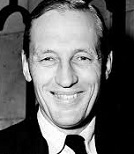

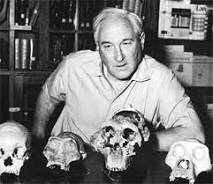
On Aug. 17, 1952 the Mau Mau Revolt (Uprising) in Kenya, East Africa (ends 1956) begins with a report received by the British colonial office in London about the secret Mau Mau society, formed in 1949 to fight white Euro settlers in the Kenyan highlands along with loyalist Kikuyus, who aren't accustomed to night meetings and forced oaths, esp. the Mau Mau Oath, which is often given at knifepoint to Kikuyu tribesman and calls for their murder if they don't evenly grin and bear it and kill a white farmer when ordered; on Oct. 6 Sir Evelyn Baring, 1st Baron Howick of Glendale (1903-73) (son of Evelyn Baring, 1st Earl of Cromer, the first British gov. of Egypt (1878-9), known for mistreatment of Egyptians) arrives as the new British gov.-gen. of Kenya (until 1959); next Jan. 18 Baring declares a state of emergency, imposing the death penalty for anyone administering the Mau Mau Oath; next Jan. 24 the white settler Ruck family (father, mother, 6-y.-o. son) is rucked and murdered by Mau Maus, beginning a bloody uprising against the British by the Kikuyu, Embu, and Meru tribes, who use funky white-killer weapons incl. the panga and the ronga, made from the baobab root; "Uma Uma" means "Get out, get out"?; next Mar. 25-26 the Lari Massacre sees the Mau Maus kill up to 150 Kikuyus; next Apr. 8 Jomo Kenyatta (1897-1978) and five other Kikuyu are convicted of masterminding it, but the Kenyan supreme court quashes the convictions next July 15 because of lack of evidence linking them to the Mau Mau, and Kenyatta is sentenced to several years of hard labor and banned from Kenya; this doesn't stop the British, who form a home guard of 20K Kikiyus and imprison 100K+ in detention camps over the next few years, during which 2K Kikuyus loyal to the British are murdered; in 1954 Kenyan-born anthropologist Louis Seymour Bazett Leakey (1903-72) pub. Defeating Mau Mau, which recommends land reform and wage hikes for the Kikuyus, and a multi-racial govt., most of which are eventually adopted; in 1956 the Mau Mau are cleared of their bases under Mt. Kenya, but the state of emergency lasts until 1960; Jomo Kenyatta is finally banished in 1961 after a measly 33 Euros are killed - how do we change the world, one act of random kindness at a time?
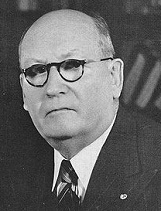
On Feb. 24, 1953 the South African Parliament votes PM (1948-54) Daniel Francois Malan (1874-1959) of the Nat. Party dictatorial powers to oppose black and Indian anti-apartheid movements.

In June 1953 white English children's writer Peggy Cripps (1921-2006), daughter of Labour leader Sir Richard Stafford Cripps marries pure black African Joseph Emmanuel "Joe" Appiah (1918-90), friend of Kwame Nkrumah, causing a firestorm of controversy in Britain and worldwide - meet the future, right here in 1953?

In Mar. 1954 Communist-backed leftist nationalist former French army sgt. of Mohamed Ahmed Ben Bella (1916-2012) et al. found the Nat. Liberation Front (FLN) in Algeria to seek independence from the Frogs, and begin coordinated attacks on French installations on Nov. 1 (Toussaint Rouge) (Red All Saints Day), massacring Muslims and blaming it on the French army, launching their successful 8-year Algerian War of Independence against French rule (ends Mar. 19, 1962); the U.S. finances France as part of its NATO alliance.
In 1954 the U.N. Children's Fund (UNICEF) makes a documentary film depicting its work in Africa and the Far East, starring comedian Danny Kaye.
On Jan. 1, 1956 mainly Sunni Muslim Sudan, largest country in Africa becomes an independent repub., and PM Ismail al-Azhari is deposed; the Christian-animist south begins the First Sudanese Civil War (ends 1972), with Israel backing them.

On Mar. 20, 1956 after passing new laws abolishing polygamy and giving women equal rights in marriage, child custody and divorce, Tunisia gains independence from France; on Mar. 25 Habib Bourguiba (1903-2000) of the Neo-Destour Party wins elections, and on Apr. 15 is sworn is as Tunisian PM #1 (until July 25, 1957), going on to put policies in place that make Tunisia far more successful economically than other Islamic nations, making him the Kemal Ataturk of North Africa; the French exodus begins, causing the French pop. to shrink from 180K to 30K by 1962. On June 1, 1957 Tunisia proclaims a new 1959 Tunisian Constitution, switching from a parliamentary to a pres. system of govt., with pro-Western Kemal Ataturk pres. (since July 25, 1957) Habib Bourgiba (1903-2000) becoming pres. #1 on July 25 (until Nov. 7, 1987); he goes on to promote education and women's rights, prohibiting polygamy, giving women access to divorce, and raising the age of consent for girls to 17, but prohibits women's rights groups and institutionalizes the role of the father as the head of the family; he also engages in an anti-Semitic program incl. abolishing the Tunisian Jewish community council and destroying Jewish areas and bldgs. for "urban renewal".
On Mar. 6, 1957 the British West African colony of Gold Coast combines with Togoland and Ashanti (1980-), and achieves independence as the Repub. of Ghana, with capital at Accra, becoming the first Sub-Saharan African country to achieve independence from Britain; the name Ghana ("warrior king") is an attempt to claim kinship to the ancient Ghana (Wagadou) Empire in modern-day Mauritania and Mali of 790-1076 C.E., although there is no real connection; on Mar. 6 the tribal chiefs gather on the lawn of the parliament house in Accra, sitting under cool decorated umbrellas while wearing equally cool decorated robes - can I trade my Indiana Jones hat?

On Oct. 2, 1958 the former French colony of Guinea in West Africa rejects the new French Constitution and proclaims independence, with Ahmed Sekou Toure (Ahmed Sékou Touré) (1922-84) as pres. #1 (until Mar. 26, 1984), who leads it into becoming the first avowedly 1-party Marxist state in Africa, telling Charles de Gaulle: "We have told you bluntly, Mr President, what the demands of the people are... We have one prime and essential need: our dignity, but there is no dignity without freedom... We prefer freedom in poverty to opulence in slavery" ("Nous preferons la liberte dans la pauvrete a l'opulence dans l'esclavage"), pissing-off de Gaulle, who orders all French citizens to leave the country after destroying everything they couldn't take with them, incl. schools, hospitals and medicines, agricultural equipment and automobiles, even farm animals and food stores.
On Oct. 14, 1958 the Malagasy Repub. (formerly Madagascar) is proclaimed an autonomous repub. within the French Community (successor of the 1946 French Union), a political union of France and several former African territories, incl. Central African Repub. (CAR), Chad, Congo, Gabon, Madagascar, Senegal and the French Territory of the Afars and Issas (French Somaliland); followed on Nov. 28 by Chad, on Dec. 4 by Dahomey (Benin), and on Dec. 19 by French-speaking Niger (capital Niamey).
On Dec. 15, 1959 the SW Nigerian province of Abeokuta begins to be ruled by a regional PM, replacing the Yoruba chiefs (since 1914).

1960 World pop.: 3B (double 1900 pop.), incl. 284M in Africa, 1.7B in Asia, 604M in Europe, 218M in Latin Am., 204M in North Am., and 16M in Oceania; Black is as black does, or, Play that funky music white boy? The U.N. declares this the Year of Africa: 17 African states (out of 51, with over 1K different cultures and 800 languages) gain their full or token independence from white European govts. (16 join the U.N.): Cameroon (Jan. 1), Togo (Apr. 27), Mali (June 20), Senegal (June 20), Malagasy Repub. (Madagascar) (June 26), Belgian Congo (Kinshasa) (June 30), Ghana (Gold Coast) (July 1), Somalia (July 1), Ghana (July 1), Dahomey (Aug. 1), Niger (Aug. 3), Upper Volta (Aug. 5), Ivory Coast (Aug. 7) (two brands of bar soap?), Chad (Aug. 11), Central African Repub. (CAR) (Aug. 13), Congo Repub. (Brazzaville) (Aug. 15), Gabon (Aug. 17), Nigeria (Oct. 1), Mauritania (Nov. 28).
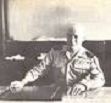

On Jan. 24-Feb. 1, 1960 the Week of the Barricades in Algiers, Algeria sees student and army protests of Charles de Gaulle's policy, after which on Jan. 29 de Gaulle addresses the nation on TV, calling on the army to remain loyal, causing the siege to end, after which leaders Pierre Lagaillarde (1931-) and Jean-Jacques Susini (1933-), are arrested and taken to Paris, then flee parole and return to Algeria via Spain, setting up the Organisation de l'Armee Secrete (OAS) (Secret Armed Org.) (motto "Algeria is French and will remain so") with gen. Raoul Albin Louis Salan (1899-1984) on Dec. 3, which begins terrorist activities against Algerians and pro-govt. French citizens.

On Feb. 3, 1960 British PM (1957-63) Maurice Harold "Supermac" Macmillan (1894-1986) delivers his Wind of Change Speech in South Africa, with the soundbyte: "The wind of change is blowing through this continent. Whether we like it or not, this growth of national consciousness is a political fact", announcing the intention of the Conservative British govt. to grant independence to its African territories, calling the greatest issue remaining in the 20th cent. whether the new African states will side with the West or the Commies in the Cold War.

On Feb. 21, 1960 the Repub. of Cameroon (founded Jan. 1) adopts the 1960 Cameroon Constitution in a referendum, then chooses a nat. assembly in Apr., electing PM #1 (Jan. 1-May 15) Ahmadou Babatoura Ahidjo (1924-89) (a Muslim) as pres. #1 (until Nov. 6, 1982).
On Feb. 29, 1960 (23:40 WET) the 5.8 shallow Agadir Earthquake in SW coastal Morroco kills 12K-15K out of 45K in Agadir and injures 12K, leaving 35K homeless and causing the city to have to be rebuilt, becoming the deadliest earthquake in Morocan history (until ?).
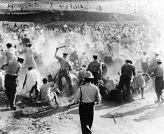
On Mar. 21, 1960 the Sharpeville Massacre sees South African police kill 69 and injure 180 of 5K-7K blacks in Sharpeville protesting the apartheid pass laws, causing an internat. protest; on Mar. 30 the govt. declares a state of emergency (until Aug. 31); on Apr. 1 the U.N. Security Council votes 9-0-2 (France, U.K.) to adopt Resolution 134, calling for South Africa to abandon apartheid, making it an internat. pariah; meanwhile the South African govt. bans the PAC and ANC, causing them to go from passive to active resistance; in 1966 the U.N. establishes Mar. 21 as the Internat. Day for the Elimination of Racial Discrimination.
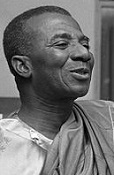
On Apr. 27, 1960 former French colony Togo becomes an independent repub. with wealthy PM (since 1958) Sylvanus Epiphenio Olympio (1902-63) as pres. #1 (until Jan. 13, 1963), going on to negotiate a settlement of the alleged debt the country owes to France for 46 years of colonization; France goes on to create the French Colonial Pact with its former African countries to retain influence (until ?).

On May 14, 1960 the Kenya African Nat. Union (KANU) is founded in Kenya from a coalition of three other parties to support the Kikuyu and Luo tribes, led by Jomo Kenyatta (1897-1978); meanwhile this year the smaller Kenya African Dem. Union (KADU) is formed as its opposition to support the rival Kalenjin, Maasai, Turkana, and Samburu tribes.

On May 31, 1960 the first gen. elections in the Congo give leftist Patrice Emery Lumumba (1925-61) of the Nat. Congolese Party 35 of 137 seats in the nat. assembly; on June 24 he becomes PM and forms a coalition cabinet, while widespread violence causes white Euros and others to flee the country; in his speech celebrating Congo's independence from Belgium, Lumumba accuses Belgian king Baudouin of presiding over a "regime of injustice, suppression, and exploitation", adding "We are no longer your macaques", referring to a Belgian woman who called him a "sale macaque" (filthy monkey) years earlier; meanwhile Lumumba makes overtures to the Soviet Union, stirring things up.

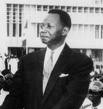

On June 20, 1960 French-speaking cotton-exporting 70% Muslim 35% animist Mali (Bambara "hippopotamus") (formerly French Sudan) (home of the Tuaregs, known for the Sahara Desert in the N, grasslands in the S, and the Niger Valley) becomes independent under the name Sudanese Repub., with capital at Bamako (Bambara "crocodile's back"), and is federated with the French-speaking 95% Sunni Muslim Repub. of Senegal (which also gains its independence on June 20) in the Mali Federation; too bad, on Aug. 20 Senegal secedes from the Mali Federation, with Socialist poet Leopold Sedar (Léopold Sédar) Senghor (1906-2001) as pres. #1 on Sept. 6 (until Dec. 31, 1980), and former PM (since 1957) Mamadou Dia (1910-2009) continuing as PM #1 (until Dec. 18, 1962); on Sept. 22 the Sudanese Repub. changes its name to the Repub. of Mali, with Muslim Socialist PM (since 1959) Modibo Keita (1915-77) becoming pres. #1 (until Nov. 19, 1968), going on to socialize the economy, starting with the creation in Oct. of the govt. monopoly Mali Import-Export Co. (SOMIEX), followed in 1962 by the establishment of the tidings-of-comfort-and-joy-not Malian franc, after which the welfare state hits a brick wall with inflation and shortages, leading to unrest; this doesn't stop him from cultivating good relations with the U.S., meeting with JFK in Sept. 1961 at the same time as Sukarno of Indonesia, and promoting pan-African unity.



On June 24, 1960 Joseph Kasavubu (Kasa-Vubu) (1910-69), leader of the Alliance des Bakongo (ABAKO) Party is elected pres. #1 of the Repub. of Congo (Leopoldville) (which becomes independent of Belgium), taking office on June 26 (until Nov. 24, 1965). On June 30, 1960 the Repub. of the Congo (capital Leopoldville) is granted independence from Belgium, with Patrice Lumumba as PM, and Joseph Kasavubu as pres.; on July 11 after the Congolese army mutinies against the remaining Belgian officers, Belgian-appointed Christian anti-Communist pro-Western Moise Kapenda Tshombe (1919-69) leads a Belgian-backed secession in mineral-rich Katanga Province in SE Congo (W of Lake Tanganyika), which is controlled by the Belgian Union Miniere and produces weapons-grade uranium, raising the stakes and bringing in internat. intrigue; on July 14 the U.N. Security Council votes 8-0-3 (France, U.K., China) for Resolution 143, calling on Belgium to withdraw its troops and deciding to send U.N. troops (supported by Ghana, Guinea and India), led by U.N. secy.-gen. Dag Hammarskjold to Katanga to oversee the withdrawal, starting the Congo Crisis (ends Nov. 25, 1965), featuring an anti-colonial struggle, a secessionist war, a U.N. peacekeeping operation, and a Cold War proxy battle between the dueling superpowers U.S. and Soviet Union, who lust for all that uranium ore and other minerals; on Sept. 5 Lumumba appoints Machiavelli-thumping ("one of my favorite books)" journalist (former soldier, and one big mean dude) Joseph Desire (Joseph-Désiré) Mobutu (1930-97) as army chief of staff, who gets pissed-off at the U.N. forces for not helping him crush the secessionists and turns to the Soviet Union, which sends massive military aid incl. 1K technical advisors, causing the U.S. to kick Repub. of the Congo pres. #1 (1960-5) Joseph Kasavubu (1910-69) in the pants, after which he fires the govt. of Patrice Lumumba and has him placed under house arrest, causing Lumumba to declare Kasavubu deposed and call on Mobutu to arrest him instead; on Sept. 14 after consulting his Machiavelli, Mobutu leads a CIA-backed military coup, placing Lumumba under house arrest for a 2nd time, and keeping Kasavubu as pres., then ordering the Soviets to leave, accusing Lumumba of Commie sympathies to gain U.S. support, causing him to flee to Stanleyville, where he is captured on Dec. 1, sent to Katanga, then tortured and assassinated next Jan. 17, causing the U.N. Security Council next Feb. 21 to vote 9-0-0 (France, Soviet Union) to adopt Resolution 161, urging the withdrawal of Belgian and other foreign military and mercenary troops and launching an investigation into Lumumba's death, causing the Soviet Union to seek unsuccessfully to get the office of secy.-gen. replaced by a 3-man troika; meanwhile on Nov. 14 Belgium threatens to leave the U.N. if it doesn't stop criticizing its Congo policy, after which on Nov. 22 the U.N. supports Kasavubu and Mobutu anyway; next Nov. 24 the U.N. Security Council votes 9-0-0 (France, U.K.) to adopt Resolution 169, opposing secessionist activities in Katanga and asking all U.N. member states to aid the govt. of the Repub. of the Congo. On Dec. 30, 1962 U.N. troops occupy the last rebel positions in Kanga, forcing Moise Tshombe to flee to Southern Rhodesia.
On June 26, 1960 British Somaliland becomes independent from the U.K., and on July 1 is united with Italian Somaliland as the Somali Repub..
On June 26, 1960 the Malagasy Repub. (Madagascar) becomes independent.

On July 1, 1960 cocoa-producing Ghana gains its independence from the U.K., with Marxist Kwame Nkrumah (1909-72) as pres. #1 (until Feb. 24, 1966), who gets Mali to join the Union of African States next Apr. while instituting state socialism, only to run up against a brick wall as the welfare state causes inflation and shortages.
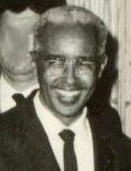
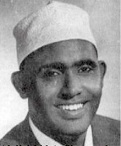
On July 1, 1960 Somalia achieves independence, with Aden Abdullah (Abdulle) "Aden Adde" Osman Daar (1908-2007) as pres. #1 (until June 10, 1967), and Abdi Rashid (Abdirashid) Ali Shermarke (1919-69) as PM #3 (until June 14, 1964), pursuing a neutral non-aligned foreign policy.
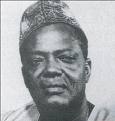
On Aug. 1, 1960 Dahomey in W Africa achieves full independence under pres. #1 Coutoucou Hubert Maga (1916-2000) (until Oct. 22, 1963).

On Aug. 3, 1960 French-speaking Niger (pop. 6.5M, 54% Hausa, 24% Songhai and Djerma, 11% Peul; 90% Islam, 15% animist and Christian) proclaims its independence, and PM (since 1958) Hamani Diori (1916-89) becomes pres. #1 (until Apr. 15, 1974), sinking into nepotism and corruption until he is ousted by a military coup.

On Aug. 5, 1960 Upper Volta (Burkina Faso) declares independence from France, with Maurice Yameogo (Yaméogo) (1921-93) of the Voltaic Dem. Union as pres. #1 (until Jan. 3, 1966), who bans all opposition parties, leading to increasing demonstrations and strikes until the military is forced to intervene and oust him.

On Aug. 7, 1960 Ivory Coast (Cote d'Ivoire) becomes independent from the French Union, with "Papa" Felix Houphouet-Boigny (Houphouët-Boigny) (1905-93) as PM #1 (until Nov. 27), then pres. #1 (until Dec. 7, 1993), enjoying one of the most developed economies in sub-Saharan Africa as the world's largest exporter of cocoa and a leading exporter pineapples, palm oil, and coffee; for the next two decades the Ivorean Miracle sees the GDP grow by 15% a year; too bad, the N is dominated by Muslims, the S by Christians (mostly Roman Catholics), and other areas by non-Muslims (mostly animists) - ivory, fugeddaboutit? He talks to ducks, of course he does?

He talks to ducks, of course he does? On Aug. 8, 1960 Albert Kalonji (1929-2015) proclaims the independence of South Kasai (home of the Baluba) from the Dem. Repub. of Congo, following the example of neighboring Katanga; the capital is at Bakwanga (Mbuji-Mayi); next Apr. 12 he assumes the title of emperor Albert I Kalonji, after which Congolese troops reconquer the region and arrest him on Dec. 30, 1961, then divide the region to discourage another separatist movement; on Sept. 7, 1962 he escapes from prison and sets up a new govt., but is captured again within 1 mo.

On Aug. 11, 1960 no-longer-hanging autonomous French repub. Chad (home of the Bodele Depression, the world's largest dust patch">Francois (N'Garta) Tombalbaye (1918-75), who becomes the first pres. and PM (until Apr. 13, 1975), ruling as a dictator until the military assassinates him.

On Aug. 13, 1960 David Dacko (1930-2003) proclaims the independence of the Central African Repub. (CAR) from France, with capital at Bangui on the Oubangui River in the S, and Aug. 14 he becomes pres. #1 (until Jan. 1, 1966), trying to handle 80+ ethnic groups with 80+ different languages, incl. Baya, Banda, Mandjia, and Sara, and a pop. that is 35% Protestant, 35% Roman Catholic, and 15% Muslim.

On Aug. 15, 1960 the Repub. of the Congo (Congo-Brazzaville) proclaims independence from France, with Roman Catholic priest Abbe Fulbert Youlou ("grape") (1917-72) as pres. #1 (until Aug. 15, 1963), starting out pro-economic liberalism and anti-Communist and degenerating into a 1-party system that imprisons union leaders in Aug. 1963, leading to the Trois Glorieuses Rev. that causes him to resign.

On Aug. 17, 1960 Gabon gains independence from France, with capital at Libreville, and next Feb. 12 PM (since 1957) Gabriel Leon Mba (M'ba) (1902-67) (pr. UM-bah) becomes pres. #1 of Gabon (until Nov. 28, 1967); women are granted the right to vote.


New Law & Order on Shoe Day on N-BBC? On Oct. 1, 1960 (Shoe Day Minus Eleven) Nigeria declares independence from Britain, and is admitted to U.N. membership as a loose federation of self-governing states with 250 ethnic and linguistic groups; on Nov. 16 U.S.-educated Igbo gen. Benjamin Nnamdi (Igbo "My father is alive") "Zik" Azikiwe (1904-96) becomes gov.-gen. #3 of Nigeria (first native) (until Oct. 1, 1963), also becoming the first Nigerian on the Queen's privy council, founding the African liberation philosophy of Zikism, with the five principles of spiritual balance, social regeneration, economic determination, mental emancipation, and political resurgence, uttering the soundbyte "The challenge of Nigeria as a free state in 20th century Africa is the need to revive the stature of man in Africa and restore the dignity of man in the world"; Sir Abubakar Tafawa Balewa (1912-66) (Muslim) (who was knighted in Jan. by Elizabeth II of Britain and awarded an honorary doctorate in May by the U. of Sheffield) becomes PM #1 of Nigeria (until Jan. 15, 1966), going on to lead the protest against the Sharpeville Massacre, enter an alliance with Commonwealth ministers who want South Africa expelled in 1961, and become a founder of the Org. of African Unity (OAU) in 1963.

On Oct. 3, 1960 after blaming high inflation on incumbent (since 1956) Juscelino Kubitschek, Sao Paolo gov. (since 1955) Janio da Silva Quadros (1917-92) is elected pres. #25 of Brazil by a landslide, taking office next Jan. 31 (until Aug. 25, 1961), going on to establish relations with the Soviet Union and Cuba, outlaw gambling, and ban women from wearing bikinis; too bad, his Commie alignment turns off the Nat. Dem. Union, which leaves him powerless, and he doesn't last long.

On Nov. 28, 1960 Mauritania becomes independent from France over the opposition of its N neighbor Morocco (which claims it), and is admitted to the U.N. next year after its admission is voted by the Soviet Union on Dec. 4; Moktar Ould Daddah (1924-2003) becomes PM #1 (until July 10, 1978), ruling a motley crew of Moors, Arabs, Berbers, and African blacks, mainly nomadic, with only 5% living in urban centers.
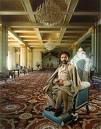
On Dec. 13, 1960 while Ethiopian emperor Haile Selassie I is away visiting Brazil, his imperial bodyguard revolts, proclaiming his son crown prince Asfaw Wossen Taffari as emperor Amha Selassie (1916-97); the revolt is quashed on Dec. 17 after he returns, and daddy absolves his son of guilt, after which he is proclaimed again on Sept. 12, 1974 after his daddy is deposed, ending up in exile, and proclaimed yet again on Apr. 8, 1989.

On Dec. 14, 1960 Patrice Lumumba's deputy Antoine Gizenga (1925-) proclaims himself PM of the Dem. Repub. of Congo in Stanleyville, and his govt. is recognized by 21 countries in Feb., going on to lead his rebel govt. after his assassination until the Congo Crisis ends in Nov. 1965, after which he is exiled until 1992.
On Dec. 14, 1960 U.N. Gen. Assembly Resolution 1514, titled "Declaration on the Granting of Independence to Colonial Countries and Peoples" is adopted 89-0-9 (Australia, Belgium, Dominican Repub., France, Portugal, Spain, South Africa, U.K., U.S.), providing for the granting of independence to colonial countries and peoples.
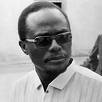
On Feb. 4, 1961 after the Portuguese insist on staying, pissing-off the Communist-led natives, the Portuguese Colonial (Overseas) War (of Liberation) in Angola (ends Apr. 25, 1974) begins with an uprising of Africans in Luanda, led by the Nat. Front for the Liberation of Angola (FNLA), founded on July 14, 1954 as the Union of Peoples of Angola (UPA) by Holden Alvaro (Álvaro) Roberto (1923-2007); on Mar. 13 Adlai E. Stevenson votes against Portuguese policies in Africa in the U.N. Security Council; on Mar. 15 4K-5K Bakongo rebels attack strategic locations in N Angola, killing 1K+ whites and seizing their farms, with Roberto uttering the soundbyte "This time the slaves did not cower"; on Apr. 18 Portugal sends its first military reinforcements to Angola; on Apr. 25 Roberto meets with Pres. Kennedy, causing Ghanaian pres. Kwame Nkrumah to turn him down for aid; on June 9 the U.N. Security Council votes 9-0-2 (France, U.K.) for Resolution 163, affirming U.N. Gen. Assembly Resolution 1603 declaring Angola a non-self-governing territory and calling on Portugal to go along; in Mar. 1962 the UPA merges with the Dem. Party of Angola to form the FNLA, establishing the Rev. Govt. of Angola in Exile (GRAE) in Kinshasa on Mar. 27, with Jonas Savimbi as foreign minister, after which Roberto divorces his wife and marries a woman from the village of the wife of Zairian pres. Mobutu Sese Soko to establish a political alliance; in 1963-9 Israel gives it aid.
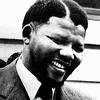


On Apr. 13, 1961 the U.N. Gen. Assembly passes U.N. Resolution 1598, condemning South Africa for apartheid; meanwhile white South African anti-apartheid activist Helen Beatrice May Joseph (nee Fennell) (1905-92), who was arrested for treason in Dec. 1956, banned in 1957 and became the first person to be placed under house arrest is finally acquitted after a 5-year trial, but she stays banned for the next 10 years; meanwhile on May 29-31 Nelson Mandela (1918-2013), leader of the South African Nat. Congress (ANC) (founded 1912) stages a stay-at-home strike, and when that doesn't work, he and Walter Max Ulyate Sisulu (1912-2003) give up on peaceful solutions and set up the Spear of the Nation (MK) militant wing, which issues a public announcement on Dec. 16: "The time comes in the life of any nation when there remains only two choices: submit or fight... We shall not submit and we have no choice but to hit back by all means within our power in defense of our people, our future, and our freedom."
On May 2, 1961 Bechuanaland in SW Africa (NW of Johannesburg), home of the Bantu Tswana tribe and 30K Bushmen in the Kalahari Desert proclaims the 1961 Bechuanaland Constitution, which Britain approves in Dec.


On May 31, 1961 pissed-off apartheid-loving South Africa severs its ties with the British Commonwealth and becomes an independent repub., with last gov.-gen. (since Dec. 11, 1959) Charles Robberts "Blackie" Swart (1894-1982) (who refused to take an oath of allegiance to Elizabeth II in 1959) (definitely not swarthy?) as pres. #1 (until June 1, 1967), and PM (since 1958) Hendrik Frensch Verwoerd (1901-66) (who survived an assassination attempt last year, then runs out of luck in 1966) continuing as PM #1 (until Sept. 6, 1966); Ghana refuses to recognize it.
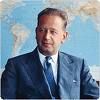
On June 13, 1961 after three years of negotiations, the British govt. proposes a draft constitution for Southern Rhodesia, with a 65-seat parliament and voters divided into A (mostly white) and B (mostly black) rolls; on July 26 a constitutional referendum in Southern Rhodesia approves a new constitution by 66%-34%. On Sept. 17-18, 1961 U.N. secy.-gen. Dag Hammarskjold (b. 1905) is killed in a plane crash in Northern Rhodesia on the way to negotiate a ceasefire in the Congo; meanwhile JFK, who has been working with him to create an independent Congo rejects proposals for direct military intervention, preferring to support the U.N. peacekeepers, pissing-off the multinat. corps. who seek to carve the Congo up for themselves, causing JFK to get into a war with the CIA, who has been arming the secessionists in order to promote Belgian mining interests. On Oct. 31, 1962 the U.N. Gen. Assembly asks Britain to suspend enforcement of the new racist 1961 Southern Rhodesian Constitution, but they waffle and it goes into effect on Nov. 1, after which on Nov. 6 the U.N. Gen. Assembly calls for sanctions to be imposed on pesky South Africa and its racist apartheid policies, calling on member states to discontinue economic and military relations with them. On Apr. 12, 1963 the British govt. rejects a demand by the all-white govt. of Southern Rhodesia for early independence.

On Aug. 21, 1961 Pan-Africanist Mzee Jomo Kenyatta (1897-1978) is released from prison in Kenya, going on to found the Kenyan nation as PM (1963-4) and pres. #1 (1964-78).
On Sept. 1, 1961 the Eritrean War of Independence begins (ends May 29, 1991) after Ethiopian emperor Haile Selassie dissolves the 1952 U.N.-mediated federation.

On Oct. 11, 1961 gap-bridging (married to a Hutu) Tutsi prince Louis Rwagasore (1932-61) (son of Mwambutsa IV) is elected PM of Burundi; too bad, on Oct. 13 he is assassinated at the Hotel Tanganyika by Greek national Georges Kageorgis, allegedly in the pay of the pro-Belgian Christian Dem. Party (PDC).
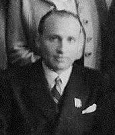
On Oct. 17, 1961 the Paris Massacre of 1961 sees Paris police under command of Maurice Papon (1910-2007) attack 30K Algerians protesting an Algerian-only curfew, beating and killing dozens, throwing dozens of bodies into the Seine River, then trying a coverup by claiming only three killed, although the other side claims up to 240; in 1998 the French govt. acknowledges only 40 - another sodamn insane (inseine) joke is waiting to be born here?

On Dec. 9, 1961 Tanganyika becomes independent of Britain, with former teacher Julius Kambarage Nyerere (1922-99) as PM #1, followed on Oct. 29, 1964 by pres. #1 (until Nov. 5, 1985); Nyerere goes on to pub. a Swahili trans. of Shakespeare's "Julius Caesar" in 1966 and "The Merchant of Venice" in 1969, which are widely read in E Africa; he later helps bring hip-hop to Tanzania.
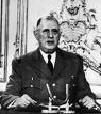







On Jan. 24, 1962 the far-right French OAS bombs the French foreign ministry to protest Algerian independence. On Feb. 5 amid public outrage at the use of torture by French troops against Algerians, French pres. Charles de Gaulle calls for Algeria's independence, and on Mar. 8-12 France negotiates with the Algerian FLN in Geneva, Switzerland. On Mar. 18 France and Algeria sign the Evian (Évian) Agreement (Accords) in Evian-les-Bains, France, ending the 7-year Algerian War, with France agreeing to pull out of Algeria, ending 132 years of French rule; on Mar. 19 an armistice in Algeria begins, ending the Algerian War of Independence (begun Nov. 1, 1954), although the OAS continues terrorist attacks against traitor Algerians, exploding a bomb on May 2, killing 110 and injuring 147 total; on Apr. 8 a nat. referendum in France approves the accords by 90%-15%; on May 20 the French begin an airlift to evacuate Europeans from Algiers; on May 29 negotiations between the OAS and FLN cause a real armistice in Algeria, which is signed on June 17; too bad, on June 18 the OAS announces that it will continue to fight; on June 30 the last French Foreign Legion troops leave Algeria; on July 1 Charles de Gaulle recognizes Algerian independence, and on July 3 the U.S. recognizes it; on July 31 Algeria declares independence; war losses since 1954 total 30K French and 1.5M Algerians; 1M Europeans are repatriated; on Sept. 15, 1963 FLN founder (1954) Mohamed Ahmed Ben Bella (1916-2012) (released from priz soon after the truce is signed, after which he uses Communist tactics to eliminate all opposition) becomes pres. #1 Algerian Socialist Repub. (until June 19, 1965), and is recognized by the U.S. on Sept. 29 even though he openly courts Commie support, and 76 FLN vets are sent to Cuba to train terrorists; longtime Algerian nationalist leader Ahmed Messali Hadj (1898-1974) tries to create a party in opposition to the FLN, and ends up in exile in Paris for life; meanwhile on Mar. 23 de Gaulle orders the French army to stage an all-out war against the French right-wing anti-independence OAS and its four leader generals, causing the arrest of gen. Edmond Jouhaud (1905-95) in Oran on Mar. 24, followed on Apr. 20 by gen. Raoul Albin Louis Salan (1899-1984) in Algiers; on Apr. 13 Jouhaud is sentenced by a military tribunal in Paris to death, followed on May 23 by Salan, who gets it reduced to life in priz, and released in 1968; politician Pierre Lagaillard (1931-), who was arrested in Madrid last Oct. is exiled to the Canary Islands, then pardoned in 1968; Jean-Jacques Susini (1933-) hides out in Italy while attempting to assassinate Charles de Gaulle, getting twice condemned to death in absentia, then returns to France after the 1968 amnesty; in June WWII Resistance leader and PM (1949-50) Gen. Georges-Augustin Bidault (1899-1983) (who claims not to belong to the OAS) is accused of conspiracy against the state and stripped of parliamentary immunity, fleeing to Brazil, followed in 1967 by Belgium, then returning to France in 1968 after an amnesty; it takes until 1999 for France to officially call the "operation to maintain order" a "war"; in 1963 the Soviets send experts to Algeria to rid it of hundreds of thousands of French land mines.
In Jan. 1962 after the South African govt. declares the African Nat. Congress (ANC) illegal, leader Nelson Mandela flees South Africa for the first time after being accused of organizing illegal demonstrations, and ends up in London via Addis Ababa and Tanzania, then undergoes military training in Algeria before returning through E Africa and getting arrested on Aug. 2 in Howick en route from Durban to Johannesburg and convicted of incitement to rebellion and sentenced to five years of hard labor, with his wife Winnie becoming a spokeswoman for the ANC, getting her banned and restricted; Mandela ends up behind bars for 27 years; undercover CIA agent Donald c. Rickard tipped off the South African govt. to arrest Mandela, claiming he is a dangerous Soviet agent, "the world's most dangerous Communist outside of the Soviet Union", and is planning an uprising as a prelude to a Soviet invasion, which would lead to a U.S.-Soviet conflict.


On July 1, 1962 the 62% Roman Catholic, 15% Muslim, 5% Protestant and 23% pagan U.N. trust territory of Ruanda-Burundi in EC Africa, known for the super-tall cattle-owning aristocratic (Hamitic) Tutsi (Watutsi) (Batutsi) (14%), the normal size agricultural Hutu (Bantu) (85%) (really same ethnic group with economic-based distinctions, exacerbated in 1933 by a Belgian reqt. for ID cards, along with Hutu Roman Catholicism?), and the Pygmy Twa (1%) is divided into the independent nations of 10K sq. mi. Rwanda (capital Kigali) and 11K sq. mi. Burundi (capital Bujumbura on the N shore of Lake Tanganyika); after leading the Parti du Mouvement de l'Emancipation Hutu (PARMETHUTU) against the aristocratic Tutsi, Roman Catholic ethnic Hutu Gregoire Kayibanda (1924-76) becomes pres. of Rwanda (until July 5, 1973); Burundi becomes a kingdom under Tutsi mwami (king) (since Dec. 16, 1915) Mwambutsa IV Bangiriceng (1912-70) (until July 8, 1966); too bad, next year Rwandan Tutsis begin a war against Burundi (until 1967).

In Sept. 1962 Mozambique-born Syracuse U. sociology prof. Eduardo Chivambo Mondlane (1920-69) founds Frente de Libertacao de Mozambique (Mozambique Liberation Front) (FRELIMO) to fight against Portuguese colonial rule, launching the Mozambique War of Independence (ends June 1975); by 1964 it is gathering steam, and by 1966 they control most of the rural N; too bad, he is killed by a book bomb on Feb. 3, 1969 in Dar es Salaam, Tanzania.


On Oct. 9, 1962 Uganda becomes independent within the British Commonwealth, proclaiming the 1962 Ugandan Constitution; the capital moves from Entebbe to Kampala in Buganda (S Uganda); next Apr. 30 Apolo Milton Obote (1925-2005) becomes PM #1 (until Apr. 15, 1966), followed by pres. #2 (Apr. 15, 1966-Jan. 25, 1971); meanwhile next year the position of gov.-gen. is replaced by a ceremonial presidency, which is filled by Bugandan king Mutesa II (1924-69) (until 1966); too bad, Buganda tries to remain a semi-autonomous kingdom, eventually causing a split. On May 24, 1963 Ugandan PM Milton Obote disses the racial scene in Ala., and calls for an end to white rule in Africa, by force if necessary.
On Oct. 31, 1962 the U.N. Gen. Assembly asks Britain to suspend enforcement of the new racist 1961 Southern Rhodesian Constitution, but they waffle and it goes into effect on Nov. 1, after which on Nov. 6 U.N. Gen. Assembly Resolution 1761 calls for sanctions to be imposed on pesky South Africa and its racist apartheid policies, calling on member states to discontinue economic and military relations with them.
In 1962 the African member countries of the French Community (formed 1958) sign bilateral agreements with France.

On Jan. 13, 1963 three days after the country begins printing its own currency to replace the West African CFA franc, the 1963 Togolese Military Coup sees Togo's first pres. (since Apr. 27, 1960) Sylvanus Olympio (b. 1902) killed by Lt. Col. Etienne Eyadema (1935-2005, becoming post-colonial Africa's first military coup; a 9-member committee takes control of the govt., led by Emmanuel Bodjolle (Bodjollé), which installs former PM of French Togoland (1956-8) Nicolas Grunitzky (1913-69) (Polish-German father and Togolese mother) as pres. #2 (until Jan. 13, 1967) - I'll have some nickled grunitzky to go?
On May 25, 1963 after 31 African leaders meet to work for African unity in Addis Ababa, Ethiopia, they found the Org. of African Unity (OAU); it holds its 2nd meeting on July 22, 1964, and is disbanded on July 9, 2002 in favor of the African Union (AU).
On July 1, 1963 sultan (since Oct. 9, 1960) Abdullah bin Khalifa al-Said (b. 1910) dies, and his son Jamshid bin Abdullah Al Said (1929-) becomes sultan #11 (last) of zany Zanzibar (a sultanate since 1806) (until Jan. 12,k 1964), which on Dec. 19 becomes independent from Britain as a constitutional monarchy, causing the last British troops to pull out; too bad, this allows the leftists a free hand in plotting a takeover, and the new British Commonwealth member lasts 33 days.
On July 11, 1963 at the Liliesleaf Farm in Rivonia near Johannesburg 19 ANC leaders are arrested, incl. Nelson Mandela, who lived there since Oct. 1961 masquerading as gardener-cook David Motsamayi ("the walker"), after which on Nov. 26 the Rivonia Trial of 10 ANC leaders for 221 acts of sabotage to "ferment violent revolution" begins (ends June 12, 1964).

On Aug. 15, 1963 a military coup overthrows Fulbert Youlou, and he is succeeded by Alphonse Massamba-Debat (Massamba-Débat) (1921-77) as pres. #2 of the Repub. of the Congo (Brazzaville) (until Sept. 4, 1968), who rules a 1-party state; too bad, he goes Marxist, causing Red China, the Soviet Union, and Cuba to come knocking seeking influence, while France retains its role as trade partner with private enterprise continuing.

On Dec. 12, 1963 Kenya becomes independent from Britain; Mzee ("Elder") Jomo Kenyatta (1897-1978) (who won the country's first gen. election on May 27) becomes pres.-PM #1 of Kenya (until Aug. 22, 1978), assuring whites that his govt. won't retaliate for years of oppression, and they should stay - and get married and have kids who can grow up to be president of the U.S.?


In 1963 after Charles de Gaulle objects, Britain's application for entry into the Common Market is rejected. Moshoeshoe II (1938-96) is crowned king of Lesotho - what shoe size does he wear? Swaziland becomes a British protectorate; Transkei is given an internal self-govt. by South Africa; paramount chief Kaiser (Kaizer) Daliwonga ("maker of majesty") Matanzima (Mathanzima) (1915-2003) is elected as chief minister; his uncle Nelson Mandela condemns him for his de facto support of apartheid. In 1963 French residents of Morocco become liable for French taxes. In 1963 South Africa conducts joint nuclear tests with Israel, although Israel doesn't confirm it. In 1963 a Marxist coup takes place in the People's Repub. of the Congo (Brazzaville), causing China and the Soviet Union to come knocking seeking influence, while France retains its role as trade partner with private enterprise continuing.



On Jan. 12, 1964 (night) the Zanzibar 9-Hour Rev. in newly independent (since Dec. 19) Zanzibar sees 300 African Socialist rebels (mainly porters and stevedores in Zanzibar Harbor), led by Uganda-born Christian religious fanatic John Gideon Okello (1937-71) stage a bloody revolt against the predominately Arab govt. of sultan (since last July 1) Jamshid bin Abdullah, taking the capital Stone Town, causing him to flee to Britain, ending the sultancy (founded 1806); Okello tells his men to kill all Arabs between 18-25 years of age, but to spare pregnant and elderly women, and not to rape virgins, then on Jan. 18-20 they massacre 5K-20K Arabs; meanwhile a U.S. destroyer evacuates 61 U.S. citizens; although the U.S. and Britain recognize the new govt. on Feb. 23, a 3-mo. power struggle ousts new "field marshal" Okello and his leftists from the country by Mar. 11, and in Apr. Sheikh Abeid Amani Karume (1905-72) becomes pres. #1 of Zanzibar (until Apr. 7, 1972); in Apr. pres. Julius Nyerere of Tanganyika suggests that the two countries merge to stop a Communist takeover by Abdulrahman Mohammad Babu (1924-96) of Zanzibar (who soon flees to London), after which on Apr. 22 the new mainland-island repub. of Tanzania is born from the islands of Zanzibar, Unguja, and Pemba plus Tanganyika; Karume goes on to massacre Arabs in Zanzibar, killing or exiling 25K of 50K by mid-1965, and redistributing their clove plantations and businesses to blacks; the sultan is finally pardoned on Jan. 12, 2000 - do you know me, not as well as you like?

On Jan. 22, 1964 Kenneth David Kaunda (1924-) (known as KK) of the United Nat. Independence Party (UNIP) becomes the first pres. of copper-producing Northern Rhodesia (until 1991), which on Oct. 24 becomes the independent nation of Zambia, part of the British Commonwealth of Nations; the country has less than 100 univ. graduates.


In Jan. 1964 the former British protectorate of Nyasaland (known for matrilineal descent) is dissolved from the Federation of Rhodesia, and on July 6 it becomes independent as Malawi; too bad, lawyers dVera Chirwa (1938-) and her hubby Orton Chirwa (-1992), who help Malawi gain independence are soon forced into exile by Dr. Hastings Walter Kamuzu Banda (1896-1997) (known for wearing English-style 3-piece suits with matching handkerchiefs and fly whisk), who stages a coup and establishes a dictatorship (until May 24, 1994), imprisoning opponents and ruling with an iron hand, stinking himself up by establishing full diplomatic relations with South Africa.

On Feb. 26, 1964 Moroccan king (since 1957) Mohammed V (b. 1909) dies, and his French-educated 2nd son Hassan II (1929-1999) becomes king of Morocco (until July 23, 1999), turning it into a modern pro-Western state at the expense of human rights abuses and corruption, known as the Years of Lead.


On Apr. 13, 1964 the pro-white Rhodesian Front Party of Ian Douglas Smith (1919-) is elected to power in Southern Rhodesia, and he becomes PM of Southern Rhodesia (until Nov. 11, 1965, then PM of Rhodesia until June 1, 1979). On Nov. 11, 1965 the 5% white minority Repub. of Rhodesia does a United States of America and formally declares its independence from Britain via the Unilateral Declaration of Independence (UDI), with Ian Douglas Smith as PM #1 (until June 1, 1979); on Nov. 12 the U.N. Security Council votes 10-0-1 (France) to adopt Resolution 216, condemning the UDI as "made by a racist minority" and calling on all member states to refuse to recognize or render assistance to it; Britain, which insists on the No Independence Before Majority Rule (NIBMAR) refuses to recognize it, and on Nov. 20 the U.N. Security Council votes 10-1-1 (France) to adopt Resolution 217, calling for a boycott along with the use of force by the U.K., which Zambia (former Northern Rhodesia) supports, causing Rhodesia to deprive it of their trade route through their territory. On Dec. 18, 1965 nine states break off diplomatic relations with Britain for not using force against Rhodesia. On Dec. 28, 1965 the U.S. bans oil sales to Rhodesia. On Jan. 10, 1966 a meeting of Commonwealth heads of govt. in Lagos, Nigeria on pesky Rhodesia condemns its "political system based on racial discrimination" as "an outrageous violation of the fundamental principles of human rights" that is of "wider concern to Africa, the Commonwealth and the world", after which a committee is set up to monitor it. On Jan. 31, 1966 Britain ceases all trade with Rhodesia. On Mar. 18, 1966 the U.S. Dept. of Commerce orders economic sanctions against Rhodesia, prohibiting exports of useful items. On Apr. 7, 1966 after the British Beira Patrol muffs its interception of Greek oil tanker Joanna V headed for Beira, Rhodesia, Britain asks the U.N. Security Council for authority to use force against oil tankers violating their embargo against Rhodesia; on Apr. 9 they vote 10-0-5 (Bulgaria, France, Mali, Uruguay, U.S.S.R.) to adopt Resolution 221 aimed at blocking it, calling on U.K. to use force if necessary, but limiting the blockade to Beira and only by the Royal Navy, allowing other toil tankers with oil for Rhodesia to dock at other Mozambican ports; on May 12 the African members of the council call for the British army to blockade all of Rhodesia. On Apr. 27, 1966 the ZANU Rebellion (Second Chimurenga) (ends 1980) begins in white-run Rhodesia as the Zimbabwe African Nat. Liberation Army (ZANLA) (formed in 1965), led by Herbert Wiltshire Pfumaindini Chitepo (1923-75) battles Rhodesian forces, who kill seven ZANLA men. On July 12, 1966 Zambia threatens to leave the British Commonwealth over its peace overtures to Rhodesia, causing Rhodesia to cut off its trade route, after which the U.S., Britain, and Canada organize an airlift to ship gasoline into Zambia; next year Britain agrees to finance new trade routes for Zambia. In Sept. 1966 a 2nd meeting of Commonwealth heads on Rhodesia (first in Jan.) is held, issuing a communique supporting Britain's objections to using force, which Tanzanian pres. Julius Nyerere refuses to sign. On Nov. 5, 1966 38 African states demand that Britain use force against Rhodesia. On Dec. 2, 1966 British PM Harold Wilson negotiates with Rhodesian PM Ian Smith on the HMS Tiger in the Mediterranean, agreeing to black majority rule within 15 years; too bad, the British govt. rejects the agreement on Dec. 5,, and appeals on Dec. 6 for U.N. sanctions. On Dec. 16, 1966 the U.N. Security Council approves an oil embargo against Rhodesia, and adopts the Internat. Covenant on Economic, Social and Cultural Rights and the Internat. Covenant on Civil and Political Rights; on Dec. 17 South Africa refuses to participate, causing British PM Harold Wilson on Dec. 20 to withdraw all his offers to Rhodesia and announce that he will only agree to independence after a black majority govt. is founded; Portugal also refuses to participate. On Feb. 27-Mar. 4, 1967 the Org. of African Unity (OAU) meets, urging the use of force to end South Africa's mandate over South-West Africa (Namibia) and topple the Ian Smith regime in Rhodesia.

On Apr. 20, 1964 Nelson Mandela delivers his I Am Prepared to Die speech at the opening of the Rivonia Trial (begun Nov. 26, 1963); on June 12 Mandela and seven others are convicted and given life in priz, then sent to Robben Island Prison (until Apr. 1982) to get them out of the way; Nelson Mandela is imprisoned on Robben Island until Feb. 11, 1990 (27 years); fellow ANC leader Govan Archibald Mvuyelwa Mbeki (1910-2001) is imprisoned on Robben Island until Nov. 5, 1987 (24 years).
On July 4, 1964 after more than a century of oppression by whites, the Rhodesian Bush War begins (ends Dec. 12, 1979), with the Zimbabwe African Nat. Liberation Army of Robert Mugabe's Zimbabwe African Nat. Union, and the Zimbabwe People's Revolutionary Army of Joshua Nkomo's Zimbabwe African People's Union trying to overthrow the white-run govt. of Ian Smith.


On Aug. 5, 1964 the Congolese Simba (Swahili "lion") rebel army led by Christophe Gbenye (1927-2015) and Pierre Mulele (1929-68) captures Stanleyville, and on Oct. 27 takes 1K Western hostages, incl. 60 Americans and 800 Belgians; on Nov. 24 Belgian paratroops retake it, but several hostages die in the fighting incl. famed medical missionary Paul Carlson (b. 1928).
On Dec. 6, 1964 race riots between Africans and Arabs erupt in Khartoum, Sudan, killing 10 and injuring 400 incl. several Americans.
In 1964 the Hutu of Rwanda begin massacring Tutsi, causing many to flee to the neighboring kingdom of Burundi; the Tutsi are supported by the Chinese Communists even though they have a feudal society.


On June 19, 1965 Algerian civilian pres. (since 1963) Ahmed ben Bella is deposed in a bloodless military coup and put under house arrest, and Col. Houari Boumedienne (Boumédienne) (1932-78) becomes pres. of Algeria, suspending the constitution and seeking to restore financial stability; Ahmed is put under house arrest until 1980, after which he is given asylum in Switzerland, then allowed to return in 1990; Boumedienne's right hand man is Abdelaziz Bouteflika (1937-).

On Jan. 1, 1966 a bloodless coup in the Central African Repub. (CAR) sees gourmet cannibal defense minister Col. Jean-Bedel (Jean-Bédel) Bokassa (1921-96) overthrow his cousin David Dacko with French backing after they get pissed at Dacko's wacko ties with Red China, abolishing the 1959 constitution and setting up a dictatorship (until Sept. 20, 1979).

On Jan. 3, 1966 after a nationwide syndicalist strike, pres. (since 1960) Maurice Yameogo of Upper Volta is deposed by a military coup led by Maj. Gen. Aboubakar Sangoule (Sangoulé) Lamizana (1916-2005), who dissolves the nat. assembly and suspends the constitution, becoming pres. #2 of Upper Volta (until Nov. 25, 1980); a new constitution is adopted later in the year, and a new nat. assembly elected.
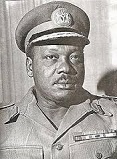



On Jan. 15-16, 1966 a violent military coup in Nigeria establishes a military dictatorship under maj.-gen. Johnson Thomas Umunnakwe Aguiyi-Ironsi (1924-66), an Ibo from the E; on Jan. 15 PM (since 1959) Sir Abubakar Tafawa Balewa (b. 1912) is killed in the coup; on July 23 Katangese troops begin a revolt in Stanleyville in support of exiled minister Moise Tshombe, lasting several weeks; on July 29 Aquiyi-Ironsi is overthrown and executed, and on Aug. 1 Lt. Col. Yakubu Dan-Yumma "Jack" Gowon (1934-) from the Christian N (a lucky neutral who is neither a Muslim, Hausa or Fulani) becomes pres. #3 of Nigeria (until July 29, 1975). On May 29, 1966 the 1966 Anti-Igbo Pogrom in N Nigeria by Muslim Hausas begins, killing 3.1 Christian Igbos of S Nigerian origin in E Nigeria by Jan. 12, 1970, many of whom had been driven from the N. On May 30, 1967 after refusing to return to the Muslim N, the Christian Igbos (Ibos) in E Nigeria, led by Lt. Col. (later gen.) Chukwuemeka Odumegwu Ojukwu (1933-2011) proclaim their independence from the Nigerian Federation (founded 1954) as the Repub. of Biafra, with Ojukwu as pres. #1 (until Jan. 8, 1970), taking the oil-rich Niger River Delta region and pissing-off the Nigerian govt. in Lagos (composed of Muslim Hansa-Fulanis and Yorubas), which gets support from all the other African states and buys arms from Britain, while the Ibos buy arms from France; in July fighting breaks as Nigeria attempts to reclaim it, taking the Biafran capital of Enugu on Oct. 4, while starving Biafrans training with wooden sticks for rifles take them on; meanwhile Nigerian "Things Fall Apart" novelist Albert Chinualumogu "Chinua" Achebe (1930-2013) becomes the Biafran ambassador, appealing for U.S. and Euro aid in vain as Muslims start a jihad against Christians and the Chrisian world does nothing.


On Feb. 22, 1966 after being implicated in a plot to smuggle ivory and gold from the Dem. Repub. of Congo in exchange for arms, and then pocket $350K, Ugandan PM (since 1962) Milton Obote stages a coup, and declares himself pres. of Uganda on Apr. 15 (until Jan. 25, 1971), proclaiming a new 1966 Ugandan Constitution and deposing pres. Mutesa II on Mar. 2, after which the Bugandan parliament declares independence, causing him to send his protege, illiterate 6'4" British-trained gourmet cannibal and light heavyweight boxing champ (1951-60) Idi Amin Dada (1925-2003) to invade the palace on May 24 and capture Mutesa II, then exile him to Britain, declaring all Ugandan kingdoms abolished; Mutesa II settles in London, where his son Ronald Frederick Muwenda Mutebi II (1955-) is enrolled in boarding school, and spends the rest of his life in grumbling alcoholic exile, while his son finally returns in 1986; meanwhile Obote promotes Idi Amin from Maj. to col., and makes him military CIC, only to get overthrown by him on Jan. 25, 1971 after he is about to arrest him for misappropriation of funds, made possible by his massive recruitement of soldiers from the West Nile region bordering Sudan - got everything you need, chicken breasts, onions, garlic?

On July 6, 1966 Dr. Hastings Walter Kamuzu Banda (1896-1997) declares the 1-party Repub. of Malawi and rules with an iron hand for the next three decades (until 1994), with a pro-West foreign policy and economic cooperation with South Africa and Rhodesia, while instituting a personality cult and taking the title Ngwazi ("great lion"), complete with lion tail fly whisk; in 1971 he makes himself pres. for life and becomes the first African leader to visit South Africa; although life is regimented, he does build up the infrastructure, incl. schools modelled on Eton with British teachers, who teach African children ancient Latin and Greek along with African history.

On July 8, 1966 former army officer (Tutsi) Michel Micombero (1940-83) overthrows mwami (king) (Hutu) Ntare V (1947-72) right after he deposes his father Mwambutsa IV, and declares Burundi a repub. with himself as pres. #1 on Nov. 28 (until Nov. 1, 1976), suspending the constitution and legislature and ruling with an iron hand - I want my mwami?
On July 12, 1966 Zambia threatens to leave the British Commonwealth over its peace overtures to Rhodesia, causing Rhodesia to cut off its trade route, after which the U.S., Britain, and Canada organize an airlift to ship gasoline into Zambia; next year Britain agrees to finance new trade routes for Zambia.

On Sept. 30, 1966 the self-governing British protectorate of Bechuanaland becomes the independent (within the British Commonwealth) Repub. of Botswana, with capital at Gaborone 70 mi. NW of Pretoria-Johannesburg; Sir Seretse ("the clay that binds together") Khama (1921-80) (knighted this year by Elizabeth II), son of Bamanagwato paramount chief Sekgoma Khama II becomes pres. #1 (until July 13, 1980), starting out as one of the world's poorest countries deeply in hock to the British, the discovery of diamond fields next year causes their economy to become the fastest-growing in the world until 1980, with Khama refraining from corruption and wisely investing the money in infrastructure, while allowing black militants to use Botswana as a base for raids on Rhodesia and later acting as the broker of the end of the Rhodesian civil war.
In Sept. 1966 a 2nd meeting of Commonwealth heads on Rhodesia (first in Jan.) is held, issuing a communique supporting Britain's objections to using force, which Tanzanian pres. Julius Nyerere refuses to sign.
On Oct. 17, 1966 Lesotho and Botswana are admitted to the U.N.
On Oct. 27, 1966 the U.N. takes Namibia away from South Africa; meanwhile a 23-year brush war begins in Namibia, with the Marxist South West Africa People's Org. (SWAPO) black rebel guerrilla movement (founded 1957 in Cape Town) demanding independence from white South Africa (ends 1988).
In 1966 the Akosombo Dam (begun 1961) on the Volta River in Ghana is built, creating Lake Volta next year.

On Jan. 13, 1967 Lt. Col. Etienne (Étienne) Eyadema (Eyadéma) (1935-2005) ousts Nicolas Grunitzky in a bloodless military coup in Togo, and a Nat. Reconciliation Committee is set up to rule the country, but on Apr. 14 Eyadema dissolves it and becomes pres. #3, setting up the Rally of the Togolese Party in 1969-2012, going on to Africanize his name to Gnassingbe (Gnassingbé) and stay in power until his Feb. 5, 2005 death after weathering seven attempts on his life.

On Mar. 13, 1967 PM Albert Margai loses the election in Sierra Leone to All People's Congress leader (since 1962) Siaka Probyn Stevens (1905-88), leader of the All-People's Congress, but a military coup prevents him from taking power within minutes. On Apr. 18, 1968 a counter-coup restores civilian rule in Sierra Leone under Siaka Stevens, who is sworn-in as PM #3 on Apr. 26 (until Apr. 21, 1971).


On May 30, 1967 after refusing to return to the Muslim N, the Christian Igbos (Ibos) in E Nigeria, led by Lt. Col. (later gen.) Chukwuemeka Odumegwu Ojukwu (1933-2011) proclaim their independence from the Nigerian Federation (founded 1954) as the Repub. of Biafra, with Ojukwu as pres. #1 (until Jan. 8, 1970), taking the oil-rich Niger River Delta region and pissing-off the Nigerian govt. in Lagos (composed of Muslim Hansa-Fulanis and Yorubas), which gets support from all the other African states and buys arms from Britain, while the Ibos buy arms from France; in July fighting breaks as Nigeria attempts to reclaim it, taking the Biafran capital of Enugu on Oct. 4, while starving Biafrans training with wooden sticks for rifles take them on; meanwhile Nigerian "Things Fall Apart" novelist Albert Chinualumogu "Chinua" Achebe (1930-2013) becomes the Biafran ambassador, appealing for U.S. and Euro aid in vain as Muslims start a jihad against Christians and the Christian world does nothing.

On June 10, 1967 Somalian PM #3 (since July 12, 1960) Abdi Rashid (Abdirashid) Ali Shermarke (1919-69) becomes pres. #2 of Somalia (until Oct. 15, 1969).

On Nov. 28, 1967 after winning 99.9% of the vote on Mar. 19 (no opposition candidate is brave enough), pres. (since 1961) Leon Mba (b. 1902) dies of cancer in Paris, and on Nov. 29 his 4'11" vice-pres. (since 1966) Omar (Albert-Bernard) Bongo Ondimba (1935-2009) becomes pres. #2 of Gabon (until June 8, 2009), going on to stay in power a long time and become the world's long-serving ruler (excluding monarchies) after Fidel Castro steps down in Feb. 2008 - I love working with people, especially the little ones?
By 1968 the African continent, which was completely white-controlled a decade ago, is controlled S of the Sahara by black regimes in every country except Angola, Equatorial Guinea, Mozambique, Rhodesia, South Africa, and South-West Africa (Namibia); in another six years only Rhodesia, South Africa, and South-West Africa will be controlled by whites - I'm just a hunka hunka burnin' love?
In 1968 the Sahel Drought (ends 1973) begins in the 2.6K-mi. West African Sahel strip S of the Sahara Desert in Africa, killing cattle and causing famine, causing the U.N. Sahelian Office (UNSO) to be created in 1973.
 On Mar. 12, 1968 the British colony of Mauritius
in the Indian Ocean 1200 mi. off the SE coast of Africa becomes an independent nation in the British Commonwealth
after 158 years of British colonial rule (since 1810), with Gandhi-admirer ("Father of Mauritius") Sir
Seewoosagur Ramgoolam (1900-85)
of the Labor Party as PM (until June 16, 1982); the
Flag of Mauritius
is four horizontal stripes, red for the blood shed in the struggle for independence, blue for the Indian Ocean,
yellow for the light of independence, and green for the island's lush vegetation; the celebrations are marred
by rioting, and after the economy see-saws in the 1970s many emigrate to Britain, Canada and Australia.
On Mar. 12, 1968 the British colony of Mauritius
in the Indian Ocean 1200 mi. off the SE coast of Africa becomes an independent nation in the British Commonwealth
after 158 years of British colonial rule (since 1810), with Gandhi-admirer ("Father of Mauritius") Sir
Seewoosagur Ramgoolam (1900-85)
of the Labor Party as PM (until June 16, 1982); the
Flag of Mauritius
is four horizontal stripes, red for the blood shed in the struggle for independence, blue for the Indian Ocean,
yellow for the light of independence, and green for the island's lush vegetation; the celebrations are marred
by rioting, and after the economy see-saws in the 1970s many emigrate to Britain, Canada and Australia.
On May 29, 1968 the U.N. Security Council blockades Rhodesia, requesting member nations to end trade and travel relations.
On June 17, 1968 the U.K. enacts sanctions against Rhodesia, and again on July 18.

On July 17, 1968 after indecisive results in the Apr. elections, the Military Rev. Committee selects foreign minister (physician) Emile Derlin Henri Zinsou (1918-2016) as pres. of Dahomey (until Dec. 10 1969), going on to improve the tax collection system and institute anti-smuggling policies and countermeasures against strikes; too bad, he pisses-off the military by his anti-militarist stance and independence, causing them to plot a coup.
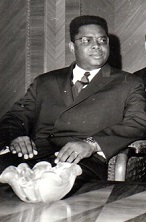

On Sept. 4, 1968 an army coup in Brazzaville, Congo deposes pres. Alphonse Massamba-Debat, and on Sept. 5 replaces him with his PM Alfred Raoul (1930-99), after which next Jan. 1 Maj. Marien Ngouabi (N'Gouabi) (1938-77) becomes pres. #3 of the Repub. of Congo (Brazzaville) (until Mar. 18, 1977), promising elections later in the year, then on Dec. 31 junks that idea and changes the name to People's Repub. of Congo, becoming the first African Marxist-Leninist state, with his Congolese Workers Party (PCT) as the only party.

On Sept. 6, 1968 Swaziland (pop. 700K) becomes the last British territory to gain its independence, becoming a constitutional monarchy after 66 years of British rule (since 1902), with king (since Dec. 10, 1899) Sobhuza II (1899-1982) continuing as king under an English-style 1968 Swaziland Constitution, becoming the longest reigning monarch in known history.

On Sept. 29, 1968 Simba Maoist rebel army leader Pierre Mulele (b. 1929) voluntarily returns from exile to Kinshasa, Congo, where he is pubicly tortured and executed on Oct. 3 or 9, complete with his eyes, genitals, and limbs pulled off while still alive.

On Oct. 12, 1968 Equatorial (formerly Spanish) Guinea on the W coast of Africa (ruled by Spain since 1778) becomes independent, with Francisco Macias (Masie Nguema Biyogo Negue Ndong) (1924-79) as pres. (until 1979), becoming the first Spanish-speaking sovereign country in Africa; too bad, he becomes a cruel dictator, killing tens of thousands (15% of the 300K pop.), causing 55% of the rest to flee, and allying with the Soviets while living high on the hog in a ruined economy, styling himself "Unique Miracle" and "Grandmaster of Education, Science, and Culture", loading the govt. with his relatives and clan members, and banning the word "intellectual" along with boats and fishing.

On Feb. 3, 1969 anti-Portuguese Mozambique Liberation Front leader (since Sept. 1962) Eduardo Chivambo Mondlane (b. 1920) is assassinated in Dar es Salaam, Tanzania by a book bomb, and Marxist Samora Moises Machel (1933-86) succeeds as head of FRELIMO, veering it more to the left.

On May 25, 1969 a military coup in Sudan deposes PM Mohammed Ahmed Mahgoub and pres. Ismail al-Azhari (b. 1900), who dies on Aug. 26; in Oct. Col. Jaafar (Gaafar) Muhammad (Mohammed) Nimeiry (an-Nimeiri) (1930-2009), a 1966 grad of the U.S. Army Command College in Ft. Leavenworth, Kan. becomes PM (until 1971), and designates Babiker Awadalla (1917-) as pres., while wielding the real power until Apr. 6, 1985. On Oct. 28, 1969 Sudan's PM Babiker Awadalla is deposed by the Rev. Command Council and replaced by its chmn. Maj. Gen. Gaafar (Jaafar) (Jafir) Mohamed Nimeiri (Nimeri) - more Star Trek character names?
On June 20, 1969 white minority Rhodesian voters approve a new 1969 Rhodesian Constitution, declaring their rebel state a repub. on Nov. 11, effective Mar. 27, causing Britain to sever diplomatic ties on June 24.
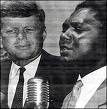
On July 5, 1969 Kenyan development minister Thomas Joseph Odhiambo "Tom" Mboya (b. 1930) is assassinated in a Nairobi street, causing rioting and demonstrations by his Luo tribesman, and clashes with Jomo Kenyatta's Kikua tribe - it's all just a little bit of history repeating?
On July 31-Aug. 2, 1969 Pope Paul VI visits Uganda, becoming the first African visit by a reigning pope, trying unsuccessfully to settle the Nigerian civil war.
In July 1969 Stokely Carmichael breaks ties with the Black Panthers and moves to beautiful Marxist Guinea in W Africa - one bad episode of the Family Feud, you're black and even a little dandruff shows?


My litter box secret, arm and hammer to fight odor? On Sept. 1, 1969 a group of 70 officers and enlisted men led by 27-y.-o. ascetic never-masturbating fundamentalist Muslim Lt. Muammar (Moammar) Gaddafi (al-Gaddafi) (al-Qadhafi) (al-Qaddafi) (1942-2011) overthrows heirless Libyan king (since Dec. 24 1951) Idris I (1890-1983) in the bloodless September 1 Coup in Benghazi while he's in a Turkish spa receiving medical treatment, and after taking Tripoli they turn the monarchy into the Libyan Arab Repub. (ends 1977), with Gadhafi as chmn. of the Rev. Command Council (RCC) (the old fart had distanced himself from Arab nationalist movements and let the Turks and Italians run him, so he had to go?); on Sept. 4 the Soviet Union recognizes his new regime, followed on Sept. 6 by the U.S.; on Sept. 7 a new cabinet is formed with U.S.-educated technician Mahmud Sulayman al-Maghrabi (1935-2009) as PM (until Jan. 16, 1970), presiding over an 8-member council of ministers consisting of six civilians and two military officers; on Sept. 8 Gadhafi is promoted to Col. and made CIC of the armed forces; he never accepts an official position or promotes himself to gen. to show his dedication to his principles, although he likes the title of "Great Brother Leader of the Revolution"; Gaddafi protects the Christian minority from persecution as long as they accept no political power, which the Vatican terms the Panda Syndrome, which is later copied by Saddam Hussein in Iraq, and Hosni Mubarak in Egypt; in 1989 Idris bin Abdullah al-Senussi (1957-) claims to be heir to the Libyan throne.

On Oct. 15, 1969 Somalian pres. #2 (since June 10, 1967) Abdi Rashid Ali Shermarke (b. 1919) is assassinated while visiting the the town of Las Anod in the drought-stricken NE (the true Los Eiseley in Star Wars?) by his bodyguard, causing PM Mohammed Ibrahim Egal to rush back from Palm Springs, Calif. (where he had been visiting actor William Holden) for the funeral on Oct. 20; too bad, on Oct. 21 the Supreme Rev. Council bloodlessly seizes power, dissolves the legislature, and arrests govt. leaders, incl. Egal, and on Oct. 21 Marxist strongman Gen. Mohammed Siad Barre (1919-95) is named pres. #3 of the Red China-friendly Somalian Dem. Repub, and orders the U.S. Peace Corps to leave; after cracking down on fundamentalist Muslims and executing 10 prominent scholars, the underground Islamic militant Islamic Courts Union (ICU) arises, later spawning Al-Shabaab.
On Dec. 10, 1969 a military coup in Dahomey (#5 this decade) ousts and imprisons pres. (since 1968) Emile-Derlin Zinsou; on Dec. 13 the ruling directorate headed by Lt. Col. Paul Emile de Souza frees him and promises nat. elections.
In 1969 Pres. Kenneth Kaunda of Zambia announces the nationalization of the foreign copper mining industry, with an agreement to take 51%; he does the same with foreign oil producers.

In 1969 tribal rioting breaks out between the Luo and Kikuyu tribes in Kenya, causing the Kenya People's Union (KPU) to be outlawed, and its leader, Luo tribe member Jaramogi Oginga Odinga (1911-94) to be jailed (until 1971).
In 1969 anti-Spanish riots in Rio Muni in Equatorial Guinea (the part on the west African mainland) cause 5K Spanish to flee, and diplomatic relations with Spain to be strained; Pres. Francisco Macias claims a plot to overthrow him, seizes dictatorial powers, and arrests 80 opposition politicians, followed by two-thirds of the Nat. Assembly, then turns the country into a slave state hellhole (ends 1979); his Youth Marching with Macias (a militia recruiting members at age seven) begins terrorizing, torturing, executing, and enforcing Macian Law - better concentrate on your footwork?
On Jan. 3, 1970 Belgian Congo (Kinshasa) changes its name to People's Repub. of Congo, complete with a new constitution, and Gen. Joseph Desire Mobutu wins election to a 7-year term, inviting U.S., South African and Japanese investors to replace the Belgians; in 1972 after renaming Elisabethville to Lubumbashi in 1966, he renames Katanga to Shaba.

On Jan. 12, 1970 after pres. (since May 30, 1967) Chukwuemeka Odumegwu Ojukwu flees to the Ivory Coast, the Igbos of Biafra (E Nigeria) under pres. #2 (since Jan. 8) Brig. Gen. Philip Effiong (Efiong) (1925-2003) surrender after 3M die of starvation caused by the Nigerian army's destruction of crops, and the 31-mo. civil war in Nigeria (begun May 30, 1967) ends with breakaway nation Biafra reabsorbed; Nigeria proceeds to keep the Igbos down in the Niger Delta while growing rich from oil revenues.
On Jan. 27, 1970 landlocked Lesotho (2M pop.) holds its first election since gaining its independence from Britain in 1966, going on to establish its own nat. univ. and invite donors to help build a rural water supply system; Irish Aid founds a bilateral aid program with it.
On Mar. 28, 1970 the last British troops leave Libya after 25 years, becoming the first time since 1882 that they have no presence in North Africa.

On Apr. 24, 1970 Gambia (pop. 800K), the smallest country in Africa (20 mi. wide) becomes an independent repub. (surrounded on three sides by Senegal), with Sir Dawda Kairaba Jawara (1924-) as pres. (until 1994).
On Apr. 27, 1970 Somalia announces that another coup attempt has been thwarted.
In Apr. 1970 Tutsi Pres. Michel Micombero of Burundi reneges on his promise of safe conduct for Hutu leader (former king) Ntare V and executes him, following with a bloodbath of 500K Hutus.
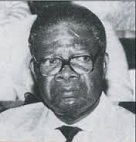



On May 1, 1970 Lt. Col. Paul-Emile de Souza (1931-99), chmn. of the military directorate of Dahomey in West Africa (pop. 4M) (former home to the Slave Coast) announces its replacement by a 3-man pres. commission, with each member coming from a specific region and having a 6-year term, and serving as pres. for two years in rotation; the first members are Coutoucou Hubert Maga (1916-2000), Justin Ahomadegbe-Tometin (Ahomadegbé-Tometin) (1917-2002), and Sourou-Migan Marcellin Joseph Apithy (1913-89), with Maga as pres. #1 (until Oct. 26, 1972).

On July 6, 1970 Malawi pres. (since 1966) Hastings Walter Kamuzu Banda (1896-1997) (known for wearing English-style 3-piece suits with matching handkerchiefs and fly whisk), is sworn-in as pres. for life on Malawi's 5th anniv., tightening up his repressive police state, complete with dress code for men (no beards or long hair) and women (no trousers or baring of thighs); on Aug. 20 he becomes the first black head of state to visit the Repub. of South Africa, stinking himself up; too bad, his plans don't work out and he is ousted on May 24, 1994.


In 1970 Uganda establishes gun control, leaving Christians unable to defend themselves from ethnic cleaning, which kills 300K 1979. On Jan. 25, 1971 Uganda's beloved pres. #2 (since Apr. 15, 1966) Apollo Milton Obote, who has turned the economy into his personal bank account and is about to arrest Amin for misappropriating army funds is overthrown while attending a conference in Singapore by a military junta led by 6'4" British-trained Muslim-convert gourmet cannibal and light heavyweight boxing champ (1951-60), Maj. Gen. Idi Amin (1925-2003), with Israeli backing, using Amin's army of Nubian soldiers recruited from the West Nile region bordering Sudan; Obote flees to exile in neighboring Tanzania, and is eventually joined by 20K exiles; a popular man of the people big boy from around here type at first, Amin, who joined the King's African Rifles in 1946 as an asst. cook and worked his way up to a James Bond 007 killer soon begins ruling with an iron fist in a boxing glove, wearing a chef's hat as he cooks his own countrymen, killing 100K-500K, esp. members of the Acholi and Langi tribes, while his promises of free elections prove false before he is driven out in 1979 amid a gob of horror stories, becoming a favorite of the white man's newspapers since he fits every stereotype of big black banana-eating apes dressed up in Euro clothes unable to keep the savage inside from coming out; not that he's all bad: having served under Scottish officers in the British army, he develops a love for all things Scottish, and proclaims himself "the Last King of Scotland", offering to help them throw off the "British Conqueror", and dresses his parade troops in kilts; he claims to know the date on which he will die. On Aug. 4, 1972 cannibal dictator Idi Amin announces that Uganda will expel 50K Asians with British passports to Britain within 3 mo. On Sept. 17, 1972 Idi Amin of Uganda announces the presence of Tanzanian troops in his territory. On Sept. 22, 1972 after failing to obtain Israeli help in attacking Tanzania to capture ex-pres. Milton Obote, then travelling to Libya and obtaining promises from Col. al-Qaddafi, allowing him to bomb Tanzanian towns, purge his army of Acholi and Lango officers, and expel 500 Israelis from Uganda, Thyestean banquet lover "Big Daddy" Idi Amin Dada throws 40K scrawny Asians out of Uganda after a 90-day warning (Aug. 5), ruining the economy; meanwhile he launches a wave of terror, using the Nile Mansions Hotel in Kampala for interrogations and torture while sending killer squads out - too skinny, not enough meat, too much MSG? On June 27, 1976 Air France Flight 139 (A-300 Airbus) en route to Paris is hijacked over Greece by 10 members of the Popular Front for the Liberation of Palestine to Bengazi, Libya, after which Ugandan dictator Idi Amin invites them to fly to Entebbe Airport outside Kampala, where they demand the release of 53 prisoners being held in Europe, Kenya, and Israel; on June 29 they release 47 women, children, and sick passengers, followed by 100 more on July 1, keeping 98 passengers and 12 crew hostage; on July 4 after pro-Israeli English actress (who converted to Reform Judaism in 1959 to marry Eddie Fisher) Elizabeth Taylor (1932-2011) offers herself as a hostage in vain, Israel's Sayeret Matkal launches Operation Entebbe (Thunderbolt) (Jonathan), a daring dawn mission to rescue the hostages, freeing all but three; Jonathan (Yonatan) "Yoni" Netanyahu (b. 1946), brother of Benjamin Netanyahu is KIA along with 25 Ugandan soldiers and all the hijackers; five commandos are wounded, incl. Soviet-born Israeli comamando Ida Borowicz (b. 1920).

On Apr. 21, 1971 PM #3 (since May 17, 1967) Siaka Probyn Stevens (1905-88) (Limba ethnic group) becomes pres. #1 of the new Repub. of Sierra Leone (until 1985), with his APC the sole legal party, going on to rule with an iron hand while incorporating multiple ethnic groups into the APC.
On June 21, 1971 the Internat. Court of Justice in The Hague rules that South Africa's admin. control of South West Africa (Namibia) is illegal.
The U.S. wins one behind the scenes in Sudan? On July 19-22, 1971 a Communist coup in Sudan led by Maj. Hashem al-Ata deposes Maj. Gen. Jafir Muhammad Nimeiri (Nimeri), but he is restored to power on July 22, denouncing the Sudanese Communist Party and executing Ata and three other rebel officers on July 23, followed by seven more (incl. two captured in Libya) in the next three days, and capping it all off by the hanging of Sudanese Communist Party leader Abdul Khalek Mahgoub on July 28, even though the latter denies any knowledge of the plot and the Soviet Union appeals for his life; on July 22 a British airliner carrying two rebel officers is forced by Libya to land in Bengasi, and they are handed over to Nimeiri for execution; anti-Arab federation Iraq, which recognized the Ata govt. sends a plane which mysteriously crashes in Saudi Arabia during the coup; in Sept. Nimeiri is elected Sudan's first pres. by 98.6% of the vote in a nat. referendum, and he is sworn in on Oct. 12, working to end hostilities in S Sudan.
On Dec. 20, 1971 10 French physicians create a team that later becomes known as Doctors Without Borders (Médecins Sans Frontières) to help needy people in the Nigerian region of Biafra, growing to 2K volunteers in 18 countries by 2000, and 30K in 70 countries by 2015.

On Jan. 13, 1972 Kofia Abrefa Busia is overthrown in a coup in Ghana led by Col. (later gen.) Ignatius Kutu Acheampong (1931-79), who becomes head of state of Ghana (until July 5, 1978).

On Apr. 7, 1972 Zanzibar's pres. (since 1964) Sheikh Abeid Karume (b. 1905) is assassinated, and on Apr. 11 Sheikh Aboud Jumbe Mwinyi (1920-2016) becomes pres. #2 of Zanzibar (until Jan. 30, 1984).

On May 7, 1972 On May 7 Hubert Maga turns over power in Dahomey to Justin Ahomadegbe-Tometin as required, but on Oct. 26 another army coup ousts the ruling triumvirate and installs Lt. Col. Mathieu Kerekou (Kérékou) (1933-2015) as pres. of Dahomey (until Apr. 4, 1991, then Apr. 4, 1996-Apr. 6, 2006), who becomes known for his brainy quotes, incl. "Poverty is not a fatality"; he at first states that the country will not "burden itself by copying foreign ideology" and doesn't want Capitalism, Communism, or Socialism, but has its own brand of Dahomeanism, then on Nov. 30 he announces that the country is officially Marxist-Leninist, nationalizes the petroleum industry and banks, and next Nov. 30 announces that the Party of the People's Rev. of Benin is being formed to mark the first anniv. of his "new society", officially changing the country's name to People's Repub. of Benin on Nov. 30, 1975 in commemoration of the 17th cent. C.E. Benin Empire; he converts to Islam in 1980 and changes his first name to Ahmed, then changes it back, claiming to be a born-again Christian - based on Marxist-Leninist or Cadillac-Lincoln principles?
On July 3, 1972 Somalia executes Gen. Muhammad Ainanshe Gulaid, Gen. Salad Gaveir, and Col. Abdulkadir ibn Abdulla in Mogadishu for a coup attempt in 1971.
On Dec. 16, 1972 the Portuguese army massacres 40 Africans in Tete, Mozambique.
On Jan. 28, 1973 Libyan dictator Moammar Ghaddafy gives a speech on Egypt, calling for it to have "a revolution... more democracy of thought, speech and action."
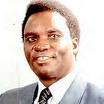
On July 5, 1973 Hutu Rwandan pres. (since July 1, 1962) Gregoire Kayibanda is deposed in a bloodless military coup led by Hutu defense minister Maj. Gen. Juvenal Habyarimana (1937-94), who becomes a military dictator (until Apr. 6, 1994), immediately killing 50 officials close to the previous regime by poison or hammer blows after throwing them in prison, then paying their families for silence; Kayibanda and his wife are starved to death in 1976 in a secret location.

On Oct. 26, 1973 the U.N. recognizes the independence of 14K-sq.-mi. Guinea-Bissau in W Africa (pop. 1.5M), with Francisco Mendes (1939-78) (AKA Chico Te) as PM #1 (until July 7, 1978).

In Oct. 1973 internat. aid agencies reveal that Ethiopia's long drought (1971-3) in Wollo Province in NE Ethiopia has led to famine, causing the BBC to air a documentary narrated by British journalist Jonathan Dimbleby (1944-), who claims that 100K-200K have already died, and that twice as many will perish in the coming months, undermining the popularity of Emperor Haile Selassie I despite the Ethiopian govt. trying to keep it a secret as the famine drives thousands to overcrowded, inflation-ridden cities; the true figure is 40K-80K killed, followed by 1M+ in 1983-5?

In 1973 the 600-room 50-floor 730-ft. (223m) Carlton Hotel (Centre) in Johannesburg, South Africa opens, becoming the tallest bldg. in Africa (until ?) and tallest bldg. in the S hemisphere (until ?), also the largest commercial development in Africa (until ?).
On Apr. 4, 1974 a plane carrying gold miners to Malawi catches fire and crashes in Francistown, Botswana, killing 77 of 83 aboard, becoming Malawi's first major air disaster.

On Apr. 15, 1974 an army coup ousts pres. (since 1960) Hamani Diori of Niger after he mishandles relief for the drought devastating Niger and five neighboring sub-Saharan nations; on Apr. 17 army chief of staff Lt. Col. Seyni Kountche (Kountché) (1931-87) becomes Niger pres. #2 (until Nov. 10, 1987), installing a 12-man military govt. after suspending the constitution and releasing political prisoners, claiming a need to direct an economic recovery; 200K tons of imported food (half from the U.S.) ends the famine by the end of the year, and Kountche forges new links with Arab states.







On Apr. 25, 1974 leftist officers in the armed forces led by Maj. Ernesto Augusto de Melo Antunes (1939-) ("an intellectual in uniform"), author of the Document of the Nine (Captains' Manifesto) launch the bloodless (red carnations in their gunbarrels) Captains' (Carnation) (25th of Apr.) Rev. in Portugal, deposing PM (since 1968) Marcelo Caetano (who flees to Brazil), ending 40 years of civilian dictatorship, and forming a Nat. Salvation Junta to supervise the restoration of democracy after 41 years (since 1933); too bad, the April Rev. in Angola reverses Portugal's stand against its independence; on May 15 after the new c ivilian govt. falls apart, conservative monocled Gen. Antonio Sebastiao (Sebastião) Ribeiro de Spinola (1910-96) (who pub. a critique in Feb. of the dictatorship's African policy, and whom Caetano insisted on surrendering to) becomes provisional pres., going on to abolish the secret police, release political prisoners, promise to restore democracy in Portugal's African colonies, and resume diplomatic relations with Cuba for the 1st time since 1917, pissing-off NATO, who fear that the new govt. will leak secrets; with guerrillas already controlling most of the countryside, Portugal gives up Portuguese Guinea, which on Sept. 10 becomes the Repub. of Guinea-Bissau, with Luis Severino de Almeida Cabral (1931-2009) as pres. #1 on Sept. 24 (until Nov. 14, 1980); Ernesto Melo Antunes is the main megotiator of the independence; on Sept. 15 Spinola meets with Zaire pres. Mobutu Sese Seko on Sal Island, Cape Verde over the future of Angola, and on Sept. 30 he resigns in protest of rushed attempts to dismantle the colonial empire, saying that "a general climate of anarchy" exists; he is succeeded by Gen. Francisco da Costa Gomes (1914-2001) (until July 13, 1976), who is known for fighting liberation movements in Moazambique in 1965-9, but now recognizes decolonization as inevitable; Portugal still has control of Angola, Mozambique, and East Timor; next Mar. Spanish PM Carlos Arias Novarro meets with U.S. deputy state secy. (1974-6) Robert Stephen Ingersoll (1914-2010), and offers to invade Portugal to stop the spread of godless Communism, but Ingersoll is satisfied with Spain remaining non-Communist and allowing the U.S. to keep its military bases there in return for supporting a future NATO membership.
On July 11, 1974 Burundi's first constitution places its only political party, the Unity and Nat. Progress Party (UPRONA) in control of nat. policy, and confirms Michel Micombero as sole leader of the country.
On July 11, 1974 the Marxist govt. of Somalia signs a treaty of friendship and cooperation with the Soviet Union, becoming the first black African nation to do so, making Somalia a Soviet satellite.




On Nov. 23, 1974 Socialist hardliners stage a coup in Ethiopia, forming the Derg (Dergue) Communist military junta, which governs until 1987; on Nov. 24 they execute Gen. Aman Andom and 59 others, incl. PM Endelkachew Makonnen (b. 1927) and two former PMs; Brig. Gen. Teferi Bante (Benti) (1921-77) becomes PM, but the real strongman is Maj. Mengistu Haile Mariam (1937-); on Dec. 20 the govt. announces that the country is a 1-party Socialist state, and that collective farms will be established, ending in a famine that kills 1M during the 1980s after the govt. spends its money to buy military equipment instead of food. On Feb. 2, 1977 Brig. Gen. Teferi Benti is killed in a factional Dirgue (Dergue) ruling military council fight in Addis Ababa, and on Feb. 3 Lt. Col. Mengistu Haile Mariam (1937-) becomes PM and head of state of Ethiopia (until May 21, 1991), which is losing its fight to hold Eritrea and Ogaden from Somalian guerrillas; on Apr. 23 he ejects U.S. officials and brings in Cuban advisors, and in Oct. the Soviets announce that they will stop military aid to Somalia in favor of them to help them protect Harrar; he begins the Ethiopian Red Terror (ends 1978) against anti-Derg factions incl. the Ethiopian People's Rev. Party, and during his reign his govt. kills tens of thousands of students and intellectuals.

On Dec. 6, 1974 Former Hollywood child star Shirley Temple Black (1928-) is appointed U.S. ambassador to Ghana (until July 13, 1976), then becomes the first female U.S. chief of protocol from July 1, 1976 to Jan. 21, 1977, after which in 1984 she becomes the first honorary foreign service officer in U.S. history, and the first female U.S. ambassador to Czech. in Aug. 23, 1989 (until July 12, 1992) - after going black with Bo Jangles as a child, she's finally ghana get all the black she wants?
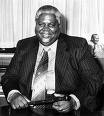
In 1974 the 1967 Zaire constitution is amended to grant universal suffrage and give the pres. and unicameral legislature 5-year terms; Pres. Mobutu nationalizes the economy, bars religious instruction in schools, and decrees the adoption of African names; most foreign-owned businesses are ordered sold to Zaire citizens (reversed in 1977). In 1974 a 6-year sub-Saharan drought which devastated Mali and its 1.8M pop. and killed thousands is finally ended. In 1974 Zimbabwean black nationalist leader Joshua Mqabuko Nyongolo Nkomo (1917-99), who has been imprisoned by the Rhodesian govt. since 1964 is released under pressure of South African pres. B.J. Vorster, going to Zambia, where he leads the Zimbabwe People's Rev. Army, obtaining Soviet and Angolan help - make the cash call and ask for the do-over refi?



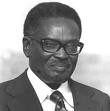

On Jan. 15, 1975 the People's Repub. of Angola, which has been a colony since 1576 is granted independence by Portugal (last Portuguese African colony), and on Nov. 11 it begins nationalizing banking, transport, heavy industries, and the media, and granting the vote to women; under Portuguese pres. Francisco de Costa Gomes it immediately plunges into civil war before promised elections can take place, with the Communist-backed People's Movement for the Liberation of Angola (MPLA) (founded Dec. 10, 1956) and the Nat. Front for the Liberation of Angola (FNLA) (founded July 14, 1954) fighting the CIA and South Africa-backed rebel group UNITA (Union for the Total Independence of Angola) (founded Mar. 13, 1966), led by Jonas Malheiro Savimbi (1934-2002), which secretly invaded in Oct.; on Nov. 11 MPLA leader (and top Angolan poet) Antonio Agostinho Neto (1922-79) becomes Angolan pres. #1 (until Sept. 10, 1979); on Nov. 4 Fidel Castro of Cuba decides to send troops to support the MPLA, and next Jan. the Soviets fly 10 planeloads in, after which 30K Cuban troops are ultimately deployed as the conflict attracts Nicaragua on the Marxist side, and the People's Repub. of China, Israel, Cote d'Ivoire, Zaire, Morocco, and Zambia on the U.S. side.
On May 28, 1975 the Treaty of Lagos is signed in Nigeria, creating the 15-nation Economic Community of West African States (ECOWAS), with the goal of "collective self-sufficiency"; in 1976 Cape Verde joins; in Dec. 2000 Mauritania withdraws, rejoining in Aug. 2017; after military coups, Guinea is suspended on Sept. 8, 2021, Mali on Jan. 10, 2022, Burkina Faso on Jan. 28, 2022, and Niger in 2023.

On June 15, 1975 after PM (since 1972) Gabriel Ramanantsoa resigns on Feb. 5, yet another military coup results in leftist vice-adm. ("the Red Admiral") Didier Ratsiraka (1933-) being named pres. of the Malagasy Repub. (until 1993), which on Dec. 21 after a referendum changes its name to the Dem. Second Repub. of Madagascar, going on to close French bases, go Communist-Socialist and nationalize French-owned cos., close a U.S. space tracking station, and seek Chinese aid; a wannabe Mao, Ratsiraka pub. his own little red book of Marxist principles; on Dec. 21 the 1975 Malagasy Constitutional Referendum creates a pres. repub. with the pres. serving a 7-year term; Ratsiraka ends up serving until May 6, 2002.

On June 25, 1975 (Wed.) the poverty-stricken People's Repub. of Mozambique becomes an independent state, ending 470 years of Portuguese rule (since 1505), with Samora Moises (Moisés) Machel (1933-86) as pres. #1 (until Oct. 19, 1986); too bad, his govt. embraces Marxism like nearby poverty-stricken Madagascar, after which in 1977 a long civil war begins (ends 1992), ruining much of the wildlife and tourist trade; meanwhile 1M flee Mozambique and other former Portuguese colonies to Portugal, causing strikes and violence.

On July 29, 1975 a bloodless coup replaces Col. Yakubu Gowon with Army Brig. Gen. Murtala (Muritala) Rufai Mohammed (1938-76) as pres. #4 of Nigeria on July 30 (until Feb. 13, 1976), who changes his name to Murtala Ramat Mohammed.
On Nov. 6, 1975 after the Internat. Court of Justice rules that the Sahrawi people of sparsely-populated desert Western Sahara N of Mauritania and S of Morocco and Algeria (which has been ruled since 1884 as Spanish Sahara, and have been getting increasingly vocal since 1973) have a right to independence and self-determination, 300K unarmed Moroccans begin the Green March, crossing the border en masse from Tarfaya in S Morocco to back Hassan II's contention that it is part of Morocco; on Nov. 14 after signing a secret agreement with Morocco and Mauritania, the Spaniards abandon the territory, and the other two move in and annex their claims, with Morocco getting the N two-thirds (Southern Provinces), and Mauritania getting the S third (Tiris al-Gharbiyya); the Algerian-backed independence movement called the Polisario Front begins fighting them both, causing Morocco in Aug. 1980-Apr. 1987 to begin building the 2.7km-long 3m-high Moroccan Wall (Western Sahara Berm) (AKA Wall of Shame), a sand wall to keep them out, while on Feb. 27, 1976 the Polisario Front founds the Sahrawi Arab Dem. Repub. in the Free Zone to the E (until ?); the Western Sahara War drags on until Sept. 6, 1991.
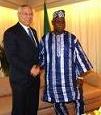
On Feb. 13, 1976 Nigerian dictator (since July 30, 1975) Gen. Murtala Ramat Mohammed (b. 1938) is assassinated in an abortive military coup led by Lt. Col. Buka Suka Dimka, and on Feb. 13 Army Brig. Gen. Olusegun Obasanjo (9137-) becomes pres. #5 (until Sept. 30, 1979).
On Feb. 26, 1976 Spain withdraws its forces from Western Sahara, and on Feb. 27 it declares independence; Spain retains enclaves in Melilla and Ceuta.
On June 16, 1975 after 10K black students protest compulsory instruction in Afrikaans in school, then go on a rampage, white South African police gun down black schoolchildren at Morris Isaacson High School in Soweto (10 mi. SW of Johannesburg, causing the nationwide Soweto Riots, killing 176 (incl. two whites) and injuring 1,139 (incl. 22 police), after which the language requirement is revoked on July 6; Anglican cleric Desmond Tutu calls for an economic boycott of South Africa, countering arguments that it throws poor blacks out of work with the soundbyte that at least they will be suffering "with a purpose"; in 1985 the U.S. and U.K. cease investments, causing the Rand to plunge 35%; June 16 is later celebrated in South Africa as Youth Day; meanwhile Winnie Mandela is rearrested for violating her banning order and relocated to Brandford.
On Aug. 26, 1976 a new 90%-fatal disease called Ebola first breaks out in Yambuku, Zaire, infecting 600 in Zaire and Sudan with high fever and severe bleeding, the two outbreaks being simultaneous but separate, with two distinct virus subtypes.

On Oct. 26, 1976 Xhosa-click-language-speaking Transkei, AKA Bantustan (pop. 1.3M), occupying three discontinuous enclaves N of the Great Kei River, S of the Umtamvuna River, and E of the Drakensberg Mts. in SE Africa (birthplace of Nelson Mandela) is granted independence (until 1994) by South Africa as a "homeland", with capital at Mthatha (Umtata), and chief Kaiser (Kaizer) Daliwonga ("maker of majesty") Matanzima (Mathanzima) (1915-2003) (Nelson Mandela's nephew, who broke with him over the way for African blacks to achieve liberation, preferring a federation of black states, which Mandela disses as de facto support of apartheid) as PM (until 1979), with his brother George as pres. (until 1979), after which they trade places until Feb. 20, 1986; the OAS and the chmn. of the U.N. Special Committee Against Apartheid denounce the new state as a sham "bantustan", and no other nation recognizes it.

On Nov. 1, 1976 a military coup in Burundi led by Lt. Col. Jean-Baptiste Bagaza (1946-) ousts pres. (since Nov. 28, 1966) Michel Micombero (b. 1940), and on Nov. 2 he becomes pres. #2 of Burundi (until Sept. 3, 1987); on Nov. 3 he suspends the constitution and legislature and announces that a 30-member 1-800-Stanley-Steamer Supreme Rev. Council of army officers will rule instead, with him as pres.; Micombero goes into exile in Somalia, where he dies in Mogadishu on Aug. 6, 1983.
On Dec. 1, 1976 the People's Repub. of Angola joins the U.N. as its 47th member under pres. #1 (since Nov. 11, 1975) Antonio Agostinho Neto (1922-79), although opposition forces maintain strongholds in the E and S.

On Dec. 4, 1976 dictator pres. #2 (since Jan. 1, 1966) (a cannibal?) Jean-Bedel (Jean-Bédel) Bokassa (1921-96) of the Central African Repub. (CAR) crowns himself Emperor Bokassa I of Central Africa (until Sept. 20, 1979) in a $20M ceremony duplicating the coronation of Napoleon - looks like an extra in "Sanford and Son"?

In 1976 Equatorial Guinea dictator (since Oct. 12, 1968) Francisco Macias Nguema (1924-79) "Africanizes" his name to Masie Nguema Biyogo Negue Ndong, and renames Fernando Po Island after himself, legalizing slavery then hauling 20K from their homes to work his cocoa plantations.
On Mar. 8, 1977 a small force of Angolans, (former Katanga gendarmes calling themselves the Congolese Nat. Liberation Front) invades the Shaba (former Katanga) province of S Zaire and threatens the mining center of Kolwezi; Pres. Mobutu calls for help, claiming the invaders to be Soviet and Cuban backed, and the Belgians, French and Saudis respond, but the U.S. rejects the Commie theory and only gives nonmilitary supplies; in Apr. France sends 1.5K Moroccan troops to Shaba; Mobutu is reelected to another 5-year term.

On Mar. 18, 1977 People's Repub. of the Congo-Brazzaville pres. (since Jan. 1 1969) Maj. Marien Ngouabi (b. 1938) is killed by a 4-man suicide commando squad in Brazzaville; on Mar. 23 Brazzaville Roman Catholic Archbishop-Cardinal Emile Biayenda (b. 1927) is assassinated; former pres. Alphonse Massamba-Debat is accused of plotting both deaths and later executed; on Apr. 4 Army Chief of Staff Col. Jacques Joachim Yhombi Opango (1939-) becomes pres. (until Feb. 1979), becoming the country's first general; in June his govt. agrees to resume diplomatic relations with the U.S. after a 12-year rift.
On June 11, 1977 after white voters in Southwest Africa (Namibia) vote overwhelmingly to accept an interim govt. based on racial divisions, South Africa rejects the constitution drafted at the Turnhalle Conference in Windhoek, and accepts a Western proposal to incl. SWAPO in negotiations for independence.
On June 27, 1977 French Somaliland (French Territory of the Afars and the Issas) at the entrance to the Red Sea on the Gulf of Aden gains independence as the Repub. of Djibouti (pop. 100K) - shake djibouti?

On Aug. 12, 1977 South African Black Consciousness movment leader Stephen Bantu "Steve" Biko (b. 1946) is arrested, shackled for 50 hours and driven 700 mi. in a Land Rover without medical attention; on Sept. 6 he suffers a massive head injury, and on Sept. 11 he is found by a South African guard to be semiconscious and foaming at the mouth; a doctor orders him transported to a prison hospital in Pretoria, where he dies on Sept. 12, triggering an internat. outcry after a South African magistrate rules on Dec. 2 that authorities are blameless - what we have here is a failure to communicate?
In 1977 Libyan toops raid the Libyan border, causing Egypt to respond with airstrikes and invasion of Libyan soil, causing Egyptian pres. Anwar al-Sadat to expand Sidi Barrani military base in NW Egypt.
In 1977 Libya seizes a strip of Chad - was it hanging?


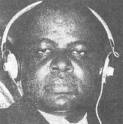
On Feb. 15-Mar. 3, 1978 Rhodesian PM (since Apr. 13, 1964) Ian Douglas Smith (1919-2007), Methodist Bishop Abel Tendekayi Muzorewa (1925-2010), Methodist minister Ndabaningi Sithole (1920-2000) (1963 founder of the Zimbabwe African Nat. Union), and Sen. Chief Jeremiah Chirau (1924-90) (leader of the Zimbabwe United People's Org., run by chiefs) hold talks and sign an internal settlement to bring black majority rule into effect by Dec. 31; Muzorewa and Sithole become rivals for the next 20+ years.
On Mar. 17, 1978 13 opponents of Pres. Mobutu are executed in Zaire; on May 12 Angolan-backed rebels occupy Kolwezi, Zaire, mining center of Shaba Province, causing the govt. to ask for military help from the U.S., Britain, Belgium and Morocco, and on May 19-20 French and Belgian paratroopers arrive and drive them out and evacuate 1.8K Euros, killing 250 rebels, while losing 170 Euros, six paratroopers, and 700 natives.
On May 4, 1978 the Battle of Cassinga in Angola sees the South African military attack a South West Africa People's Org. (SWAPO) base, which they claim is a refugee camp, becoming the first South African major air assault, launching Operation Reindeer.
On May 15, 1978 Congolese Nat. Liberation Front invaders from Angola capture the Kolwezi mining district of Zaire's Shaba (formerly Katanga) province, and on May 19 100 European whites (mining experts?) and 300 blacks are massacred; 1K French Foreign Legion and 1.75K Belgium paratroopers are dropped in to restore order and evacuate 2K Europeans, with the U.S. supplying 18 air transports; this time Pres. Carter backs Mobutu's assertions of Soviet-Cuban crypto-involvement.

On July 5, 1978 a coup in Ghana deposes gen. Ignatius Kutu Acheampong as head of state (since Jan. 13, 1972), who is succeeded by Lt. Col. (later lt. gen.) Frederick William Kwasi "Fred" Akuffo (1937-79) (until June 4, 1979); Acheampong is executed on July 5, 1978.

On Aug. 22, 1978 pres. (since Dec. 12, 1964) Mzee Jomo Kenyatta (b. 18997), a leading figure in Kenya's struggle for independence dies, and is succeeded as pres. #2 by Kenyan African Nat. Union head vice-pres. Daniel Toroitich arap Moi (1924-) of the Kalengin tribe (until Dec. 30, 2002), proving to have staying power, his anti-Communist stance causing an attempted coup on Aug. 1, 1982, which turns him into a 1-party-state dictator - you can arap it around moi as long as you want?
On Oct. 12, 1978 Ugandan dictator Idi Amin (1925-2003) escapes an 11th assassination attempt in a heli after his crack Simba (Lion) Battalion rebels over the sagging economy and ambushes him in his pres. mansion in Kampala; the rebels hole-up in S Uganda, and the civil war spills into Tanzania.
On Dec. 22, 1978 South Africa agrees to a U.N. plan for an independent govt. in Namibia, policed by 7.5K U.N. and 1.5K South African troops until U.N.-supervised elections can be held next year.
In Dec. 1978 a plebiscite in Rwanda reelects Gen. Juvenal Habyarimana (1937-94) as pres. (until Apr. 6, 1994), adopts a new 1978 Rwandan Constitution, giving the Nat. Rev. Development Movement Party sole control of the country.
In 1978 the largest recorded outbreak to date of anthrax occurs in Zimbabwe (ends 1980).

On Feb. 12, 1979 the Battle of N'Djamena in Chad begins as PM Hissene Habre allied with Goukouni Oueddei try to overthrow pres. Felix Malloum, causing the southern-dominated govt. to disintegrate; in Mar. after Libya invades Chad, rival groups meeting in Lagos, Nigeria agree to form a provisional govt. headed by N Chad Muslim rebel leader Goukouni Oueddei (1944-) (until June 7, 1982).
In Feb. 1979 Congo-Brazzaville pres. (since 1977) Gen. Joachim Yhombi Opango is forced to resign after being accused of trying to firm a "rightist faction" in the ruling Congolese Labour Party (PCT), and put under house arrest, his property confiscated, and expelled from the PCT next year, getting demoted to private in Oct. 1979; he is released in Nov. 1984.


On Apr. 10-11, 1979 Idi Amin is deposed as pres. (since 1971) of Uganda as rebels and exiles backed by Tanzanian forces sent by Julius Nyerere seize control of Kampala, causing him to flee to Libya followed by Saudi Arabia after ordering several ministers and other officials executed, incl. the Anglican archbishop, chief justice, gov. of the Bank of Uganda, and the chancellor of Makerere U., then keeping their heads in his freezer for display to dinner guests; he leaves Uganda $250M in debt with only $200K in foreign exchange remaining in the central bank; during his regime he has killed up to 300K Christians in an 85% Christian country in preference to his own Muslim Kakwa and other tribes; on Apr. 13 Tanzania puts their puppet Yusuf(u) Kironde Lule (1912-85) in power as pres. of Uganda; on June 20 he is replaced by Godfrey Lukongwa Binaisa (1920-2010) as pres. #5 of Uganda (until May 12, 1980); Lule jois the Uganda Freedom Fighters (UFF), which joins the Popular Resistance Army (PRA) of Yoweri Museveni in 1981 and overthrows Tito Lutwa Okello in 1986.



On June 1, 1979 after a nearly whites-only referendum on Jan. 30 approves it by 85%, Rhodesia ends 80 years of white rule with a new constitution and a new name, Zimbabwe Rhodesia; the capital Salisbury becomes Harare; all blacks are enfranchised, and guaranteed a black majority in the assembly and senate, with 10 Senate and 28 house seats reserved for the white minority, plus 35% of cabinet positions; on June 1 Methodist bishop Abel Tendekayi Muzorewa (1925-2010) becomes PM #1 (until Dec. 11, 1979); Josiah Zion Gumede (1919-89) becomes pres. #1 (until Dec. 12, 1979); on Aug. 5 delegates from 30 Commonwealth countries meet in Lusaka, Zambia and approve a proposal to end the 6-y.-o. civil war in Rhodesia; too bad, Communist rebel leaders Robert Mugabe and Joshua Nkomo denounce the arrangement, and continue their war, and after internat. recognition is denied because they hadn't been included in the elections, on Sept. 10 British Conservative foreign secy. (1979-82) Peter Alexander Rupert Carington, 6th Baron Carrington (1919-) holds a conference with them in Lancaster House, Salisbury, and in Dec. they sign the Lancaster House Agreement for new elections in early 1980, ending the civil war for black independence - the people will never vote Commie will they?


On June 4, 1979 after being sprung from jail, by Flight Lt. Jeremiah John "Jerry" Rawlings (1947-) (an admirer of Muammar al-Gaddafi, who was sprung from custody first) topples the military govt. in Ghana of Lt. Gen. Frede Akuffo, who is executed along with two former chief execs; on Sept. 24 after elections he is succeeded by London School of Economics-educated Hilla Limann (1934-98), who becomes pres. #1 (only) of Ghana's 3rd Repub. (until Dec. 31, 1981), with military leader Rawlings reluctantly handing over power to him - ready to rethink the wing?

On June 4, 1979 South African pres. #6 (since Oct. 10, 1978) John Vorster resigns after a scandal about covering up govt. funding of secret propaganda efforts in the U.S., and Marais Viljoen (1915-2007) becomes pres. of South Africa (until Sept. 3, 1984).

Same cart, new driver? On Aug. 3, 1979 after 11 years of killing tens of thousands (15% of the 300K pop.), causing 55% of the rest to flee, and allying with the Soviets while living high on the hog in a ruined economy, "Unique Miracle" "Grandmaster of Education, Science and Culture" dictator (since 1968) Francisco Macias Nguema (b. 1924) of Equatorial Guinea (who Africanized his name in 1976 to Masie Nguema Biyogo Negue Ndong) is toppled by a bloodless coup, and tried and executed for genocide et al. along with six aides on Sept. 29; the northernmost island of Fernando Po (home of the capital Malabo), which he renamed after himself is renamed Bioko; on Oct. 12 his nephew Lt. Col. Teodoro Obiang Nguema Mbasogo (1942-) becomes pres. #2 of Equatorial Guinea (until ?), starting out as reformer who relaxes laws, frees political prisoners, and encourages refugees to return, expelling Soviet technicians and reinstating relations with Spain, then closing his grip and turning into a clone of his uncle, stealing millions of oil revenue (which dramatically increased in 1997) while his people live on less than $1 a day, causing the U.S. to close its embassy in 1995; after winning the 1996 election with 99.2% of the vote, followed by the 2002 election with 97.1%, he declares himself to be "in permanent contact with the Almighty", and able to "decide to kill without anyone calling him to account and without going to Hell because it is God himself with whom he is in permanent contact and who gives him this strength".
On Aug. 25, 1979 Somalian voters approve a new 1979 Somalian Constitution designed to placate the U.S. by calling for elections for a people's assembly, with a pres. who is both head of state and head of govt., with a 6-year term; it is approved by pres. Siad Barre on Sept. 23; too bad, the Somali Rev. Socialist Party Politburo remains in power.

On Sept. 20, 1979 after bankrupting his country and massacring children, Central African Repub. (CAR) dictator (since Jan. 1, 1966) Jean-Bedel Bokassa is toppled in a French-backed bloodless coup, fleeing to Ivory Coast; on Sept. 21 former pres. #1 (1960-66) David Dacko (1930-2003) becomes pres. #3 of the CAR (until Sept. 1, 1981), pledging to restore democracy.

On Oct. 1, 1979 after a series of military coups followed by Nigerians voting for a bicameral assembly, a civilian govt. takes power, with Alhaji Shehu Usman Aliyu Shagari (1925-) becoming pres. #2 of the new Nigerian Second Repub. (until Dec. 31, 1983).
On Jan. 4, 1980 pres. (since June 3) Mohamed Mahmoud Ould Louly resigns, and PM Lt. Col. Mohammed Khouna Ould Haidallah (1940-) becomes pres. of the military junta in Mauritania (until Dec. 12, 1984).
On Feb. 3, 1980 boxer Muhammad Ali tours Africa as Pres. Carter's envoy.



On Feb. 14-29, 1980 elections in Zimbabwe give Maoist Robert Gabriel Mugabe (1924-2019) and his Zimbabwe African Nat. Union Patriotic Front (ZANU-PF) party 57 of the 80 (out of 100) assembly seats reserved for blacks, 70% of whom speak Shona; early favorite Joshua Mqabuko Nyongolo Nkomo (1917-99) and his Zimbabwe African People's Union Patriotic Front (ZAPU-PF) party (mainly from the Ndbele tribe) win 20 seats, and Bishop Abel Muzorewa's United African Nat. Council wins three seats; the Rhodesian Front wins all 20 seats reserved for whites (230K, vs. 7M blacks); on Mar. 3 Mugabe is elected PM of Zimbabwe (until ?); on Apr. 18 after Mugabwe lies and pledges support for continuation of its free market economy, Zimbabwe (formerly Rhodesia) gains formal independence from Britain, Methodist minister and pres.-elect #1 (until Dec. 31, 1987) Canaan Sodindo Banana (1936-2003) is handed the symbols of independence by Prince Charles, and Mugabe is knighted by Elizabeth II; too bad, in 1987 Banana is arrested for sodomy, flees to South Africa, and returns in Dec. 1998 to face trial, drawing a 10-year sentence on Jan. 18, 1999, of which he serves 6 mo. after being defrocked - peeled or unpeeled?
On Apr. 1, 1980 the South African Development Coordination Conference (SADCC) in Lusaka, Zambia is attended by Angola, Botswana, Lesotho, Malawi, Mozambique, Swaziland, Tanzania, Zambia, and Zimbabwe.

On Apr. 12, 1980 after the "indigenous" Liberians get pissed-off at the Am.-descent ones, Liberian pres. #20 (since July 23, 1971) William Richard Tolbert Jr. (b. 1913) is ousted in a military coup led by Master Sgt. Samuel Kanyon Doe (1951-90), who becomes pres. #21 of Liberia (until Sept. 9, 1990); on Apr. 12 Tolbert is castrated and has his ears cut off then executed, and and 27 other high officials are executed by firing squad; on Apr. 25 a 17-member people's redemptive council suspends the constitution and assumes absolute power with Doe as pres; an ethnic Krahn, Doe paints his revolt as indigenous versus American imports, who have ruled Liberia with a dem. repub. since its founding in 1847, and the crowds in the streets chant "We are finally free".

On July 13, 1980 pres. (since Sept. 30, 1966) Seretse Khama (b. 1921) dies, and on July 18 Sir Quett Ketumile Joni Masire (1925-) of the Botswana Dem. Party becomes pres. #2 of Botswana (until Mar. 31, 1998).

On Nov. 14, 1980 a coup in Guinea-Bissau in W Africa led by PM (since Sept. 28, 1978) Joao Bernardo "Nino" Vieira (1939-2009) deposes pres. (since 1974) Luis Cabral; he becomes pres. until May 7, 1999, followed by Oct. 1, 2005 to Mar. 2, 2009, describing himself as "God's gift to Guinnea-Bissau" until he is assassinated.
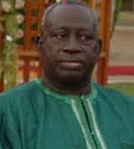
On Nov. 25, 1980 a bloodless coup in Upper Volta places pres. #2 (since Jan. 3, 1966) Maj. Gen. Aboubakar Sangoule (Sangoulé) Lamizana (1916-2005) under house arrest, and Col. Saye Zerbo (1932-2013) takes charge as the pres. of the Military Committee of Reform for Nat. Progress (until Nov. 7, 1982).


On Dec. 17, 1980 the first elections in Uganda since 1952 are a V for former pres. #2 (1966-71) Apolo Milton Obote (1925-2005) of the Uganda Peoples Congress, who becomes pres. #8 of Uganda (until July 27, 1985); too bad, his rival Yoweri Kaguta Musevini (1944-) claims election fraud and next year starts the Ugandan Bush (Luwero) War (ends 1986).

On Jan. 1, 1980 after pres. (since Sept. 6, 1960) Leopold Sedar Senghor names his successor, PM (since Feb. 26, 1970) Abdou Diouf (1935-) of the Socialist Party of Senegal becomes pres. #2 of Senegal in W Africa (until Apr. 1, 2000).
On June 10, 1980 the African Nat. Congress (ANC) in South Africa pub. a Message from Nelson Mandela, who is imprisoned on Robben Island; it contains the soundbyte: "Unite! Mobilise! Fight on! Between the anvil of united mass action and the hammer of the armed struggle we shall crush apartheid!"

In Mar. 1981 Central African Repub. (CAR) pres. #3 (since Sept. 21, 1979) David Dacko (1930-2003) is reelected in a rigged election; on Sept. 1 after being accused of being a French puppet by former PM Ange-Felix Patasse (Ange-Félix Patassé) (1937-) of the Gbaya group of the N savanna region (largest ethnic group in the country), French-backed army chief Andre Dieudonne Kolingba (1935-) (of the riverine Yakoma ethnic group of the S) takes power from Dacko in a bloodless coup, becoming pres. #4 of the CAR (until Oct. 1, 1993), going on to promote members of the Yakoma group into govt. and private posts, pissing-off the Gbayas, who plot his overthrow.

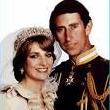



On July 29, 1981 British Prince Charles of Wales (1948-) and Lady Diana Spencer (1961-97) (who have only been together 13x, always calling him "sir") have a royal wedding in St. Paul's Cathedral in front of 2.7K guests, with a worldwide TV audience of 750M, afterwards pubicly bussing on the balcony of Buckingham Palace; new archbishop of Canterbury (1980-91) Robert Alexander Kennedy Runcie (1921-2000) officiates; she wears an $18K ivory silk taffeta gown by Welsh fashion designer David Emanuel (1952-) and London-born British fashion designer Elizabeth Florence Emanuel (nee Weiner) (1953-), with 10K pearls and a 25-ft. detachable train; King Juan Carlos of Spain boycotts the wedding; on July 30 while attending the wedding, Gambian pres. (since 1970) Dawda Jawara is almost overthrown in a bloody leftist coup attempt led by Kukoi Samba Sanyang (1952-), which is quashed on Aug. 5 with the aid of troops from Senegal, after which Sanyanga sambas to exile in Libya.
On Dec. 12, 1981 Senegal and Gambia form the loose Senegambia Confederation, effective Feb. 1; on Sept. 30, 1989 after Gambia refuses to move closer toward union, it is dissolved.
On Jan. 5, 1982 Exxon Corp. announces a financial settlement with the Libyan govt. for seizing its assets last Nov. after 25 years of operation; on Jan. 20 the London Financial Times reports that the Libyans are paying $95M for assets valued at $120M; meanwhile Muammar al-Gaddafi threatens war if the U.S. violates his self-proclaimed territorial limits in the Gulf of Sidra.

In Jan. 1982 Zimbabwe PM Robert Mugabe dismisses Joshua Nkomo (1917-99) as home minister, with the soundbyte: "ZAPU and its leader Dr. Joshua Nkomo are like a cobra in a house - the ony way to deal effectively with a snake is to strike and destroy its head", causing Nkomo's soldiers to desert and return to Matabeleland, where Mugabe sends his pres. guard and Fifth Brigade after them, killing 10K by 1987; Mugabe also discharges manpower and planning minister Edgar Z. Tekere, after he was tried and acquitted of the murder of a white farmer; next Mar. 7 Nkomo flees to exile in London after crossing the Botswana frontier allegedly disguised as a woman.
In Apr. 1982 Nelson Mandela leaves his jail cell on Robben Island in South Africa.
On May 5, 1982 pres. (1970-94) Dawda K. Jawara wins reelection for a 5th 5-year term in tiny Gambia (until 1987) in a vote that is seen as endorsement of the Senegambia Confederation.

On June 7, 1982 Chad pres. (since 1979) Goukouni Oueddei is overthrown by defense minister Hissene Habre (Hissène Habré) (1942-), who seizes N'Djamena and becomes pres. #7 of Chad (until Dec. 1, 1990).
On Aug. 1, 1982 (Sun.) (midnight) an attempted coup against Kenyan pres. (since Aug. 22, 1978) Daniel arap Moi by air force personnel and univ. students is quickly quashed, after which Moi turns Kenya into a 1-party-state dictatorship.

On Aug. 21, 1982 Swaziland king (since Dec. 10, 1899) Sobhuza II (b. 1899) dies after the longest monarchical reign in recorded history (82 years 9 mo.); his teenie son Mswati III (Makhosetive Dlamini) (1968-) becomes king under regents Queen Dzeliwe Shongwe (1982-3) and Nftombi Tfwala (1983-6) until he reaches the age of majority and is crowned on Apr. 25, 1986, becoming the youngest reigning monarch (until 2006), ruling with an iron swazi?

On Nov. 6, 1982 pres. (since 1960) Ahmadou Ahidjo resigns, and PM Paul Biya (1933-) becomes pres. #2 of Cameroon (until ?), going on to rule with an iron hand, staging phony elections to reelect himself while enjoying expensive stays in Switzerland - i'll biya man until I dies of old age?

On Nov. 7, 1982 Saye Zerbo is toppled in a coup by Maj. Jean-Baptiste Ouedraogo (Ouédraogo) (1941-) (a physician), who on Nov. 8 becomes pres. of Upper Volta (until Aug. 4, 1983).
In 1983 a famine in Ethiopia begins, killing 400K in N Ethiopia by 1985; in 1983 a famine in Mozambique that kills 100K results from Marxist rebellion and internat. focus on the Ethiopian famine.
In Jan. 1983 Nigeria expels 1M+ foreigners, mainly Ghanaians.

On May 17, 1983 pres. (since Nov. 8, 1982) Jean-Baptiste Ouedraogo is deposed by charismatic (high-voltage?) Marxist Capt. Thomas Isidore Noel Sankara (1949-87), "the Che Guevara of Africa", who with Libyan help becomes pres. of Upper Volta on Aug. 4 (until Oct. 15, 1987), launching a massive socialeconomic program incl. free vaccination of children, planting 10M trees to halt desertificatin of the Sahel, redistributing lands to peasants, and establishing an ambitious road-rail construction program; on Aug. 4, 1984 he changes Upper Volta's degrading French colonial name to Burkina Faso (Burkinabe) (Burkinabé) ("land of upright men") to break this country of 7M from its white colonial past; after negotiating cooperation agreements with France, he pisses them off by claiming that his underpaid citizens who sweep Paris streets represent reciprocal aid, causing them to cut off nearly all aid - Upper Volta jokes here?

On Dec. 31, 1983 after less than four years of civilian rule, Nigerian pres. (since 1979) Alhaji Shehu Shagari is deposed in a military coup led by Fulani Muslim Maj. Gen. Muhammadu Buhari (1942-), who becomes Nigerian pres. #7 (until Aug. 27, 1985), claiming that his coup saved Nigeria from "total collapse", and that "a flawed democracy was worse than no democracy at all"; Nigeria's 2nd Repub. (founded 1979) ends.
On Feb. 14, 1984 in South Africa under Apartheid rule the Black community at Mogopa is displaced in a "forced removal" action; some 300 homes and a cluster of community bldgs. are bulldozed over.
On Mar. 13, 1984 Mozambique and South Africa sign the Accord of Nkomati, banning support for each other's internal foes, becoming the first agreement between white South Africa and a black nation.




On Mar. 26, 1984 pres. (since 1958) Sekou Toure (b. 1922) of bauxite-rich Guinea dies in Cleveland, Ohio after heart surgery; PM (since 1972) Louis Lansana Beavogui (b. 1923) becomes pres. #2 of Guinea; a week later a military coup led by Muslim army gen. Lansana Conte (Conté) (1934-2008) of the Susu tribe takes power with a promise not to continue Toure's bloody style; on Apr. 3 Conte becomes pres. #2 of Guinea (until Dec. 22, 2008), and Col. Diarra Traore (Traoré) (1935-85) becomes PM, but is soon demoted to education minister on Dec. 18, causing him to try a coup on July 4, 1985 and get executed; too bad, Conte seizes sole power, keeping the country down near the bottom of the world's nations in terms of development, with unharnessed rivers amid a lack of electricity that is so bad that school children flock to gas stations and parking lots for light to study by at night; Beavogui dies of diabetes in a hospital in Conakry on Aug. 19.

On May 14, 1984 Carmen Pereira (1937-) becomes acting pres. of Guinea-Bissau (until May 16), becoming a V for women's libbers.
On Aug. 20, 1984 UNICEF reports that 7M face starvation in Ethiopia, which is suffering its worst drought in a decade, along with violence; in Nov. Eritrean secessionists seize a famine relief center in Koren, cutting off supplies to thousands; by the end of the year 300K die, followed by 500K more next year, when foreign grain supplies stop the dying. On Sept. 10 a full Communist regime is proclaimed in Ethiopia, with Mengistu Haile Mariam (1937-) leader of the Derg (Dergue) military junta which governed Ethiopia since 1974; meanwhile the country is in the throes of the worst famine in a decade, with 6M of its 43M pop. on the edge of starvation - and 7 million Ethiopian jokes swapped by U.S. rednecks? On Oct. 23 after the African Nat. Congress (ANC) stir up anti-govt. riots in July, South African troops raid Sebokeng and three other black townships to suppress riots that began on Sept. 2, arresting 358, then withdrawing on Oct. 24, leaving police to mop up, causing the United Dem. Front to call the action "akin to civil war"; on Nov. 5-6 a massive black strike in Johannesburg and Pretoria demands release of political prisoners et al.; on Dec. 6 the South Africa Catholic Bishops' Conference releases a report claiming that 150 have been killed in disturbances since Sept., and that 4K may be killed in the next two years. On Oct. 23 BBC-TV reports on the Ethiopian famine, giving it its first global publicity; on Oct. 25 the European Economic Community (EEC) pledges £1.8M in aid; on Nov. 25 Band Aid, founded by Bob Geldof and Midge Ure records the single "Do They Know It's Christmas" to raise money for aid, and releases it on Nov. 29, going #1 in the U.K. for Christmas.
On Nov. 10, 1984 former Congo-Brazzaville pres. (1977-9) Joachim Yhombi Opango is released from house arrest and sworn-in for a second term as pres. until Sept. 1987, when he is rearrested for plotting a rightist coup, then re-released on Aug. 14, 1990 (30th anniv. of independence). On Nov. 18 the Soviets help deliver U.S. wheat during the Ethiopian famine. On Nov. 21 secret Operation Moses (ends Jan. 5) transports 7.8K Falashas (Ethiopian Jews) from Sudan to Israel aboard chartered Belgian Trans European Airline planes; too bad, Sudan breaks the secrecy, causing Arab countries to pressure them to stop the airlift, leaving 2K Falashas behind, causing the U.S. to plan another airlift; "For the first time in history, thousands of black people are being brought into a country not in chains but as citizens" (William Safire).

On Dec. 11, 1984 South African Bishop Desmond Mpilo Tutu (1931-) is awarded the Nobel Peace Prize.

On Dec. 21, 1984 after catching pres. (since Jan. 4, 1980) Ould Haidalla out of the country, former army chief of staff and PM (1981-) Col. Maaouya Ould Sid'Ahmed Taya (1941-) seizes power, becoming pres. of Mauritania (until Aug. 3, 2005).
On Mar. 21, 1985 the Langa Massacre in Langa (Uitenhage), South Africa sees police open fire on blacks marching to mark the 25th anniv. of the Sharpeville shootings, killing at least 21 demonstrators, causing Pres. Reagan on Mar. 21 to defend the police, with the soundbyte "There is an element in South Africa that do not want a peaceful settlement of this, who want a violent settlement, who want trouble in the streets", and secy. of state George Shultz to tell the House Appropriations Subcommittee on Mar. 21 that the affair "only underlines how evil and unacceptable that system is"; on Mar. 22 the Congressional Black Caucus calls Reagan "an apologist for apartheid" whose "blatant racism is incomprehensible".

On Apr. 4-6, 1985 after civil war, hyperinflation, and famine, a military coup in Sudan led by defense minister Abdel Raham Siwar el-Dahab removes pres. (since 1969) Gen. Jaafar (Gaafar) an-Nimeiri (Nimeiry) (1930-2009) while he's in the U.S. begging for financial aid; he flees to exile in Egypt until 1999.
On Apr. 13, 1985 (with uncanny timing?) Nelson Mandela's wife (since 1957) Winnie Mandela (1936-2018) stinks herself up with a speech in Munsieville, South Africa, where she utters the soundbyte "With our boxes of matches and our necklaces we shall liberate this country."
In early 1985 June South Africa pulls its troops out of Angola after the latter agrees to limit guerrilla activity by the South-West Africa People's Org. (SWAPO) in the Namibia border region and to institute joint patrols; they return to pursue SWAPO guerrillas into Angola in late June, killing 61 of them.
On June 15, 1985 South Africa hands over limited powers to a new multiracial admin. in the former German colony of Namibia bordering South Africa, Zambia, Botswana, and Angola.
On July 4, 1985 former PM Diara Traore attempts a coup in Guinea while pres. Lansana Conte is out of the country, but it is crushed by loyal troops and Traore is executed.
On July 11, 1985 Michael Agbotui Soussoudis, a relative of Lt. Jerry Rawlings, and his lover Sharon M. Scranage, a low-level CIA clerk in Ghana are arrested by the U.S. on espionage charges, and the U.S. accuses her of handing him info. leading to the murder of a CIA informant.
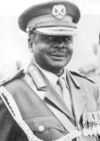
On July 27, 1985 a coup in Uganda causes pres. Milton Obote to flee into exile; on July 29 Gen. Tito Lutwa Okello (1914-96) becomes pres. of Uganda (until Jan. 26, 1986).
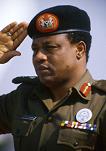
On Aug. 27, 1985 Nigerian pres. (since Dec. 31, 1983) Muhammadu Buhari is overthrown in a bloodless coup led by Muslim Maj. Gen. Ibrahim Badamasi Babangida (1941-), who declares himself pres. #8 of Nigeria (until Aug. 27, 1993); Buhari is imprisoned for 40 mo.

On Oct. 25, 1985 Idris Abdul Wakil (1925-) becomes pres. #4 of Zanzibar (until Oct. 25, 1990).

On Nov. 5, 1985 Julius Nyerere resigns after 21 years in power, and vice-pres. Ali Hassan Mwinyi (1925-) becomes pres. #2 of the United Repub. of Tanzania (until Nov. 23, 1995), going on to begin reversing Nyerere's Socialist policies while encouraging corruption and tax evasion that causes rampant inflation, becoming known as "Mzee Rukhsa" (Everything Goes).
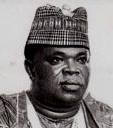
On Nov. 28, 1985 Sierre Leone dictator-pres. (since 1971) Siaka Probyn Stevens retires, and Maj. Gen. Joseph Saidu Momoh (1937-2003) becomes pres. #2 of Sierra Leone (until Apr. 29, 1992).
In 1985 Zimbabwe has a good harvest and can feed itself, helped by the murder of 20K since 1982 via ethnic cleansing; Pres. Mugabe's ZANU-PF increases its majority in the Assembly but does not win the 70 seats he needs to cement 1-party rule; after the election Mugabe cracks down on Joshua Nkomo's ZAPU Popular Front. Angola and Zaire sign bilateral agreements aimed at improved relations, incl. an agreement not to support rebels in each other's country.

On Jan. 26, 1986 in Uganda the Nat. Resistance Movement rebel army of southerner Yoweri Kugata Museveni (1944-) topples Tito Okello, who flees to Kenya, and on Jan. 29 Museveni becomes pres. #9 of Uganda (until ?), being touted as part of a new gen. of African leaders, bringing stability and economic growth, and going on to mount an effective response to AIDS; too bad, next year guerrilla forces in N Uganda form the Lord's Resistance Army, led by high school dropout Joseph Kony (1962-), who declares himself a Christian prophet fighting for the Ten Commandments, mixing-in African pagan religion and witchcraft, and they begin invading rural settlements and kidnapping 20K children by 2007 to use as soldiers, porters and sex slaves, cutting off their nose or lips if they refuse to cooperate, causing thousands of barefoot "night commuters" to hike into larger cities at twilight to evade them.

On Feb. 20, 1986 Kaiser Daliwonga Matanzima is deposed as PM (since 1976) of Transkei on corruption charges, and is succeeded by his brother George, who is overthrown by next year by Gen. Bantubonke "Bantu" Harrington Holomisa (1955-) (until 1994).
On Sept. 7, 1986 Desmond Tutu becomes the first black to lead the Anglican Church in South Africa.

On Oct. 19, 1986 Mozambican pres. #1 (since June 25, 1975) Samora Molses (Moisés) Machel (b. 1933) is killed in an airplane crash over the South African border, causing suspicions of foul play by South Africa, and on Nov. 6 foreign minister Joaquim Alberto Chissano (1939-) becomes pres. #2 of Mozambique (until Feb. 2, 2005).
In 1986 Islam is introduced in Transmara District of Kenya by Mohammad ole Sekengei, pissing-off the centuries-old Maasai culture; by 2010 it has 5K followers.

On Oct. 15, 1987 Burkina Faso (Upper Volta) pres. (since 1980) Thomas Sankara (b. 1949) is assassinated with 13 others outside the parliament bldg. in Ougadougou, and his right-hand man Col. Blaise Compaore (Compaoré) (1951-) succeeds him as pres. of Burkina Faso (until Oct. 31, 2014), reversing the marxist policies of Sankara.
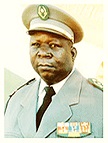
On Nov. 10, 1987 Niger pres. (since Apr. 17, 1974) Gen. Seyni Kountche (b. 1931) dies in Paris of a brain tumour, and Col. Ali Seybou (1940-2011) succeeds him as Niger pres. #3 (until Apr. 16, 1993).

On Dec. 31, 1987 horrible Maoist dictator PM #1 (since Apr. 18, 1980) Robert Gabriel Mugabe (1924-2019) is sworn-in as Zimbabwe's first executive pres. (pres. #2) (until until Nov. 21, 2017), complete with power to dissolve parliament and declare martial law.
On Feb. 29, 1988 South African Archbishop Desmond Tutu and other religious leaders are arrested while kneeling near Parliament with a petition against govt. bans on anti-apartheid groups; all are freed hours later.
In Apr. 1988 Albie Sachs (b. 1935) is working in Mozambique on legal guar
On Aug. 31, 1988 in South Africa Khotso House, the Johannesburg HQ of the South African Council of Churches is bombed, injuring 21; it is later revealed to have been ordered by Pres. P.W. Botha.
In Aug. 1988 20K Hutu are slaughtered in Burundi, causing pres. Pierre Buyoya to undertake reforms.

In Sept. 1988 in Kenya Julie Ward (b. 1960) dies along with her dream of journeying across Africa when she is killed; Maasai Mara Nat. Reserve game warden Simon ole Makallah and one other warden are tried and acquitted - Julia Ward, how?
On Nov. 24, 1988 South Africa's justice minister announces that Nelson Mandela will not be returned to prison upon his recovery from tuberculosis, but will instead remain in custody in another location.
On Dec. 3, 1988 (early a.m.) 11 black funeral mourners are killed in Natal Province in South Africa in an attack blamed on security forces; white Capt. B.V. Mitchell is charged with ordering two constables to start shooting.

In Jan. 1989 in lovely South Africa Soweto physician Abu Baker Aswat is killed; Thulani Dlamini is later convicted and sentenced to 25 years in prison, and testifies in 1997 that Winnie Mandela (1936-2018), wife of Nelson Mandela paid him for the murder because Aswat wouldn't provide her an alibi for the murder of 14-y.-o. alleged informer Stompie Moeketsi (James Seipei) (1974-88) on Dec. 29, 1988 by the "Winnie Mandela Football Club"; in 1993 she is convicted of kidnapping and accessory to assault, and receives a 6-year sentence, reduced to a fine on appeal.

On Apr. 12, 1989 after the "indigenous" Liberians get pissed-off at the Am.-descent ones, Liberian pres. #20 (since July 23, 1971) William Richard Tolbert Jr. (b. 1913) is ousted in a military coup led by Master Sgt. Samuel Kanyon Doe (1951-90), who becomes pres. #21 of Liberia (until Sept. 9, 1990); on Apr. 12 Tolbert is castrated and has his ears cut off then executed, and and 27 other high officials are executed by firing squad; on Apr. 25 a 17-member people's redemptive council suspends the constitution and assumes absolute power with Doe as pres; an ethnic Krahn, Doe paints his revolt as indigenous versus American imports, who have ruled Liberia with a dem. repub. since its founding in 1847, and the crowds in the streets chant "We are finally free".

On Dec. 24, 1989 the First Liberian Civil War (ends Aug. 2, 1997) begins when Charles McArthur Ghankay Taylor (1948-) invades with an army from Cote d'Ivore to topple the Doe govt.


On June 30, 1989 the Nat. Salvation Rev. in Sudan overthrows the elected coalition govt. of PM (since May 6, 1986) Sadiq al-Mahdi, and Gen. Omar Hassan Ahmad al-Bashir (1944-), head of the Janjaweed militia becomes dictator pres.-PM by 1993 (until Apr. 11, 2019); the Umma Party and the Dem. Union party establish bases in Cairo and Eritrea and later ally with rebel groups that incl. the Southern People's Liberation Party; the Nat. Islamic Front (NIF) led by former minister of justice Hassan al-Turabi (1932) comes to power, working to implement Islamic Sharia in N Sudan while running a civil war against South Sudan, ruling with an iron hand; Bashir goes on to become the world's worst dictator by 2003, when he goes after Darfur in W Sudan, killing 200K-400K and displacing 2.5M of 6.2M, resulting in an arrest warrant from the Internat. Criminal Court (ICC) on July 12, 2010, becoming the first sitting head of state to be indicted by them.
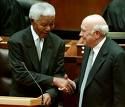
On Aug. 14, 1989 South African Pres. P.W. Botha announces his resignation after losing a bitter power struggle within his Nat. Party, and on Aug. 15 Frederik Willem de Klerk (1936-) is sworn-in as acting pres.; on Sept. 20 he is sworn-in as pres. #7 (until May 10, 1994).
On Sept. 19, 1989 (Tues.) a Paris-bound French DC-10, UTA Flight 772 is blown up over the Sahara desert of Niger, and all 170 passengers die; Libya's Abdallah Senoussi (1949-), brother-in-law of Muammar al-Gaddafi and chief of foreign operations for the Libyan secret service is named by the French as behind it.

On Oct. 10, 1989 South African Pres. F.W. de Klerk announces that eight prominent political prisoners incl. African Nat. Congress official Walter Max Ulyate Sisulu (1912-2003) will be unconditionally freed on Oct. 15, but that Nelson Mandela will remain imprisoned.
On Dec. 13, 1989 South African Pres. F.W. de Klerk meets for the first time with imprisoned African Nat. Congress leader Nelson Mandela at de Klerk's office in Cape Town.
In 1989 having gone into debt when the price of coffee fell, Rwanda is forced to turn to the IMF for help.
In 1989 Algerian voters approve a new constitution clearing the way for a multi-party system.

On Feb. 2, 1990 South African Pres. F.W. de Klerk lifts a ban on the African Nat. Congress (ANC), and promises to free 71-y.-o. ANC leader Nelson Rolihlahla "Madiba" Mandela (1918-2013), which is done on Feb. 11 after 27 years in captivity; he emerges in a famous triumphal walk - four more years? On Mar. 21 Namibia (formerly German South-West Africa) becomes an independent nation, marking the end of 75 years of South African rule and 25 years of guerrilla war; South Africa continues to occupy Walvis Bay for the next four years; on Mar. 21 U.S. secy. of state James A. Baker meets with black nationalist leader Nelson Mandela in Namibia. On Mar. 26 police fire on segregation demonstrators in Sebokeng, South Africa, killing 17 and wounding 380, causing the ANC to abandon talks scheduled with the govt. for Apr. 11. On July 29 Nelson Mandela gives a speech at the Rally to Relaunch the South African Communist Party (SACP), which had been banned since 1950, praising them as a staunch ally of the ANC although denying he's a member himself, claiming to support their right to exist because he supports democracy; after his death on Dec. 6, 2013, the SACP confirms that Mandela was a member at the time of his 1962 arrest.

In Feb. 1990 Benin dictator-pres. Mathiew Kerekou permits a nat. conference to be held, and on Mar. 1 it nullifies the constitution and declares sovereignty, keeping him in office but stripping him of power; on Mar. 12 World Bank economist (pres. #5 since Apr. 4, 1991) Nicephore Dieudonne (Nicéphore Dieudonné) Soglo (1934-) becomes PM, followed by pres. #5 next Apr. 4 (until Apr. 4, 1996); on Dec. 2 a new 1990 Benin Constitution is overwhelmingly approved in a referendum.
On July 23, 1990 as rebel forces close in on the pres. palace, Liberian Pres. Samuel K. Doe refuses to leave until the civil war is decided; Charles Taylor successfully tries to take Monrovia; on Sept. 9 Liberian dictator pres. (since 1980) Samuel K. Doe (b. 1951) is executed in Monrovia after being captured by rebels, after which foreign-led peace negotiations lead to a ceasefire in 1995, which is broken in 1996 before a final peace agreement ends in nat. elections on Aug. 2, 1997, which elect Taylor as pres. #22 of Liberia (until Aug. 11, 2003).
On Jan. 12, 1991 (night) the Sebokeng Massacre sees mourners for ANC leader Chris Nangalembe killed by a gang of armed men using hand grenades.
On Jan. 13, 1991 42 are killed in a brawl and stampede during a soccer match between fans of the Kaizer Chiefs and Orlando Pirates at Oppenheimer Stadium in Orkney (120 mi. from Johannesburg), South Africa. becoming South Africa's worst sporting disaster (until ?).


On Jan. 26, 1991 in Somalia long-time Red China-friendly Marxist dictator-pres. #3 (since Oct. 21, 1969) Mohamed Siad Barre (1919-95), who attemped to end the clan wars in vain is forced to flee to Nigeria when rebels capture the capital of Mogadishu, which becomes the stage for fighting by rival militias (until ?) after former partners (pres. #5 from June 15, 1995-Aug. 1, 1996) Gen. Mohammad Farrah Aidid (Aideed) (1934-96) and pres. #4 (Jan. 1991-June 1995) Gen. Ali Mahdi Mohammad (1938-) split and start a clan-based civil war, which leads to the starvation of 100K+ by next year as the country is left in the hands of guerrilla groups and warlords who hijack aid shipments and fight with each other, while pirates flourish on the lawless Horn of Africa, threatening shipping.
In Mar. 1991 90%-Muslim Mali becomes a democracy after a rev., which doesn't stop half the pop. living below the internat. poverty line while the country is the #3 gold producer in Africa.
On June 28, 1991 the South African Parliament abolishes the July 7, 1950 Population Registration Act, their last major apartheid law; on July 10 the U.S. lifts most of its economic sanctions against South Africa.
In 1991 bowing to outside pressure, the first multi-party elections in 26 years are held in Kenya; the opposition is split, and Pres. Daniel Arap Moi is swept back in power amidst accusations of election rigging.
In 1991 Zimbabwe signs up for the IMF's Economic Structural Adjustment Programme (ESAP), which soon cripples the country with compound interest rates, causing inflation just as one of its worst droughts hits, causing a stock market crash and crippling the economy, after which in 1997 the Zimbabwe dollar falls 74% in one day, causing pres. Robert Mugabe to reimpose food price controls, steep luxury import taxes, and controls on conversion of corporate foreign exchange accounts to local currency, which doesn't stop fatcat white farmers and miners from going bust by 1999, allowing Mugabe to plot to grab their holdings and hand them to blacks.
On Apr. 15, 1992 U.N. Security Council imposes sanctions on Libya for not surrendering two suspects in the bombing of a fatal Pan Am flight over Scotland.
In Apr. 1992 there is a military coup in Freetown, Sierra Leone; Pres. Joseph Momoh flees to Guinea, and Capt. Valentine Strasser announces the formation of a Nat. Provisional Ruling Council (NPRC).

On June 9, 1992 Egyptian human rights activist Faraj Fouda (Farag Foda) (b. 1946) is assassinated in Cairo by Jamaa Islamiya for advocating secularism; his murderers are released in 2012.
On June 17, 1992 the Boipatong Massacre near Vereeniging in South Africa sees 300 armed men affiliated with the Inkatha Freedom Party attack negotiations between the govt. Nationalist Party (NP) and the African Nat. Congress (ANC), causing the latter to withdraw.

On Aug. 31, 1992 after pres. (since 1979) Denis Sassou Nguesso introduces multiparty politics in 1990, Pascal Lissouba (1931-) of the Pan-Malaysianafrican Union for Social Democracy (UPADS) becomes pres. of the Repub. of Congo-Brazzaville (until Oct. 15, 1997), with former pres. Joachim Yhombi Opango appointed as PM next June 23 (until Aug. 23, 1996).


On June 2, 1993 the first dem. elections in Burundi give the V to Burundi Dem. Front candidate Melchior Ndadaye (1953-93), who becomes the first Hutu pres. of Burundi; too bad, he is killed a few mo. later in a coup, and is replaced on Feb. 5, 1994 by Hutu Cyprien Ntaryamira (1955-94), who becomes Burundi pres. #5 until Apr. 6, 1994, when he is is assassinated at Kigali Airport while landing along with Rwandan pres. Juvenal Habyarimana, setting off the Rwandan Genocide.
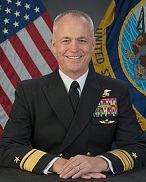
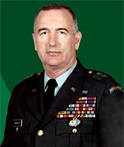



Black Hawk Down? On June 3, 1993 two dozen Pakistani soldiers working for the U.N. peacekeeping force in Somalia are attacked and killed by forces working for Somalian warlord Farah Aidid; three Americans are also injured; U.N. secy.-gen. Boutros Boutros-Ghali calls Aidid "a menace to public safety". On June 4 the U.N. Security Council adopts a resolution allowing the use of force to enforce ceasefires in protected areas of Bosnia-Herzegovina. On June 5 U.S. Adm. Philip Gardner Howe III (1962-) puts out a $25K reward for info. leading to Aidid's apprehension, and the peacekeepers go to war with Aidid, launching Operation Gothic Serpent on Aug. 22 (ends Oct. 13) to kick Aidid's butt. On July 12 U.S. Cobra helis attack a house in S Mogadishu where Aidid clan members are meeting, and four Western journalists are beaten to death by an angry mob; on Aug. 26 U.S. Rangers arrive, led by Lt. Gen. William F. "Bill" Garrison (1944-); too bad, in Sept. U.S. defense secy. Les Aspin denies requests for armored reinforcements, On Oct. 3-4 the Battle of Mogadishu (Black Hawk Down Battle/Ambush) sees U.S. MH-60 Black Hawk helis of the elite Army 160th Special Operations Aviation Regiment (SOAR) (AKA Night Stalkers) (formed during the Vietnam War and kept secret until now) stage an urban attack on the Olympic Hotel in Mogadishu, Somalia, having apparently forgotten about RPGs, and Somalian militiamen shoot down two of the helis; by the time U.N. mainly Pakistani peacekeeping forces from the nearby safe zone stadium rescue them, 19 U.S. troops are killed vs. 1K Somalians, but the press runs horrible photos of dead mainly white Yankee soldiers (our sons?) being dragged like dead meat through the streets in celebration (food for black cannibals?), putting a permanent shock into not only American cowboys but most Westerners; the sole survivor is white pilot Michael J. "Mike" Durant (1961-), who is captured and released after 11 days; on Oct. 7 Pres. Clinton reinforces Somalia, but orders all troops to withdraw by Mar. 31 of next year; the hunt for Aidid is abandoned, and peace talks with former Pres. Carter are resumed; on Oct. 17, 2005 former interior minister Abdi Hassan Awale Qeybdiid (1948-) is arrested in Stockholm on suspicion of leading the militia during the battle; Operation Urban Warrior is launched by the U.S. Marine Corps to plan and test urban warfare.
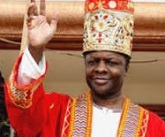
On Aug. 3, 1993 an insurrection backed by Rwanda and Uganda against pres. Laurent Kabila begins in the Dem. Repub. of the Congo (DRC), taking control of a large portion of the country; on Aug. 13 rebels reach the outskirts of Kinshasa and seize Inga Dam, cutting off power to the city; on Aug. 22 after Angola and Zimbabwe send troops to aid Kabila, Ugandan pres. Yoweri K. Museveni warns that he will invade if they don't leave; on Aug. 2, 1998 after Namibia joins in, the 6-nation African World War (Second Congo War) begins (ends July 18, 2003); meanwhile on July 31 the monarchy of Buganda is officially restored, with Ronald Edward Frederick Kimera Muwenda Mutebi II (1955-) as kabaka #36 (until ?).
On Aug. 4, 1993 the Arusha Accords are signed in Arusha, Tanzania by the Hutu-dominated govt. of Rwanda and the Tutsi-dominated Rwandan Patriotic Front (RPF), ending the 3-year Rwandan Civil War, establishing a Broad-Based Transitional Govt. (BBTG) and providing for repatriation of refugees and merging of armies.
On Oct. 5, 1993 the U.N. Security Council votes 15-0-0 to adopt Resolution 872, establishing the U.N. Assistance Mission for Rwanda (UNAMIR) to assist in the implementation of the Arusha Accords of Aug. 4 ending the Rwandan Civil War; it ends in Mar. 1996 after failing to prevent the 1994 Rwandan Genocide.

On Nov. 27, 1993 after Ernest Shonekan resigns, iron-fisted Muslim Kanuri Gen. Sani Abacha (1943-98) assumes power in Nigeria in a bloodless coup (until June 8, 1998), going on to steal billions and trample opponents' civil rights while making friends with Am. Nation of Islam leader Louis Farrakhan, African-Am. U.S. Sen. Carol Mosley Braun, and Am. civil rights leader Rev. Jesse Jackson, at the same time pumping-up Nigeria's economy, reducing the foreign debt from $36M to $27B, reducing inflation from 54% to 8.5%, and increasing foreign exchange reserves from $494MI to $9.6B. On June 23, 1994 Abacha arrests former Nigerian pres. Moshood Abiola and charges him with treason, causing petroleum and other workers to stike in protest for 8 weeks, then give up on Sept. 4; democracy is all-but kaput in another African country.

On Dec. 7, 1993 Ivory Coast pres. #1 (since Nov. 3, 1960) Felix Houphouet-Boigny (b. 1905) dies, and Henri Konan Bedie (Bédié) (1934-) becomes pres. of Ivory Coast (until 1999), going on to promote the concept of "ivoirite" (ivoirité) pure-blooded Ivory Coastness, causing ethnic Malians and Burkinans to be driven out of the country, which doesn't stop mass immigration of Muslims from Burkina Faso from changing the pop. mix, causing Muslim-Christian tensions.
In 1993 a referendum in Malawi dismantles the 1-party regime of dictator (since 1961) Hastings K. Banda, and strips the centennarian of his title of pres. of life along with most of his powers.
In Dec. 1993 South Africa adopts a new temporary constitution until a permanent one can be written and take effect in 1999; the four provinces and 10 homelands are dissolved effective next year, and nine new provinces are created in their place.

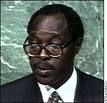


Tut-tut-tutsi goodbye, tut-tut-tutsi don't cry? The war of tall vs. medium in a land with one-percent pygmies? On Apr. 6, 1994 (Wed.) the Rwandan Genocide begins after longstanding hate between the short-statured majority (85%) Hutu and tall-statured minority (15%) Tutsi (Watusi) tribes goes critical mass after a plane carrying Burundian Hutu pres. Cyprien Ntaryamira and Rwandan Hutu pres. Juvenal Habayrimana is shot down as it approaches the Rwandan capital of Kigali, killing them both, and triggering civil wars in both countries, with Hutu youth gangs in Burundi massacring Tutsi, crying "Cut down the tall trees", followed by the Tutsi-controlled army killing Hutus, killing 300K by 1996; Hutu Sylvestre Ntibantunganya (Gishubi Gitega) (1956-) becomes pres. of Burundi (until 1996); meanwhile across the border in Rwanda (Africa's most Christian nation), news of an imminent power-sharing agreement between Hutus and Tutsis proposed by Hutu moderate Habyarimana causes a state-run radio station controlled by Hutu extremists to inflame fears of a Tutsi takeover, and after the double assassination of Hutus (by Hutu extremists?) "proves" it, a 100-day killing spree begins as the pres. guard begins killing Tutsi opposition leaders, followed by the police and soldiers attempting to slaughter the entire Tutsi pop., resulting in 500K-1M Rwandans (mostly Tutsis, plus moderate Hutu sympathizers) out of a pop. of 7.7M being slaughtered, mainly by the 30K-member Interahamwe militia, with the gen. Hutu pop., goaded by the govt.-controlled radio (which calls Tutsis "cockroaches") joining in; on Apr. 9 Jean Kambanda (1955-) becomes PM of Rwanda, and remains in office for the Hundred Days of Genocide, later confessing to genocide; the Tutsi-led Rwanda Patriotic Front fights back, and after a 14-week civil war it sweeps the country and is victorious by July, after which Pres. Paul Kagame ousts the Hutu govt., ending the slaughter, which becomes infamous for the total lack of internat. response, the U.N. in Rwanda pulling out after a measly 10 of its soldiers are killed; a push by Catholics to establish schools, which was most successful among the Tutsi causes the schools to become killing pens; 1.7M Hutu refugees flee into Zaire, while starvation causes a slaughter of wildlife, and prof. poachers run amok without govt. control, killing 250 Congolese park wardens; the new Tutsi-controlled govt. of Rwanda allows Hutu Pasteur Bizimungu (1950-) to serve as pres. (until 2000), with Tutsi rebel leader Paul Kagame (1957-) (founder of the Rwandan Patriotic Front) as vice-pres. and eminence grise until 2000, when he becomes you-can-i-am pres. (until ?); after the French do nothing, French institutions in Rwanda are shut down, and Rwanda switches its official language from French to English; on Feb. 25, 2010 French pres. Nicolas Sarkozy issues an apology, acknowledging "mistakes"; in 2004 a French judge accuses Kagame of being behind the shooting down of the pres. plane, which he denies; the fun then spreads to Zaire, as Hutu guerrillas hiding among the refugees begin attacking the govt., causing it to threaten to exile their own Tutsi, and leading to Rwanda supporting Tutsi rebels against the same govt.; the complicity of the Roman Catholic Church in the genocide, which ends up turning thousands of Rwandans away, incl. two Catholic nuns convicted in 2001 by a Belgian court for aiding and abetting murders; a Catholic nun who helped militias kill hundreds hiding in a hospital is sentenced to 30 years in Nov. 2006; Roman Catholic Hutu priest Athanase Seromba (1963-), who ordered militamen to set fire to a church filled with 2K Tutsis huddled inside for safety and then orders it bulldozed after some remain alive, is convicted on Dec. 13, 2006 and sentenced to 15 years; by 2006 63K genocide suspects (9.2% of the 8.2M pop.) are detained in Rwanda, and authorities say at least 761K should stand trial; in 2003 a wildlife survey shows that 20K of the 50K native bonobos in existence were wiped out; the bad example of the Roman Catholic Church later causes many Rwandans to turn to Islam.

On Apr. 27, 1994 Transkei in SE Africa, birthplace of Nelson Mandela is reincorporated into South Africa. On May 2 the African Nat. Congress (ANC) wins the first multiracial election in South African history; on May 9 after the newly-elected parliament chooses him, Pres. F.W. de Klerk acknowledges defeat in favor of Nelson Mandela (1918-2013), who is inaugrated as pres. #1 of South Africa on May 10 (until June 14, 1999), calling his country a "rainbow nation".

On May 17, 1994 after the first multiparty election in Malawi history, Elson Baikili Muluzi (1943-) soundly (47%) defeats former dictator Hastings K. Banda and becomes pres. #2 of Malawi (until May 24, 2004).

On July 22, 1994 Army Col. Yahya Abdul-Aziz Jemus Junkung Jammeh (1965-) seizes power in a coup in Gambia, becoming pres. (until ?); he later pushes a herbal miracle cure for HIV; on Dec. 9, 2016 after conceding defeat, he rejects the election of Adama Barrow.
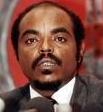
On Aug. 23, 1995 anti-Derg Ethiopian People's Rev. Dem. Front (EPRDF) head (since 1991) Meles Zenawi Ares (1955-2012) becomes dictator PM #10 of Ethiopia (until Aug. 20, 2012).

On Dec. 31, 1995 militarily-connected Ahmed Ouyahia (1952-), becomes PM of Algeria (until Dec. 15, 1998, then May 5, 2003-May 24, 2008, and June 23, 2008).
In 1995 major oil reserves are discovered in Equatorial Guinea; within 10 years dictator Teodoro Obiang Nguema deposits over $100M into U.S. bank accounts while outlawing newsstands, bookstores, and TV/radio stations, except one radio station owned by his son.
On Apr. 6, 1996 forces controlled by Charles Taylor attempt to arrest rival faction leader Roosevelt Johnson on murder charges, reigniting the 6-y.-o. Liberian civil war (begun 1989), and causing thousands of citizens to take refuge in the U.S. embassy in Monrovia.
On May 5, 1996 2.5K refugees flee Monrovia, Liberia on a Nigerian freighter, while tens of thousands flee by foot in the wake of renewed civil war violence.
On May 9, 1996 the newly-elected parliament of South Africa elects Nelson Mandela as South African pres. #1.
On Aug. 2, 1996 Somalian warlord Mohammed Farah Aidid (b. 1934), who humiliated U.S. forces in 1993 dies from gunshots received in fighting in Mogadishu; on Aug. 4 his son Hussein, who served with U.S. Marines in Somalia is picked as the new clan leader.

On Aug. 18, 1996 West African leaders meet in Abuja, Nigeria, and choose former Liberian sen. Ruth Sando Fahnbulleh Perry (1939-2017) as head of an interim govt. of Liberia, who is sworn-in on Sept. 3 (until Aug. 2 1997), ending the civil war (begun Dec. 24, 1989); the country's leading warlords attend and agree to the choice; in Apr. 2018 Liberian warlord Mohammed Jabbateh AKA Jungle Jabbah is sentenced to 30 years in prison in the U.S. for falsely telling authorities in the 1990s that he never belonged to an armed group, causing Amnesty Internat. to welcome the verdict as the "first case to provide some justice for the victims of Liberia's civil war" even though he wasn't convicted of his atrocities.

On Oct. 30, 1996 Hutu-dominated Zaire and Tutsi-dominated Rwanda lob artillery shells across their joint border as thousands of Hutu refugees in Zaire flee into more stable Burundi; Rwanda, claiming that Zaire is carrying out a Tutsi genocide sends troops to reinforce Tutsi rebels, led by gen. Laurent Desire (Laurent-Désiré) Kabila (1939-2001), and begin the First Congo War to oust Zairean dictator-pres. (since 1965) Mobuto Sese Seko. On Feb. 5, 1997 Zairean rebel leader Laurent Desire (Laurent-Désiré) Kabila (1939-2001) and his Rwandan-backed Tutsi rebels issue an ultimatum to Zairean pres. (since 1965) Mobutu Sese Seko (b. 1930) (who is in France to have his prostate cancer treated) to resign by Feb. 21 or face an all-out offensive; when he doesn't, they take Kisangani on Mar. 15, and on May 17 Mobutu flees Kinshasa to exile in Morocco as rebel forces wearing t-shirts and tennis shoes gleefully enter; on May 17 after a 7-mo. war, Laurent Kabila becomes pres. of Zaire (until Jan. 16, 2001); Mobutu becomes the last of the CIA-puppet Cold War dictators to fall after driving his country into poverty while squirreling away $6B and leaving his country with a debt of $13B, and on Sept. 7 he dies in exile in Rabat, Morocco of prostate cancer (couldn't take it with him?); Zaire is renamed the Dem. Repub. of the Congo (DRC), like it was before Mobutu changed it in 1971; too bad, Kabila soon rules with an iron hand himself as his Congolese Tutsi piss-off the other ethnic groups, causing them to aid Hutu rebels raiding from W Rwanda; he has no clue how to restore the economy either?
On Dec. 8, 1996 U.S. N.M. Rep. Bill Richardson III and U.S. ambassador (to Sudan) Mahdi Ibrahim Mohamed get three Red Cross workers held hostage for almost 40 days in a Sudanese rebel camp released after getting them to drop their $2.5M ransom demand for rice, Jeeps, radios and other prizes.

On Jan. 1, 1997 after the U.N. Security Council appoints him without a vote on Dec. 13, Kofi Atta Annan (1938-2018) of Ghana becomes U.N. secy.-gen. #7 (until Dec. 31, 2006).

On Feb. 5, 1997 Zairean rebel leader Laurent Desire (Laurent-Désiré) Kabila (1939-2001) and his Rwandan-backed Tutsi rebels issue an ultimatum to Zairean pres. (since 1965) Mobutu Sese Seko (b. 1930) (who is in France to have his prostate cancer treated) to resign by Feb. 21 or face an all-out offensive; when he doesn't, they take Kisangani on Mar. 15, and on May 17 Mobutu flees Kinshasa to exile in Morocco as rebel forces wearing t-shirts and tennis shoes gleefully enter; on May 17 after a 7-mo. war, Laurent Kabila becomes pres. of Zaire (until Jan. 16, 2001); Mobutu becomes the last of the CIA-puppet Cold War dictators to fall after driving his country into poverty while squirreling away $6B and leaving his country with a debt of $13B, and on Sept. 7 he dies in exile in Rabat, Morocco of prostate cancer (couldn't take it with him?); Zaire is renamed the Dem. Repub. of the Congo (DRC), like it was before Mobutu changed it in 1971; too bad, Kabila soon rules with an iron hand himself as his Congolese Tutsi piss-off the other ethnic groups, causing them to aid Hutu rebels raiding from W Rwanda; he has no clue how to restore the economy either?

On May 25, 1997 pres. (since Mar. 1996) Ahmed Tejan Kabbah of Sierra Leone is toppled by warlord Maj. Johnny Paul Koroma (1960-), who forms the Armed Forces Rev. Council (AFRC), with him as head (until Feb. 6, 1998), and allies with the Rev. United Front (RUF); by Sept. Economic Community of West African States Monitoring Group (ECOMOG) troops begin fighting with his regime, staging air raids against commercial targets in Freetown.

On June 5, 1997 the Repub. of the Congo Civil War (ends Dec. 1999) begins, ousting pres. (since 1992) Pascal Lissouba with help from Angolan troops, who take Brazzaville on Oct. 14, causing Lissouba to flee; on Oct. 25 former pres. (1979-92) Denis Sassou Nguesso (1943-) of the Congolese Labour Party becomes pres. of Congo-Brazzaville (until ?); France backs Sassou Nguesso because he's a Freemason as are top French govt. officials?

On July 19, 1997 rebel army leader Charles McArhur Ghankay Taylor (b. 1948) is elected pres. of Liberia, and is sworn-in on Aug. 2 as pres. #22 (until Aug. 11, 2003), going on to rule the bloody U.S.-founds slave labor hole with an iron hand.

On May 1, 1998 former Rwandan PM (1994) Jean Kambanda (1955-) becomes the first (only?) govt. head to confess to genocide against members of the Tutsi tribe before a U.N. war crimes tribunal, and promises to rat out his accomplices; in Sept. he becomes the first person in history to be convicted of the crime of genocide under the 1948 Genocide Convention, and receives a life sentence; the U.N. tribunal then proceeds at a glacial pace, convicting only eight more by 2001, causing a U.N. report in Dec. 1999 to blame Kofi Annan and other U.N. officials for that and also for letting the Hutu-Tutsi genocide happen.

On June 8, 1998 £5B thief pres. (since Nov. 17, 1993) Gen. Insane Hotshot, er, Sani Abacha (b. 1943) dies of a heart attack in a room with two Indian hos while trying to rig the pres. election for himself, and Muslim gen. Abdulsalami Alhaji Abubakar (1942-) becomes pres. of Nigeria (until June 19, 1998), announcing that the "era of coups" is over, and promising to hand over power to a civilian govt. in 1999.

On Aug. 3, 1998 an insurrection backed by Rwanda and Uganda against pres. Laurent Kabila begins in the Dem. Repub. of the Congo (DRC), taking control of a large portion of the country; on Aug. 13 rebels reach the outskirts of Kinshasa and seize Inga Dam, cutting off power to the city; on Aug. 22 after Angola and Zimbabwe send troops to aid Kabila, Ugandan pres. Yoweri K. Museveni warns that he will invade if they don't leave; on Aug. 2, 1998 after Namibia joins in, the 6-nation African World War (Second Congo War) begins (ends July 18, 2003); meanwhile on July 31 the monarchy of Buganda is officially restored, with Ronald Edward Frederick Kimera Muwenda Mutebi II (1955-) as kabaka #36 (until ?).
On Oct. 18, 1998 an oil pipeline explodes in Jesse 180 mi. SE of Lagos, Nigeria, killing 1,082 after thieves punch holes in it, becoming Nigeria's deadliest pipeline explosion (until ?).

On Feb. 28, 1999 gen. Olusegun Matthew Okikiola Aremu Obasanjo (1937-) (former political prisoner who is a Christian of Yoruba descent) is elected pres. #3 of Nigeria, and is sworn-in on May 29 (until May 29, 2007); on May 5 the 1999 Nigerian Constitution is adopted, providing for multiparty elections, featuring the return of former Christian Biafran pres. #1 (1967-70) Chukwuemeka Odumegwu Ojukwu of the All Progressives Grand Alliance (AGPA); jubilation over the end of military rule is soon replaced by Christian-Muslim fighting; in Odi 300+ are killed by the military after the murder of a dozen policemen.
In Feb. 1999 Angola accuses Zambia of helping UNITA rebels; on Feb. 28 bombings in Lusaka, Zambia are suspected of being a retaliation.
On Apr. 21, 1999 the Second Liberian Civil War breaks out in N Liberia against the govt. of Charles Taylor, led by Liberians United for Reonciliation and Dem. (LURD), backed by neighboring Guinea (ends Aug. 18, 2003).

On Apr. 27, 1999 Abdelaziz Bouteflika (1937-) becomes pres. #5 of Algeria (until ?), proposing a Law of Civil Concord guaranteeing amnesty to all Islamic fundamentalists, ending the bloody 7-year civil war - well flick my booty, applause, applause, applause?
In May 1999 the U.K. govt. decides to sell 415 tons of it gold reserves, flooding the world market and causing the price to fall to $252 an oz. by Aug., lowest in 20 years, ruining Ashanti Gold Co. in Ghana, 3rd largest gold mining co. in the world and the first black-owned co. on the London Stock Exchange; too bad, they hire Goldman Sachs, who recommends that they purchase huge hedge contracts on gold prices, after which in Sept. 15 Euro banks make a surprise announcement that they will stop selling gold on world markets for five years, causing gold prices to rebound to $362 an oz. by Oct. 6, ruining them with $570M in losses; it later turns out that Goldman Sachs played both ends against the middle.

On June 14, 1999 Nelson Mandela retires as pres. of South Africa, and is succeeded by Thabo Mvuyelwa Mbeki (1942-), who becomes pres. #2 of South Africa (until Sept. 24, 2008), the first democratically elected pres. of South Africa.

On July 23, 1999 Moroccan king (since Feb. 26, 1961) Hassan II (b. 1929) dies, and his eldest son Mohammed VI (1963-) becomes king of Morocco (until ?), distancing himself from his daddy's harsh rule, closing Tazmamart prison, permitting the pub. of memoirs by former prisoners, and allowing a commemorative march to it.

On Sept. 7, 1999 U.S. ambassador to Germany (1993-4) Richard Charles Albert "the Bulldozer" Holbrooke (1941-2010) (known for brokering the 1995 Dayton Peace Accords) becomes U.S. U.N. ambassador #22 (until Jan. 20, 2001), going on to use his presidency of the U.N. Security Council to broker a deal in Dec. 2000 to lower the U.S. dues in return for paying $900M in back dues, helped by a contribution by billionaire Ted Turner, founder of the UN Foundation, get the U.N. Security Council in Jan. 2000 to hold six debates on African crises in DRC, Rwanda, Uganda, Zambia, and Zimbabwe incl. the AIDS epidemic (first time a health issue is treated as a global security matter), and secure membership in the U.N. Western European and Others regional group for Israel, along with consultative status for the Hadassah Jewish women's service org.; after he leaves he takes over the Global Business Council on HIV/AIDS, expanding it from 17 to 225 members and increasing coverage to malaria and TB, becoming Hillary Clinton's top choice for U.S. secy. of state.
In 1999 French WHO scientist Andre Briend invents Plumpy'nut, a peanut-based powdered milk paste that can be used to save starving children whose ignorant mothers keep having them when they can't feed them, doesn't require water or refrigeration, and has a long shelf life; one of the biggest humanitarian advances of all time was looking Jimmy Carter in the teeth?
In 2000 the pop. of Africa is 800M, but avg. per-capita income exceeds $1.5K in only six of the 48 sub-Saharan countries - don't say it?

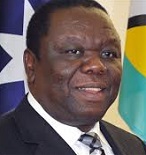
Let's start the Black Century with the Ultimate White Handouts? On Feb. 15, 2000 crocodile-like Zimbabwe dictator-pres. (since Dec. 22, 1987) Robert Gabriel Mugape, er, Mugabe (1924-), who claims he was told as a child that God picked him to be a great leader holds a referendum on a draft constitution to increase his power and give his govt. a mandate to seize white-owned land without compensation; since whites number only about 70K out of a total pop. of 12.5M, yet dominate the nation's agriculture, this vote is a no-brainer, but Mugabe's opponents win nearly 55% of the vote; on June 25 Mugabe wins a narrow V in the pres. election, and the opposition Movement for Dem. Change (MDC) wins 25 seats in parliament to Mugabe's 62, despite his strong-arm tactics; mandate or not, Mugabe begins seizing white-owned farms and giving them to black political allies with no background in farming, causing the entire country's farming economy to collapse and the country, once Africa's breadbasket, to begin starving and need handouts, which is compounded by the U.S. Zimbabwe Democracy and Economic Recovery Act of 2001 (Dec. 21, 2001), which enacts a credit freeze, reducing the country's trade surplus from $322M in 2001 to -$18M in 2002, with inflation reaching 12,875% in 2007; meanwhile anybody who tries to protest is savagely beaten, incl. chief opposition leader Morgan Richard Tsvangirai (1952-), who ends up with a fractured skull; the other African leaders keep a code of silence about the Mugging Ape's regime, and by 2013 all white-owned farms in Zimbabwe are kaput, but the country's large reserves of platinum and uranium along with the Marange Diamond Field (largest in the world) help stay Mugabe in power.
On Mar. 17, 2000 over 500 members of the Movement for the Restoration of the Ten Commandments, a local religious cult founded by Joseph Kibwetere (Kibweteere) (b. 1932) are burnt to death in a church in Kanungu, Uganda (200 mi. SW of Kampala); hundreds more corpses are discovered later, and by late Mar. the body count reaches 914, becoming the largest religious mass suicide-murder since the 1978 Jonestown Massacre in Guyana.

On Mar. 23, 2000 Pasteur Bizimungu resigns, and on Mar. 24 vice-pres. Paul Kagame (1957) becomes pres. #6 of Rwanda (until ?), the first Tutsi pres.

In Apr. 2000 rebel RUF forces in Sierra Leone under Foday Saybana Sankoh (1937-2003) refuse to demobilize, and kill seven Zambian and Kenyan U.N. peacekeepers on May 3, then take 500 more hostage on May 6; on May 8 demonstrators attack Sankoh's compound in Freetown, losing 19 but causing him to flee, and on May 17 he is ratted out while hiding in his abandoned house, shot in the leg and handed over to the govt.
In June 2000 the World Bank agrees to loan Chad $200M to build a $3.7B oil pipeline to Cameroon, to be paid by estimated oil revenues of $80M a year over the next 30 years; to quiet fears of you know what, the World Bank forces Chad to agree to spend 80% of the revenues on social services, becoming a world first; too bad, by 2005 Transparency Internat. lists Hanging Chad as the world's most corrupt country, and in 2006 dictator Idriss Deby proves it by reneging on his deal and using the money to finance his military to keep his grip, causing the loan to be suspended and Chad's bank accounts to be frozen.
In June 2000 the Cotonou Agreement is signed in Cotonou, Benin, replacing the Lome IV Convention of 1989-99, and set to run for 20 years as the cornerstone of European trade with the 71 developing ACP (African, Caribbean, and Pacific) nations.


In July 2000 voters in Ivory Coast overwhelmingly approve a draft constitution, which permits only those of "pure Ivoirian" stock (99-44/100 pure?) to run for pres., excluding 40% of the pop., who are illegal immigrants, mainly Muslims from Burkina Faso; in Oct. dictator Gen. Robert Guei is defeated by civilian opposition leader (non-Muslim) Laurent Gbagbo (1945-), but both claim a V, causing a popular rising which causes Guei to flee the country, and on Oct. 26 Gbagbo becomes pres. (until Apr. 11, 2011), although supporters of another opposition leader Alassane Dramane Ouattara (1942-) (a Muslim whose parents illegally immigrated from Burkina Faso) are angry because he was exluded from the election for not having pure Ivory blood, and after bloody protests he is finally granted full citizenship in June, 2002.

In Aug. 2000 exiled minister Abdulkassim Salat Hassan (1941-) is elected pres. of Somalia in a peace conference in Djibouti; he returns to Mogadishu in Oct., but Mohammad Farah Aidid's son Hussein doesn't recognize his election, and his power is limited to the city.

On Jan. 16, 2001 Dem. Repub. of Congo (DRC) pres. (since May 17, 1997) Laurent-Desire Kabila (b. 1939) is assassinated by one of his bodyguards, who is suspected of working for Rwanda, and is succeeded on Jan. 17 by his son Joseph Kabila Kabange (1971-) (until Jan. 24, 2019), becoming the first dem.-elected pres. of Congo; in 2011 he is elected for a 2nd term.
On Apr. 11, 2001 Ellis Park Stadium Disaster in Johannesburg, South Africa sees fans of the Kaizer Chiefs and Orlando Pirates stampede, killing 43.
On May 26, 2001 the Africa Union (AU) is founded in Addis Ababa to replace the Org. of African Unity (OAU) (founded on May 25, 1963), growing to 54 members, every African country except Morocco.
On Oct. 2, 2001 at the Labour Party Conference, British PM Tony Blair utters the soundbyte: "The state of Africa is a scar on the conscience of the world"; meanwhile the African Economic Miracle begins, with GDP growing at 4.9%/year, reaching $1.6T in 2008.

On Jan. 2, 2002 Levy Patrick Mwanawasa (1948-2008), hand-picked successor of Frederick Chiluba is sworn-in as pres. #3 of Zambia (until Aug. 19, 2008) among allegations of fraud, but in June he accuses his former boss of stealing millions while in office, and gets him arrested and charged next Feb.; meanwhile, despite looming famine he refuses to accept food donations, calling them "poison" - me wanna watch ya white honkeys?

On June 8, 2002 after winning elections handily, Amadou Toumani Toure (Touré) (1948-) becomes pres. of Mali (until Mar. 22, 2012).
On July 9, 2002 the African Union (AU) (UA) is established as a successor to the Org. of African Unity (OAU), with 53 African member states incl. Libya; the HQ is in Addis Ababa, Ethiopia.

On Dec. 30, 2002 after a landslide V (62%), former vice-pres. (1978-88) Mwai Kibaki (Emilio Stanley) (1931-), 1991 founder of the Dem. Party (DP), who affiliated with several other parties to form the Nat. Alliance Party of Kenya (NAK), then allies that with the Liberal Dem. Party (DP) to form the Nat. Rainbow Coalition (NARC) becomes pres. #3 of Kenya (until Apr. 9, 2013).
In 2002 the militant Islamist group Boko Haram (Secular Learning is Haram) is founded in NE Nigeria, spreading to Chad, Niger, and N Cameroon; in July 2009 an uprising kills its leader and imprisons its members, until they break out in Sept. 2010, progressing to suicide bombings of govt. bldgs., causing a state of emergency to be declared by Nigeria in 2012; in Mar. 2015 it pledges allegiance to ISIS, going on to kill 20K and displace 2.3M from their homes, incl. 250K who flee into Cameroon, Chad, or Niger.
In Feb. 2003 Gen. Omar al-Bashir and his Arab Muslim Janjaweed (Arab. "horse genies", "evil horsemen") militia begin a campaign of ethnic and religious persecution in drought-stricken Darfur in W Sudan, burning down villages, killing 180K (mostly Christians), and driving 2M from their homes within a few years; within three years they kill 300K and drive 2.5M from their homes into Chad and Central African Repub.

On Mar. 5, 2003 Nigerian opposition All Nigeria People's Party leader Marshal Sokari Harry is assassinated in Abuja.
On Jan. 25, 2003 a French-brokered peace in Ivory Coast is signed, calling for the govt. of pres. Laurent Gbagbo to share power with pro-Guei rebels, with Seydou Diarrhea, er, Diarra as PM; too bad, Gbagbo reneges, and riots begin in the capital Yamoussoukro, causing a ceasefire to be signed on May 3 and another peace to be declared on July 4, supported by 4K U.N. peacekeeper troops; the rebels continue to hold the N half of the country.
On Apr. 19, 2003 Nigerian pres. #12 (since May 29, 1999) Olusegun Obasanjo wins a new term in an election opponents denounce as fraudulent; he stays in office until May 29, 2007.

In Apr. 2003 Hutu Domitien Ndayizeye (1953-) becomes pres. of Burundi (until 2005).
On May 26, 2003 93% of Rwandans vote to approve a new 2003 Rwandan Constitution giving Hutus and Tutsis a balance of power, with neither allowed to hold more than half the seats in parliament, and the incitement of ethnic hatred outlawed; on Aug. 26 pres. elections give pres. Paul Kagame a landslide V.

On June 1, 2003 Shukri Mohammed Ghanem (1942-), former research dir. of OPEC becomes PM of Libya (until Mar. 1, 2006), going on to utter the soundbyte on Sept. 16, 2004 that Israel is "a mistake in the political geography", and that U.S. military intervention in Iraq has "fed extremists and fundamentalists and results in the dissemination of violence" because "it is necessary to deal with oil-producing areas and the areas of pipelines as sacred places".

On June 9, 2003 French helis rescue more than 500 Americans and others as rebels bear down on the capital of Liberia, cornering warlord-pres. (since Aug. 2, 1997) Charles McArthur Ghankay Taylor (1948-) in Monrovia as U.S. Navy warships hover off the coast and Pres. Bush urges him to step down. On July 6 Liberian pres. and super-thief Charles Taylor (1942-), who bled his country of its treasure accepts an asylum offer from Nigeria after a U.N. tribunal indicts him for crimes against humanity; on Aug. 10 he delivers his farewell address to a nation bloodied by 14 years of war, having no running water or electricity while he looted it blind, then absconds to live a life of ease in nearby Nigeria; in Mar. 27 2006 he vanishes from Nigeria just after it agrees to transfer him to a war crimes tribunal, and is captured and put on trial in The Hague, after which he claims that he wants to convert to Judaism, pissing-off Jews, who don't want him.
On July 8, 2003 Pres. George W. Bush begins a 5-nation tour of Africa in Senegal, where he calls U.S. slavery one of history's greatest crimes while standing on the location of an old slave auction; on July 12 he wraps-up his tour of Africa, saying that he will not allow terrorists to use the continent as a base "to threaten the world".
On July 28, 2003 rebels in Liberia capture Buchanan, its second-largest city.
On Oct. 5, 2003 Italian nun ("the Mother Teresa of Africa") Annalena Tonnelli is murdered in Borama, Somaliland by radical Muslims, who go on to persecute and brutally murder Christians unchecked (until ?).
In 2004 the 2004 African Locust Infestation ravages crops across the N third of Africa, leaving millions at risk of starvation; in 2006 another swarm 3 sq. mi. in area as it moves across Mauritania; meanwhile a drought in Niger combined with desert locust damage destroys the fall crop, leaving 3.6M short of food, causing a food crisis in 2005-6.
On Feb. 27, 2004 the U.N. Security Council votes 15-0-0 to adopt Resolution 1528 to create the U.N. Operation in Cote d'Ivoire (Opération des Nations Unies en Côte d'Ivoire) (ONUC), to take over from the MINUCI on Apr. 4 (ends ?); by Mar. 31, 2017 it comprises 17 uniformed and 689 civilian personnel.

On Aug. 25, 2004 Sir Mark Thatcher (1953-), son of former British PM Margaret Thatcher is arrested in South Africa for violating the country's anti-mercenary laws after he allegedly paid to charter an Alouette III heli to be used in a takeover attempt of oil-rich Equatorial Guinea, where Pres. Teodoro Obiang Nguema has ruled for 24 years; on Jan. 13 he pleads guilty in exchange for a suspended jail sentence.
On Sept. 9, 2004 the Bush admin. for the first time calls attacks in W Sudan's Darfur region by govt.-backed Arab Janjaweed Muslim militia against black non-Muslim Africans "genocide"; by now tens of thousands have been killed, and 1.2M uprooted; too bad, the U.N. fails to accept the call of genocide, claiming the leaders have no genocidal intent, and therefore the U.N. law against genocide doesn't apply.
In Oct. 2004 warlords and civilian leaders in Somalia agree on a new govt.
In Oct. 2004 an outbreak of Ebola-like Marbug virus begins in Angola, infecting 214 and killing 194 by Apr. 2005, when the outbreak is finally recognized among the numerous early deaths from infectious diseases (one in four dies before age five).
On Nov. 4, 2004 military hardliners in top cocoa producer Ivory Coast (two bar soap brand names?) break a ceasefire and launch surprise air strikes against rebel positions in an effort to retake the N part of the country held by Muslim rebels since 2002; on Nov. 6 French troops clash with soldiers and angry mobs in Abidjan after Ivory Coast warplanes kill at least nine French peacekeepers and a U.S. civilian in an air strike, and, although govt. officials call it an accident, on Nov. 7 France responds with overwhelming military force, destroying two Soviet-made Sukhoi jets used in the bombing, plus at least three heli gunships; the 6K-man U.N. peacekeeping force there incl. 4K French troops; the French declare that new Ivory Coast pres. (2000-11) Laurent Koudou Gbagbo (1945-) will be "held personally responsible by the international community for the public order in Abidjan", and order an evacuation; on Nov. 14 African leaders meeting in Abuja, Nigeria back an arms embargo.
On Dec. 1, 2004 World AIDS Day laments that 39.4M people now have it, two-thirds of them in black Africa, starting with 5.3M in South Africa, then continuing N, 1.8M in Zimbabwe, 1.2M in Kenya, 1.1M in Congo, 1.5M in Ethiopia, peaking at 3.6M in Nigeria, then suddenly ending with the N border states of Gambia, Senegal, Mauritania, Morocco, Algeria, Tunisia, Libya, and Egypt, none of which have more than 15K; the Bush admin. goes ahead with its June, 2002 $500M plan to push the AIDS drug nevirapine for pregnant women across Africa, despite Health & Human Services Dept. warnings that NIH research on the drug is flawed, and that it might threaten newborns with severe reactions incl. death.



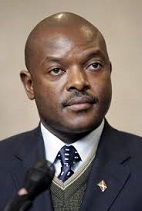

In 2005 Horn of Africa pirates begin raking in $50M a year (until ?), using it to finance global criminal operations. On Feb. 5 Gnassingbe Eyadema dies after 38 years in office, and on Feb. 25 his son Faure Essozimma Gnassingbe (Gnassingbé) (1966-) becomes pres. of Togo, but resigns on Feb. 25 after pressure by the U.S., U.N., and West African leaders, along with an arms embargo imposed by the Economic Community of West African States; too bad, an election on Apr. 24 puts him back in office on May 4 (until ?), despite the opposition claiming fraud. On Feb. 26 gunmen kill nine U.N. Bangladeshi peacekeeping troops in a grass ambush in NE Congo near the town of Kafe 20 mi. NW of Bunia. In Apr the World Bank Food Programme approves a $3.8B loan for hungry Zambia, and announces that it will stop food aid shipments to China at the end of the year; China becomes the world's 3rd largest food aid donor by 2009. In May another peace is signed in 99-44/100 pure Ivory Coast, and elections are scheduled for Oct., but they are cancelled after the U.N. declares it impossible to stop the fighting, and the U.N. Security Council recommends that pres. Laurent Gbagbo remain in office for another year while turning over most of his power to new transitional PM Charles Konan Banny (1942-), gov. of the West African Central Bank, who becomes PM on Dec. 7 (until Apr. 7, 2007). On June 26 after help from the Imbonerakure thug youth wing, elections in Burundi are a V for pres. Pierre Nkurunziza. On Aug. 3 Mauritanian pres. (since Dec. 12, 1984) Maaoya Sid'Ahmed Ould Taya is overthrown by a military junta while he is visiting nearby Niger after attending King Fahd's funeral; nat. police chief Col. Ely Ould Mohammed Vall (1953-) is named the new transitional military leader (until Apr. 19, 2007). On Aug. 9 Niger's pres. Mamadou Tandja claims that people in his country "look well fed" despite TV images of starving children, and that the locust invasion of the year before and poor rains are not unusual for his country. On Aug. 26 after being elected unopposed by parliament, Christian Pierre Nkurunziza (1963-) becomes pres. of Burundi (until ?); on Aug. 26, 2010 he is reelected for a 2nd term with 91% of the vote; in Mar. 2014 he bans Sat. morning jogging due to "fears it was being used as a cover for subversion", as militants in Bujumbura have been doing for years, sentencing 21 members of the Movement of Solidarity and Democracy Party (MSD) to life in prison for it. On Dec. 21 minister #11 of foreign affairs (1995-2005) (Julius Nyerere protege) Jakaya Mrisho Kikwete (1951-) becomes pres. #4 of Tanzania (until Nov. 5, 2015). On Dec. 30 Egyptian riot police kill 23 unarmed Sudanese migrants in a public park in Cairo that they had occupied for 3 mo. in an effort to pressure U.N. officials into relocating them.
On Feb. 8, 2006 the World Org. for Animal Health reports that H5N1 bird flu virus has been detected for the first time in Africa, in a commercial chicken farm in Nigeria.
On Apr. 13, 2006 the govt. of Chad fights off an onslaught of rebels from Darfur arriving in N'Djamena after traveling W 600 mi. in pickup trucks; oOn Apr. 14 350 are killed in a failed coup in N'Djamena, Chad; 271 rebels are captured, and 250 are paraded through the streets on Apr. 15, while Chad's Pres. Idriss Deby breaks off relations with Sudan and threatens to expel 200K Darfur refugees, calling the rebels Sudanese mercenaries.
On Apr. 14-16, 2006 Christian-Muslim violence in Alexandria, Egypt is touched off by knife attacks at three Coptic Christian churches which kill one and injure 16; on Apr. 16 one Muslim man dies.
On Apr. 28, 2006 five members of the U.S. Congress incl. Sheila Jackson Lee (D-Tex.), Tom Lantos (D-Calif.), James McGovern (D-Mass.), John Oliver (D-Mass.), and Jim Moran (D-Va.) are arrested and led away in plastic handcuffs from the Sudanese Embassy in Washington, D.C. in protest of govt. atrocities in the Darfur region, along with six others; on Apr. 30 thousands attend a D.C. rally urging the U.S. govt. to end genocide in Sudan.
On May 8, 2006 South African deputy pres. Jacob Zuma (1942-) is acquitted of the rape of a 31-y.-o. HIV-positive AIDS activist last Nov., the judge saying she made a false rape claim and that the sex was consensual; Zuma once headed South Africa's campaign against AIDS, yet had unprotected sex with her?; his political career salvaged, he goes on to become pres. in 2009.
On May 12, 2006 a gasoline pipeline in Ilado, Nigeria (30 mi. E of Lagos) explodes as villagers scavenge for fuel, killing 200; 1K+ have died in recent years from the same thing?
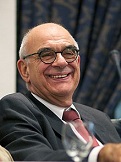
On Oct. 22, 2006 Sudan orders Johannes Pieter "Jan" Pronk (1940-) of Holland, the top U.N. official there (since 2004) to leave after he accuses the army of mobilizing Arab militias on Oct. 14.
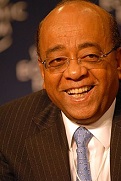
On Oct. 26, 2006 after selling Celtel (which sold 24M mobile phone subscriptions in 14 African countries) for $3.4B in 2005, 60-y.-o. Sudanese-born cell phone billionaire Mohammed "Mo" Ibraham (1946-) announces the creation of the Mo Abrahim Prize for Achievement in African Leadership ($5M upfront followed by $200K/year for life) for the sub-Saharan African pres. showing the greatest commitment to good governance.
In 2006 the militant Islamist group Al Shabaab (Mujahideen Youth Movement) is founded in East Africa, pledging allegiance to Al-Qaida in 2012 before breaking with them, reaching 7K-9K soldiers in 2014.
On Feb. 21, 2007 Zimbabwe dictator Robert Mugabe celebrates his 83rd birthday in a country whose inflation rate reached 1,593% in Jan., all his fault since he froze wages and prices decades ago; the largest banknote allowed in the country is a 1K denomination, which buys one tomato.
On May 5, 2007 a Kenya Airlines Flight 507 (Boeing 737-800) en route from Douala to Nairobi crashes on the outskirts of Douala, Cameroon 12 min. after takeoff, killing all 114 aboard.
On May 29, 2007 Pres. Bush orders new U.S. economic sanctions to pressure the govt. fo Sudan to halt bloodshed in Darfur, promising that the U.S. "will not avert our eyes from a crisis that challenges the conscience of the world".

On May 29, 2007 Nigerian pres. (since 1999) Olusegun Obasanjo (a Christian from the S), who asked lawmakers to change the constitution to allow him to seek a 3rd term in a country of 130M people split into 250 ethnic groups which is also Africa's biggest oil producer is succeeded by Sunni Muslim Umaru Musa Yar'Adua (1951-2010) as pres. #2 of Nigeria's Fourth Repub. (until May 5, 2010).
On June 11, 2007 French foreign minister Bernard Kouchner announces that the pres. of Sudan has agreed to a hybrid U.N.-African Union peacekeeping force of 20K to stop the bloodshed in Darfur, but is adamant that all of the troops must be African; on June 17 the British ambassador to the U.N. announces that an agreement has been reached, with the commander to be African.
On July 31, 2007 the U.N. Security Council votes 15-0-0 to adopt Resolution 1769, establishing the U.N.-African Union Mission in Darfur (ends ?), which grows to 26K personnel with a budget of $106M/mo. by 2008 after it begins deployment in Oct.; by June 30, 2013 it has 19,735 personnel; by June 20, 2017 it loses 250 personnel KIA.
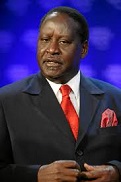
On Jan. 1, 2008 Kenya starts the year out wrong with violent protests over the results of the Dec. 27 election that returned pres. Mwai Kibaki to power for another five years, which his Christian opponent Raila Amolo Odinga (1945-) claims is a rigged election; on Jan. 7 the two rivals agree to end their dispute after 486 are killed and 250K are made homeless, fleeing their homes in the Rift Valley; too bad, the protesters don't go along with them, and protests continue until Jan. 19, when opposition leaders decide to switch to a boycott, after which backroom negotiations by Madeleine Albright result in Kibaki appointing Odinga as PM on Apr. 17 (until Apr. 9, 2013).
On Jan. 22, 2008 officials of the Dem. Repub. of Congo sign an agreement with rebels to end the decade-long insurgency (begun 1996) that displaced 400K from their homes.
Hanging Chad? On Feb. 2, 2008 rebels invade N'Djamena, hanging capital of Chad after a 3-day advance across the desert, causing pres. Idriss Deby to hole-up in the pres. palace until Feb. 9, when a ceasefire is reached; meanwhile 500 French nationals are evacuated; Chad is a refuge for 250K Darfur refugees (out of 200K killed) from the horrible janjaweed militas, and a rebel takeover threatens them as well as humanitarian groups trying to help them; meanwhile in the W Kenyan town of Eldoret, rival ethnic groups hunt each other through the streets; on Feb. 10 the Sudanese air force strikes rebels in Darfur, causing 12K "destitute and terrified" refugees to pour into Chad, which accuses Sudan's pres. Omar al-Bashir of putting the rebels up to the N'Djamena attack in order to stop planned deployment of a Euro peacekeeper force in the border region.

On Mar. 29, 2008 elections are held in Zimbabwe, and on Mar. 30 dictator (since 1980) Robert Mugabe summons his security apparatus leaders and informs them that he plans to publicly concede the next day to opponent Morgan Richard Tsvangirai (1952-2018) of the Movement for a Dem. Change of a V, but military chief gen. Constantine Chiwenga talks him out of it and promises military support backed by the ruling Zimbabwe African Nat. Union-Patriotic Front; on Mar. 31 it's April Fool's Day in Zimbabwe as opposition foes of touring-facilities-and-picking-up-slack dictator Robert Mugabe claim a V in the Mar. 29 election, only to see official election returns slowly trickle in after Mugabe's Wiki is used to edit them; on Apr. 7 after the election results are still not pub., Mugabe forces several white ranchers and farmers off their land in an effort at a diversion; on Apr. 8 Operation CIBD (Coercion, Intimidation, Beating and Displacement) is implemented; on Apr. 23 as the coverup continues, Mugabe's party offers to form a govt. of nat. unity with Mugabe as pres.; after more violence, Tsvangirai, who is holed-up in the Dutch Embassy drops out on June 22, and on June 27 a rigged runoff election gives Mugabe a V, and on June 29 he is sworn-in for another term wile his country remains a starving hyperinflationary terrorized shithole, with 80 opposition supporters killed, hundreds missing, thousands injured, and hundreds of thousands homeless; meanwhile the U.N. lamely ponders sanctions.
On Apr. 15, 2008 a dorm fire in Kampala, Uganda kills 21 children.
On Apr. 15, 2008 a Hewa Bora plane crashes in E Congo, killing 44 and injuring 146 after plowing into a market area in Kinsasha; all 79 passengers and six crew survive.

On Sept. 25, 2008 after Thabo Mbeki is ousted over the weekend, Kgalema Petrus Motlanthe (1949-) is sworn-in as pres. of South Africa (until May 9, 2009) after being elected by a secret parliamentary ballot, being expected to hold the position for ANC leader Jacob Zuma when a new parliament is elected next year.
On Oct. 28, 2008 Congolese rebels under gen. Laurent Nkunda break a Jan. U.N.-brokered ceasefire and advance toward Goma, sending tens of thousands fleeing, firing on civilians.
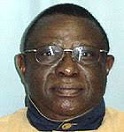
On Dec. 18, 2008 Col. Theoneste (Théoneste) Bagosora (1941-), ringleader of the 1994 Rwanda genocide is sentenced to life in prison for the massacre of 800K, becoming the highest-ranking officer convicted by the U.N. Internat. Criminal Tribunal for Rwanda.
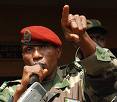
On Dec. 22, 2008 Guinea pres. (since 1984) Lansana Conte (b. 1934) dies, and on Dec. 23 after drawing lots twice with two other soldiers, Capt. Moussa Dadis Camara (1964-) seizes power in the bauxite-exporting electricity-lacking France-hating Repub. of Guinea, becoming de facto pres. (until ?), ruling from military camps instead of govt. bldgs., deflating any hopes that he will bring democracy to this African stinkhole by massacring 157 on Oct. 1, 2009. On Dec. 24 Bishop Desmond Tuto says that it's time to threaten Zimbabwean pres. Robert Mugabe with removal by force, citing his misrule and the death of 1.1K from a cholera epidemic; meanwhile Mugabe brings human rights activist Jestina Mukoko to trial for plotting his overthrow.
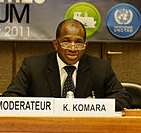
On Dec. 30, 2008 Kabine (Kabiné) Komara (1950-) becomes PM of Guinea (until Jan. 26, 2010).

On Jan. 7, 2009 John Evans Fiifi Atta Mills (1944-2012) becomes pres. of Ghana (until July 24, 2012).

On Mar. 14, 2009 former DJ Andry Nirina Rajoelina (1974-), head of the opposition emerges from two weeks of hiding and on Mar. 17 declares himself pres. of Madagascar (until Jan. 25, 2014), but pres. Marc Ravalomanana refuses to quit.

On Apr. 22, 2009 elections in South Africa (4th since the 1994 transition to black majority rule) give a V to the African Nat. Congress (ANC); despite corruption investigations and a rape acquittal, Zulu-born ANC pres. (since Dec. 18, 2007) Jacob Gedleyihlekisa Zuma (1942-) becomes pres. #4 of South Africa, and is sworn in on May 9 (until Feb. 14, 2018); which of his six wives will be first lady?
On July 10, 2009 Pres. Obama visits the Vatican, discussing abortion and stem cell research with Pope Benedict XVI, promising to try to reduce the number of abortions in the U.S.; on July 11 he visits Ghana, where he is treated like a god and rock star, visiting the infamous Door of No Return at Cape Coast Castle, comparing it to Buchenwald Nazi concentration camp, and uttering the soundbytes: "We must start from the simple premise that Africa's future is up to Africans", "The West is not responsible for the destruction of the Zimbabwean economy over the last decade, or wars in which children are enlisted as combatants", and "No country is going to create wealth if its leaders exploit the economy to enrich themselves, or police can be bought by drug traffickers", adding "These things can only be done if you take responsibility for your future... But I can promise you this: America will be with you every step of the way, as a partner, as a friend"; too bad, Nigeria feels snubbed.

On Aug. 5, 2009 after resigning in Apr. to hold elections on June 6, Gen. Mohamed Ould Abdel Aziz (1956-) becomes pres. of Mauritania (until ?).
On Aug. 6, 2009 on an 11-day tour of seven countries in Africa, U.S. secy. of state Hillary Clinton speaks in Kenya, saying that it is a "great regret" that the U.S. is not a member of the Internat. Criminal Court that tries people for genocide and crimes against humanity - if it joined then every U.S. politician back to George Washington would be indicted?
On Aug. 25, 2009 Rodolphe Adada of the Repub. of the Congo, head of the U.N.-African Union peacekeeping mission in Darfur resigns.
On Sept. 18, 2009 suicide bombers from the Islamic Al-Shabaab insurgent group in cars with U.N. logos kill 11 at the main base of African Union peacekeepers in Mogadishu, Somalia in revenge for a U.S. raid that killed al-Qaida leader Saleh Ali Saleh Nabhan in S Somalia on Sept. 14.

On Sept. 23, 2009 after being forced to live in a Bedouin tent on an estate owned by Donald Trump 40 mi. from the U.N. HQ, Libyan dictator (since Sept. 1, 1969) Col. Madman Daffy, er, Muammar Gaddafi (1942-2011) ignores the 15-min. limit to deliver a 100-min. speech to the U.N. Gen. Assembly, his first since 1969, forcing British PM Gordon Brown and other political leaders to wait while he rants and raves, calling the U.N. Security Council the "terror council", blasting the U.N. for failing to stop 65 wars since 1945, and praising "our Obama" while calling for a U.N. inquiry into the assassination of JFK; "After this speech, we will no longer have to obey the resolutions of the Security Council... Either we will continue to work together, or we will split into two camps: equitable united nations with their Security Council, and great powers with their Security Council and the right of veto that they use each other against a friend."
In Sept. 2009 after the worst crisis since independence, with inflation since 2008 at 231M%, the Govt. of Nat. Unity ie established in Zimbabwe, causing a quick turnaround of the economy; on Oct. 16 Zimbabwe PM Morgan Tsvangirai suddenly abandons shared rule with pres. Robert Mugabe, citing "persecution" of a top aide; too bad, after four years the Unity Govt is abandoned.
On Nov. 2-3, 2009 Hillary Clinton attends a forum with Arab leaders in Morocco, praising it as a model for dem. reform, while they diss the U.S. for backing down on the settlement freeze in Israel.
On Feb. 16, 2010 the Convention on Cluster Munitions is ratified by Burkina Faso and Moldavia, reaching 30 ratifications and making it internat. law effective Aug. 1.
On Mar. 7, 2010 Muslim herders attack three predominantly Christian settlements near Jos, Nigeria, killing several hundred; on Mar. 29 Muammar Gaddafi of Libya utters the soundbyte that Nigeria should be divided into separate Christian and Muslim states, causing Nigeria to recall its ambassador to Tripoli.
On Apr. 11-16, 2010 elections in Sudan are the first since the 1989 Omar El-Bashir coup give him 88%+ of the vote; former U.S. pres. Jimmy Carter stinks himself up by calling them fair.
On Apr. 17, 2010 Libyan dictator Muammar Gaddafi praises Pres. Obama, saying "He is someone I consider a friend. He knows he is a son of Africa. Regardless of his African belonging, he is of Arab Sudanese descent, or of Muslim descent. He is a man whose policy should be supported, and he should be assisted in implementing it in any way possible, since he is now leaning towards peace."

On May 5, 2010 Christian zoologist Goodluck Ebele Jonathan (1957-) becomes pres. #14 of Nigeria (until May 29, 2015).
In May 2010 a pressure group arranges a release ceremony for 7K slaves in Niger; too bad, after the govt. warns that anybody admitting to being a slavemaster will be prosecuted, the ceremony is scrapped.
On June 4, 2010 African Union peacekeepers and Somalian govt. forces launch attacks against Islamic insurgent strongholds in N Mogadishu, Somalia, killing 17+ and wounding 61+ civilians.
On Oct. 1, 2010 two car bombs explode in Abuja, Nigeria on its 50th independence anniv., killing seven.
On Dec. 2, 2010 Calestous Juma of Harvard U. pub. an article claiming that Africa can feed itself in a generation.
On Dec. 17, 2010 the Jasmine Rev. in Tunisia begins when univ. graduate street peddler Mohamed Bouazizi sets himself on fire in Sidi Bouzid, Tunisia to protest police confiscating his fruits and vegetables, and a policewoman slapping him, triggering demonstrations; he dies on Jan. 4; on Jan. 7 the U.S. summons its ambassador to express concerns about continuing protexts; the Twitter-driven Arab Spring begins in Tunisia, spreading to Egypt, Libya, Algeria, Jordan, Morocco, Iraq, Kuwait, Yemen, Bahrain, Sudan, and Syria, with minor protests in Palestine, Oman, Mauritania, Saudi Arabia, Djibouti, Western Sahara, and Mali.

On Jan. 12, 2011 continued deadly protests in Tunisia kill 10, causing the U.N. to call for a probe into the police; on Jan. 13 Tunisian army CIC Gen. Rachid Ammar (1947-), splits with dictator Zine El Abidine Ben Ali and refuses to shoot protesters; on Jan. 14 Ben Ali flees to Saudi Arabia after an army coup, and the foreign minister takes power; some of Ben Ali's relatives take refuge in the Disneyland Hotel in Paris; on Jan. 16 Syrian pres. Bashar al-Assad holds a security meeting over concerns of a copycat uprising; on Jan. 17 amid protests Tunisia announces a new govt. that is open to opposition parties; on Jan. 26 Tunisia issues an internat. arrest warrant for Ben Ali and six relatives for taking money out of the country illegally; on Feb. 13 Italy intercepts 1K Tunisian illegal immigrants and announces a plan to deploy more security forces; on Mar. 7 Beji Caid el Sebsi heads the 3rd govt. since Ben Ali's overthrow; in June Ben Ali is convicted in absentia along with his wife for embezzlement, and sentenced to 35 years in prison and fined $64M; on July 4 Ben Ali is convicted of smuggling and sentenced to 15 years and fined $72K.
On Jan. 24, 2011 machete-wilding Islamic attackers kill six in two Christian villages in C Nigeria, in retaliation for a New Year's attack on a van full of Muslims that killed eight.

On Jan. 25, 2011 (Egyptian Nat. Police Day) the 2011 Egyptian (Papyrus) Rev. in Tahrir (Liberation) Square in Cairo begins with Tunisian-copycat violent demonstrations against the govt. of pres. Hosni Mubarak, sparked by a video blog by activist Asmaa Mahfouz (1985-); they are followed by calls for a 2-day nat. strike; Coptic pope Shenouda III orders Copts to not participate for fear of a Muslim Brotherhood takeover; on Jan. 25 Mubarak's son and heir Gamal Mubarak flees to Britain with his family; on Jan. 26 IAEA dir.-gen. (1997-2009) (mistruster of the U.S., accused of pro-Iranian ties) (Gandhi lookalike?) Mohamed ElBaradei (1942-) returns to Egypt, expecting to lead the protesters; on Jan. 27 the Egyptian stock exchange plunges 6.35% in 15 min., causing trading to halt and the Egyptian govt. to cut off Internet access (first time in Internet history?) (restored on Feb. 2); on Jan. 27-28 U.S. homeland security secy. Janet Napolitano secretly meets with Muslim, Arab, and Sikh "community leaders, incl. three orgs. associated with the Muslim Brotherhood; on Jan. 28 after several vehicles are stolen from the locked-down U.S. embassy in Cairo and used to run people over, fanning riots, the Egyptian military deploys in Cairo under curfew, killing Egyptian protester Sally Zahran (b. 1987-), causing NASA to name a spaceship after her; police use U.S.-made tear gas canisters; after police use rubber bullets and pellet guns on the protesters, 3.8K suffer serious eye injuries, and 1.5K lose one eye; on Jan. 28 Mubarak dismisses his govt., then names a new one on Jan. 29, causing U.S. stocks to take a dip on Jan. 28; on Jan. 29 mobs ignore curfew and set fire to Mubarak's ruling party HQ and state security bldgs., confronting the military, with a Tiananmen Square deja vu moment; Mubarak's wife Suzanne and sons Alaa and Gamal flee to London, while Israel severs diplomatic relations and flies out 200 members of Israeli diplomatic families, and several Arab nations do ditto; on Jan. 29 (Day 5) after giving the order for police to fire on crowds, only to see troops switch sides to the protesters, Mubarak appoints his first-ever pres. and successor, intel head Omar Suleiman (known for orchestrating the brutal interrogation of terror suspects abducted by the CIA, then passing intel info. to the U.S.), passing over his groomed son Gamal Mubarak, and appoints Ahmad Nazif as PM, while IAEA dir. gen. Mohamed ElBaradai announces that "the state of Egypt is in a state of collapse", calling upon the Egyptian army "to take the side of the people" and for Mubarak to step down; on Jan. 29 an escape attempt at Abu Zaabal Prison in Cairo results in eight killed and 123 wounded; on Jan. 29 an assassination attempt is made on Omar Suleiman, killing two bodyguards; on Jan. 28 White House press secy. Robert Gibbs calls for Egypt to turn the Internet and social media back on, after which Chip Reid of CBS asks him "why is the president not standing where you're standing right now?", after which Pres. Obama speaks from the White House State dining room, revelaing that he spoke with Mubarak and told him that "he has a responsibility to give meaning" to the words of his recent speech, and calling on the Egyptian govt. to "refrain from any violence on peaceful protesters"; on Jan. 28 Iranian Ayatollah Ahmad Khatami says that the U.S. dream of creating a new Middle East it dominates isn't coming true, and that a new Middle East based on Islamic principles is taking shape; on Jan. 28 after looters break into the King Tutankhamen collection and destroy two Pharonic mummies, the Egyptian army storms the Egyptian Nat. Museum at Tahrir Square in Cairo to protect it from looters, after which students form a human chain to help them as the army starts disappearing and anarchy reigns; on Jan. 28 leading Egyptian Islamic scholar Saeed Amer of Al Azhar says that protests that cause violence are forbidden (haram) in Islam; on Jan. 29 the Egyptian army surrounds the U.S. and U.K. embassies to prevent a repeat of 1979 Iran?; on Jan. 29 Saudi king Abdullah slams Egyptian protesters as "infiltrators", and says Mubarak "reassured" him about the situation, then begins opening his checkbook and spending $130B in his own country to forestall any Egypt-style revolt; on Jan. 30 the U.S. tells its citizens to leave Egypt as soon as possible, while the Egyptian govt. pulls the license for Al Jazeera Network, which had been broadcasting the protests lives on the Internet; on Jan. 30 U.S. secy. of state Hillary Clinton calls for the Egyptian govt. to conduct elections, while protesters in Alexandria begin shouting anti-U.S. and anti-Israel slogans, and armed gunmen from Hamas cross from Gaza into N Sinai to attack and push back Egyptian forces on orders of the Egyptian Muslim Brotherhood in order to open a new front against the Mubarak regime, causing Hamas to close the Rafah border crossing after Egyptian guards flee their posts; on Jan. 31 Cairo Airport is jammed with foreigners trying to escape, while Hillary Clinton convenes an unprecedented mass meeting of U.S. ambassadors from nearly all of its 260 embassies and other posts in 180 countries; on Jan. 31 Mubarak swears in a new cabinet, while Hamas shoots Grad rockets from Gaza to the S Israeli cities of Ofakim and Netivot, and a Qasam rocket to Eshkol, and Israeli security officials report that "something big" was smuggled from Egypt into the Gaza Strip; on Jan. 31 former U.S. ambassador to Egypt Frank Wisner holds a secret meeting in Cairo with senior Muslim Brotherhood leader Issam El-Erian; on Feb. 1 White House press secy. announces that the new Egyptian govt. must incl. a "whole host of important non-secular actors", becoming the first time that the U.S. govt. supports granting a govt. role to the Muslim Brotherhood, which wants to exterminate Israel, and calls for a referendum on the 1979 Israeli-Egyptian peace treaty; meanwhile the Egyptian Muslim Brotherhood waits in the wings for a possible Islamist takeover, with leader Mohamed Ghanem calling on Egypt to stop pumping gas to Israel and prepare for a war with it; polls show that only 27% of Egyptians support modernizers, while 59% support Islamists incl. Hamas and the Muslim Brotherhood, causing commentators to conclude that Egyptians want Mubarak ousted because of his non-belligerent stance toward Israel and U.S. ties; on Feb. 1 Pres. Obama's envoy Frank Wisner suggest to Mubarak not to run for reelection, which he accepts, insisting on stay in power until Sept. elections, while U.S. ambassador Margaret Scobey talks with Mohamed ElBaradei; Pres. Obama gives a news conference, calling for an "orderly transition" which "must begin now", saying that Mubarak "recognizes that the status quo is not sustainable and that a change must take place"; too bad, the protesters want Mubarak out immediately, and vow to stay in the streets until he goes; on Feb. 2 (Bloody Wed.) Mubarak and anti-Mubarak forces clash in Tahrir Square, with anti-Mubarak protesters claiming that some of the opposition protesters are security personnel dressed in civilian clothing, while others ride camels and horses and are armed with clubs, injuring 1.5K and killing three; CNN's Anderson Cooper gets caught in the middle of the protesters and punched 10x; four Israeli journalists are arrested in Cairo; on Feb. 2 ElBaradei orders Mubarak to leave Egypt by Feb. 5 (Fri.) or he'll be a "dead man walking", to which Mubarak replies "This dear country is my country... and I will die on its land"; on Feb. 2 Iranian spokesman Ramin Mehmanparast claims that the U.S. is trying "to prevent the tremendous movement of Egypt's magnanimous nation", calling the dispatch of Frank Wisner part of a scheme aimed at "devising deviatory plots"; on Feb. 3 ("Day of Departure") anti-govt. protesters take over the Oct. 6 Bridge, while chaos grips Cairo, causing the army to move in and the U.S. to recall envoy Frank Wisner, while Omar Suleiman invites the Egyptian Muslim Brotherhood to a nat. dialog, and the U.S. Senate unanimously approves a resolution calling on Mubarak to create a caretaker govt. but not step down; on Feb. 3 former Israeli cabinet minister Binyamin Ben-Eliezer says that the U.S. doesn't realize the catastrophe they're pushing the Middle East into because Mubarak kept the peace with Israel; on Feb. 3 Mubarak grants an exclusive interview with ABC-TV's Christiane Amanpour, telling her that he'd like to resign but can't because the country would plunge into chaos; on Feb. 4 (Departure Fri.) while journalists are being rounded up, beaten, and threatened, Pres. Obama gives a press conference on Egypt, saying that the "entire world is watching", that the U.S. can't decide Egypt's fate, that "suppression is not going to work", and Mubarak "cares about his country - he is proud, but he's also a patriot", and should be asking himself "How do I leave a legacy behind in which Egypt is able to get through this transformative period... and my hope is that he will end up making the right decision"; on Feb. 5 (a.m.) masked men attack the Israeli-Egyptian gas pipeline in El-Arish, Egypt in N Sinai, causing Israel to deploy military forces to demilitarized Sinai, and more on Feb. 16; on Feb. 5 Mubarak meets with his economic ministers in the hopes that curing the unemployment and food price problems might save him; on Feb. 5 France announces that it has suspended sales of arms and riot equipment to Egypt; on Feb. 6 Suleiman forms a constitutional reform committee with opposition groups incl. the liberal Wafd Party, the leftist Tagammu Party, and the Muslim Brotherhood, and agrees to end the 30-y.-o. emergency law, permit press freedom, and release those detained during the protests, with Hillary Clinton saying "Today we learned the Muslim Brotherhood decided to participate, which suggest they at least are now involved in the dialogue that we have encouraged", saying she would "wait and see"; meanwhile Mohamed ElBaradei slams the talks because he wasn't invited, and says they lack credibility; on Feb. 6 Jordanian prince El-Hassan bin Talaal urges that the Muslim Brotherhood not be excluded from a future Egyptian govt.; on Feb. 7 Human Rights Watch announces that 297 were killed during the protests; on Feb. 8 new crowds in Tahrir Square celebrating the release of Wael Ghonim incl. middle class protesters; on Feb. 8 Iranian defense minister Brig. Gen. Ahmad Vahidi claims that the Egyptian uprising is inspired by the 1979 Iranian Rev.; on Feb. 9 strikes erupt around the country, while Al-Qaeda in Iraq urges Egyptians to wage jihad and establish an Islamist govt.; on Feb. 10 Pres. Obama calls for an "orderly and genuine" transition to democracy, and claims that Mubarak will step down; on Feb. 10 Mubarak delivers an Address to the Egyptian People, saying he won't quit and needs to stay in power until the Sept. elections, causing pissing-off the crowd in Tahrir Square, who angrily wave their shoes at him, after which Pres. Obama questions whether his pledge to shift power to his vice-pres. is "immediate, meaningful or sufficient"; on Feb. 10 Iran puts opposition leader Mahdi Karroubi under arrest for asking permission to hold a rally on Feb. 14 in support of the uprisings; meanwhile rumors of the death of Saudi King Abdullah after a phone call with Pres. Obama in which he warned him not to humiliate Mubarak surface; on Feb. 11 (Day 18) after protesters move to the Ittihadiya pres. palace in the Cairo suburb of Heliopolis and threaten massive protests in Tahrir Square, more rumors surface that Mubarak and his family have fled Cairo for Sharm el-Sheikh, followed by an announcement that he has stepped down and transferred power to the military supreme council, with the soundbyte "In the name of Allah the Merciful, the Compassionate: Citizens, during these very difficult circumstances Egypt is going through, President Hosni Mubarak has decided to step down from the office of president of the republic and has charged the high council of the armed forces to administer the affairs of the country. May Allah help everybody"; Rachel Maddow of MSNBC calls it "a Berlin Wall moment"; vice-pres. Joe Biden calls it a "pivotal moment in history", adding "The United States has largely spoken with one voice"; before stepping down, Mubarak called former Israeli minister Benjamin Ben-Elizier and slammed the U.S., saying that the U.S. push for democracy will result in an Islamist takeover; on Feb. 11 Pres. Obama delivers a Speech on the Resignation of Mubarak, praising the protesters for changing "the arc of history" (from a quote by MLK Jr.), through non-violence not "terrorism and mindless killing", saying that by stepping down, Mubarak "responded to the people's hunger for change", but "this is not the end", adding "What is clear... is my elief that an orderly transition must be meaningful, it must be peaceful, and it must begin now"; Robert Gibbs resigns the same day, with Obama uttering the soundbyte that he's not the biggest resignation news of the day; Switzerland wastes no time in freezing Mubarak's assets; on Feb. 11 Iranian pres. Imadinnajacket praises the Egyptian uprising as proof that a new Middle East is emerging that will break free of U.S. "interference" and doom Israel; on Feb. 11 South African CBS reporter Lara Logan (1971-) is assaulted by a 200-man Muslim mob shouting "Jew! Jew!", who beat and sexually assault her; on Feb. 12 the Egyptian military pledges to hand power to a civilian grovt. and abide by its peace treaty with Israel, then on Feb. 13 after large demonstrations of police, public and private sector workers, along with rallies to attempt to clear the name of the police for use of force against protesters, it dissolves parliament, suspends the constitution, and calls for elections in 6 mo., and on Feb. 14 issues Communique No. 5 to dozens of remaining protesters to leave Tahrir Square, calling for them to go back to work for nat. solidarity and to restore the economy; on Feb. 15 the Muslim Brotherhood announces the formation of a new political party, but pledges it won't field a pres. candidate in the next election; too bad, the committee appointed to draw up a new constitution in 10 days is headed by a fundamentalist Islamic judge, who refuses to remove Article 2 that makes Islam the state religion and makes Sharia the main source of law, becoming a V for the Muslim Brotherhood; meanwhile the British Guardian claims that the Mubarak regime disappeared thousands of demonstrators; meanwhile Arab govts. in Jordan, Yemen, Syria et al. raise subsidies on food and heating oil, and raise salaries and lower taxes in an attempt to stave off more unrest; after a govt. shakeup in early Feb. in Jordan, new justice minister Hussein Mjali utters the soundbyte that Israel is a "terrorist state that will be destroyed"; meanwhile leftist Jewish billionaire George Soros calls Israel an obstacle to Egyptian reform, pissing-off the Anti-Defamation League (ADL); meanwhile Gamaa Islamiya, Egypt's largest extremist org. resurfaces; Egyptian protester Jamal Ibrahim names his newborn daughter Facebook; on Feb. 18 Victory Fri. sees hundreds of thousands demonstrate in Cairo to celebrate one week sans Mubarak, while tens of thousands of Egyptian migrant workers in Libya begin returning; on Mar. 2 a constitutional referendum is announced for Mar. 19; on Mar. 3 PM Ahmed Safik steps down to prevent planned protests against him the next day, and Essam Sharaf is appointed the new PM of Egypt (until ?); on Mar. 5 protesters raid several State Security Investigations (SSI) offices across Egypt to find evidence of crimes committing during the Mubarak regime; on Mar. 22 an interior ministry bldg. catches on fire during police demonstrations outside it; on Mar. 23 a new law is announced outlawing protests and strikes, with a fine up to $100K; on Mar. 29 the military council postpones parliamentary elections until Sept.; on Apr. 1 Save the Rev. Day sees tens of thousands demonstrate to demand the military council to dismantle the old regime faster; on Apr. 5 the U.N. high commissioner on human rights urges the military council to move towards dem. reform; on Apr. 8 protesters stage a "Friday of Cleansing" in Tahrir Square, calling for a new constitution, removal of the emergency law, an end to military rule, and Mubarak's arrest; on Apr. 9 protesters in Tahrir Square calling for Mubarak's arrest are fired on by security forces, killing two and injuring dozens; on Apr. 10 Egyptian blogger Maikel Nabil is sentenced to three years in prison for criticizing the military; on Apr. 11 Egyptian ex-PM (2004-11) Ahmed Nazif is called in for questioning on corruption allegations; on Apr. 13 while in the hospital for heart problems, Mubarak is arrested for corruption, abuse of power, and the killing of protesters, along with his two sons.
On Feb. 15, 2011 Libyan human rights atty. Fathi Terbil, who represents the families of 1.2K detainees killed in a 1996 massacre in Abu Salim Prison in Tripoli is arrested, causing a day of rage on Feb. 17, escalating into an armed revolt starting in Benghazi in E Libya, causing Libyan ambassador to the U.S. (since Jan. 2009) Ali Suleiman Aujali (known for working to get Abdelbaset al-Megrahi returned to Libya) to resign; the 2011 Libyan Revolt comes on the 100th anniv. of the 1911 Libyan War to oust the Ottoman Empire; in Feb. Pres. Obama signs a secret pres. directive authorizing the State Dept. and CIA to begin Operation Zero Footprint to arm the Libyan rebels, giving command authority to NATO Adm. James G. Stavidris not the U.S. military? On Feb. 20, 2011 Libyan troops fire machine guns at mourners marching in a funeral for anti-govt. protesters in Benghazi, Libya, after which they seize some army vehicles, and the fighting erupts into a civil war to oust Muammar Gaddhafi, with troops joining armed protesters while the govt. tries to hang on by clamping down on news and the Internet far better than in Egypt, and Daffy's bald son Saif Gaddhafi gives an impromptu TV speech promising 100K deaths, vowing to "fight until the last man, the last woman, the last bullet, then offering a new govt. in 48 hours; Madman Daffy is worth $200B?; he orders soldiers who refuse to shoot protesters to be tied up and set on fire, while rounding up mercenaries; on Feb. 21 Libyan airplanes bomb protesters in Tripoli, while two Libyan Mirage jets escape to Malta to avoid carrying out the orders; meanwhile the Libyan ambassador to London resigns and joins the protesters, and rumors spread that Daffy himself has fled the country for Switzerland or Venezuela; on Feb. 21 Hillary Clinton condemns the govt. violence and tells Gadhafi to "stop this unacceptable bloodshed"; on Feb. 22 Col. Daffy gives a speech on state TV, rejecting demands to resign, saying "I will not leave the country, and I will die as a martyr" on Feb. 23 Egyptian Muslim cleric Yusuf al-Qaradawi calls on Libyan soldiers to kill Daffy; on Feb. 23 the African Union joins in condemning the use of force against protesters in Libya; on Feb. 23 Pres. Obama "strongly condemns" the violence in Libya but doesn't call for Daffy's resignation, causing Libyan rebels to begin shouting "Send Bush!"; on Feb. 23 Iranian pres. Imadinnajacket tells the Daffy to allow free speech and "let their peoples express their opinions and then follow their noations", while simultaneously suppressing his own peoples' free speech; on Feb. 23 Italian foreign minister Franco Frattini expresses fears that up to 300K Libyans might flee to Italy, while Malmo U. prof. Anne Sofie Roald utters the soundbyte "We can't deny that today Islam is regarded as the biggest threat to Europe for many Europeans"; on Feb. 24 Daffy blames Osama bin Laden for the uprising; on Feb. 25 after his troops fire on demonstrators, bizarre ranter Daffy appears in Green Square, proclaiming "I am here" and telling the crowd "Dance, sing, live your lives... Ghadafi is here among his people"; meanwhile on Feb. 25 the Islamic Emirate of Libya is proclaimed in Derna in NE Libya; on Feb. 25 Pres. Obama finally imposes sanctions on Libya minutes after the U.S. flies its diplomats out of the country, with the soundbyte: "We will stand steadfastly with the Libyan people in their demand for universal rights and a government that is responsive to their aspirations. Their human dignity cannot be denied"; on Feb. 26 Obama finally calls for Daffy to step down immediately, and hours later the U.N. Security Council unanimously adopts U.N. Security Council Resolution 1970, condemning the use of lethal force by Daffy's govt. and imposing sanctions, referring the matter to the Internat. Criminal Court, causing Israeli PM Benjamin Netanyahu to criticize Obama for hypocrisy for not doing ditto with Iran; on Feb. 28 British and German military planes rescue hundreds of stranded oil workers and civilians in E Libya; on Mar. 1 Hillary Clinton tells Congress that Libya is collapsing into "protracted civil war"; meanwhile rumors spread in the Arab press that Daffy is a secret Jew; on Mar. 2 Daffy's forces launch a counteroffensive against the rebel-held E half of the country, and battle for control of the Brega Oil Port, while the U.S., Britain and France send hundreds of advisers to train and support anti-Daffy forces in E Libya, and India sends three warships, and U.S. warships USS Kearsarge and USS Ponce the Suez Canal en route to Libya; on Mar. 3 the Internat. Criminal Court in The Hague announces that they're going to investigate Daffy and his inner circle incl. his sons for crimes against humanity; on Mar. 4 Pres. Obama ramps up the strength of his remarks, saying that the U.S. is keeping "all options open", incl. considering enforcing a no-fly zone over Libya, and insisting that Daffy leave office because he has lost his authority to lead; on Mar. 5 Pres. Obama sends U.S. defense secy. Robert Gates to Cairo as the unrest veers out of control and seize the HQ of the security police in Alexandria and Cairo, while the military leaders start losing their grip; on Mar. 6 there are brutal battles in Bin Jawwad; on Mar. 11 in Addis Ababa the African Union Peace and Security (PSC) rejects any use of force on Libya; on Mar. 12 Daffy's forces tighten their grip on the coastal road linking his territory to the rebel-controlled E, while the Arab League in Cairo recognizes the rebels and calls on the U.N. security Council to impose a no-fly zone to protect the rebels, which the White House hails as an "important step"; on Mar. 13 Al Jazeera cameraman Ali Hassan al-Jaber is killed in S Libya in an ambush; on Mar. 13 U.S. defense secy. Robert M. Gates says that the U.S. would have no trouble enforcing a Libyan no-fly zone if Pres. Obama orders one; on Mar. 15 the G8 rejects a no-fly zone over Libya in favor of stringer economic sanctions; on Mar. 15 four New York Times journalists go missing win Libya; on Mar. 16 Daffy warns the rebels in Benghazi that they will be shown "no mercy", after which on Mar. 16 the U.S. ramps up to pushing for U.N. authorization for a full military attack; on Mar. 17 by 10-0-5 the U.N. Security Council passes U.N. Security Resolution 1973, calling for an immediate ceasefire in Libya and authorizing member states "to take all necessary measures... to protect civilians and civilian populated areas under threat of attack", setting up a no-fly zone (first U.N. resolution to authorize military action to protect civilians), causing celebrations in Benghazi, after which Libya declares a ceasefire while Daffy's son Seif al Islam al Qadhafi says that the Daffy family is "not afraid", and claims the resolution is "unfair" because they have "proved to everybody that there have bee no air strikes against civilians"; on Mar. 19 (8th anniv. of U.S. invasion of Iraq) French fighter jets deploy over Libya, firing on and destroying four Libyan tanks near rebel-held Benghazi, which is under attack by Daffy's forces, while the U.S. launches Operation Odyssey Dawn, starting with U.S. warships in the Mediterranean firing 110 Tomahawk cruise missiles to destroy 20 Libyan air defense sites, putting the U.S. into its 3rd simultaneous war in a Middle Eastern Muslim country; Pres. Obama utters the soundbyte "I want the American people to know that the use of force is not our first choice, and it's not a choice that I make lightly, but we can't stand idly by when a tyrant tells his people that there will be no mercy"; unfazed, Daffy sets up a human shield of supporters at his compound, and vows a "long war" in Libya, and opens his armories to issue 1M guns to his loyal followers to fight a civil war, which doesn't stop the compound from being hit by "accidental" U.S. airstrikes; on Mar. 22 a U.S. F-15 jet crashes in NE Libya after a technical failure after both crewmembers eject safely; discord in NATO emerges on Mar. 21 as Turkey blocks participation, Italy issues a veiled threat to withdraw use of its bases, and Vladimir Putin of Russia calls the Security Council resolution "flawed", saying it is "reminiscent of a medieval call for a Crusade", because "it allowed intervention in a sovereign state"; on Mar. 24 NATO assumes partial control over the no-fly operations; on Mar. 25 Libyan rebel cmdr. Abdel-Hakim al-Hasidi admits that his fighters have al-Qaida links, having fought against Allied troops in Iraq; on Mar. 27 Pres. Obama give a Speech on Libya, saying that the Libya mission saved "countless" civilian lives; on Mar. 30 the rebels retreat from the oil port of Ras Lanouf, blaming lack of air support; on Mar. 30 Libyan foreign minister Musa Kusa defects to Britain; on Mar. 31 Turkish PM Recep Tayyip Erdogan says that sending weapons to the Libyan rebels could feed terrorism because Daffy has unleashed war between Christians and Muslims; on Apr. 2 NATO "friendly fire" kills 13 Libyan rebels; on Apr. 2 Hillary Clinton's aid Sidney Blumenthal sends her an email confirming that the real reason for removing Col. Daffy is that his govt. "holds 143 tons of gold, and a similar amount of silver", not to mention all his oil; on Apr. 4 Italy recognizes the opposition Libyan Nat. Transitional Council; on Apr. 5 Daffy sends a letter to Pres. Obama, addressing him as "Dear Son", and asking him to stop the NATO airstrikes, which he calls an "unjust war against a small people of a developing country", asking for a ceasefire; on Apr. 14 al-Qaeda #2 man Ayman al-Zawahiri issues a video telling Arab nations to intervene militarily in Libya to eject Daffy before "Western aid... turns into invasions"; on Apr. 15 Daffy's forces shell Misrata, the only remaining rebel stronghold in W Libya, while his daughter Aisha gives a defiant speech; on Apr. 20 the Obama admin. announces $25M in nonlethal aid to the rebels; on Apr. 25 NATO forces bomb Daffy's compound, flattening a bldg. inside it; on May 19 NATO air strikes hit eight warships belonging to Daffy in Tripoli, Al Khums, and Sirte.
On Feb. 20, 2011 thousands of protesters march in Rabat, Morocco, demanding a new constitution and more democracy. On Feb. 20 Kamal Helbawi, leader of the Egyptian Muslim Brotherhood gives a speech in Iran settling the issue by saying that the Egyptian Rev. was Islamic not democratic. On Feb. 20 hundreds of Copts protest in front of the state TV bldg. in Cairo to call for Egypt's constitution to be amended to establish a secular not Islamic state. On Feb. 21 Egypt's public prosecutor asks for a freeze on Hosni Mubarak's foreign assets, which the EU agrees to on Feb. 25, along with a travel ban on Libya's leadership, and an arms embargo. On Feb. 21 a group of 90 Islamic preachers and scholars around the Muslim World issues a statement supporting the revs. in Tunisia and Egypt and slamming democracy and "un-Islamic" political parties - if you're not holy in Allah's eyes you can never have the right to rule by sheer numbers? On Feb. 22 Egyptian Coptic priest Daoud Boutrus is found dead in Shatab, increasing tensions between Copts and Muslims. On Feb. 23-24 Egyptian army forces storm the 5th cent. St. Bishoy Monastery in Wadi el-Natroun (66 mi. from Cairo), injuring 19; meanwhile a 2-day meeting between the Vatican and the Egyptian Inst. of Sunni Islam set for Feb. 23-24 is suspended because the Muslims want the pope to apologize first, causing Pope Benedict XVI to refuse and reply that the dialogue will continue on God's time. On Feb. 26 Facebook-planned demonstrations in Mauritania are staged by up to 1.5K. On Feb. 28 four people storm the Libyan embassy in Berlin, vowing to kill Col. Daffy and shouting Allah Akbar. On Feb. 28 Osama bin Laden's #2 man Ayman al-Zawahri issues a message urging Tunisians and Egyptians to create Islamic states. On Feb. 28 (night) Muslims storm the Christian village of Dabwak in C Nigeria near Jos and murder a mother and her four children. On Mar. 3 Egyptian PM Ahmad Shafiq resigns in favor of transportation minister Essam Sharaf, who plans to form a caretaker cabinet. On Mar. 4 London School of Economics dir. Sir Howard Davis resigns for accepting a £300K research grant from a foundation run by Col. Daffy's son Saif al Islam Gaddafi. On Mar. 5 4K Muslims attack Coptic Christian homes in Soul, Atfif in Helwan Governate, Egypt (30 km. from cairo), and burn down the Church of St. Mina and St. George. On Mar. 6 Obama's new deputy nat. security adviser (since Oct. 22) Denis McDonough (1969-) releases a statement titled "Partnering with Communities to Prevent Violent Extremism", touting American tolerance and religious freedom, and parroting Obama's Cairo speech, saying that Islam has nothing to do with violent extremism and that the Egyptian Rev. was commendable for "the moral force of nonviolence - not terrorism, not mindless killing". On Mar. 13 after preaching against secular violence in Nigeria Muslim imam Ibrahim Ahmed Abdullahi is murdered in his mosque in Maiduguri by Boko Haram gunmen. On Mar. 14 it is announced that the Egyptian army shelled 6+ vehicles attempting to smuggle weapons into Egypt from Sudan. On Mar. 15 U.S. secy. of state Hillary Clinton arrives in Cairo; she is snubbed by a coalition of six youth groups from the Egyptian rev.; after pledging $90M in emergency economic aid, she visits Tahrir Square with PM Essam Sharaf, saying that she's "deeply inspired" by the rev., with the soundbyte "To see where this revolution happened and all that it has meant to the world is extraordinary for me. It's just a great reminder of the power of the human spirit and universal desire for human rights and democracy. It's just thrilling to see where this happened." On Mar. 15 the Israeli navy seizes the Liberian flagship Liberia 320 km off the Israeli coast, claiming that it carries Iranian weapons destined for Hamas et al. in Gaza Strip. On Mar. 15 the African Union Summit in Ethiopia discusses the formation of an African Union Authority to replace the African Union Commission as the next step towards a U.S. of Africa. On Mar. 15 WikiLeaks whistleblower Julian Paul Assange (1971-) claims that the U.S. diplomatic cables leaked by WikiLeaks helped spur the Arab uprisings because it made it difficult for the U.S. to continue supporting the regimes while trying to explain to them that they couldn't rely on U.S. support if they used military force on protesters. On Mar. 17 British Muslim former hospital dir. Saeeda Khan is convicted of trafficking Tanzanian woman Mwanahamisi Mruke (1963-) then using her as a slave. On Mar. 19 elections in Egypt on a referendum on changes to the constitution to reduce the powers of the pres. and ensure fair elections see a crowd throw stones at Mohamed ElBaradei in Cairo while trying to vote, calling him a U.S. agent; article #2 of the constitution making Islam the official religion is not up for vote; after Islamist groups incl. the Salafists declare plans to establish political parties for the coming pres. elections, the Supreme Council of the Armed Forces announces that Egypt won't "fall into the hands of Islamists"; Christian Copts begin fleeing Egypt, reaching 93K by late Sept. On Mar. 21 U.S. Sen. (D-Va.) James Webb issues a press release, saying that the U.S. mission in Libya "lacks clarity". On Mar. 22 U.S. secy. of state Hillary Clinton gives an interview to Diane Sawyer of ABC World News, revealing that Libyan Col. Madman Daffy is exploring exile options. On Mar. 25 U.S. prosecutors admit that a human smuggling ring brought in an undetermined number of potential Somalian Muslim jihadists via Brazil. On Mar. 25 the Asia Times reports that Osama bin Laden was recently spotted in the Hindu Kish Mts. of Pakistan-Afghanitan; meanwhile Al-Qaida in Libya steals some SAMs from an arsenal in Libya. On Mar. 27 former U.S. defense secy. Donald H. Rumsfeld says that he is worried that the Muslim Brotherhood will hijack the Egyptian Rev. On Mar. 29 the London Conference on Libya sponsored by Britain and France in hopes of building a consensus sees several Arab states back out, incl. Egypt. On Mar. 30 Ugandan pres. Tamale Mirundi says that Libyan dictator Col. Daffy is welcome to live in his country - today and tamale? On Mar. 30 a massacre in Blolequin, Ivory Coast sees 85 men, women and children seeking refuge in a govt. bldg. killed. On Mar. 30 the LA Times reports White House comments that "CIA officers on the ground in Libya are coordinating with rebels and sharing intelligence." On Mar. 31 Nation of Islam leader Louis Farrakhan gives a speech praising Libyan dictator Col. Daffy and thanking him for lending them $8M over the years, giving the Nation of Islam its first headlines in years.

On Apr. 2, 2011 a massacre of 1K+ in Duekoue, Ivory Coast in an area controlled by forces fighting to install pres. Alassane Ouattara is reported by a Catholic charity. On Apr. 3 the Egyptian Muslim Brotherhood gets more vocal and demands that the govt. establish Saudi-style modesty police. On Apr. 3 Somalia declares the new state of Azania. On Apr. 5 Israel attacks Sudan, killing 100+ in an air strike. On Apr. 7 former PM (1993-4) Mahamadou Issoufou (1952-) becomes pres. of Niger (until ?), inheriting the 2011-2 Sahel Food Crisis, and launching the 3N (Nigerians Feeding Nigerians) Initiative next year. On Apr. 7 French interior minister Claude Gueant warns that humanitarian permits granted to thousands of Tunisians are temporary, and that France won't tolerate a "wave of Tunisian immigration". On Apr. 8 Pres. Obama signs an executive order to continue the nat. emergency with respect to Somalia declared on Apr. 12, 2010. On Apr. 8 1M stage a protest in Liberation Square in Cairo demanding that the Egyptian govt. abandon the peace treaty with Israel and lift the blockade on Gaza Strip. On Apr. 11 Ivory Coast pres. #4 (since Oct. 26, 2000) Laurent Gbagbo is arrested at his residence in Abidjan by French and U.N. troops after a battle; in Nov. he is extradited to The Hague and charged with four counts of crime against humanity in the Internat. Criminal Court (ICC) in connection with post-election violence. On Apr. 12 an Egyptian man declares himself to be the Mahdi (Muslim Messiah) at the Grand Mosque in Mecca, and is immediately arrested. On Apr. 13 U.S. Rep. (R-N.C.) Sue Myrick, chmn. of the Intel subcommittee begins holding hearings on the Egyptian-based Muslim Brotherhood. On Apr. 14 Pres. Obama, British PM David Cameron, and French pres. Nicolas Sarkozy pub. an op-ed in the New York Times, with the soundbyte: "There is a pathway to peace that promises new hope for the people of Libya - a future without Qaddafi that preserves Libya's integrity and sovereignty, and restores her economy and the prosperity and security of her people." On Apr. 14 a delegation from the British Foreign Office led by consul-gen. Marie-Louise Archer meets in Alexandria, Egypt with the Muslim Brotherood. On Apr. 15 leaders of BRICS (Brazil, Russia, India, China, South Africa) meeting in S China unanimously criticize the West for waging war on Libya and causing civilian casualties. On Apr. 15 the Egypt govt. appoints 20 new governors, incl. Emad Mikhail, a Copt for the city of Qena, causing Islamist protests. On Apr. 15 (night) hundreds of Egyptians rally outside the Israeli consulate in Alexandria, Egypt, calling for a new intifdada aginst the Jews in Israel. On Apr. 18 in response to the election of Christian pres. Jonathan Goodluck, Muslims in N Nigeria kill 100+ Christians and burn 40+ churches; meanwhile two al-Shabaab militants murder newly-converted Christian Hassan Adawe Adan (b. 1990) in Shalambod, Somalia as part of a campaign to exterminate Christianity from Somalia. On Apr. 26 French pres. Nicolas Sarkozy and Italian PM Silvio Berlusconi meet in Rome to discuss the influx of North African (mainly Muslim) immigrants. On Apr. 28 a remote-controlled bomb in a cafe in Marrakesh, Morroco kills 11 foreigners and three Moroccans. On Apr. 29 Egyptian foreign minister Nabil al-Arabi announces that Egypt is permanently opening the Rafah border crossing to ease the Israeli blockade on Gaza. On Apr. 29 German authorities arrest three Moroccan al-Qaida suspects in North Rhine-Westphalia carrying a "large amount of explosives". On Apr. 30 the Egyptian Muslim Brotherhood announces the formation of the Freedom and Justice Party, headed by Dr. Muhammad Morsi, and that it will contest up to half of the parliamentary seats in the Sept. elections, but will not field a pres. candidate. On Apr. 30 (night) a NATO airstrike on Tripoli narrowly misses Libyan Col. Madman Daffy and kills his youngest son Saif al-Arab (b. 1982); Daffy fabricates a claim that three grandchildren were also killed; after the bombing attack frenzied Libyans sack the U.S., U.K. and U.N. embassies; on May 1 Turkish PM Erodgan urges Daffy to leave Libya.
On May 7, 2011 after rumors of a mixed romance, Muslims and Christians fight on the street in W Cairo, killing five. On May 7 thousands of Muslim Salafists stage three protests in Cairo, demanding the prosecution of Coptic Pope Shenouda III and the release of the wives of two priests they claim converted to Islam; during the night Muslim mobs set two Coptic churches on fire in Cairo during Muslim-Christian clashes that kill 12 and injure 200+; St. Mary's Church in Imbaba near Cairo is torched, but on May 26 the Egyptian army orders its reconstruction. On May 9 reps of 25 towns in Libya meet in Abu Dhabi in a show of unity. On May 9 a ship carrying up to 600 trying to flee Tripoli, Libya sinks off the N coast of Libya. On May 11 after a 2-mo. siege Libyan rebels seize the city of Misurata. On May 12 the Am. Journal of Public Health pub. a report claiming that 1.1K+ women are raped daily in the Dem. Repub. of Congo (DRC). On May 12 two Muslim men from North Africa Mohamed Mamdough and Ahmed Ferhani (1984-) (Morocco and Algeria) are arrested in Manhattan, N.Y. for allegedly talking about attacking Jewish synagogues and attempting to purchase AK-47s and hand grenades. On May 16 the Internat. Criminal Court issues warrants for the arrest of Libyan Col. Daffy, his son Seif, and Libyan intel head Abdullah al-Sanoussi. On May 19 thousands of Salafi Muslims surround the Coptic St. Mary and St. Abraham Church in Ain Shams, Egypt to prevent its reopening; the police do nothing. On May 20 a convoy of N Sudanese soldiers and U.N. peacekeepers are ambushed near Goli, Sudan (near Abyei) by unknown attackers. On May 22 the EU opens a diplomatic office in rebel-held E Libya, pledging support for a dem. Libya where Col. Daffy "will not be in the picture". On May 24 (a.m.) NATO conducts its heaviest bombardment so far of Tripoli, Libya, striking 15+ targets. On May 24 Libyan ambassador to Brazil Salem Omar Zubeidy gives a speech at the HQ of the ABI in Rio, claiming that the CIA was behind the riots in Libya in recent months, starting with the one on Feb. 17; on May 25 the African Union meets in Addis Ababa, and issues a decision calling for peaceful resolution of the Libyan crisis, starting with a ceasefire. On May 27 Egypt reopens its border with Gaza Strip at the Rafah crossing after four years, then implements a series of restrictions on May 31, causing angry Palestinians on June 4 to storm the gates; on May 28 hundreds of thousands demonstrate in Tahrir Square in Cairo to denounce the military govt., calling for a "2nd rev." On May 29 (Sun.) pres. (since May 5, 2010) Goodluck Ebele Azikiwe Jonathan (1957-) is sworn-in for a 4-year term as pres. of Nigeria (until Mayh 29, 2015); meanwhile the new Muslim Personal Law Bill gives more power to Islamic Kadhi courts for Muslims in matters of marriage, divorce, and inheritance, pissing-off Christians, who claim it promotes Islamic fundamentalism. On May 29 the MV First Ocean bulk carrier ship is attacked by Muslim pirates in the Gulf of Aden, and is saved by the Iranian navy, its 12th confrontation since late Mar. On May 30 an Egyptian security official claims that over 400 al-Qaida members have made theri way into the Sinai Peninsula.
On June 3, 2011 about 300 protest in Tahir Square in Cairo, demanding Sharia law for Egypt. On June 4 the U.N. Security Council calls for Sudan to pull out of the disputed Abyei region. On June 10 the Barnabas Fund reports that Eritrean Christians fleeing persecution in Eritrea face imprisonment, torture, beatings, and sexual assault after they arrive in Egypt. On June 10 Somalian minister Mohamud Abdullahi Weheliye is killed by his suicide bomber niece, who works for al-Shabaab, and is also killed; meanwhile soldiers open fire on stone-throwing protesters angry at an agreement to oust the country's PM, killing two. On June 12 Am.-Israeli tourist Ilan Chaim Grapel (Grappelli) (AKA Ilan Goren) is arrested in Egypt as an alleged Mossad spy; he is released on Oct. 27 and returns to Israel. On June 12 multimillionaire FIDE pres. (since 1995) Kirsan Nikolayevich Ilyumzhinov (1962-) (known for claiming to be taken for a ride of the galaxy by E.T.'s in Sept. 1997) plays a game of chess with Libyan dictator Col. Daffy Duck. On June 13 Germany and the UAE recognize the Libyan rebel Transitional Nat. Council; meanwhile Daffy's forces flank Misrata in a pincer movement. On June 13 Boko Haram Islamists shoot and kill four at a beer garden in Bulunkutu, N Nigeria. On June 14 U.S. House Speaker John A. Boehner sends a warning to Pres. Obama that unless he gets authorization from Congress for his military action in Libya, he will be in violation of the War Powers Resolution, giving him until June 17 to prove a clear justification; too bad, Obama overrides the usually binding conclusion of his own Office of Legal Counsel and tells Congress that what the U.S. is doing in Libya doesn't fit the definition of "hostilities". On June 16 (10:55 a.m.) a Boko Haram suicide bomber at the police HQ in Abuja, Nigera becomes Nigeria's first? On June 17 the new 2011 Moroccan Constitution with dem. reforms is unveiled; on July 3 a referendum approves it by a 98.5% vote. On June 19 a NATO airstrike in the Souk al-Juma neighborhood of Tripoli accidentally kills civilians, incl. a child. On June 21 the Wall Street Journal exposes anti-black ethnic cleansing in Misurata, Libya by the Brigade for the Purging of Slaves and Black Skin. On June 25 Egyptian finance minister Samir Radwan says that Egypt won't borrow from the IMF despite prior loan agreements. On June 26 hundreds of Muslim youths burn a Jehovah's Witness hall in Dakar, Senegal during a meeting; local imam Thierno Mbeugne tries to justify the attack by claiming that the JWs were handing out crosses, when their cult doesn't believe in them. On June 26 a Boko Haram Islamist attack in a beer garden in Maiduguri, Nigeria kills 25+. On June 27 the Internat. Criminal Court in The Hague issues warrants for Libyan Col. Daffy, his son Saif al-Islam, and his brother-in-law Abdullah al-Sanussi for crimes against humanity incl. murder and persecution. On June 28 France confirms that it has supplied weapons to the Libyan rebels despite a U.N. arms embargo; meanwhile on June 29 Britain decides against arming them. On June 29 the U.S. Dept. of Homeland Security pub. a new list of specially designated countries that support terrorism, adding Israel for the first time while dropping North Korea; meanwhile the Obama admin. resumes formal contact with the Muslim Brotherhood, whose avowed goal is Islamist takeover of the U.S., while U.S. deputy nat. security advisor John Brennan says that the new Obama admin. counterterrorism strategy will be to focus on would-be terrorists in the U.S. who are inspired by al-Qaeda's "hateful ideology", and adds that this is the first strategy to "designate the homeland as a primary area of emphasis in our counterterrorism efforts", adding the immortal soundbytes: "Our strategy is... shaped by a deeper understanding of al-Qaida's goals, strategy and tactics... I'm not talking about al-Qaida's grandiose vision of global domination through a violent Islamic caliphate. That vision is absurd, and we are not going to organize our counterterrorism polices against a feckless delusion that is never going to happen"; on June 30 Hillary Clinton in Budapest says that the Obama admin. is loosening criteria for interaction with the Brotherhood, permitting diplomats to deal directly with low-level officials; on July 2 Brotherhood spokesman Mahmoud Ghozlan says that they are "ready for dialogue", but only "within a framework of mutual respect", calling for the Obama admin. to "side with the rights of the people and their demands and to stop supporting the corrupt and tyrannical regimes, backing the Zionist occupation and using double standards"; meanwhile the Obama admin. imposes financial sanctions on Syrian and Iranian domestic security forces for killing of peaceful anti-govt. protesters in Syria. On June 30 after a Coptic Christian couple is attacked at a bus terminal, and the man has the effrontery to fight back, a Muslim mob of thousands attacks Christian homes and business in 75% Coptic W Kolosna, Egypt in Minya Province, injuring 10. In June the rebel Sudan People's Liberation Movement-North (SPLM-N) begins fighting the Sudanese army in the Nuba Mts. of South Kordofan. In June the Central Bank of Nigeria announces plans to switch to non-interest Islamic banking.
On July 1, 2011 another protest in Tahrir Square sees thousands protest the slow pace of change. On July 1 1M-1.7M protest in Tripoli, Libya in support of Col. Daffy and against NATO. On July 1 the 17th African Union Summit in Malabo, Equatorial Guinea sees the leaders wrestle with what to do about once-impregnable Libyan dictator Col. Daffy, who threatens to attack European civilians, causing U.S. state secy. Hillary Clinton to call for him to stand down. On July 1 the Sudanese army seizes Kufra in S Libya, which is the gateway to Libyan oil fields. On July 2-3 (night) Boko Haram jihadists kill a politician, three retired police officers, and six others, then set off a bomb at a police beer garden in Maiduguri, N Nigeria, killing 10. On July 4 Turkish foreign minister Ahmet Davutoglu reverses policy on Libyan col. Daffy, pledging $200M in additional aid for the rebels on top of the $100M they pledged under U.S.-EU pressure. On July 6 the Obama admin. decides to try Somalian Islamic militant Ahmed Abdulkadir Warseame in the U.S. civil courts, pissing-off Repubs. On July 7 1K secular Muslims protest in Tunisia to protest creeping takeover by Islamists bent on Sharia. On July 8 (Fri.) protests in Egypt sees tens of thousands demand justice for victims of Hosni Mubarak's regime and a clear transition plan to democracy, shouting "No parties, no Muslim Brotherhood", causing Egyptian maj. gen. Mohsen El-Fangary to tell the protesters on July 12 that they won't allow public life to be disrupted or their authority to be "hijacked"; meanwhile 500K protest in Orontes Square in Hama, Syria, greeting U.S. and French ambassadors Robert Ford and Eric Chevalier, while other demonstrations take place throughout Syria; July 9 Syrian forces raid Homs; on July 11 protesters in Damascus break into the U.S. embassy, and attack the French embassy, but are repelled by gunfire; on July 13 the U.N. Security Council condemns the embassy attacks. On July 9 after a decades-long struggle to free itself from Muslims in N Sudan, oil rich South Sudan officially becomes a nation, #193 in the U.S., and #54 in Africa; on July 9 pres. (since July 30, 2005) Salva Kiir Mayardit (1951-) becomes pres. #1 (until ?), visiting Israel in Dec. to thank it for its help during the first civil war (1956-72); Sudan exports 150K barrels of oil a day via a pipeline running through Sudan, providing $1K a year for each of its 8M citizens; meanwhile his son Salva Kiir converts to Islam. On July 9 Nigeria bans motorbikes in Maiuguri to stop Boko Haram attacks. On July 10 after NATO's air war on him gets nowhere, French defense minister Gerard Longuet gives a speech on TV saying that NATO has "stopped the hand that was striking" Libyan Col. Daffy, and that the rebels should begin direct negotiations with him. On July 11 hundreds protest in Tunis, Tunisia, calling for the govt. to refrain from establishing diplomatic ties with "Zionist Israel". On July 11 Egyptian politician Ahmed Ezz El-Arab makes statements denying the Holocaust and claiming that 9/11 was an inside job, pissing-off human rights groups. On July 12 Egyptian deputy PM Yehia el-Gamal resigns as protests in Tahrir Square enter day #5; on July 13 the military govt. announces the early retirement of 600 senior Mubarak-era police officers to mollify protesters. On July 15 ("Fri. of the Last Ultimatum or Call") thousands protest in Tahrir Square in Cairo, Egypt, calling for faster reforms, and end to military trials of civilians, and an end to the military govt. On July 15 the U.S. govt. formally recognizes the Libyan rebels as the legitimate govt., and backs them with $30B in frozen Libyan assets in the U.S. On July 15 Boko Haram members throw a bomb at a police car in Maiduguri, N Nigeria, wounding seven. On July 16 al-Qaida in the Islamic Maghreb (AQIM) suicide bombers detonate a car bomb outside a police HQ in Bordj Menaiel in E Algeria; another suicide bomber on a motorcycle detonates among rescue workers; four are killed. On July 18 a new Egyptian cabinet is sworn-in by the military govt. amid reports of Hosni Mubarak being in a coma, pissing-off protesters. On July 18 former EU commissioner Frits Bolkenstein releases a book which claims that due to anti-Semitism among young Moroccans, Jews have no future in the Netherlands and should emigrate to the U.S. or Israel, causing Dutch politician Geert Wilders to reply that it's the anti-Semitic Moroccans who should emigrate; meanwhile the death of a 22-y.-o. Turkish man in a jail cell in Beverwij, Netherlands causes accusations of police brutality. On July 22 Islamists stage demonstrations in Ramsis, Egypt to demand that secularists leave Egypt; on July 23 armed men clash with pro-reform protesters marching toward the Egyptian ministry of defense in Cairo, injuring dozens. On July 23 (early a.m.) a rebel-Nato strike on Tripoli, Libya incl. an RPG hit near Col. Daffy's Bab al-Aziziya compound during a meeting between him and his son, intel chief, and PM. On July 24 clashes in Cairo, Egypt injure 298. On July 25 a group of Libyan diplomats storm the Libyan embassy in Sofia, Bulgaria, smashing statues and portraits of Col. Daffy and declaring it under control of opposition forces. On July 25 a Muslim mob attacks Coptic Christians in Ezbet Jacob Bedawi, Egypt (near Samalout) with rods and pipes over their installation of a new church bell. On July 26 the Fourth Conference of the Arab-Palestinian Resistance Front in Cairo, Egypt calls for a massive Arab uprising to save Palestine from the pesky Jews, saying that the Arab Spring is a good start. On July 29 a million man march called for by the Muslim Brotherhood takes place in Tahrir Square and other cities in Egypt. On July 29 tens (hundreds?) of thousands of Muslim Brotherhood members let the cat out of the bag and call for an Islamic Sharia state in Tahrir Square in Cairo, Egypt in the largest demonstration since Feb., with banners reading "Sharia above the constitution"; on Aug. 1 the military clears the remnants of a 3-week sit-in protesting the slow pace of change, with help from mobs of ordinary citizens. On July 30 (2 p.m.) Islamists burn down a Christian church in Fuoni, Zanzibar while shouting "We do not infidels to spoil our community, especially our children." In July Al-Shabaab begins blocking starving people from fleeing S Somalia, setting up a camp to imprison and starve them to death.
On Aug. 1, 2011 Pres. Obama and First Lady Michelle issue a Statement on the Occasion of Ramadan, sending "best wishes to Muslim communities in the United States and around the world", and urging people to help the humanitarian crisis in Somalia. On Aug. 3 Col. Daffy's son Saif al Islam Qaddafi announces that his regime is breaking down and forging an alliance with radical Islamists, giving them the town of Darna to become "an Islamic zone like Mecca". On Aug. 4 the U.S. govt. announces that the 2011 Somalian Famine has killed 29K children under age 5 in the last 90 days. On Aug. 5 the Western-backed Somalian govt. of pres. Sheikh Sharif Ahmed ousts 3K Al-Shabaab fighters from Mogadishu. On Aug. 7 the Egyptian Muslim Brotherhood retracts its position that it will accept a secular govt. in Egypt, wanting an Islamist govt. On Aug. 8 (11 p.m. local time) (21:00 GMT) a NATO airstrike in Majer S of Zlitan 100 mi. E of Tripoli in Libya kills 85 civilians. On Aug. 14 a suicide bomber at a police HQ in Tizi Ouzou, Algeria (60 mi. E of Algiers) injures 29. On Aug. 18 24 Al-Qaida in the Sinai Peninsula gunmen aided by the Popular Resistance Committee and Jaish al-Islam cross the Egyptian border into Eilat, S Israel, and kill eight Israelis and wound 20+, with five gunmen killed, after which on Aug. 19 Israel retaliates and kills five Palestians dressed as Egyptian policeman on the Eliat Road, which causes Egypt to threaten to recall its ambassador and end the 1979 peace accord until defense minister Ehud Barak publicly apologizes and offers a joint investigation on Aug. 20 (night). On Aug. 21 Col. Madman Daffy's sons Saif al-Islam, Saadi, and Mohammed are reported captured, and his personal guard surrenders to rebel forces who are closing in on Tripoli, while his troops begin deserting, causing Daffy to appear on TV to exhort his supporters and tribes to rise up and defend him; meanwhile Pres. Obama issues the soundbyte "Tripoli is slipping from the grasp of a tyrant", French pres. Nicolas Sarkozy calls on Daffy to give up "immediately what power he has left" because a rebel V is "no longer in doubt", and U.S. Repub. Sens. John McCain (Ariz.) and Lindsey Graham (S.C.) praise Daffy's fall but task Obama for his limited use of airpower; too bad, on Aug. 22 after allegedly being allowed to escape by the rebels, Saif al-Islam Daffy reappears, and rallies loyalists; on Aug. 23 the rebels take Daffy's Bab Al-Aziziya fortress compound in Tripoli. On Aug. 26 a Muslim suicide bomber attacks the U.N. HQ in Abuja, Nigeria, killing 10+ and injuring scores.
On Sept. 1, 2011 Libyan Col. Madman Daffy reaches 42 years in power. On Sept. 11 about 100 Islamists protest near the U.S. embassy in Cairo demanding the release of Egyptian "Blind Sheikh" Omar Abdel-Rahman, mastermind of the 1993 WTC bombing. On Sept. 13 Turkish PM Recep Tayyip Erodgan visits Egypt, where he is given a hero's welcome; the Muslim Brotherhood tasks him for telling Egypt to erect a secular govt. like in Turkey, and warns Turkey not to seek Middle East domination; on Sept. 16 he visits Libya, and gives a speech in Martyrs' (Green) Square in Tripoli, saying that the Syrian regime that inflicts repression on its people won't survive. On Sept. 15 the Islamist Syrian Nat. Council is formed in Istanbul to help overthrow Bashar Assad and set up an Islamist govt. On Sept. 20 Pres. Obama tells the Libyan rebels "We will stand with you", pledging support for a post-Daffy Libya. On Sept. 25 Libyan rebels announce the finding of the remains of 1.7K prisoners slain in Abu Salim Jail during Col. Madman Daffy's rule. On Sept. 25 Al-Shabaab militants behead 17-y.-o. Somalian Christian Guled Jama Muktar (b. 1994) near Deynile (12 mi. from Mogadishu). On Sept. 29 the Islamic Defender Front (FPI) in Indonesia appeals on its Web site that all "un-Islamic" statues in the country be destroyed, esp. those in public places; meanwhile on Nov. 2 Salafists veil a mermaid statue in Alexandria, Egypt. On Sept. 30 3K Salafist Muslims burn the Mar Gerges Church in Aswan, Egypt, then loot and burn nearby Christian homes and businesses.
On Oct. 1, 2011 a mob of 150 shoots and hacks to death 19 and injures six in Lingyado in NW Nigeria. On Oct. 2 Egyptian ambassador to Ramallah Yasser Othman tells the Bethlehem-based Ma'an news agency that Egypt fears that Israel might seize control of the Sinai Peninsula. On Oct. 4 Al-Shabaab militants detonate a truck bomb in front of the education ministry in Mogadishu, Somalia, as students and parents wait for scholarship info., killing 100+ and wounding dozens. On Oct. 5 AsiaNews claims that the Saudis are plotting to use their oil money to bring Egypt under Islamist rule and expel all other religions incl. Coptic Christians. On Oct. 9 (Black Sun. in Cairo) riots break out in Cairo, Egypt after Coptic Christians protest the attack on their church in Merinab village by Muslims, after which police take on the Copts, firing into the crowd and running over it in armored vehicles, killing 24 and injuring 270; no surprise, Pres. Obama calls on the Muslims, er, all sides to show restraint so that the elections can go on. On Oct. 9 police in Tunisia arrest dozens of 300 Islamist demonstrators who are attacking the offices of a TV channel showing the film "Persepolis" and trying to set it on fire. On Oct. 14 Pres. Obama announces the deployment of 100 troops to C Africa to advise forces fighting the Ugandan Lord's Resistance Army. On Oct. 14 (7:00 p.m. local time) Tunisian Islamists firebomb the home of Nessma private TV chief Nabil Karoui for broadcasting the film "Persepolis" on Oct. 7, which they claim violates Islamic values. On Oct. 16 Operation Linda Nchi (Swahili "protect the country") begins as Kenyan troops cross into Somalia to help the Somalian army pursue Al-Shabaab militants, gaining more help from the Ethiopian military; it ends in June 2012. On Oct. 18 two 18-y.-o. men from Cardiff, Wales are detained by Kenyan police for attempting to join the Somalian jihad. On Oct. 18 U.S. state secy. Hillary Clinton makes an unannounced visit to Tripoli, Libya after the Defense Dept. positions assets off the Libyan coast in case it needs to rescue her - unlike the diplomats in Benghazi? On Oct. 20 five 20-something French Moroccan Muslims are arrested after breaking into the Bexar County Courthouse in San Antonio, Tex. On Oct. 20 after NATO bombers destroy his convoy, causing him to hole-up in a drainage pipe, Libyan dictator (since Sept. 1, 1969) Muammar al-Gaddafi (b. 1942) is captured hiding under a manhole, dragged by a mob, and killed near Sirte, sparking large outbursts of joy; he was sodomized by a bayonet first?; Pres. Obama calls it a "momentous day in the history of Libya", adding "Today we can definitely say that the Gaddafi regime has come to a end. One of the world's longest dictators is no more"; Hillary Clinton utters the soundbyte: "We came, we saw, he died", pissing-off Vladimir Putin and increasing his hatred for her; on Oct. 23 transitional nat. council chmn. Abdel-Jail declares to a large crowd that the Libyan Rev. has ended, and vows that the new govt. will be based on Sharia; on Oct. 21 German chancellor Angela Merkel says that Daffy's death clears the way for a new era of peace and democracy in Libya; on Oct. 26 U.S. Nation of Islam leader Louis Farrakhan says that those rejoicing Daffy's death will come to sorrow, and predicts that the U.S. is unprepared for the backlash from his worldwide supporters; during his last days Daffy wrote to Italian PM Silvio Berlusconing, asking for help in stopping the bombing; on Oct. 28 NATO announces the end of its 7-mo. Libya mission; too bad many local militia leaders renege on their pledge to give up their weapons so they can act as "guardians of the rev.", and instead loot Daffy's arsenals; Daffy's female bodyguards are hunted down, raped, and murdered.
On Nov. 17, 2011 Coptic Christians clash with Muslim residents in Shoubra, Cairo as they march in memory of those killed by the army on Oct. 9; on Nov. 19-23 tens of thousands of Islamists and others protest against the military in Tahrir Square, causing the military to get violent, killing 38 and injuring 1.75K, after which on Nov. 22 the Egyptian cabinet offers to resign, and the military promises to speed up the election to the first half of 2012; too bad, fighting continues on Nov. 23. On Nov. 17 the African Union announces a plan to stabilize Somalia by sending Ethiopian troops to open a new front against al-Shabaab. On Nov. 17 Egyptian Salafist parliamentary candidate Muna Salah announces that "Women are deficient in intelligence and religion, and it is not permissible for them to be in authority", then explains that being a rep only will give her partial not complete authority. On Nov. 17 the Libyan Muslim Brotherhood holds its first press conference in Libya after being banned for decades. On Nov. 19 Libyan col. Madman Daffy's son Saif al-Islam is captured in SW Libya between Obari and Sabha after a firefight. On Nov. 20 Muslim Brotherhood spiritual leader Youssef Qaradawi orders Egyptions not to vote for secularists or non-Muslims in the upcoming elections.
In 2012 30K+ elephants are killed in Africa, mainly by Al-Shabaab.
On Jan. 5, 2012 U.S. State Dept. spokesman Victoria Nuland announces that the U.S. trusts the good intentions of Egypt's Muslim Brotherhood, saying that statements by deputy leader Rashad Bayoumi that the Camp David Accord with Israel isn't binding and that the Muslim Brotherhood won't recognize Israel under any circumstances can be discarded because he's only one member; on Jan. 18 U.S. ambassador to Egypt Anne Patterson meets with Muslim Brotherhood supreme guide Mohammed Badie to congratulate him for their victory in the parliamentary elections, and after he tells her that Sharia "ensures personal freedoms for all", she apologizes for past U.S. mistakes and promises that the U.S. will "learn from them to avoid their recurrence in the future." On Jan. 7 Coptic Christians in Egypt celebrate Christmas amid reps. of the unfriendly Supreme Council of the Armed Forces (SCAF), with Pope Shenouda III appealing for nat. unity with the soundbyte: "For the first time in the history of the cathedral, it is packed with all types of Islamist leaders in Egypt. They all agree... on the stability of this country, and in loving it and working for it, and to work with the Copts as one hand for the sake of Egypt." On Jan. 7 Kenyan troops in Somalia fighting al-Shabaab officially become part of the African Union Somalia Peacekeeping Force, replacing Ethopian forces. On Jan. 11 tens of thousands demonstrate in Nigeria over a doubling of gas prices. On Jan. 11 U.S. deputy secy. of state William Burns becomes the highest U.S. official to meet with the Muslim Brotherhood in Cairo, with political arm head Mohamed Morsi (1951-) "hailing" its new ties with the U.S., saying that relations between the U.S. and Egypt "must be balanced", that past U.S. support of Israel has been "biased and not in its interest", because the U.S. should adopt "a positive position concerning Arab and Muslim causes"; meanwhile former U.S. pres. Jimmy Carter says that he's pleased with the Egyptian elections, and that he and George Soros, er, the U.S. govt. have "no problem" with Islamists coming to power, and on Jan. 12 meets with Morsi in Cairo. On Jan. 20 Boko Hara attacks against govt. bldgs. in Kano, N Nigeria kill 143. On Jan. 23 after Mohamed ElBaradei withdraws his pres. candidacy on Jan. 14, claiming rigged elections, the new 2012 Egyptian parliament holds its first session; the Muslim Brotherhood alliance has 235 of 498 seats (47%), and the puritanical Salafist Nour Party has 125 (35%); MP Mamduh Ismail keeps adding "and abide by Sharia" to his vow despite repeated orders not to by chmn. Mahmud al-Saqqa. On Jan. 25 the 1st anniv. of the 2011 Egyptian Uprising sees more demonstrations in Tahir Square in Alexandria against the military despite a warning by field marshal Hussein Tantawi that it will protect Egypt against "grave dangers"; Islamists and liberals gather on different sides of Tahrir Square. On Jan. 27 an anon. group of members of the Nat. Islamic Front (NIF) in Sudan releases a memo calling for the end of the rule of the Nat. Congress Party (NCP) and the establishment of a secular dem. state. that treats "the principles of freedom and justice as inalienable rights". On Jan. 31 China claims that 29 of its citizens were abducted while working on a construction project in Sudan, asking the govt. of South Sudan for help on Feb. 2; they are missing until ?.
On Feb. 1, 2012 a riot after a soccer match between Al-Masry and Al Ahly in Port Said, Egypt kills 79+ and injures 1K+. On Feb. 1 Nigerian troops arrest Boko Haram leader Abul-Qaqa; on Sept. 18 after being released, he is shot dead by the military during a shootout in the outskirts of Kano. On Feb. 4 protesters against military rule burn the tax authority bldg. in Cairo, Egypt. On Feb. 5 the Movement for the Emancipation of the Niger Delta attacks the Eni SpA oil pipeline between Brass, Nigeria and Port Harcourt. On Feb. 6 gunmen kill five refugees from Tawergha, Libya in a camp outside Tripoli. On Feb. 6 gunmen kill five refugees from Tawergha, Libya in a camp outside Tripoli. On Feb. 7 U.N. high commissioner for refugees Adrian Edwards reports that 22K have fled fighting in Mali to neighboring countries; by June 2015 50K flee to SE Mauritania; too bad, after al-Qaida militants seize control of Mali, they impose Sharia, threatening the library of ancient Arabic texts in Timbuktu of Abdel Kader Haidara, who spent 30 years tracking them down and preserving them, causing him to sneak all 350K vols. out of the city to safety in S Mali; religious police chief Al Hassan Ag Abdoul Aziz Ag Mohamed Ag Mahmoud is later indicted by the Internat. Criminal Court in The Hague for crimes against humanity. On Feb. 8 an al Al-Shabaab bomb near a cafe in Mogadishu, Somalia kills 15+ and injures 20+. On Feb. 10 protesters march towards the defense ministry in Cairo, Egypt, demanding return of a civilian govt.; on Feb. 11 the first anniv. of the toppling of pres. Hosni Mubarak features a dud turnout by activists. On Feb. 12 a plane crash near Bukavu, DRC kills finance minister Matata Ponyo Mapon and a senior aide to pres. Joseph Kabila. On Feb. 12 tribal fighting between the Tobu and Zuwayya tribes begins in Kufra, Libya, killing 100+ by July 1. On Feb. 14 Ugandan minister for ethics and integrity Simon Lokodo raids a workshop for gay activists and attempts to arrest organizer Kasha Jacqueline Nabagesera; meanwhile an anti-gay bill in the parliament attempts to increase penalties for homosexual acts from 14 years to life. On Feb. 16 Boko Haram attacks a prison in Kogi State, Nigeria, freeing 119 inmates. On Feb. 16 a head bus collision in Bauchi, Nigeria kills 32. On Feb. 17 Moroccan imam Amine El Khalifi is arrested on attempted terrorism charges. On Feb. 18 an anti-govt. protest in Dakar, Senegal ends in violence, with the mayor's office burned down. On Feb. 19 a bomb near the Christ Embassy Church in Suleja, Nigeria near Lagos injures five. On Feb. 20 an Islamic attack in Maiduguri, Nigeria kills 30+. On Feb. 22 Operation Linda Nchi (begun Oct. 16, 2011) captures the the al-Shabaab base at Baidoa, Somalia. On Feb. 26 a suicide bomber in Jos, Nigeria kills 2+.


On Mar. 3, 2012 a truck carrying people to a weekly market crashes in E Guinea, killing 50 and injuring 27. On Mar. 4 a series of explosions at a munitions dump in Brazzaville, Congo kill 250+. On Mar. 5 an explosion in N Mogadishu, Somalia kills an African Union soldier from Burundi. On Mar. 6 oil-rich Cyrenica (E Libya) announces a bid for semi-autonomy, with Ahmed al-Senussi, relative of ex-king Idris as leader of the Cyrenaica Transitional Council. On Mar. 6 Turkish Airlines begins regular service to Somalia, the first outside the region in 20 years. On Mar. 10 a grenade attack by al-Shabaab in Nairobi, Kenya kills 6+ and injures 60+. On Mar. 12 223+ are killed in cattle raids in South Sudan. On Mar. 13 an attack on a bus near Obang, Ethiopia kills 19. On Mar. 13 the Nigerian military announces that Boko Haram as killed 1.2 since the end of 2009. On Mar. 15 Ethiopian forces attack three militant camps inside Eritrea. On Mar. 15 after 16-y.-o. Amina El-Filali commits suicide over a forced marriage to her rapist, Morocco announces that it's amending a law allowing rapists to marry their victims. On Mar. 16 actor George Clooney is arrested at a protest at the Sudanese embassy in Washington, D.C. along with Nick Clooney, MLK III, NAACP pres. Ben Jealous, and several congressmen. On Mar. 17 Egyptian Coptic Pope #117 (since 1971) Shenouda III (b. 1923) dies in Cairo; on Nov. 18 Tawadros II (1952-) becomes Coptic pope of Alexandria #118 (until ?). On Mar. 19 the Somali Nat. Theatre in Mogadishu opens after 20+ years of civil war. On Mar. 19-20 (night) rebels stage a mortar attack on the pres. palace in Mogadishu, Somalia. On Mar. 21 after it pledges allegiance to ISIS on its Web site, Boko Haram militants attack a police station and bank in Kano, Nigeria, losing nine to Nigerian troops. On Mar. 21 an Al-Shabaab car bomb in Mogadishu, Somalia injures two. On Mar. 21 Boko Haram militants attack a police station and bank in Kano, Nigeria, losing nine to Nigerian troops. On Mar. 21-22 the 2012 Malian Coup sees Mali pres. (since June 8, 2002) Amadou Tournani Toure (Touré) (1948-) ousted in a coup by mutinous soldiers led by Capt. Amadou Haya Sanogo (1973-), who becomes leader of the Nat. Committee for Recovering Democracy and Restoring the State (CNRDRE) until Apr. 12, when Dioncounda Traore (Traoré) (1942-) becomes interim pres. of Mali (until Sept. 4, 2013); meanwhile on Apr. 6 thousands of armed Tuareg returning from service in Muammar Gadhafi's military under the name of Nat. Movement for the Liberation of Azawad in N Mali declares independence from Mali, leading to a power vacuum in N Mali that causes al-Qaida in the Islamic Maghreb to see its chance and move in. On Mar. 24 after the Al-Masry Club is banned for two seasons over the Port Said Stadium disaster, Egyptian security forces clash with protesters in Port Said, Egypt, killing one and injuring 18. On Mar. 26 Somali pirates hijack the Iranian-owned MV. Eglantine cargo ship off Maldives, becoming the first pirate hijacking in their waters. On Mar. 26 London-based Tullow Oil discovers oil in Kenya. On Mar. 26-27 tribal clashes in S Libya kill 50, causing the Nat. Transitional Council to admit it faces a nat. crisis. On Mar. 27 Sudanese pres. Omar Hassan al-Bashir cancels planned meetings with South Sudan; on Mar. 28 South Sudanese troops pull out of the oil-rich Heglig area of Sudan. On Mar. 30 Tuareg rebels take Kidal, N Mali, followed on Mar. 31/Apr. 1 by Gao 177 mi. SW. On Mar. 31 the Egyptian Muslim Brotherhood nominates Mohammed Khairat Saad El-Shater (1950-) as their candidate for the May pres. election, who resigns from the MB to get around the party promise not to run a candidate; too bad, on Apr. 14 he is disqualified by the armed forces supreme council for not being out of prison for six years.

On Apr. 1, 2012 after capturing Gao on Mar. 31, Tuareg rebels surround and cpture Timbuktu, Mali; on Apr. 5 they declare the indepence of the nation of Azawad, which collapses on July 12. On Apr. 3 thousands demonstrate in Mauritania, calling for the resignation of pres. Mohamed Ould Abdelaziz. On Apr. 4 a suicide bomber in the recently reopened Somalian Nat. Theater in Mogadishu, Somalia kills 10+ incl. the pres. of the Somali Olympic Committee and the pres. of the Somali Football Federation. On Apr. 5 a ceasefire is declared in Zuwara, W Libya. On Apr. 5 a rocket fired from the Sinai desert in Egypt hits Eilat, Israel, causing no damage. On Apr. 5 Malawian pres. (since May 2004) Bingu wa Mutharika (b. 1934) dies of a heart attack, and on Apr. 7 People's Party founder (2011) Joyce Hilda Banda (nee Mtila) (1950-) becomes pres. #4 of Malawi (until ?); on Apr. 5 the Azawad Nat. Liberation Movement of Mali declares their own state, ceasing military activities. On Apr. 8 a Muslim car bomb in Kaduna, Nigeria kills 16 and wounds dozens after being stopped from approaching a church. On Apr. 9 protesters in Tunis, Tunisia are tear-gassed by police. On Apr. 10 Libyan army gen. Mohammed Hadia al-Feitouri is shot and killed in Benghazi while returning home from Fri. prayers. On Apr. 28 the Lebanese navy seizes Sierra Leone-registered ship Lutfallah II from Libya allegedly carrying weapons bound for the Syrian rebels.
On May 8, 2012 200 former anti-Gaddafi rebels attack the office of interim PM Abdurrahim El-Keib in Tripoli, Libya, but he escapes unharmed.
On June 4, 2012 armed members of the Al-Awfia Brigade take over a runway in Tripoli, Libya demanding their leader's release before they are chased away by troops.
On July 25, 2012 Taliban fighters in Kunar Province, Afghanistan fire a new generation U.S.-made Stinger missile at a U.S. Army Chinook CH-47 heli, but they forget to arm it, and it lands safely and a U.S. gunship destroys the fighters; the missile ID is traced to the CIA, who are keeping a cache in Qatar; U.S. ambassador John Christopher "Chris" Stevens (1960-2012) is sent to Benghazi, Libya to retrieve U.S. Stinger missiles supplied to Ansar al Sharia without Congressional permission that he brokered for Hillary Clinton through arms dealer Marc Turi?
On July 7, 2012 Libyans vote in free elections for the first time since 1969.


The Second 9/11 shows Pres. Obama asleep at the switch worse than Pres. George W. Bush? On Sept. 11, 2012 (9/11/2012) after a mass protest against the U.S. embassy in Cairo, Egypt inflamed by a U.S.-made anti-Islam video shown on Egyptian TV, the Sept. 11 (9/11), 2012 Benghazi Attack sees the U.S. consulate in Libya attacked by al-Qaida terrorists, torturing and killing (gay?) U.S. ambassador (since June 7) John Christopher Stevens (b. 1960) and three other Americans by Sept. 12, becoming the first U.S. ambassador killed in the line of duty since 1981; diplomatic security agent David Ubben and ex-Navy SEALS turned CIA contractors Tyrone Woods and Glen Doherty attempt to save Stevens in a 13-hour battle after they learn of an order to stand down from somebody up high; Stevens is carried through the streets by the jihadists for five hours, while Obama heads to Las Vegas, Nev. to raise funds and leaves it to his subordinates to make it into a case of Islamophobia to help his friends at CAIR?; the Obama admin. at first blames it on a Muslim mob enraged by a YouTube video titled Innocence of Muslims: The Crimes of Prophet Mohammed by Calif. filmmaker Nakoula Basseley Nakoula (Mark Basseley Youssef) (Sam Bacile) (1957-) (although there is no mob in Benghazi, only Cairo), with the White House personally telephoning YouTube to take it down; meanwhile Woods and Doherty are KIA, and Ubben's leg is shredded, and he has to suffer for 20 hours before a rescue plane arrives; on Sept. 15 Nakoula is arrested on trumped-up charges, becoming the first in U.S. history arrested for violating Muslim anti-blasphemy laws, then held for violating probation on a 2010 bank fraud conviction; he is not released until Aug. 6, 2013, on supervised probation; no surprise, the Obama admin. stubbornly refuses to blame it on Islamic terrorism, doing nothing to respond until ?; Nakoula is a Muslim and agent for the U.S. Justice Dept., and the video is Obama agitprop created by govt.-connected Stanley Associates?; the White House originally tried to blame the Bible exposion video God vs. Allah by Pastor Jon Courson of Ore. before switching to Nakoula's, probably because the latter name sounds Muslim?; on Sept. 12 Obama gives an interview to Steve Krofts of 60 Minutes, in which he utters the soundbyte: "You're right that this is not a situation that was exactly the same as what happened in Egypt, and my suspicion is, is that there are folks involved in this who were looking to target Americans from the start"; they don't air it for over amonth; meanwhile the Repubs. begin asking questions, ramping up a full investigation; on Sept. 14 Hillary Clinton tweets to her Muslim aide Huma Abedin: "I'm giving you credit for inspiring the 'peaceful' protests"'; the Muslim Brotherhood and Mohammed Morsi were behind the attack?; Pres. Assad and Hezbollah were behind the attack to get even for Stevens' role in smuggling weapons into Syria?; on Dec. 29, 2013 an article in the New York Times by David D. Kirkpatrick whitewashes the massacre, blaming it on the movie again; in 2013 retired U.S. Adm. James Lyons claims that the kidnapping was orchestrated by Obama so he could negotiate his release in return for freeing Blind Sheikh Omar Abdel Rahman; in early May 2014 a smoking gun email is discovered, showing White House political operatives telling U.N. ambassador Susan Rice to claim the attack was the result of the Internet video, and Hillary Clinton uttering the soundbyte: "We are going to have the filmmaker arrested"; on May 20, 2015 it is revealed that the U.S. govt. knew on Sept. 12 that the attack was planned 10 days in advance by an al-Qaida affiliate called Brigades of the Captive Omar Abdul Rahman (BCOAR); meanwhile on May 20 despite all their b.s. about not wanting to attack First Amendment rights by banning a boring badly-made satire video, the 9th U.S. Circuit Appeals Court rules that it was a violation of the you know what to force YouTube to take it down. On Sept. 15, 2012 the Islamist rebel Seleka (Séléka) coalition emerges in Central African Repub. (CAR), initially called CPSK-CPJP, going on to work to overthrow the regime of pres. Francois Bozize.
On Oct. 2, 2012 Boko Haram gunmen open fire on mourners at a Christian funeral in Mubi, Nigeria, killing 20 and injuring 15, after which 2K enraged non-Muslim youths in Sapele, Nigeria go on a rampage, injuring 50+ Muslims.
On Feb. 10, 2013 Malian troops regain control of Gao, Mali after rebels stage a canoe raid.

On Mar. 24, 2013 after overthrowing pres. Francois Bozize, Russian-educated Michel Am-Nondokro Djotodia (1949-), head of the Islamist Seleka rebel coalition becomes the first Muslim pres. (#7) of mostly Christian Central African Repub. (CAR) (until Jan. 10, 2014); too bad, on Apr. 13 the CAR Conflict begins between his Muslim minority Seleka (Séléka) coalition rebels and mainly Christian Anti-balaka coalition forces, who forcibly convert Muslims to Christianity.
On Mar. 29-30, 2013 the Battle of In Arab between Anefif and bourem, Mali is a V for the MNLA (Movement for the Nat. Liberation of Azawad) over the MOJWA (Movement for Oneness and Jihad in West Africa); in Aug. some MOJWA members led by Mokhtar Belmokhtar and Ahmed Ould Amer (Ahmed al-Tilemsi) split off as the Al-Mourabitoun, joining AQIM on Dec. 4, 2015.

On Apr. 9, 2013 after his opponent Raila Odinga unsuccessfully contests the election, Uhuru Muigai Kenyatta (1961-), son of pres. #1 Jomo Kenyatta becomes pres. #4 of Kenya (until Sept. 13, 2022).
On Apr. 25, 2013 after the 2012 Tuareg rebellion, the Mali U.N. peacekeeping mission MINUSMA (United Nations Multidimensional Integrated Stabilization Mission in Mali ) is established by U.N. Security Council Resolution 2100; it is deployed on July 1, and terminated on June 30, 2023 after 304 peacekeepers out of 15.2K are KIA, tecoming the 2nd-most dangerous U.N. peacekeeping mission after Lebanon.
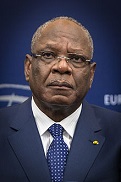
On Sept. 4, 2013 Ibrahim Boubacar Keita (1945-) becomes pres. of Mali (until Aug. 19, 2020).
On Dec. 5, 2013 the U.N. Security Council votes to adopt Resolution 2127 to establish the French-backed African-led African-Led Internat. Support Mission to the Central African Repub. (MISCA) (Mission Internationale de Soutien a la Centrafique sous Conduite Africaine) peacekeeping force for Central African Repub. (CAR) (until ?).
On Jan. 9, 2014 (night) Kenyan troops strike an Al-Shabaab camp in Gedo, Somalia.

On Jan. 10, 2014 after Christian-Muslim fighting leads to ceasefire and a summit to select a candidate with no links to either group of fighters, CAR pres. (since Mar. 24, 2013) Michel Djotodia resigns, and on Jan. 23 Catherine Samba-Panza (1954-) becomes pres. of Central African Repub. (CAR) (until ?), the first woman, after which people relocate to religiously-cleansed neighborhoods incl. Bouar as the U.N. warns of potential genocide.
On Jan. 14, 2014 Nigerian pres. Jonathan Goodluck signs a law giving up to 14-year prison sentences for homosexuality and banning same-sex marriages, causing U.S. secy. of state John Kerry to utter the soundbyte that the U.S. is "deeply concerned". On Jan. 14 Turkey raids the

On Jan. 23, 2014 after three weeks of talks in Addis Ababa, pro and anti govt. forces in South Sudan sign a ceasefire agreement; too bad, it is broken within 24 hours. On Jan. 27 Boko Haram militants slaughter 30 Christian churchgoers in Waga Chakawa, Adamawa, Nigeria. On Jan. 29 industry minister (since Mar. 14, 2013) Mehdi Jomaa (1962-) becomes PM of Tunisia (until Feb. 6, 2015), running a technocratic govt. On Feb. 7 thousands of Muslims flee Bangui, Central African Repub. (CAR) as Christians jeer them. On Feb. 25 (7:50 a.m.) after an attempted break-in on Feb. 6 causes 15 of 250 to be drowned on the coast, 500 sub-Saharans crash their way from Morocco into Melilla, Spain. On Feb. 25 Boko Haram militants kill 43 boys at the Federal Govt. College secondary school in Buni Yadi, Yobe, Nigeria by closing the doors and burning them alive, sparing the girls. On Mar. 23 Nigerian state govs. meet in the White House with U.S. nat. security adviser Susan Rice, accusing Pres. Goodluck Jonathan of being in collusion with Boko Haram to perpetuate the conflict. On Mar. 24 Egypt sentences 529 Mohammed Morsi supporters to death out of 545 on trial for killing a single police officer, causing U.S. secy. of state John Kerry to issue the soundbyte that he is "deeply troubled", calling for the Egyptian govt. to "remedy the situation". On Mar. 29 Libyan state TV airs a video of Madman Daffy's son Saadi Gaddafi apologizing to the nation from prison "for the disturbance and destabilization I have caused". On Mar. 30 Chadian troops escorting a convoy of Muslims back to Chad fire on Christian civilians in Bangui, Central African Repub., killing 10+ and injuring dozens. On Apr. 4 Tunisian caretaker PM Mehdi Jomaa becomes the first Tunisian leader to visit the White House since Zine El Abidine Ben Ali in 1990, securing a $500M loan guarantee. On Apr. 5 after an Egyptian man sexually assaults a woman, a family feud is triggered in Aswan, Egypt, killing 23 until the military intervenes. On Apr. 10 Boko Haram jihadists attack three towns in Borno, Nigeria, killing eight schoolteachers in a teacher training college, and 60+ in another village. On Apr. 10 the U.N. Security Council unanimously approves a 12K-strong peacekeeping force for Central African Repub. (CAR). On Apr. 12 new U.S. ambassador to the U.N. Samantha Power utters the soundbyte that the "systematic targeting" of the Muslim pop. in Central African Repub. (CAR) is "heatbreaking"; she doesn't forget to mention "retaliatory attacks against Christians", as if the Christians started it and the Muslims are the good guys? On Apr. 12-13 Boko Haram outdoes itself with the slaughter of 200+ students on the way to take state-sponsored exams. On Apr. 14 Muslims blow up the Nyanya Motor Park bus station in Abuja, Nigeria, killing 88 and injuring 200. On Apr. 15 the Chibok Schoolgirls Kidnapping sees 276 female students in Chibok, Borno, Nigeria kidnapped by Boko Haram for sexual fun and games, causing an internat. outcry, but of course it has nothing to do with Islam; they are finally released on ?. On Apr. 19 a rush-hour jihad bomb at a bus station in Abuja, Nigeria kills 75+ and injures 141. On Apr. 20 (early a.m.) Boko Haram gunmen attack the Govt. Girls Secondary School in Yana, Nigeria, firing buildings and killing a 5-y.-o. girl. On Apr. 20 Boko Haram leader Abubakar Shekau releases a video bragging about the Abuja bombing and telling Pres. Obama and Ban ki-Moon to go "to hell". On Apr. 28 an Egyptian court sentences to death Muslim Brotherhood guide Mohamed Badie and 682 others, reducing the sentences of the 529 Mar. defendants to life in prison, upholding only 37 death penalties. On Apr. 29 a car bomb near a special forces barracks in Benghazi, Libya kills two and injures two. On May 1 the U.S. offers to help Nigeria "find and free" 200+ mostly Christian schoolgirls abducted by Boko Haram 18 days earlier (Apr. 15). On May 25 Boko Haram militants attack Kamuyya, Nigeria, killing 20. On May 26-28 elections in Egypt give a V to Abdel Fattah el-Sisi, who on June 8 becomes Egyptian pres. #6 (until ?). On Aug. 4-5 Pres. Obama holds the U.S.-Africa Leaders Summit in Washington, D.C. for 50 African heads of state amid hundreds of protesters. On Oct. 30 after pres. (since Oct. 15, 1987) Blaise Comparore tries to change the constitution to stay in office, the Burkinabe (Burkinabé) Uprising in Burkina Faso begins, with rioters burning the nat. assembly and other govt. bldgs., causing Compaore to dissolve the govt. and declare a state of emergency, which doesn't stop them, after which on Oct. 31 he flees to Cote d'Ivoire. On Nov. 10 a Boko Haram suicide bomber in a student uniform detonates at a h.s. assembly in Potiskum, Nigeria, killing 48 and injuring 79 students of 2K; a suicide bomb a week earlier in the same city killed 30 moderate Muslims during a religious procession. On Dec. 2 (1:00 a.m.) Al-Shabaab kills and beheads 36 Christians in Koromey, 15km from Mandera, Kenya.
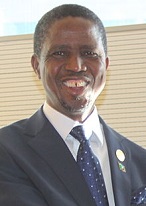
On Jan. 25, 2015 Edgar Chagwa Lungu (1956-) becomes pres. #6 of Zambia (until ?); too bad, in Apr. 2017 Lusaka archbishop Telesphore Mpundu utters the soundbyte: "Our country is now all, except in designation, a dictatorship; and if it is not yet, then we re not far from it."

On Feb. 4, 2015 after the African Union authorizes a 7.5K-man 5-nation army from Nigeria, Cameroon, Chad, Niger, and Benin, Boko Haram militants go on a rampage, killing 90 civilians in Cameroon; on Feb. 6 the Nigerian military announces that it has recovered the weapons stolen by Boko Haram in Jan. On Mar. 4 Nigeria passes the Violence Against Persons (Prohibition) Act, outlawing female genital mutilation (FGM), forceful ejection of widows et al. On Mar. 7 a hooded Muslim terrorist shouting Allah Akbar attacks La Terrasse Nightclub in Bamako, Mali with a rifle and grenades, killing five incl. a Frenchman and a Belgian, and injuring nine; Algerian al-Qaida Al Murabitoon leader Khalid Abu al Abbas (Mokhtar Belmokhtar) claims responsibility. On Mar. 7 Boko Haram leader Abu Bakr Shekau pledges allegiance to ISIS caliph Abu Bakr al Baghdadi, who calls himself Caliph Ibrahim, causing ISIS to announce an expansion of the caliphate to Nigeria, with Boko Haram renamed to Islamic State West Africa (ISWA). On Mar. 8 militants fire 30+ rockets into the U.N. base in Kidal, Mali, killing three and injuring 12; another rocket attack hits a nearby camp for Tuareg and Arab nomads, killing two children and injuring many. On Mar. 28 (Sat.) pres. elections in Nigeria see retired Muslim Gen. Muhammadu Buhari (1942-) (backed by David Axelrod's AKPD) of the All Progressives Congress (APC) defeat Christian pres. Ebele Goodluck Jonathan, promising to enact Sharia; he is sworn-in on May 29 (until ?) during the first 100 days of his admin. 1K mainly Christians are slaughtered by Boko Haram; in Feb. 2019 Buhari is reelected after defeating former vice-pres. Atiku Abubakar by 3M+ votes. On Apr. 12 Italian authorities rescue 8.5K North African migrants, with reports of up to 400 perishing. On Apr. 19 a boat carrying Muslim illegal aliens for Italy capsizes 60 mi. off the Libyan coast 120 mi. S of Lampedusa Island, killing 700, becoming the worst North African illegal alien smuggling accident (until ?). On Apr. 26 after Burundi pres. (since Aug. 26, 2005) Pierre Nkurunziza announces his run for a 3rd term despite it being barred by the constitution, street demonstrations begin, with police killing 6+ in the first two days, causing the govt. to crack down, shutting down radio stations and arresting protest leader Pierre-Claver Mbonimpa; by the end of Apr. 24K flee Burundi; on May 13 while Nkurunziza is attending a summit in Tanzania, Maj. Gen. Godefroid Niyombareh (1969-) (who was dismissed as head of intel in Feb.) declares a coup, preventing him from returning by taking over the airport in Bujumbura until his troops quash the coup on May 14; on July 21 pres. elections reelect him with 69.4% of the vote in a 30% turnout, and he is sworn-in on Aug. 20, pissing-off the U.S., EU, U.N. et al.; on Aug. 2 Nkurunziza ally Gen. Adolphe Nshimirimana is assassinated, and on Aug. 3 Mbonimpa is shot and seriouslyh injured; in Oct. Mbonimpa's son-in-law is killed, followed by his son on Nov. 6 after being arrested. On June 27 (a.m.) al-Qaida-linked jihadists attack a town and military camp 19 mi. from the Mauritanian border in Nara, Mali, killing 12 incl. two soldiers, one civilian, and nine jihadists. On July 6 rallies in Nairobi, Kenya are held against homosexuality, while a lawmaker warns Pres. Obama not to push his pro-gay agenda when he visits the country later in July. On July 22 two suicide bombers in a busy marketplace in the Brituetterie district of Yaounde, Cameroon kill 20+. On July 25 Pres. Obama visits (his birthplace?) Kenya, opening a U.S.-sponsored business summit and saying that Africa is "on the move... one of the fastest growing regions of the world... People are being lifted out of poverty"; too bad he gives a speech calling for equal rights for gays, pissing them off, causing Kenyan pres. Uhuru Kenyatta to reply that gay rights "is not really an issue". On Sept. 12 10K protest in Warsaw, Poland to protest their govt.'s decision to admit 2K Muslims from Syria and North Africa by 2017; signs read "Poland, free of Islam", and "Today refugees, tomorrow terrorists"; meanwhile thousands protest in London, England in favor of admitting refugees; meanwhile Saudi Arabia won't take any refugees, although it has 100K air-conditioned tents that can house 3M. In Nov. after France warns him they won't send special forces to protect him after the Fri. the 13th Attacks, Pope Francis visits Africa, incl. CAR and Uganda. On Dec. 15 Boko Haram militans kill 30 and injure 20 in three villages in Borno State, Nigeria. On Dec. 15-18 the Ministerial Conference of the World Trade Org. (WTO) in Nairobi, Kenya (first in Africa). On Dec. 17 after extended talks in Morocco, Libya's rival govts. in Tobruk and Tripoli sign a U.N.-sponsored peace deal. On Dec. 21 an Al Shabaab attack on a bus in NE Kenya sees the Muslim passengers protect the Christians. On Dec. 21 govt. security forces kill 19 in Djibouti to get them out of the way for the coming elections in Apr.; leading opposition figure Ahmed Yusuf is wounded, along with an opposition MP and dozens of civilians. On Dec. 31 1K mainly North African Muslim refugee New Year's rioters in front of the train station in Cologne, Germany launch fireworks into crowds of infidels and sexually molest 200+ German women, resulting in only five arrests, after which the PC media tries to cover it up, along with more mass sex attacks in Hamburg, Stuttgart, and across Europe; meanwhile Slovakia vows to refuse entry to Muslim immigrants to prevent sex and jihadist attacks.
On Jan. 1, 2016 ISIS massacres 300+ West African migrants in Tripoli, Libya before they can be trafficked to Italy. On Jan. 9 after land-based attacks on the oil terminals of As Sidr and Ras Lanuf on Jan. 4-6, three ISIS boats attack the oil port of Zueitina, Libya, but are repelled. On Jan. 15 al-Qaida terrorists attack Splendid Hotel in Ougadougou, Burkina Faso, vowing to "punish cross worshippers", killing 20, incl. 10 in the Cappuccino Cafe. On Jan. 18 Libyan former intel official Ahmad Qadhaf Al-Dam gives an interview to Egyptian Dream TV Network, claiming that ISIS and other Islamist terrorist groups have gotten hold of the chemical weapons left by dead duck dictator Muammar Qaddafi. On Jan. 25 four Boko Haram suicide bombers at the central market in Bodo, Cameroon kill 25 and injure 65. On Jan. 27 the World Health Org. (ORG) announces that the Zika virus from Africa is spreading rapidly in Latin Am. and has "explosive pandemic potential" because it's spread by mosquitoes, and "You don't need to travel to get the disease", with up to 4M cases possible. On Jan. 30 (night) Islamist Boko Haram maniacs attack a village and two camps housing 25K refugees in Dalori, Nigeria (3 mi. from Maiduguri), burning children alive and killing 86. On Jan. 31 after street protests and armed insurgency, the African Union (AU) votes to dismiss a proposal by U.N. secy.-gen. Ban Ki-moon, U.N. ambassador Samantha Power, the EU et al. to deploy troops to Burundi to prevent possible genocide and prepare for a transitional govt. after the ouster of 3-term (since 2005) pres. Pierre Nkurunziza.
On Feb. 3, 2016 the Catholic Bishop's Conference of Ghana announces that they're pissed off at the Obama admin. deciison to transfer to prisoners from Gitmo there, calling them "time bombs" and calling for them to be sent back.
On Mar. 5, 2016 the U.S. stages an air strike in Raso Camp 120 mi. N of Mogadishu, Somalia, killing 150+ Al Shabaab fighters. On Mar. 10-12 the Biafran Genocide Exhibition is held in the Biafran Embassy in Victoria, Spain, becoming the first exhibition of atrocities committed by the Nigerian govt. against Biafra.
In June 2016 the U.N. Office for the Coordination of Humanitarian Affairs reports that the Lake Chad humanitarian crisis caused by Boko Haram has displaced 2.6M, with 3.8M facing "severe food shortages".
In early July 2016 after Rev. Evan Mawarire posts a protest video on Facebook against the regime of Robert Mugabe, protests begin in Harare, Zimbabwe, becoming the biggest in a decade, causing the govt. to persecute Mawarire, who flees with his family to the U.S. via South Africa, then attempt a shutdown of all social media.
On July 6, 2016 thousands stage a peaceful stay-at-home protest against the ruling Zimbabwean African Nat. Union-Patriotic Front (ZANU-PF) in Zimbabwe, with the Twitter hashtag #ZimShutDown2016. On July 10-18 the 2016 African Union (AU) Summit in Kigali, Rwanda unveils the African Union Passport; Morocco, which left the AU in 1984 requests reinstatement and sends a delegation; the AU announces the sending of a new technical team to N Mali to determine how to deploy a U.N. peacekeeper force. On Sept. 21 riots in Kinshasa, Dem. Repub. of Congo over pres. (since Jan. 26, 2001) Joseph Kabila's attempt to stay in power by postponing elections scheduled for Nov. On Dec. 24 Nigerian pres. Muhammadu Buhari announces that the jihadist group Boko Haram has been driven from its last forest stronghold and is on the run, with no place to hide.
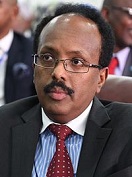
In 2017 Africa becomes the world's fastest-growing beer market. On Feb. 8, 2017 despite an intimidation campaign by al-Shabaab, Tayo Party founder (PM in Nov. 2010-June 2011) Mohamed Abdullahi "Farmajo" (It. for cheese) Mohamed (1962-) is elected pres. of Somalia, becoming pres. #9 on Feb. 16 (until ?), known for his rep of not being corrupt. On May 5 a U.S. Navy SEAL is killed and two more U.S. servicemembers wounded in a raid in Somalia, becoming the first U.S. combat death there since the 1993 Black Hawk Down battle. On July 16 elections in the Repub. of Congo. On Aug. 8 elections in Kenya reelect pres. Uhuru Kenyatta with 54% of 19.7M registered voters, vs. 44% for Raila Odinga, who refuses to accept the results. On Aug. 18 Mali pres. Ibrahim Boubacar Keita announces a suspension of the referendum procedure to revise the constitution. On Oct. 14 a 600kg bomb explodes in a crowded street in Mogadishu, Somalia, killing 587 and injuring 316, becoming the deadliest single attack in Somalian history (until ?), and the 3rd deadliest attack in modern history after 9/11 and the Aug. 2007 Yazidi attacks in N Iraq; the govt. blames al-Qaida-linked Al-Shabaab for a "national disaster". On Nov. 15 (a.m.) after he dismisses vice-pres. Emmerson Mnangagwe for plotting a takeover, a coup in Zimbabwe ousts ogre pres. Robert Mugabe. On Nov. 20 a video purporting to show African migrants auctioned as slaves in Libya casues a global outcry.

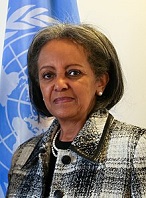
On Feb. 14, 2018 (night) after a vote of no-confidence, "the Lying King" South African pres. Jacob Zuma resigns after nine years, and on Feb. 15 wealthy businessman (ANC pres. since Dec. 18, 2017) Matamela Cyril Ramaphosa (1952-) (Nelsa Mandela's choice) becomes pres. #5 of South Africa (until ?), becoming the first from the Venda ethnic group, going on to commit the African Nat. Congress (ANC) to land expropriation from white farmers, with ANC chmn. uttering the soundbyte "You shouldn't own more than 24,000 acres of land" in early Aug., causing concerns that South Africa may be "Zimbabweficated". On Feb. 27 after a proposal by white-hating Marxist radical Julius Malema of the Economic Freedom Fighters (EFF), the parliament of South Africa by 241-83 votes to confiscate land owned by white farmers without paying compensation. On Mar. 21 the African Continental Free Trade Area (AfCFTA), brokered by the African Union (AU) is signed by 44 of 55 member states in Kigali, Rwanda, becoming the largest free trade area on Earth. On Apr. 11 (8:00 a.m.) a Russian Ilyushin Il-76 military plane carrying 257 Western Sahara refugees crashes near Algiers, Algeria, killing all aboard. On Apr. 11 Pres. Trump lifts his 6-mo.-o. travel ban on Chad after it improves sharing of info. about suspected terrorists and takes steps to make passports more secure. On Apr. 15 Muslim jihadists dressed as U.N. peacekeepers attack a U.N. MINUSMA military camp in Timbuktu, Mali, killing one peacekeeper and injuring seven French soldiers while losing 15 of their own; the French army calls the attack "particularly sophisticated and underhanded". On Apr. 20 the Hisbah Muslim Sharia police in Jigawa State, Nigeria storm beer parlors, seizing and destroying 244,151 bottles of beer. On Apr. 30 Nigerian pres. Muhammadu Buhari visits Pres. Trump in the White House, discussing terrorism and the genocide of Christians in Nigeria; Trump's "shithole country" remarks never come up. On May 12 armed attackers from DRC attack a village in Cibitoke Province, NW Burundi, killing 26 in an attempt to disrupt the coming May 17 elections. On July 3 the city of Quriyat, Oman sets a record of 108.7F (42.6C) for the highest 24-hour min. temperature on Earth, breaking the previous record of 107.4F (41.9C) set in Oman on June 27, 2011; the temp actually remains above 107.4F (41.9C) for 51 straight hours, with an afternoon high temp of 121.6F (49.8C); on July 6 Ouargla, Algeria reaches 124F (51C), setting a record for Africa. On July 29 (Sun.) pres. elections in Mali are a push, causing a 2nd election on Aug. 12 between incumbent pres. Ibrahiim Boubacar Keita and Soumaila Cisse (Cissé); Keita wins with 67% of the vote. On Aug. 7 Nigerian security forces block lawmakers from entering parliament to intimidate opposition leaders, causing the acting pres. to fire the head of the security agency. On Sept. 4 authorities in Libya announce a death toll of 50+ incl. civilians from more than a week of fighting between armed groups in Tripoli incl. the Seventh Brigade from Tarhouna, the Tripoli Revolutionaries' Brigades, and the Nawasi Brigade; on Sept. 4 the U.N. annonces that a ceasefire has been signed. On Sept. 4-5 a jihadist attack on mainly Christian women selling farm products in Bria, Central African Repub. kills 12-42, most hacked to death with machetes. On Sept. 12 the border between Ethiopia and Eritrea reopens after 20 years of border war. On Sept. 20 the MV Nyerere ferry capsizes in Lake Victoria, Tanzania, killing 44+. On Oct. 16 Ethiopian PM Abiy Ahmed appoints Aisha Mohammed as defense minister, becoming the first woman in a cabinet that is already half-women. On Oct. 25 career diplomat Sahle-Work Zewde (1950-) becomes pres. #4 of Ethiopia (first woman) (until ?). On Nov. 27 after the U.S. committed itself to "building up the Somali capacity to defend itself" from Islamist terrorism by supplying African Union (AU) peacekeepers, USMC Gen. Thomas D. Waldhauser, cmdr. of the U.S. Africa Command visits Somalia and meets with Pres. Farmajo, claiming that they "have made measurable progress and it's clear they are dedicated to reaching the goal of a safe, stable and prosperous Somalia"; too bad, it's the world's most corrupt country, and Farmajo ends up coddling and endorsing Islamist terrorism. On Dec. 30 elections in the Dem. Repub. of Congo (DRC) to succeed pres. Joseph Kabila become their first transfer of power through peaceful elections since independence in 1960.
On Jan. 7, 2019 a failed coup in Gabon ends with the leader arrested and two commandos killed after storming a public radio station. On Jan. 18 a report by a group of aid agencies claims that armed jihadists have killed 100+ soldiers in NE Nigeria since Dec. 26, and seized a huge stock of weapons; a govt. spokesman denies it.

On Jan. 24, 2019 Felix (Félix) Antoine Tshilombo Tshisekedi (1963-0 becomes pres. #5 of the Dem. Repub. of the Congo (until ?), succeeding strongman Joseph Kabila, who has been pres. for 18 years (since Jan. 26, 2001), becoming DRC's first peaceful transfer of power since independence from Belgium in 1960, immediately announcing plans for the release of all political prisoners and pledging to rid the country of graft and corruption, with the soundbyte: "We are committed to building a modern, peaceful, democratic and caring state for every citizen, a state that will guarantee the happiness of all."
In Jan. 2019 the Internat. Criminal Court (ICC) in The Hague dismisses all charges against Ivory Coast pres. #4 (2000-11) Laurent Gbagbo (1945-) and his former minister Charles Ble Goude (Charles Blé Goudé) (1972-), but he is prohibited from returning pending a prosecutorial appeal.
On Mar. 4, 2019 (a.m.) Muslim Fulani jihadists attack Christian villages in the Mbacohon area of Benue State, Nigeria, killing 23 with gunfire and machetes.
On Mar. 23, 2019 after the govt. of Mali cracks down on Islamic terror cells, Islamist ethnic Dogon jihadists massacre 160 Fulani herders in Ogossagou and Wellingara, Mali; on Apr. 19, 2019 the govt. of Mali resigns over the Ogossagou massacre of 160 Fulani herders by jihadists four weeks earlier.
In Mar. 2019 the European Parliament approves a framework calling on member states "to take measures to tackle the structural racism people of African descent face in Europe", incl. the payment of reparations for colonialism.
On Apr. 11, 2019 after large-scale protests starting last Dec., Sudanese dictator-pres. #7 (since June 30, 1989) Omar al-Bashir (1944-) is removed from power by a military coup.
On June 3, 2019 Tanzania passes a law fining people $13 for using a platic bag, and $400K and up to two years in jail for manufacturing them, becoming the 3rd East African country after Kenya and Rwanda.
On June 30, 2019 mass protests in Khartoum, Sudan against military rule on the 30th anniv. of Pres. Omar al-Bashir's 1989 seizure of power result in seven killed and 181 injured.
On Aug. 21, 2019 after a lawsuit brought by the Nelson Mandela Foundation, the Equity Court of South Africa bans the nat. flag of the apartheid era.
On Aug. 19, 2020 after being arrested by a military coup, Mali pres. (since Sept. 4, 2013) Ibrahim Boubacar Keita (1945-) resigns.
In Dec. 2013 the U.K. begins a 3-year deployment of hundreds of troops to Mali in a big push to oust the Islamic State; on Nov. 14, 2022 the forces begin withdrawal from MINUSMA (established Apr. 25, 2013), which is terminated on June 30, 2023 after 304 peacekeepers out of 15.2K are KIA.
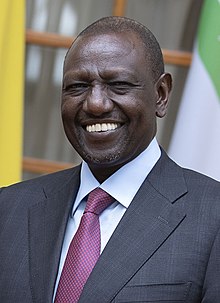
On Sept. 13, 2024 evangelical Christian William Kipchirchir Arap Ruto (1966-) becomes pres. #5 of Kenya (until ?).